 Request a copy of our book(s)
Request a copy of our book(s)Black Friday vs. Best Friday

How to Turn a Shopping Day Into a Wealth-Building Mindset
Every November, millions of people wake up early, coffee in hand, ready to chase “once-in-a-lifetime” deals. It’s called Black Friday, the day retailers celebrate, banks quietly profit from, and consumers convince themselves they’re “saving money.”
But what if the best deal of the year isn’t a discount at all?
What if it’s a decision?
Welcome to Best Friday, the day you stop letting sales run your wallet and start letting knowledge run your life.
The Illusion of the “Deal”
Let’s start with what makes Black Friday powerful.
It’s not just the markdowns; it’s the marketing psychology.
Every flashing countdown, every “only 3 left,” every ad using words like exclusive and today only is designed to trigger scarcity. When our brains sense scarcity, logic goes quiet and emotion takes over.
Suddenly, spending feels like saving.
And that’s exactly the trap.
Last year, the average American planned to spend around $1,000 during the holiday season. The problem isn’t generosity; it’s unconsciousness. When spending replaces strategy, “limited-time offer” becomes another word for “long-term regret.”
What Really Happens on Black Friday
Here’s what’s often happening behind those glossy graphics:
- Retailers raise prices in October only to “slash” them later.
- Credit card companies profit twice — once from the swipe, again from the interest.
- Consumers mistake emotion for math. A 20% discount isn’t a bargain if you pay 22% interest over the next year.
It’s not evil; it’s engineered.
Black Friday isn’t about your needs; it’s about someone else’s bottom line.
Our approach doesn’t say “never spend.”
It is to spend with intention, and that’s how we turn Black Friday into your Best Friday.
What Makes It “Best”
Best Friday isn’t about skipping the season or feeling guilty for shopping.
It’s about directing the same excitement and energy toward choices that actually compound over time.
Think about it:
- What if you invested the amount you usually spend on “deals”?
- What if you used the day to review your finances, set new goals, or automate savings?
- What if, for once, you bought something that appreciates instead of depreciates?
Best Friday is the mindset shift that says:
“I don’t need to spend to feel empowered. I can build instead.”
Example: The $800 Flip
Let’s say your holiday shopping list adds up to $800.
If you invested that money instead, say in a diversified index fund averaging 8% annual growth, and left it there for ten years, it would grow to $1,727.
Not bad for skipping a few impulse buys.
Now imagine you made that your Best Friday tradition. Every year, you invest the money you would have spent. After ten years, you’d have nearly $12,000 (and that’s without adding a penny from any other month).
Meanwhile, most of what’s bought on Black Friday loses value the moment it leaves the store.
The Emotional Side of Spending
It’s not just numbers; it’s neuroscience.
Shopping releases dopamine, the same “feel-good” chemical triggered by rewards and anticipation. That’s why it feels good to “add to cart.”
But dopamine spikes are short-term. What follows is often guilt, stress, or financial fatigue.
Best Friday teaches you to replace that temporary high with something sustainable:
- The confidence of seeing savings grow
- The relief of paying off debt
- The security of having a plan
Financial freedom has its own dopamine. It’s just quieter and lasts longer.
How to Turn This Year Into Your First Best Friday
You don’t need a perfect plan. You need a clear direction.
Here’s how to get started:
1. Redefine “reward.”
Instead of chasing discounts, reward yourself with progress.
Every dollar saved, invested, or redirected is a reward that multiplies.
2. Audit before you buy.
List what you actually need.
Ask, “Would I still buy this at full price?”
If not, it’s probably a want dressed as a need.
3. Build a “Best Friday” fund.
Move a small portion of your paycheck into savings or investment automatically each month. When November comes, your reward is waiting and growing.
4. Give intentionally.
Generosity is powerful, but planned giving is sustainable.
Budget for it. Make it part of your mission, not your reaction.
5. Take one financial literacy action.
Read one of our TheMoneyBooks
Take the Financial Literacy Quiz.
Meet with a financial educator.
Progress, not purchases, should define your Friday.
The Math of Meaning
When you understand compounding, you realize the smallest moves are the most powerful.
$100 saved and invested monthly for 10 years at 8% returns equals almost $19,000.
That’s not luck; it’s literacy.
And that’s what TheMoneyBooks philosophy is all about:
transforming the emotional energy of money into the logical confidence of strategy.
The Ripple Effect of Best Friday
Imagine if every family used one day in November not to buy but to build.
- Teens open their first savings accounts.
- Parents review insurance and emergency funds.
- Grandparents share how they’ve seen wealth grow or disappear.
- Friends challenge each other to invest, not impulse-shop.
It becomes a national reset button for financial habits, a moment of reflection that could transform not just one weekend but a lifetime.
Turning Awareness Into Action
Here’s the simple truth:
You can’t out-shop financial stress. You can only out-learn it.
Black Friday rewards spending.
Best Friday rewards understanding.
And the best part? You don’t need a sale to start. You just need a decision.
When you know how money really works, you stop chasing deals and start designing them. Your goals, your investments, and your future become the best bargains you’ll ever find.
A Challenge for This Year
Before you hit “checkout,” try this:
- Look at your total.
- Take half that amount and transfer it into your savings or investment account.
- Label it “Best Friday Fund.”
- Leave it there for one year.
Next November, open it again.
That quiet number growing on your screen?
That’s peace of mind, compounded.
The Bigger Picture
Black Friday was designed to measure consumer spending.
Best Friday could become the day we measure consumer understanding.
When families learn how money really works, they don’t just save dollars; they save decades of stress. They buy back their time, their options, and their confidence.
That’s the heart of TheMoneyBooks mission:
to turn every financial season into a learning season.
Because no discount compares to the return on knowledge.
Closing Thought
Black Friday may come once a year, but Best Friday can happen any time you decide it will.
Every time you choose purpose over pressure, planning over panic, and literacy over hype, you make it your Best Friday.
So this year, skip the rush.
Open your budget instead of your browser.
Learn something new about your money.
And give your future self the best gift of all: control.
Call to Action
Take your first Best Friday step today:
📘 Read one of our TheMoneyBooks
🧠 Take the Financial Literacy Quiz, and
💡 Contact a financial educator to learn how to make every dollar work for your goals, not against them.
Because when you understand money, every day has the potential to be your Best Friday.
Caught in the Middle

The Long-Term Care Squeeze No One Is Ready For
There’s a moment many adults never see coming. One day you’re raising kids, pushing toward career goals, maybe planning for your own retirement. And then suddenly you’re coordinating doctor visits for a parent, helping them with daily tasks, managing medications, or having conversations you never imagined having.
Welcome to the reality of the sandwich generation, a growing group squeezed on both sides, supporting children while caring for aging parents.
It’s emotional. It’s overwhelming. And it’s expensive.
But at the heart of this growing crisis is something most families don’t talk about early enough: long-term care.
The Love Is Real. The Cost Is Too.
The stories behind the statistics are deeply human. A daughter quits her job to bring her father home after a fall. A son burns through savings to cover in-home help for a mother with dementia. A family declines services because they simply “can’t afford the care Dad needs.”
This is playing out across the country.
According to recent caregiving surveys, more than half of family caregivers go into debt supporting aging loved ones. Many try to provide care themselves because professional options feel financially impossible. And yet the need for care doesn't disappear, it only grows.
These aren’t isolated stories. They’re the new normal.
Long-Term Care Isn’t Just a Medical Issue - It’s a Financial One
Long-term care isn’t about fixing a medical problem. It’s about helping a person live their daily life safely and with dignity. That includes:
- Home health aides
- Adult day programs
- Assisted living
- Memory care
- Nursing homes
- Respite care for family caregivers
And here’s the wake-up call: none of this is cheap.
A private room in a nursing home can exceed $100,000 a year. Assisted living often costs $50,000 or more. Even part-time in-home care can run thousands of dollars each month.
Most families simply aren’t prepared, emotionally or financially.
That's why so many adult children are forced to step in. Not necessarily because they planned to, but because long-term care was never discussed, never funded, and never put into the family financial plan.
“We Love Our Dad… But” The Stress No One Wants to Admit
Recent statistics highlights a painful truth caregivers often whisper but rarely say out loud:
“We love our dad. But we need to support our own families.”
Love doesn’t remove the financial pressure. And when families have no long-term-care plan in place, the burden falls on the next generation.
The result?
- Lost income
- Increased debt
- Delayed retirement
- Emotional exhaustion
- Family conflict
- Resentment no one wants to acknowledge
Caregivers often feel like they’re failing their parents and failing their kids, all at once. That’s the emotional math of long-term care when no plan exists.
Why Planning Early Changes Everything
Only 17% of adults have had meaningful conversations with parents about long-term care. That means 83% are waiting until a health crisis forces decisions that are rushed, expensive, and limited.
The lack of planning forces adult children to become the default long-term care strategy. But it doesn’t have to be that way.
A long-term care plan:
- Protects your parents’ dignity
- Protects your finances
- Protects your marriage
- Protects your children
- Protects your retirement
And most importantly, it protects the relationships that matter most.
The Shock Most Families Discover Too Late
People assume Medicare pays for long-term care.
It doesn’t.
Medicare covers medical recovery, not custodial care like bathing, eating, supervision, or dementia-related needs. And Medicaid? It only kicks in after you spend down assets to poverty levels, which forces families to sacrifice decades of savings.
Without a plan, long-term care becomes a crisis the family absorbs financially, logistically, and emotionally.
Sandwich Generation Math No One Talks About
Imagine this scenario:
- You’re putting two kids through school
- You’re saving for retirement
- You’re managing your own household
- You’re helping support aging parents
- And you’re paying out-of-pocket for care
Now add rising inflation, rising health-care costs, and the fact that people are living longer than previous generations.
That’s the squeeze.
And it’s why long-term care planning is no longer optional, it’s a necessity.
This Isn’t About Fear. It’s About Options.
Families without a long-term care strategy have:
- Fewer choices
- Less control
- Higher expenses
- More stress
- More guilt
- Greater financial risk
Families with a long-term care strategy have:
- A roadmap
- Predictable costs
- Protection for their savings
- Support systems in place
- Less stress and conflict
- Time to focus on being a family, not being caregivers
Planning doesn’t eliminate the challenges. But it changes the experience entirely.
So What Does a Long-Term Care Plan Actually Look Like?
It depends on the family, but generally includes:
1. Conversations about preferences
Where does your parent want care?
Home? Assisted living? Nursing support? Something hybrid?
2. An understanding of realistic costs
Many adults underestimate long-term care costs by over 50%.
Financial educators can help families map out real numbers, not guesses.
3. Insurance or asset-based long-term care strategies
Today’s long-term care planning tools can provide:
- Tax-advantaged benefits
- Flexible payout options
- Protection if care is never needed
- Coverage for home care or facility care
- Hybrid life-insurance-based solutions
4. A step-by-step affordability plan
For many families, creating a strategy is not about wealth, it’s about timing.
Smaller monthly premiums today prevent enormous costs later.
5. A financial professional guiding every step
Trying to navigate long-term care on your own is overwhelming.
Working with someone who understands the options gives families clarity and confidence.
Why a Financial Professional Matters More Than Ever
Families don’t fail at long-term care because they don’t care.
They fail because no one taught them what long-term care really means.
This is where a financial professional becomes invaluable.
They help you:
- Run the numbers
- Prepare for costs realistically
- Understand what insurance covers
- Compare policies
- Integrate long-term care with retirement planning
- Protect your children from inheriting the burden
- Create a strategy that makes sense for your situation
Financial literacy turns fear into preparedness and stress into strategy.
You Can Protect Yourself. You Can Protect Your Parents. You Can Protect Your Kids.
The sandwich generation often feels like they’re being crushed between two responsibilities. But with a long-term care plan in place, that pressure eases. Instead of reacting to emergencies, families move forward with clarity and calm.
Imagine:
- Not having to quit your job
- Not burning through savings
- Not arguing about who pays for what
- Not panicking during health decisions
- Not sacrificing your retirement to pay for care
That’s what planning makes possible.
The Future Belongs to Families Who Prepare
No one wants to burden their kids. No child wants to feel trapped by circumstances they never planned for. Long-term care is more predictable than people realize, but only if you plan for it early.
You can’t control aging. You can’t control health events. But you can control whether you face them unprepared or empowered.
This is the moment to start.
A WealthWave financial professional can walk you through the options, show you how long-term care integrates with your 7 Money Milestones, and help you create a strategy that protects everyone involved, including you.
Because long-term care isn’t just something older people need to think about one day.
It’s something families need to plan for today.
If you’re ready to protect your future and your family, it’s time to start the conversation.
Long Term Care: A Family Conversation Guide

5 Questions to Ask Before It’s Too Late
When it comes to money, everyone has blind spots. One of the biggest? Long-term care. Not because it’s complicated—though it can be—but because it requires something most people avoid: talking about the future, aging, and what happens when someone we love can’t fully care for themselves.
It's no wonder only 17% of people have even started planning for long-term care. That means most families are unprepared for the moment when decisions need to be made. And when the moment comes, it’s usually under stress, at a hospital, with emotions high and time short.
We believe in teaching people how money works—before they need it. Part of that is learning how to have “that talk” with the people you love most. So today, we’re breaking that silence with five clear questions every family should ask now—before it’s too late.
These questions won’t just help you create a plan. They’ll help you protect relationships, preserve dignity, and prepare emotionally and financially for what may be one of life’s most significant transitions.
But let’s start with the truth...
The Conversation Nobody Wants, But Everybody Needs
It’s hard to picture life when someone who once raised us, supported us, or stood beside us suddenly needs our help just to get through the basics: eating, bathing, moving, remembering.
It’s even harder to imagine what that might mean for our own family, savings, relationships, job—and future.
That’s why this conversation needs to happen way before life forces it. The sooner we have it, the more options, clarity, and peace we gain. That’s how we replace crisis with confidence.
So grab a notebook or open a shared doc. Pass around the coffee, not the awkward silence. And let’s walk through the five questions that can change everything.
Question 1: What Type of Care Would You Prefer, and Where?
Before dollars, policies, or logistics—start with dignity. What kind of life does your loved one want if they can’t live exactly the way they do now?
Ask:
- Do you want to stay at home as long as possible?
- If you needed daily help, would you prefer a professional caregiver or family?
- Would you ever consider assisted living or a memory care facility? Why or why not?
Each option has pros and cons.
- Home care offers familiarity and comfort, but it may require major upgrades—or a rotating team of caregivers.
- Assisted living provides structure and social interaction, but it can be expensive and emotionally challenging.
- Nursing care or skilled care is there when medical support is necessary, but it’s often a last resort.
This question grounds your planning in values, not money. It helps your loved one feel seen and respected. And it empowers you to make decisions with them—not for them—if the time comes.
Question 2: How Will We Pay for It?
This is where money steps in as a tool, not a tension. The average cost of long-term care in America is rising each year. As of 2024, the numbers look like this:
- Home health aide (full-time): ~$68,000/year
- Assisted living facility: ~$54,000/year
- Private room in nursing home: ~$108,000/year
And remember: 20% of people age 65+ will need care for longer than five years.
So how do you prepare? By breaking down the options:
1. Savings and Assets – Retirement accounts, pensions, IRAs, property sales.
2. Insurance – Long-term care insurance or hybrid life/long-term care policies.
3. Government Programs – Medicaid (needs qualification), VA benefits, limited Medicare support.
4. Family Contributions – Often the least discussed and most stressful option unless planned ahead of time.
Talk openly. Ask:
- Do you already have long-term care insurance or a policy with a care rider?
- Are you counting on using home equity or savings?
- What income sources will be available in retirement?
This isn’t about prying—it’s about clarity. The biggest financial disasters come from silence, not shortfalls.
Question 3: What Documents Do We Need—and Where Are They?
Every financial educator has seen it: families scrambling through drawers, folders, and email accounts trying to find a power of attorney or trust document after a crisis hits.
Avoid that chaos.
Create a list of essential documents and make sure they’re updated and accessible:
🗂️ Legal Documents
- Power of Attorney (financial)
- Power of Attorney (healthcare / medical proxy)
- Living will / advance directive
- Last will and testament
- Trust documents (if any)
- POLST (Physician Orders for Life-Sustaining Treatment)
💳 Financial & Insurance Records
- Bank and retirement account details
- Long-term care insurance policies
- Life insurance policies
- Deed or mortgage statements
- Pre-paid funeral or burial plans
🔑 Where They’re Stored
- Physical copies: folder, safe, binder, lockbox
- Digital copies: encrypted folder, cloud storage, shared drive
- Password access: write it down or use a password manager
This isn’t paperwork. It’s protection. It’s your emergency instruction manual.
Question 4: Who Will Be Responsible for What?
One of the most painful moments in caregiving is when the weight falls on one person simply because they’re the closest, most available, or most emotionally involved.
That’s why a smart family assigns roles—not burdens.
Have an honest, practical conversation:
- Who lives closest? Who’s willing and able to help in-person?
- Who can manage finances, bills, and insurance?
- Who can provide emotional support or stay in touch with doctors?
- Who will be the medical decision-maker if needed?
Assigning roles now prevents resentment later. And it helps each person operate out of strength—not obligation.
You may even decide to form a "care team"—a shared system of regular check-ins and responsibilities. No family should handle long-term care alone. But no one should be surprised by it, either.
Question 5: What’s Most Important to You—Even If Circumstances Change?
This is the most powerful question because it goes deeper than logistics.
It’s not just “Where do you want to live?” It’s:
- What makes life worth living for you?
- What would you want to keep doing, no matter what?
- What would you not want us to do, even if we think it’s “best”?
This is where you discover the core:
"I want fresh air every day."
"I don’t want to live where I can’t see my grandkids."
"Don’t put me on machines if I’m not coming back."
"I’m okay downsizing—but I want my books, my garden, and my music."
These things matter. And when emotions rise or medical staff start asking hard questions, these answers give you a compass.
This is how you honor someone long after they’re able to explain themselves.
Bringing It All Together: Start the Conversation This Week
You don’t need to have every answer today, but you do need to ask the questions. Silence is the enemy of preparedness.
And here’s the surprising truth:
Most people are relieved when someone starts the conversation. They’ve often been thinking about it, worrying about it, or avoiding it quietly. You’re not bringing up something new—you’re bringing it into the light.
Your Action Plan
✅ Step 1: Schedule the Talk
Choose a calm day, a familiar place, and give everyone a heads-up.
✅ Step 2: Use the 5 Questions
Print them, write them, speak them—but stick to them.
✅ Step 3: Listen First
Don’t correct or judge—just capture everything.
✅ Step 4: Follow Up
Make a checklist: documents to gather, roles to assign, funding gaps to explore.
✅ Step 5: Bring in a Pro
This is the point where you should speak with a qualified financial professional—someone who can provide policy reviews, cost projections, benefit breakdowns, and planning strategies tailored to your situation.
Because the worst thing we can do is wait.
Before You Go: One Simple Truth
Planning for long-term care isn’t morbid. It’s loving. It says: “I don’t want my pain or vulnerability to become your crisis or confusion.”
It’s an act of stewardship, strength, and clarity.
This is how we protect families. This is how we preserve relationships under pressure. This is how we change the financial culture—one conversation at a time.
And the best part?
Now that you know what to do, you can help others do it too.
Let’s start the talk. Let’s protect the people we love. Let’s teach it forward.
Money Monsters: 7 Habits That Eat Your Budget Alive

How to Spot, and Stop, the Financial Creatures Hiding in Plain Sight
They lurk quietly.
In your bank app.
In your Amazon cart.
In that “small” subscription you forgot to cancel six months ago.
They’re the Money Monsters, habits that seem harmless day-to-day but quietly feast on your financial future.
Most people don’t lose control of their money because of one big mistake. It’s usually a series of small leaks: automatic withdrawals, thoughtless swipes, emotional splurges—that nibble at every paycheck until your budget looks like Swiss cheese.
The good news? You can trap these monsters once you learn to recognize their footprints.
Let’s shine a flashlight on the seven most common ones.
1. The Subscription Slime
It starts innocent enough:
“Only $9.99 a month.”
Then there’s another. And another.
Music, streaming, fitness, cloud storage, photo editing, meditation, pet food delivery, and the “free trial” you forgot to end. One by one, they blend into your bank statement until you’ve built a small financial ecosystem feeding on your income.
According to studies, the average person underestimates their monthly subscriptions by more than 70%. What you think is $40 often ends up being $110 or more.
How to fight it:
- Audit quarterly. List every recurring charge and ask, “Would I sign up for this today?”
- Cancel before you decide. If you miss it after a week, resubscribe. Most people never do.
- Bundle intentionally. Some services offer shared plans—just make sure you’re splitting costs fairly.
Subscriptions aren’t the enemy. Forgetting about them is.
2. The Latte Leech
We’re not here to shame coffee drinkers. This monster isn’t about caffeine—it’s about autopilot.
A daily $6 stop for coffee feels tiny. Yet over a year, that adds up to $1,500–$2,000. If you’re also grabbing lunch out three times a week, you could be draining another $2,500 annually.
That’s a plane ticket, an emergency fund, or two months of retirement contributions disappearing into foam and convenience.
How to fight it:
- Track one “small” habit for a month. You’ll likely gasp.
- Choose your ritual days (Fridays only, for example).
- Redirect the savings automatically. Brew at home → transfer $6 to savings. Small moves compound.
Your coffee isn’t evil—but unexamined habits are.
3. The Debt Goblin
This creature feeds on one emotion: avoidance.
You stop checking balances because they stress you out. You make minimum payments hoping it’ll all sort itself out later. Meanwhile, interest multiplies quietly in the dark.
A $5,000 credit card balance at 22% interest—making only minimum payments—can take 20 years to pay off and cost nearly $11,000 in total. That’s the Debt Goblin’s favorite meal: your future freedom.
How to fight it:
- Face the numbers. Write every debt, balance, interest rate, and payment.
- Choose your weapon:
- Snowball: Pay smallest balance first to gain momentum.
- Avalanche: Pay highest interest first to save money long-term.
- Call your creditors. Ask about hardship programs or rate reductions—you’ll be surprised how often they help.
The Debt Goblin thrives on silence. Once you face it, it loses power.
4. The Lifestyle Werewolf
This one hides under the full moon of success. You get a raise, and suddenly your spending rises with it. New clothes. Nicer dinners. A “deserved” upgrade.
It’s not greed—it’s human nature. Psychologists call it hedonic adaptation: our baseline for “enough” keeps shifting upward.
Here’s the problem: when lifestyle rises as fast as income, wealth never grows. You’re working harder, earning more, and still feeling behind.
How to fight it:
- Lock in your savings rate. If your income jumps 10%, increase savings or investing by 5%.
- Delay upgrades 90 days. If you still want it after the wait, it’s likely a genuine improvement, not a dopamine hit.
- Define “enough.” Write down what a good life actually looks like for you. Otherwise, you’ll keep chasing someone else’s version.
You can’t out-earn the Lifestyle Werewolf—you can only outsmart it.
5. The Impulse Imp
This sneaky creature loves checkout screens and “limited time” banners. It thrives on emotion: boredom, stress, or celebration.
It’s not just the big splurges—studies show most people make three unplanned purchases per week. Those micro-decisions, often under $50, add up to thousands annually.
How to fight it:
- Use the 24-hour rule. Want something? Screenshot it. Wait a day. Most desires fade with time.
- Shop from a list only. Whether online or in-store, anchor your actions to a plan.
- Block the bait. Unsubscribe from marketing emails and turn off push notifications.
Impulse buying isn’t about weakness—it’s about environment. Control that, and you control the Imp.
6. The Budget Phantom
This one is tricky because it looks responsible. You tell yourself you have a budget—maybe even a spreadsheet somewhere—but you never actually track spending in real time.
That’s how the Budget Phantom wins: by hiding reality behind rough guesses.
A Gallup poll once found that only 32% of households have an active, written budget. The rest are flying blind—and shocked when their card declines.
How to fight it:
- Automate your awareness. Use free tools that categorize spending automatically.
- Budget by buckets. Keep it simple: Needs (50%), Wants (30%), Future (20%).
- Schedule a weekly 10-minute check-in. Look at one number: “How much left in each category?”
Budgets aren’t about restriction. They’re about permission—to spend confidently within limits you’ve chosen.
7. The Comparison Kraken
No monster drains happiness faster.
You see a friend’s trip to Italy or a neighbor’s new SUV and think, “I’m behind.” Suddenly, your perfectly fine life feels inadequate.
Comparison fuels overspending. You justify upgrades not because you need them, but because you want to feel equal. That emotion—envy dressed as motivation—is expensive.
How to fight it:
- Recognize social media for what it is: highlights, not reality.
- Unfollow triggers. Protect your peace like you protect your wallet.
- Track your progress, not theirs. A personal net-worth chart or savings goal tracker makes your own wins visible.
Financial confidence doesn’t come from status—it comes from direction. If you’re moving forward, you’re doing better than you think.
The Monster-Proof Plan
Spotting the creatures is step one. Caging them takes consistent, simple actions—no silver bullets required.
- Name your top three monsters. Which habits feel most familiar? Awareness beats shame.
- Attack one at a time. Small, focused wins stick longer than total overhauls.
- Create automatic systems. Auto-transfers to savings, auto-debt payments, auto-investing. Automation is garlic for financial vampires.
- Use accountability. A financial educator, friend, or partner keeps you honest and encouraged.
- Replace, don’t remove. Cut the bad habit, but fill the gap—brew coffee with friends, plan a “no-spend Saturday,” or turn budgeting into a challenge game.
You can’t just eliminate habits; you must rewrite them.
The Transformation: From Fear to Freedom
In TheMoneyBooks, we often say financial literacy isn’t about perfection—it’s about direction. Once you start learning how money really works, the monsters shrink fast.
Think about what each of these habits costs—not just in dollars, but in stress and missed opportunities:
- The Subscription Slime steals awareness.
- The Latte Leech steals momentum.
- The Debt Goblin steals freedom.
- The Lifestyle Werewolf steals contentment.
- The Impulse Imp steals purpose.
- The Budget Phantom steals clarity.
- The Comparison Kraken steals joy.
Add those up, and you see why so many families feel stuck no matter how much they earn. But add up the opposite traits—awareness, momentum, freedom, contentment, purpose, clarity, joy—and you get wealth, in every sense.
A Final Word
There’s a reason our mission begins with education. Once you understand how these monsters operate, you can’t unsee them—and that’s a good thing. Awareness is permanent protection.
This week, choose one. Just one.
Shine a light on it.
Measure its cost.
Make one small change.
Maybe that’s canceling an unused subscription. Maybe it’s deleting a shopping app. Maybe it’s opening your first investment account instead of another store card.
Whatever it is, it’s a step toward your Best Friday, your Debt-Free December, your Financially Free Future.
When you win one battle, momentum builds. When you win all seven, your money finally works for you—and not the monsters.
Ready to see where you stand?
Take the Financial Literacy Quiz and find out which habits are hiding in your financial life. Then get one of our TheMoneyBooks and connect with a financial educator to arm yourself with the knowledge to keep every dollar working toward your goals.
Because the only thing scarier than Money Monsters…
is pretending they’re not there.
Why Every Family Needs a Plan

Estate Planning: A Simple Guide for Every Family
Estate planning isn’t just for the wealthy or the retired. It is a basic life plan that organizes what you own and what you want so your family can act with clarity during tough moments. Think of it as future-proofing your wishes, your kids’ care, and your medical decisions.
Below is a general, plain-English guide to help you and your family get started.
A quick reminder this is not legal advice. If you want help personalizing any of this, speak with a qualified financial professional who can coordinate with your legal and tax advisors.
What Estate Planning Really Covers
At its core, an estate plan answers three big questions:
- Who gets what? You decide how your assets should be distributed.
- Who cares for your children? You can legally name guardians for minors.
- Who speaks for you in a medical crisis? You can record your health care wishes and appoint decision-makers if you cannot decide for yourself.
With a plan, you keep control over these decisions. Without one, state rules and the court process have a larger say.
Why So Many Families Plan Around Probate
Probate is the court-supervised process for paying debts and distributing assets after someone dies. It can take time, add costs, and make details public, which is why many people try to avoid it when they can.
A revocable living trust is often used to help assets pass outside probate when it is properly set up and funded. This can make distribution faster and more private for your beneficiaries.
General guidance: A financial professional can help you understand whether probate is likely for your situation, and how titling, beneficiary designations, and trusts could change the outcome for your family.
If You Have Children, Start Here
Guardian designations are one of the most important parts of a plan for parents of minors. If you do not name guardians, a court may need to decide who steps in. Naming primary and backup guardians puts you in charge of that decision and reduces uncertainty for your kids.
Helpful idea: Write a short “parenting letter” that shares values, routines, and preferences. Store it with your documents so guardians understand the heart behind your instructions.
The Health Care Side Most People Forget
Estate planning also covers your medical voice:
- Health care surrogate or proxy: The trusted person who can make treatment decisions if you cannot.
- Living will or advance directive: Your preferences for life support and end-of-life care.
- HIPAA authorization: Permission for your chosen people to access medical information so care is not delayed.
Clear documents spare your family from guesswork during emergencies.
The “Starter Toolkit” Most Households Use
A comprehensive, trust-based set of documents typically includes:
- Revocable Living Trust
- Last Will & Testament
- Financial Power of Attorney
- Health Care Surrogate/Medical POA
- Living Will/Advance Directive
- HIPAA Authorization
- Personal Property Memorandum
- Assignment of Personal Property
- Pet Trust (if you have animals that need care)
General guidance: A financial professional can help you coordinate these documents with how your accounts and policies are titled, so the paperwork and the real-world assets match.
Common Mistakes To Avoid
1) Waiting “until later.” Emergencies do not check your calendar. Begin with simple steps you can finish this week.
2) Creating a trust but not funding it. A trust only works for assets that are titled to it or directed to it through beneficiary designations. Ask for a funding checklist and go account by account. (Your legal documents and your account records should tell the same story.)
3) Skipping guardians. Name primary and backup guardians for minor children and let them know you have chosen them.
4) Forgetting medical directives. Financial instructions are only half the plan. Add your health care surrogate, living will, and HIPAA authorization.
5) Hiding documents. Store originals safely. Share copies or secure digital access with the people who will need them.
6) Never reviewing. Revisit your plan after major life changes such as marriage, divorce, the birth or adoption of a child, a move to a new state, or starting a business. A periodic review helps keep your plan aligned with your life.
A 7-Day “Action” Plan
Use this week to get traction. Tackle one step each day and you will be further along than most households.
Day 1 — Inventory
List your accounts, real estate, insurance, business interests, and debts. Note titling and beneficiaries.
Day 2 — People
Choose a successor trustee, financial and medical agents, and guardians. Confirm they are willing. Pick backups.
Day 3 — Health
Complete your health care surrogate, living will, and HIPAA authorization. Share copies with your agents.
Day 4 — Build
Create your revocable living trust and will. Keep your instructions clear and values-driven.
Day 5 — Fund
Retitle assets where appropriate and update beneficiary designations. Use an assignment of personal property and a personal property memorandum for household items and keepsakes.
Day 6 — Guardian pack
Write your parenting letter. Add school, medical, and routine details. Tell guardians where documents are kept.
Day 7 — Share and store
Give key people copies or secure digital access. Store originals safely. Put a reminder on your calendar to review in 12 months.
General guidance: If your week is packed, ask a financial professional to help you batch these steps into one or two working sessions.
Will vs. Trust: A Simple Way to Think About It
A will is valuable for naming guardians and directing distributions, but it usually needs probate before assets move. A revocable living trust, when properly funded, is commonly used to streamline transfers and increase privacy for your family. Many people use both: a will that coordinates with a trust.
Your situation may differ based on your state, the types of accounts you hold, and your goals for timing and privacy. This is where a conversation with a financial professional pays off.
Keep It Practical
- Start simple. Do the next right step, not everything at once.
- Match paperwork to accounts. Titles and beneficiaries should reflect your written wishes.
- Make it findable. Your plan should be easy for loved ones to locate and follow.
- Review as life changes. Update after major events or at regular intervals.
A Gentle Nudge To Act
Estate planning is a kindness to your future self and to the people you love. It turns anxiety into order, and public court processes into private family transitions. This week, pick one step and complete it. Then keep going.
If you want help translating this guide into a plan that fits your life, contact a qualified financial professional. They can coordinate your plan across documents, account titling, beneficiary choices, insurance, and storage, and bring in legal and tax experts where needed. That support can save time, reduce stress, and help your plan work the way you intend.
The financial nightmare of domestic violence

October is Domestic Violence Awareness Month. Many people think of bruises or broken bones, but there’s another weapon of abuse that leaves scars you can’t see on the outside: financial abuse.
Experts estimate that more than 10 million adults experience domestic violence, and almost 100% also experience financial abuse. Sadly, we rarely talk about it because its effects aren’t always visible, but it is just as devastating.
Economic abuse usually takes the form of control, sabotage or exploitation. Abusers may drain bank accounts, hide assets, deny or limit access to money, demand a detailed accounting of every dollar spent or criticize financial decisions until the victim doubts herself. It can also mean threatening to withhold money, forcing the victim to miss or be late to work, belittling her accomplishments or even physically preventing her from going to work or school. Abusers will also run up debt in their victim’s name, ruining her credit score and leaving her with little to no access to financial resources.
The end result is the same: dependency. When you don’t have money of your own, when your credit is destroyed and when you’ve lost jobs because of abuse, you’re trapped. The financial chains can feel as strong as physical ones.
The costs ripple far beyond individual households. Consider these staggering facts:
• Research shows that survivors of intimate partner violence lose 8 million days of paid work every year.
• More than half of survivors lose a job due to abuse, and about 70% report being blocked from working at all.
• Nearly 60% of victims suffer harm to their credit by their abuser.
• The overall workplace productivity costs are $1.3 trillion.
These aren’t just personal tragedies. They’re economic crises. Every lost job, every ruined credit score, every foreclosure or eviction caused by abuse strains our communities, our workplaces and our economy. Employers lose talent, banks absorb defaults, and taxpayers foot the bill for social services and health care.
Why aren’t we more outraged? Why don’t we talk about financial abuse in the same breath as physical violence? Because it’s quieter. But it’s no less destructive.
Ending financial abuse has to become a priority if we’re serious about ending domestic violence. That means recognizing the warning signs both for potential victims and for those of us who can help. It also means systemic change.
Employers must understand that domestic violence is a workplace issue. Flexibility, support and resources can mean the difference between a survivor keeping or losing her job. Financial institutions should be trained to recognize red flags and provide confidential support for clients in crisis. Lawmakers should strengthen protections so survivors aren’t punished for debts forced on them by abusers, and so leaving doesn’t mean financial ruin. Starting over is difficult enough; starting behind seems an almost impossible hurdle.
Most important, we need to keep naming financial abuse for what it is: violence. Control over money is control over life itself. Stripping someone of their ability to earn, save or plan isn’t just bad behavior. It’s a calculated act to keep them powerless.
If October is a month of awareness, let’s be truly aware. Domestic violence doesn’t always show up as bruises. Sometimes it shows up as an empty bank account, a destroyed credit report or a career cut short. Until we end financial abuse, we will never fully end domestic violence.
If you’re a business leader, look at how your company can support employees who may be silently struggling. If you’re in finance, consider what policies or safeguards your institution could put in place. And if you’re a friend or family member, know the signs and know that asking, “Why doesn’t she just leave?” is the wrong question. The right question is, “How can we help her find the resources to rebuild her life and financial foundation?”
Economic independence leads to freedom. And freedom is what every survivor of domestic violence deserves.
— Kim Scouller
As published on triblive.com. https://triblive.com/opinion/kim-scouller-the-financial-nightmare-of-domestic-violence/
The Workplace Life Insurance Illusion

Why It’s Not Enough
When most people start a new job, they scan through the benefits package, sign a few forms, and feel reassured when they see life insurance listed as part of the deal. It feels like a built-in safety net — a box checked with no effort and no cost.
But here’s the uncomfortable truth: for most families, that workplace policy isn’t nearly enough.
According to the 2025 Facts About Life Insurance – Workplace Benefits report, the median basic coverage employers provide is either a flat $20,000 or just 1x salary. For a household that depends on two incomes, a mortgage, and future goals like college tuition or retirement, that number doesn’t stretch very far.
Yet more than half of workers (57%) believe their employer’s coverage is enough. That false sense of security is what we call the workplace life insurance illusion.
Why We Rely Too Much on Workplace Coverage
On the surface, workplace coverage seems convenient:
- You don’t have to shop around.
- You don’t have to fill out medical forms or go through underwriting.
- You don’t have to pay extra premiums (basic coverage is often free).
It’s a benefit that feels simple and automatic — and in a busy world, simplicity is attractive.
But simplicity can also be deceiving. That $20,000 payout might sound like a lot in the abstract, but when stacked against real expenses, it doesn’t go far. For many families, it wouldn’t cover even six months of mortgage payments, child care, or daily living costs.
Almost half of households (49%) that rely only on workplace life insurance admit their family would face financial hardship in less than six months if a wage earner died unexpectedly. That’s not long-term protection — that’s a ticking clock.
The Awareness Gap
Here’s the kicker: many workers don’t even realize what they have.
- 36% of U.S. workers are not fully aware they even have coverage through their employer.
- Only 29% of adults with workplace-only coverage say they’re very or extremely knowledgeable about life insurance.
This knowledge gap leaves families exposed in two ways:
- They overestimate the protection they have.
- They underestimate what they really need.
In TheMoneyBooks we teach: If it matters, measure it. Your financial future, your family’s security, and your legacy matter — which means you can’t leave them unmeasured, uncalculated, or unprotected.
What “Enough” Really Means
So how much life insurance do families actually need?
Experts typically recommend coverage equal to 10–15 times your annual income. That’s enough to cover:
- Final expenses (funeral/burial costs average $8,000–$12,000).
- Mortgage payoff or ongoing housing costs.
- Replacing lost income so surviving family members can maintain their lifestyle.
- Childcare, college tuition, or eldercare.
- Retirement savings support for a spouse.
When you compare that with $20,000 or 1x salary, it’s easy to see the gap. If you earn $60,000 a year, a workplace policy of $60,000 is just one year’s income — hardly enough to secure the next decade, let alone a lifetime.
Generational Realities
The illusion plays out differently across generations:
- Gen Z and Millennials often rely heavily on employer benefits, with 23–26% saying workplace life insurance meets their needs. They’re young, just starting their financial journeys, and may assume work coverage is enough “for now.”
- Gen X is most reliant, with 37% saying they depend completely or mostly on workplace life insurance. At the very stage when financial responsibilities are heaviest, they’re leaning on policies that don’t cover nearly enough.
- Baby Boomers are less reliant, but many are underinsured heading into retirement.
Across the board, reliance on employer coverage is a fragile strategy. Jobs change, employers downsize, and benefits shift. Your family’s protection shouldn’t depend on the HR department’s decisions.
The Hidden Risks of Workplace-Only Coverage
- It ends when your job ends.
If you leave your job — voluntarily or not — your coverage often disappears. That means if you switch careers, retire early, or get laid off, you may suddenly be uninsured. - It doesn’t grow with your needs.
Life events like marriage, children, or buying a home increase the amount of protection you need. Employer policies rarely adjust in proportion. - It may not be portable.
Some plans offer the option to convert workplace coverage into an individual policy, but the premiums can be much higher than if you had purchased coverage independently earlier in life. - It can create false peace of mind.
Believing you’re covered when you’re not leads to dangerous inaction. By the time many people realize the shortfall, health issues or age have made new coverage more expensive or unavailable.
Measuring Your Real Needs
The antidote to the workplace illusion is clarity. You don’t have to guess whether your employer’s coverage is enough. You can measure.
Ask yourself:
- How much would my family need to replace my income for 10–15 years?
- Do I want my mortgage paid off if something happens to me?
- Do I want to fund college education for my children?
- Do I want to leave money behind to care for aging parents or build a legacy?
Run those numbers through a simple life insurance needs calculator. (TheMoneyBooks offers one, as do most financial educators.) The gap between your needs and your employer’s policy will quickly become obvious.
The Role of Education
Education changes everything. Workers who understand how life insurance works, what it costs, and what it covers make better decisions.
Right now, myths dominate the conversation:
- “It’s too expensive.” (In reality, many young, healthy adults can get $500,000 of term coverage for less than $1 a day.)
- “I don’t need it until I have kids.” (By then, premiums may be higher, and health conditions may complicate approval.)
- “Work provides enough.” (The numbers prove otherwise.)
In the 2025 Barometer Study, only 29% of consumers overall believe they’re knowledgeable about life insurance. Education is the first step in closing that gap.
A Real-World Example
Imagine this scenario:
Jessica, a 38-year-old marketing professional, earns $80,000 a year. She has two kids, ages 6 and 9. Her employer provides life insurance equal to her salary — $80,000.
If Jessica passed away unexpectedly, her family’s expenses would not disappear. Her mortgage alone is $1,700 a month. Add in food, childcare, healthcare, and everyday bills, and her family spends nearly $5,000 a month.
Her employer’s life insurance payout would last them about 16 months — just over a year of survival. But what about the next 10 years of raising kids? What about college? What about her spouse’s retirement plan?
Jessica realizes she actually needs closer to $800,000–$1 million in coverage. Her employer’s policy covers just 10% of that need.
That’s the workplace life insurance illusion in action.
How to Protect Beyond Work
The good news: the solution is straightforward.
- Calculate your real need. Don’t guess. Use a calculator or work with a financial professional.
- Get your own policy. Term life insurance is affordable and flexible. Owning your own policy ensures protection follows you, not your job.
- Supplement, don’t replace. View workplace coverage as a supplement — a helpful add-on, not your only strategy.
- Review regularly. Needs change as life changes. Review coverage after major milestones like marriage, buying a home, or having children.
Why This Matters
Life insurance isn’t about numbers on a policy statement. It’s about the day your family faces the unthinkable. Will they have the resources to grieve without financial chaos? Will your children stay in the same home and schools? Will your spouse keep the retirement plan intact?
The illusion of workplace coverage is dangerous because it whispers, “You’re fine.” But fine isn’t enough.
In TheMoneyBooks, we repeat a principle that applies here: protect first, then grow. Growth without protection is like building a house without a foundation. One storm can wipe it out.
It's Time to Stop Being a Sucker®
The statistics are clear:
- Median workplace coverage = $20,000 or 1x salary.
- 57% of employees believe that’s enough.
- 49% of families relying on workplace coverage admit they’d struggle financially within six months of a wage earner’s death.
Those numbers add up to a nationwide illusion. The solution? Education, measurement, and taking control.
Your employer’s policy is a start, but it’s not the finish line. Protect your family with coverage that truly matches your needs — because if it matters, measure it.
Why Women Can’t Afford to Wait on Life Insurance

When it comes to financial security, women in America are standing on a fault line. For years, surveys have shown that women lag behind men in life insurance ownership. The latest 2025 Insurance Barometer Study confirms it: fewer than half of women (48%) say they have life insurance, compared with 54% of men.
That may sound like a small gap, but when you zoom in on the reality behind those numbers, it’s startling. Millions of women are one unexpected life event away from leaving their families exposed to debt, financial hardship, and broken dreams.
And here’s the most important part: it doesn’t have to be this way.
In our TheMoneyBooks series, we teach a core principle: protect first, then grow. Financial literacy is the bridge between worry and confidence, and nowhere is that more urgent than in the conversation about life insurance.
The Ownership Gap: More Than a Number
So why do fewer women own life insurance?
The data gives us a roadmap:
- Knowledge gap: Less than a quarter (23%) of women feel very knowledgeable about life insurance, and more than 1 in 10 say they know nothing at all.
- Cost misperception: Three-quarters of women overestimate the cost by 3–5 times the actual amount. Most admit they’re just guessing.
- Decision delay: Many say they haven’t “gotten around to it,” or that other financial priorities keep pushing it down the list.
- Complexity of underwriting: Over half (55%) say they don’t understand the process at all.
The result? A financial blind spot that affects not only women but their families, communities, and long-term wealth-building potential.
The Stakes Are Higher for Women
This gap isn’t just about percentages — it’s about lives. Women consistently report higher financial concerns than men:
- 42% worry about having enough for a comfortable retirement.
- 40% worry about saving for emergencies.
- 37% worry about long-term care needs.
- 35% worry about supporting themselves if illness or injury prevents them from working.
These are not small anxieties. They’re the real-life scenarios that derail families financially. Without protection in place, these risks become crises.
Nearly half of women (49%) believe their families would experience financial hardship within six months if the primary wage earner died unexpectedly. Three in ten say hardship would hit within just one month.
That’s not “someday” risk — that’s right now.
The Myths That Hold Women Back
Let’s confront three of the most damaging myths that keep women from getting covered.
Myth 1: “Life insurance is too expensive.”
In reality, a healthy 30-year-old woman can buy a 20-year, $500,000 term policy for the price of a daily latte. Yet, because of misinformation, most women believe it costs three to five times more than it really does.
Education flips this myth on its head. Once women see real quotes, the affordability becomes clear.
Myth 2: “I don’t have dependents, so I don’t need it.”
Life insurance isn’t just about children. It’s about anyone who relies on your income — a partner, aging parents, or even yourself if you want coverage for final expenses, debt payoff, long-term care options, or legacy giving. Waiting until you “need it” usually means paying more later or facing health-related challenges that limit your options.
Myth 3: “I’ll get around to it eventually.”
Time is not your friend here. The younger and healthier you are, the more affordable coverage is. Procrastination raises costs — and sometimes closes the window entirely if illness strikes before you’ve secured coverage.
Women’s Financial Power: Why Insurance Is Essential
Here’s the bigger picture: women are not just participants in the financial system. They’re becoming its leaders.
- Women control more than $10 trillion in U.S. financial assets, a number expected to triple in the next decade.
- Women make the majority of household purchasing decisions and are increasingly the breadwinners.
- Women are at the center of the Great Wealth Transfer, which will see trillions move across generations in the coming years.
With so much financial power, leaving the foundational step of protection undone undermines the very progress women have fought for. Life insurance isn’t a “nice-to-have.” It’s a critical part of building lasting wealth.
The Role of Financial Literacy
At TheMoneyBooks, we’ve seen firsthand how financial literacy changes this conversation. Once women understand:
- How life insurance works,
- Why it’s affordable, and
- How it protects their long-term goals,
the decision becomes easier.
Knowledge doesn’t just close the gender gap — it closes the confidence gap.
When women are informed, they move from being unsure and hesitant to decisive and empowered. That shift has ripple effects across their families and communities.
Shopping Smart: How Women Prefer to Buy
The study also highlights how women want to shop for coverage:
- 40% would research online but ultimately buy through an agent or financial professional.
- 26% would complete the purchase entirely online.
- 27% are actively looking for direction from a financial professional.
That tells us something important: women don’t just want products. They want guidance. They want someone who educates, listens, and helps them align protection with their goals.
This is where our mission fits perfectly. TheMoneyBooks series doesn’t sell policies — they build understanding. Once that foundation is laid, working with a financial professional becomes a natural next step, not a pressured sales pitch.
Stories That Inspire Action
Sometimes numbers aren’t enough. Stories bring the message home.
Consider the woman who thought life insurance would cost her hundreds of dollars a month. When she saw the actual quote — less than her family’s streaming bill — she cried with relief.
Or the mom who bought coverage after realizing her children would face financial hardship within weeks if anything happened to her. That single decision gave her peace of mind she hadn’t felt in years.
Or the single professional who purchased coverage to lock in affordable rates now, knowing she wants to start a family in the future. She called it “a gift to my future self.”
These aren’t isolated stories. They’re everyday women who realized waiting was the real risk.
The Urgency of Now
Here’s the truth: every month without coverage is a gamble. The longer you wait, the higher the cost, the fewer the options, and the greater the risk of being unprotected when your family needs it most.
Financial literacy gives women the power to:
- See the real cost — and recognize affordability.
- Understand the purpose — protecting loved ones, securing goals, building legacy.
- Take timely action — because tomorrow is never guaranteed.
This isn’t fear-based. It’s reality-based. Women who act now build a wall of protection that gives them the freedom to focus on growth, opportunity, and long-term wealth.
How TheMoneyBooks Can Help
HowMoneyWorks for Women: Take Control or Lose It was created for exactly this reason. It addresses the unique challenges women face, from longer lifespans to pay gaps to caregiving responsibilities. It offers practical, approachable education — not jargon, not intimidation.
The book doesn’t just tell women what to do. It shows them how to think differently, how to ask the right questions, and how to spot the myths that keep too many stuck.
When paired with a conversation with a trusted financial educator, it becomes a game-changer. It’s the difference between feeling exposed and feeling protected.
A Call to Action
The numbers from the 2025 Barometer Study are clear: women’s reported need for life insurance is high, but ownership lags behind. Millions are exposed. Millions are waiting.
But waiting is costly.
The path forward is simple:
- Get educated.
- See real numbers.
- Protect your family.
- Then focus on building wealth.
Life insurance isn’t the end of the story. It’s the foundation of the story you want to write.
Final Word
If you’re a woman reading this, the question isn’t “Do I need life insurance?” The question is “Can my family afford for me not to have it?”
The answer, for nearly everyone, is no.
Don’t wait. Start today. Your family — and your future self — will thank you.
From Financial Stress to Financial Freedom

The Weight You Can’t See
You feel it before you name it. That tightness in your chest when the credit card bill arrives. The restless nights wondering if your savings will last through retirement. The nervous glance at gas prices, grocery receipts, or your 401(k) balance when the market dips.
Financial stress doesn’t just live on spreadsheets. It shows up in our health, our relationships, and even the choices we make day to day. According to the 2025 Schroders US Retirement Survey, 65% of Americans say they worry about money too much — and more than half believe that financial stress is harming their health.
But here’s the truth: financial stress isn’t permanent. It’s a signal. And with the right plan, you can move from uncertainty to clarity, from constant worry to confidence — from financial stress to financial freedom.
Why Financial Stress Feels So Heavy
Money stress is unique because it’s both practical and emotional.
- It’s practical because you need money to meet life’s basics: housing, food, transportation, healthcare, and the occasional cup of coffee that makes the morning a little better.
- It’s emotional because money represents security, opportunity, and even identity. When it feels scarce or uncertain, it can make the future feel unpredictable — or worse, hopeless.
In the survey, 81% of retirement plan participants said they were at least slightly concerned about outliving their money. And 53% feared losing too much in a market downturn. These aren’t abstract worries — they’re rooted in a real gap between where people are and where they feel they need to be.
The average worker believes they’ll need $1.28 million to retire comfortably. Yet nearly half expect to have less than $500,000 — and one in four expect less than $250,000.
That gap is where stress lives.
Stress Has a Cost You Can Measure
Financial stress doesn’t just keep you up at night — it can cost you in ways you don’t always see.
- Lost Opportunities – When you’re stressed, you tend to make defensive, short-term decisions instead of proactive, long-term moves. That means missed investments, delayed savings, or avoiding beneficial risks like starting a side business.
- Higher Debt – The survey found that 25% of workers have borrowed from their retirement plan to pay down credit cards. It’s a cycle that delays your future security.
- Health Impact – Chronic stress can lead to high blood pressure, weakened immunity, and burnout. Money stress can become health stress, which becomes even more money stress.
If you’re feeling it now, you’re not alone. But you don’t have to stay here.
The Path to Financial Freedom
Financial freedom isn’t just about having a certain number in the bank — it’s about being in control of your money, instead of your money controlling you.
In TheMoneyBooks series, we call this process The 7 Money Milestones — a clear, step-by-step plan that anyone can follow, no matter where they’re starting from. Let’s walk through them as the antidote to financial stress.
1. Secure Your Financial Education
The first milestone isn’t saving money — it’s understanding money. Without a solid foundation, even a high income can disappear quickly.
- Learn how debt works (and how interest really adds up).
- Understand the difference between assets that grow and expenses that drain.
- Get familiar with financial terms so you can make decisions with confidence.
📌 Action Step: Take the Financial Literacy Quiz to find out where you stand today. It’s only 25 questions, and it’s the fastest way to see your blind spots and start closing them.
2. Protect Your Income & Loved Ones
You can’t build wealth if you’re always one crisis away from losing it. This is where proper insurance — especially life insurance — comes in.
Too many people put off this step, thinking they’ll “get to it later.” But coverage is cheaper when you’re younger and healthier, and it’s the only way to make sure your family’s future isn’t left to chance.
3. Build an Emergency Fund
A major cause of financial stress is the constant “What if?” What if the car breaks down? What if you lose your job? What if you have a medical emergency?
Without a safety net, these events become financial earthquakes. With one, they’re just bumps in the road.
📌 Action Step: Aim for 3–6 months of expenses in a separate, easily accessible savings account.
4. Manage Debt the Right Way
Not all debt is created equal, but all debt should be managed with intention. High-interest debt — especially credit cards — is the biggest stress amplifier.
Consider the avalanche method (paying off the highest interest first) or the snowball method (paying the smallest balances first for quick wins).
The key is to have a plan and stick to it. Every balance you pay off is a piece of stress you remove from your life.
5. Save & Invest for the Future
Once your foundation is in place, it’s time to grow your money.
Your retirement plan — 401(k), 403(b), or IRA — is more than an account; it’s your future lifestyle in the making. Yet the survey found 59% of workers wish they had more guidance on how to invest.
📌 Action Step: Review your allocation. Too many people default to “whatever’s easiest,” which often means sitting in too much cash (23% of participants are doing just that). That’s a silent killer for your long-term growth.
6. Increase Your Income Over Time
You can only cut expenses so far — at some point, growth comes from earning more. That could mean advancing in your career, starting a side business, or building passive income streams.
The difference between someone who barely meets retirement needs and someone who exceeds them often comes down to consistent, intentional income growth over decades.
7. Protect & Build Your Legacy
The ultimate level of financial freedom is knowing that your success won’t stop with you. That means proper estate planning, charitable giving if it’s part of your vision, and ensuring the next generation starts from a stronger place.
Turning the Corner on Stress
The shift from financial stress to freedom doesn’t happen overnight. But here’s what you’ll notice once you start:
- You’ll sleep better, because you have a plan.
- You’ll make decisions with confidence, because they’re based on knowledge, not fear.
- You’ll start to see possibilities instead of roadblocks.
Financial stress thrives in uncertainty. Freedom thrives in clarity.
Your Next Step Starts Here
The biggest mistake you can make is waiting until “things settle down” to start fixing your finances. Life rarely gets less busy or less expensive on its own.
Start now:
- Take the Financial Literacy Quiz to know exactly where you stand.
- Connect with a financial educator to see what you need help with.
- Read one of our TheMoneyBooks to master the 7 Money Milestones in depth.
Your future self will thank you.
Because financial freedom isn’t just for the wealthy — it’s for anyone willing to take the steps to get there.
The Great American Money Illusion
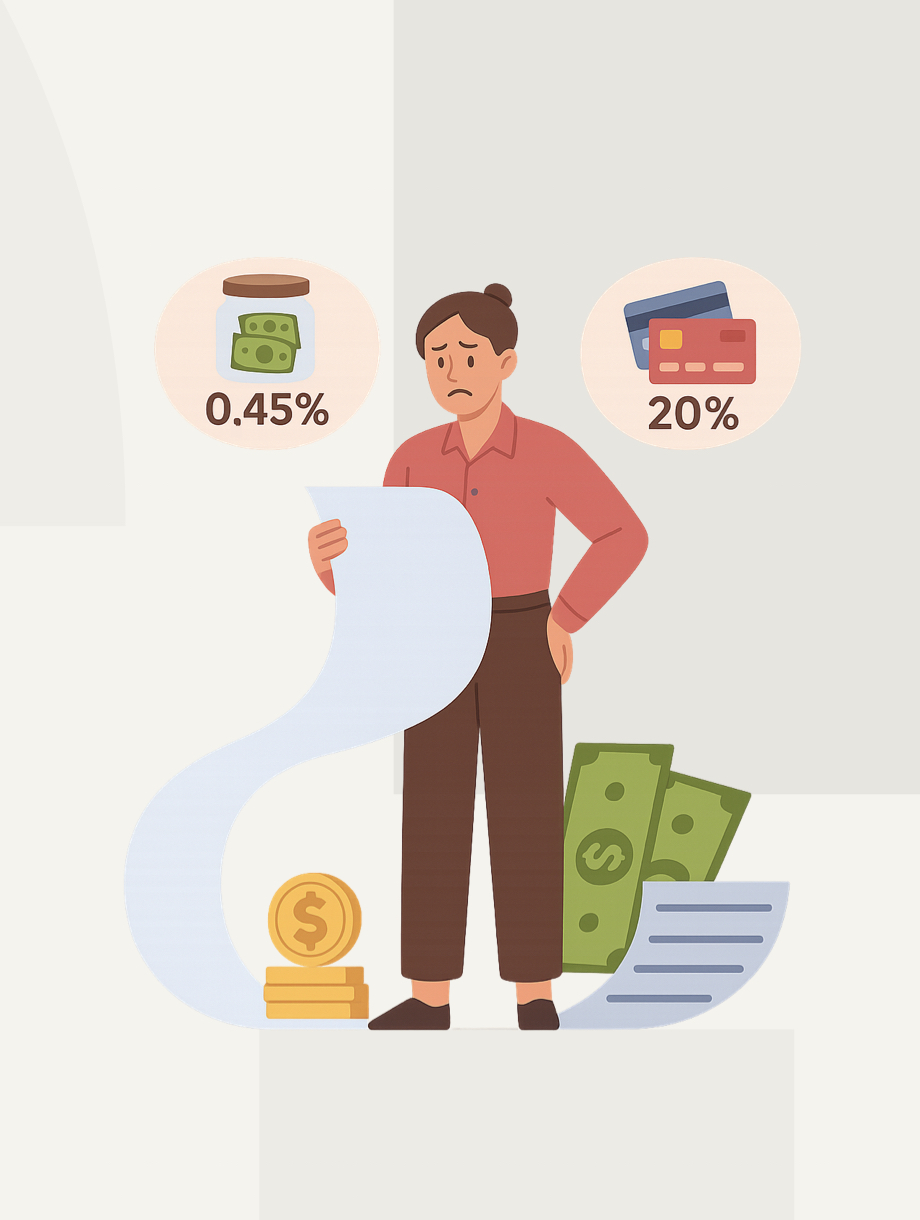
Why Knowing What “Bad” Really Means Can Change Everything About Your Financial Future
Right now, the average savings account in the U.S. earns just 0.45% interest. Everyone agrees—that’s not great. But do you really understand how bad it is?
Let’s break it down.
Americans have over $11 trillion sitting in traditional savings accounts, earning barely anything. That’s $11 trillion of hard-earned money, just sitting there—waiting, not working. It feels safe, sure. But it’s not helping people build wealth or even keep up with rising costs. In fact, that money may be quietly losing value over time thanks to inflation.
Meanwhile, banks aren’t letting it sit. They take those deposits and lend them out at 10, 15, even 20% interest—making huge profits in the process. They win. You don’t. That’s the real money illusion.
Maybe it’s time to ask a better question: What should your money be doing for you?
What Does 0.45% Actually Mean?
It may seem like a small number, but the reality is staggering. At 0.45%, your money takes about 160 years to double.
That’s not a typo.
Using something called the Rule of 72 (just divide 72 by your interest rate), you can estimate how long it takes your money to double. At 0.45%, most of us won’t see our savings double in our lifetime—or even in our children’s lifetime.
Now look at the other side: Credit card interest rates average over 20%. That means the money you save grows glacially, while the money you borrow doubles every few years.
It’s not just unfair. It’s devastating.
The $1 Trillion Trap
As of mid-2025, credit card debt in America passed the $1 trillion mark. With interest rates averaging 20%, here’s what that really means:
- Your $10,000 savings at 0.45%? It earns less than $500 over a decade.
- That same $10,000, loaned out by a bank at 20%? It grows to over $60,000 in 10 years.
One sits. One soars. The difference is what you know—and how you act on it.
This is the cost of not understanding how money works. It’s the cost of doing what feels normal, instead of what’s actually smart. It’s the difference between building wealth... and watching others build it with your money.
Why Do So Many Still Use Low-Yield Savings Accounts?
It’s not because people are careless. It’s because we’ve been taught to think “safe” means “smart.”
Let’s look at why most people still park their money in these accounts:
- Safety: FDIC insurance protects deposits up to $250,000. That gives people peace of mind.
- Habit: For generations, we’ve been told that saving in a bank is the right way to manage money.
- Convenience: It’s easy. Your money is accessible. No penalties, no delays.
But there’s a hidden cost: Every year, inflation quietly erodes your money’s purchasing power. You lose value—and don’t even realize it.
How Did We Get Here?
After the 2008 financial crisis, interest rates were cut to stimulate the economy—and they stayed low for over a decade. Even now, with recent rate hikes, the average savings account still offers just 0.45%.
Meanwhile, banks continue to profit—charging double-digit interest on everything from mortgages to car loans to credit cards. Your money earns pennies. Theirs earns billions.
The gap between what you earn and what they earn isn’t just wide—it’s growing.
What If You Saw Money Differently?
At TheMoneyBooks, we believe the biggest problem in personal finance isn’t lack of income—it’s lack of understanding.
That’s the illusion.
Millions of Americans are stuck in financial survival mode, not because they’re lazy or irresponsible, but because they’ve never been taught how money really works. They’re playing a game without knowing the rules.
Now imagine what happens when people do learn the rules.
- They stop relying on luck and start using strategy.
- They stop settling for scraps and start building something real.
- They stop being at the mercy of the system and start flipping the script.
It’s not about being perfect. It’s about being informed.
Linear vs. Exponential Thinking
Most middle-class Americans think about money in linear terms: Work hard, save a little, repeat.
But the wealthy? They think exponentially. They understand leverage, compound growth, and how to make money work for them—not the other way around.
This mindset shift doesn’t start with money. It starts with education. That’s where TheMoneyBooks comes in.
We’re here to make these ideas simple, accessible, and actionable for everyone.
So, What Can You Do?
Knowledge is power—but only if you use it. If you’re ready to break free from the money illusion, here’s how to start:
✅ Test your financial literacy at TakeTheFLQ.com. This fast, free quiz shows where you stand—and where to grow.
✅ Read one of TheMoneyBooks. These short, powerful books make personal finance simple, relevant, and practical—no jargon, no fluff.
✅ Talk about it. Share what you learn with friends and family. Change spreads when people start having better conversations about money.
Albert Einstein once said:
“Compound interest is the eighth wonder of the world. He who understands it, earns it. He who doesn’t, pays it.”
That’s not just a quote. That’s your call to action.
If you’ve ever felt like money is working against you, now’s your chance to flip the script. Take back control. Learn how money really works. And help build a future that actually works for you.
Because the truth is, your financial future isn’t just something that happens to you. It’s something you choose.
No Buy July

What We Learned and Why You Should Try It
If you’ve been scrolling through social media this month, chances are you’ve seen people talking about No Buy July. Maybe it was a friend sharing their weekly savings, a TikTok about resisting impulse buys, or an Instagram post celebrating a month of mindful spending.
No Buy July has been everywhere—and for good reason. It’s a simple, powerful challenge: spend only on the essentials for 31 days and hit pause on everything else. No takeout. No impulse Amazon orders. No “just because” shopping trips.
Now that July is wrapping up, it’s the perfect time to reflect on what this challenge was all about, what participants learned, and why it’s never too late to give it a try, even if you missed it this time around.
What Is No Buy July?
At its core, No Buy July is a 31-day spending freeze. The rules are simple: only spend on the essentials like groceries, bills, transportation, and health-related expenses. Everything else? On hold.
That means:
- No new clothes or shoes.
- No takeout or coffee runs.
- No random online shopping sprees.
- No “therapy-through-Target” moments.
It’s not about deprivation, it’s about awareness. It’s about taking a step back to see how much of your spending is driven by actual need versus habit, boredom, or stress. And for many, it’s been a game-changer.
What We Learned This Month
For those who joined the challenge, No Buy July wasn’t just about saving money, it was about gaining insight into their habits. Here are some of the biggest lessons participants shared:
1. Spending Is Often Emotional
Many people realized how often they shop to cope with stress, boredom, or even as a reward. No Buy July forced them to find healthier (and cheaper) ways to deal with those feelings, like journaling, exercising, or simply sitting with the discomfort.
2. Small Purchases Add Up
It’s not always the big-ticket items that drain your bank account. It’s the $5 coffee here, the $20 impulse buy there. By cutting out these “little” expenses, participants were shocked at how much they saved in just 31 days.
3. We Already Have Enough
From rediscovering forgotten items in their closets to getting creative with what they already owned, many people found that they didn’t need to buy more, they just needed to appreciate what they already had.
4. Saying “No” Feels Empowering
There’s something deeply satisfying about resisting the urge to spend. It’s not just about saving money, it’s about proving to yourself that you’re in control of your choices, not your impulses.
What If You Didn’t Join This Time?
If you didn’t participate in No Buy July, don’t worry, you’re not too late. The beauty of this challenge is that it’s not tied to the calendar. You can start your own spending freeze any time of year. Call it No Spend September, Mindful Money March, or just a personal reset—what matters is the intention behind it.
Here’s how to get started:
1. Set Your Rules
Decide what counts as an essential expense (groceries, bills, gas) and what doesn’t (takeout, clothes, subscriptions). Be honest with yourself about what you can realistically cut back on.
2. Pick a Timeframe
It doesn’t have to be a full month. Start with a week, two weeks, or whatever feels manageable. The goal is progress, not perfection.
3. Set a Goal
What will you do with the money you save? Whether it’s paying off debt, building an emergency fund, or saving for something special, having a clear goal will keep you motivated.
4. Find Substitutes for Spending
You’re not just cutting out spending, you’re replacing it with something better. Instead of:
- Shopping → Declutter your space
- Scrolling → Read a book or take a walk
- Impulse buying → Make a wishlist for later
Why It’s Worth Trying
No Buy July isn’t just about saving money—it’s about gaining clarity, confidence, and control. It’s about breaking free from the cycle of mindless spending and making choices that align with your values and goals.
Even if you only try it for a week, you’ll likely walk away with a new perspective on your habits, and a little extra cash in your pocket.
Ready to Start Your Own Challenge?
No Buy July is a mirror. It reflects our habits, our triggers, and our priorities. It pushes us to get honest about where our money’s really going, and where we’d rather it go.
We believe financial literacy isn’t just about numbers. It’s about decisions. The kind you make at a checkout line. Or in a text from a friend. Or while scrolling through sales.
This challenge isn’t about guilt. It’s about growth.
So whether you’re doing a full No Buy July, a Low Buy Summer, or just skipping Amazon this week—know this: every small shift counts.
Your future self will thank you.
The Psychology of Not Saving

Why Knowing Isn’t Enough
Most people know they should be saving more money. But most aren’t.
Sound familiar?
You’ve heard the advice. You’ve probably nodded along at a workshop or underlined a sentence in a book (hopefully one of ours). You’ve maybe even said to yourself, “This is the month I’ll finally get ahead.” Yet the bank account still looks lean, and the emergency fund? Not quite off the ground.
So what gives?
According to Vanguard’s 2025 Consumer Survey, 71% of Americans say they plan to shift their savings approach this summer—focusing more on emergency funds and flexibility.
That’s encouraging. But there's a problem: most people don’t actually follow through.
This is the knowledge-action gap. And it’s one of the biggest threats to your financial future.
Let’s explore what’s really holding people back—and what you can do to move forward.
The Willingness to Save Is There
The good news? People aren’t ignoring the importance of saving. In fact, 71% of those surveyed want to shift their financial behavior this summer to focus on more intentional saving.
But despite the motivation, many Americans struggle to act on it. When asked what’s standing in the way:
- 28% said they don’t have enough time
- 28% said they don’t have enough money
- 24% said they don’t know where to start
These aren’t signs of laziness or irresponsibility. They’re signs of overwhelm. People want to save, but they feel stuck, scattered, or just plain unsure.
Why Good Intentions Aren’t Enough
At TheMoneyBooks, we’ve seen this over and over again: most people don’t need more information—they need more clarity, coaching, and next steps.
Let’s look at the three most common barriers.
1. “I don’t have time.”
Between work, family, and constant distractions, many people feel like there’s no space left for managing money. But often, “I don’t have time” is just another way of saying, “I don’t know where to start.”
Building a savings habit doesn’t require hours a week. It might take just 15 minutes to open a dedicated account or automate a deposit. The issue isn’t time—it’s priority.
When saving becomes part of your system instead of another item on your to-do list, it gets a lot easier.
2. “I don’t have enough money.”
This one feels real—especially when groceries, gas, and rent keep climbing.
But here’s the truth: saving isn’t about the amount. It’s about the habit.
Even if all you can spare is $5 a week, that small, consistent action builds momentum. It creates identity: I’m someone who saves. And that identity shift changes everything.
Waiting until you “have more” to begin saving is like waiting until you're fit to join a gym.
Start with what you have.
3. “I don’t know where to start.”
Nearly 1 in 4 Americans say they’re overwhelmed by the idea of creating a savings strategy. And we get it—the financial world can feel like alphabet soup: APY, CD, HSA, ETF...
This is where working with a financial educator can make a big difference.
You don’t have to figure it all out on your own. Just take the first step, and let someone experienced help you map out the rest.
Americans Are Feeling Financially Strained
Vanguard’s survey also highlights how emotionally loaded saving can be. In a climate of economic uncertainty, families are feeling vulnerable.
- 67% are unsure if they can stick to a savings plan this summer because of market volatility
- 63% expect to overspend on everyday needs like groceries or surprise expenses like home repairs
- 64% admit they don’t fully understand how interest rates affect their savings
That last one is especially important.
If you don’t understand how interest rates work, you might leave your money in places where it barely grows—or worse, loses value due to inflation.
But again, this isn’t a knowledge problem. It’s a confidence problem. And the antidote is financial education—the kind that leads to action.
Why Saving Without Strategy Isn’t Enough
Let’s say you’ve been putting away some money here and there. That’s great. But where you save matters too.
According to the Federal Deposit Insurance Corporation (FDIC), the average interest rate on a traditional savings account in May 2025 was just 0.42%.
That’s less than half a percent return on your money.
If you’re trying to build an emergency fund—or just earn a little interest while you save—that’s not going to cut it.
This is why financial literacy matters. You don’t need to be an expert, but you do need to know enough to make your money work for you—not sit idle.
A financial educator can help walk you through safe, smart options that offer better interest rates while still keeping your funds liquid and accessible.
The Cost of Doing Nothing
Let’s do some quick math.
Suppose you’ve been saving $10,000 in a traditional savings account earning 0.42%. That’s just $42 a year in interest.
Now imagine that same $10,000 earning 3.5%—a rate you can find in many insured accounts or cash alternatives.
That’s $350 a year, without doing anything extra.
It’s not just about saving—it’s about maximizing what you save.
When people say they feel like they’re falling behind financially, this is one of the reasons why. They’re putting money away, but it’s not growing. And without knowing it, they’re losing ground.
What Happens When You Actually Start?
Let’s flip the script.
What if instead of waiting for the perfect time to start saving, you decided to act today?
Even small steps create forward motion. That motion creates momentum. And that momentum leads to confidence and control.
We often say: action is the cure for anxiety. That’s true with saving too.
You don’t need to be perfect. You don’t need a financial windfall. You just need to begin.
And the best part? You don’t have to do it alone.
Meet with a Financial Educator
If you feel stuck or unsure, reach out to a financial educator. Not a salesperson. Not a pitch. A real, trained guide who can walk you through your options, show you how to take the first step, and help you build a plan that works for your life.
Working with a financial educator is like turning on your GPS. You still drive—but now you know where you’re going, and how to avoid the potholes along the way.
A Smart Saver’s Checklist
Here’s a simple, five-step plan to get started:
✅ Open a separate savings account (keep it out of sight, out of mind)
✅ Automate a deposit—start with $10/week if that’s all you can do
✅ Track your spending for one week to find hidden leaks
✅ Set a short-term savings goal, like $500 in three months
✅ Schedule a meeting with a financial educator to create a real plan
Remember: You don’t have to know everything. You just need to be willing to learn.
Final Word: The First Step Is the Most Important
You’re not behind. You’re not too late. And you’re not the only one who feels unsure.
But the difference between those who struggle financially and those who succeed often comes down to this:
They didn’t wait. They started.
If you’re ready to move from knowing to doing, we’re here for that. If you want help, meet with a financial educator today and get the support you need to take control of your savings, one decision at a time.
Start with one step. Let it snowball. Let your future self thank you.
Because when it comes to your money, clarity is power—and action is freedom.
Boomerang Kids

What Happens When “Later” Becomes “Now”
In 2025, it’s become more common than ever for young adults to return home.
They’re not teenagers. They’re not on summer break. These are grown children—some with degrees, jobs, or families of their own—moving back in with their parents.
According to Thrivent’s 2025 Boomerang Kids Survey, 46% of parents in the U.S. report that one or more of their adult children (ages 18–35) have moved back home. And for many families, this isn’t a temporary pause. It’s a new phase of life that’s forcing everyone to rethink what independence really means.
But while the reasons are wide-ranging, one root cause shows up again and again: a lack of financial readiness.
That’s where HowMoneyWorks for the Next Generation: Act Now or Pay Later comes in. Because the only way out of this cycle is to stop postponing financial education.
What’s Driving This Trend?
The data is clear.
Boomerang kids aren’t coming home because it’s convenient. They’re coming home because the cost of independence has skyrocketed.
According to the Thrivent survey:
- 32% of boomerang parents say the top reason their adult child returned home was unaffordable housing.
- The average federal student loan debt in 2024 was $37,853 per borrower, up from $27,759 a decade earlier.
- Wages have stagnated. For young men without a college degree, inflation-adjusted earnings are still lower than they were several years ago.
- Labor force participation among young men has declined over the long term.
- Divorce or separation is the second-leading cause of adults moving back in, cited by 1 in 5 parents.
These aren’t just statistics. They represent real challenges for young adults trying to launch into the world—and often falling short.
And while the reasons may be out of their control, the preparation doesn't have to be.
What It’s Costing Families
While the return home might create opportunities for reconnection, the financial toll is hard to ignore.
Thrivent reports:
- 38% of parents say the move has impacted their savings for long-term goals like retirement.
- 39% say it has disrupted their ability to save for short-term goals such as travel or home improvements.
- 55% of parents say they’ve had to reduce financial support in other areas.
The impact isn’t just on the young adults. It’s hitting the parents hard, too—especially those nearing retirement age. And as HowMoneyWorks for the Next Generation explains, waiting until "later" to prepare financially can come at a steep cost.
The Real Problem No One Taught Them to Solve
What do all these stats have in common?
They point to a generation that’s been under-equipped to handle financial life in the real world.
HowMoneyWorks for the Next Generation makes one thing painfully clear: most young people were never taught how money actually works. They didn’t learn how to build a budget, manage debt, understand insurance, or prepare for the unexpected. They were pushed toward degrees and jobs, but never given the roadmap to turn income into confidence for the future.
As a result, many of them learned the hard way—through debt, default, and delayed dreams.
That’s why the subtitle of the book isn’t just a slogan. It’s a warning: Act Now or Pay Later.
Because when financial literacy is postponed, the price is almost always paid later. In stress. In setbacks. In moving back home when you were supposed to be building your future.
The Path Forward Starts With Financial Literacy
The TheMoneyBooks series introduces readers to the 7 Money Milestones—a simple, proven framework for financial success. These aren’t buzzwords. They’re actionable steps:
- Financial Education
- Proper Protection
- Emergency Fund
- Debt Management
- Cash Flow
- Build Wealth
- Protect Wealth
These are the skills that transform boomerang kids into financially independent adults.
They help turn setbacks into launchpads. Confusion into confidence.
And for families currently living through this new normal, there is no better time to learn them than right now.
A Wake-Up Call, Not a Judgment
Let’s be honest—this isn’t easy.
No one dreams of moving back in with their parents. And no parent plans for their 30-year-old to be back under the same roof.
But this isn’t about shame or blame. It’s about opportunity.
If you’re in this season, it’s not too late to start building financial skills that last a lifetime. Whether you’re the parent or the young adult, this is your chance to take control—before life forces your hand again.
Don’t wait for perfect conditions. Start with what you have. Learn what you were never taught. And most importantly, begin the journey toward financial freedom—not just movement, but momentum.
Get Started Today
If your family is experiencing the boomerang effect, now is the time to learn together. HowMoneyWorks for the Next Generation is more than a book—it’s a financial wake-up call.
✅ Learn the 7 Money Milestones
✅ Discover how to avoid common traps like consumer debt and unprotected risk
✅ Understand why budgeting, saving, and investing are non-negotiables
✅ Take action today—so you’re not forced to pay the price tomorrow
Because independence isn’t just about moving out. It’s about moving forward.
Act Now. Teach Now. Plan Now.
Because waiting only makes the cost higher.
How to Avoid Graduating with $40,000 in Student Loan Debt

It’s official: the class of 2025 is stepping into college with the potential to graduate owing $40,000 in student loans. According to a recent NerdWallet analysis, nearly half of U.S. high school grads this year are heading to four-year colleges—and more than one-third of them are relying on student loans to get there. With federal student loan interest rates at a decade high, now more than ever, the question for students and families is: how can we avoid this debt trap?
Well the good news is there are smarter ways to navigate college costs. With a little planning, a better understanding of how money works, and some strategic choices, you can avoid starting your adult life deep in debt.
Why This Is a Big Deal
Student loans aren’t just numbers on a page. They follow you.
They can delay life goals like buying a car, renting an apartment, or saving for your future. And depending on the interest rate, you could end up paying back a lot more than you originally borrowed.
The problem is, most students don’t get a clear explanation of how borrowing really works. It’s no surprise—money basics like interest, budgeting, and debt aren’t often taught in school.
That’s why financial literacy matters now more than ever.
What Financial Literacy Can Do for You
When you understand how money works, everything changes. You start asking better questions. You compare options. You make decisions with your future in mind—not just the next semester.
Books like How Money Works For The Next Generation were created to fill in the gaps school doesn’t cover. It’s written with young people in mind and breaks down important concepts—like how compound interest works, how debt builds up over time, and why your early financial choices matter so much.
You don’t have to memorize everything or become a financial expert. But having a basic foundation can help you avoid some big, expensive mistakes.
10 Ways to Cut Down on Student Debt
Here are ten ways students and families can reduce (or even avoid) the need to borrow heavily for college:
1. Start at a Community College
Completing general education credits at a lower cost and transferring later can save thousands.
2. Pick a School That Fits Your Budget, Not Just Your Dream
It’s okay to be practical. Look at total cost, scholarship availability, and graduation rates before deciding.
3. Apply for FAFSA Early—Every Year
Federal aid, grants, and work-study opportunities start with this form. Don’t skip it.
4. Treat Scholarships Like a Part-Time Job
There are scholarships for everything from academics to community service to personal interests. Apply often.
5. Borrow Only What You Truly Need
Just because a loan is offered doesn’t mean you have to accept the full amount.
6. Get a Part-Time Job During School
A few hours a week can cover books, meals, or transportation—and reduce your need to borrow.
7. Live Simply While in School
This isn’t forever. Roommates, used books, and home-cooked meals can save you a lot now—and give you more freedom later.
8. Start Making Small Payments Now
Even while in school, making interest payments on your loans can prevent your balance from growing.
9. Understand How Interest Works
The more you know about how interest grows over time, the more cautious you’ll be with borrowing. Even simple concepts—like the Rule of 72—can change how you think about loans and credit.
10. Start Learning Now
The earlier you understand money, the more control you’ll have over it. Learning how to manage, budget, and build wealth doesn’t take a degree—it just takes a little time and curiosity.
You Don’t Need All the Answers Today—But You Do Need a Plan
No one expects you to figure out your entire financial life before you finish high school. But starting with the basics now can make a huge difference later.
Whether it’s talking to a financial professional, reading a book, watching videos, or asking questions—what matters is that you take that first step. Not because someone told you to, but because your future is worth it.
Financial literacy won’t just help you get through college. It’ll help you get ahead—on your own terms.
Want to learn more about student loans, saving strategies, and how to make money work for you instead of against you?
Books like How Money Works For The Next Generation are a good place to start. They won’t tell you what to do—they’ll help you understand your options.
Because once you know how money works, you can Stop Being a Sucker® and get to call the shots.
Honoring Heritage, Building Confidence

Financial Literacy and the AAPI Community
As we close out Asian American and Pacific Islander (AAPI) Heritage Month this May, let us take time to recognize the deep cultural contributions and growing influence of a vibrant, diverse community in the United States.
This month has been a time to shine a light not just on heritage, but also on opportunity. Because while the AAPI community continues to thrive in many areas, there remain significant challenges when it comes to financial confidence and access to trusted guidance.
A Passion for Financial Empowerment
I am a second generation immigrant and was hugely influenced by the example set by my Filipino father, Juan Santos Asuncion, for hard work and the importance of education. As I grew up, my father shared with me and my sisters stories of unimaginable hardship, especially during World War II. For him, higher education and moving halfway around the world were the way out of poverty. As a highly respected anesthesiologist in Kentucky (everyone called him Dr. John), he knew how to make a good living to provide for his family but he had little understanding of how to use his hard-earned income to create wealth.
Following his lessons about hard work and higher education, I pursued a career as an attorney and corporate executive with one of the largest financial services firms in the country. In those roles, I saw firsthand how confusing and intimidating the financial system could be—especially for women and people from underrepresented communities.
My family and professional experiences led me to shift my focus. I wanted to help families better understand how money works. I wanted to bring financial education to the forefront, especially for groups who often feel overlooked or misunderstood by the financial industry.
And that mission has never felt more urgent than it does today.
A Community on the Rise
Fidelity Investments published research that provides a valuable window into the financial wellness of Asian Americans and Pacific Islanders. The findings are both inspiring and instructive.
Although the AAPI community currently represents just 7.3% of the total U.S. population, we are the fastest growing racial group and are expected to quadruple by 2060 to more than 47 million people. Our economic footprint is expanding too—with a projected $1.6 trillion in spending power this year alone.
More importantly, the data shows that this community is proactive, forward-thinking, and deeply committed to building a secure future:
- 67% of AAPI individuals are happy with their saving habits, compared to 60% of the general population.
- They were less likely to tap into emergency savings during financial setbacks (35% vs. 45%).
- More AAPI respondents had money left over after expenses (26% vs. 21%).
- Many are motivated by long-term goals, such as achieving a comfortable retirement (44% vs. 37%) and the possibility of retiring early (22% vs. 16%).
These habits speak volumes about the financial discipline and determination that runs deep in the community.
The Confidence Gap
And yet, despite these strong behaviors, there is a gap when it comes to financial confidence and engagement with professional advice. A MassMutual research study identified several key points of disconnect between reality and perception:
- AAPI individuals often have higher incomes and more investable assets to invest; but only 1 in 4 works with a financial professional.
- Most are not comfortable with their current financial situation (29% vs. 42%) and are less hopeful about reaching their lifetime financial goals (43% vs. 61%).
- Many are plagued with feelings of stress and anxiety when thinking about their financial future.
There are a several reasons for this including cultural and language barriers, lack of access, and difficulty trusting people outside their community. For immigrants who grew up in devastating poverty, fears of scarcity and financial instability are deeply rooted.
The financial services industry has been slow to show up for the AAPI community. When people don’t feel understood or represented, they may hesitate to seek out guidance—even when it could make a significant difference.
In my work, I’ve seen how powerful the right financial guidance can be—especially when it’s delivered with cultural understanding and personal respect. It doesn’t just improve numbers on a spreadsheet. It transforms lives.
Family, Education, and Generational Legacy
What makes the AAPI community so inspiring is that its financial goals are not just personal—they’re deeply interwoven with family and legacy.
One in three AAPI households is multi-generational. That means many individuals are not only planning for their own futures but also providing care for aging parents and investing in the education of their children. This balancing act is as noble as it is demanding.
At a time in my life when many of my friends are downsizing and retiring, I decided to upsize by buying a bigger house and filling it with my family, including my sister and her teenage daughter, my son and his new wife, and my now 87-year old mother. It is a loud and sometimes messy household of laughter and love. My family is incredibly important to me and knowing how money works makes my lifestyle possible.
As a financial educator, I believe this kind of long-term, family-centered mindset is one of the greatest strengths the AAPI community brings to the conversation around money. It’s something to be celebrated—and supported.
A Way Forward
Through our TheMoneyBooks series, we’ve dedicated ourselves to making financial literacy accessible to everyone—regardless of background, income, or experience. We believe that confidence doesn’t come from wealth. It comes from understanding.
That’s why it’s so important to provide culturally relevant education, increase representation in financial leadership, and build bridges of trust with every community.
Because when people feel seen and heard, they feel empowered. And when they understand how money works, they stop being afraid of it—and start using it to create the future they imagine.
AAPI Heritage Month: A Time to Reflect and Act
This month is a powerful opportunity to reflect not just on the history and heritage of the AAPI community, but on the work that still lies ahead.
Financial literacy is one of the most important—and most overlooked—drivers of opportunity. It can shape a child’s future, relieve the burdens of caregiving, and lay the foundation for lasting generational wealth.
So to the AAPI community, I say this: Our values, our dedication, and our vision for the future are already changing the world. Now is the time to pair those strengths with financial knowledge that supports our goals, our family, and our legacy.
Whether you’re just starting out or decades into your financial journey, know that you are not alone. Resources are available. Trusted guides exist. And your voice matters.
Let’s make this month not just a celebration, but a commitment—to greater confidence, greater clarity, and greater control over our financial futures.
— Kim Scouller
Kim Scouller is a financial educator, attorney, and author of How Money Works for Women: Take Control or Lose It. She has led legal and executive teams at one of the nation’s largest financial firms and now works to advance financial literacy across all communities. Kim is based in the Atlanta area and serves as a leading voice in the movement to empower women and underrepresented groups through education.
https://newsroom.fidelity.com/pressreleases/fidelity-investments-publishes-new-research-on-the-financial-wellness-of-asian-americans-and-pacific/s/3de8ab55-755c-4c24-a9e7-a3ded40c6616
https://blog.massmutual.com/planning/asian-american-community-finances
Pay Yourself First, Even After You Stop Working

You’ve likely heard the age-old financial wisdom: “Pay yourself first.” It’s one of the most powerful principles in personal finance. It means setting aside savings before spending on anything else. It’s the cornerstone of building wealth, developing discipline, and reaching long-term goals.
But there’s a part of this advice that doesn’t get nearly enough attention.
What happens after you stop working?
Most people know how to save for retirement. But few know how to spend in retirement. It turns out, “paying yourself first” isn’t just about accumulating wealth during your working years — it’s also about strategically distributing it during your retirement years.
And the way you do it can make all the difference in your financial stability, peace of mind, and even your legacy.
The Forgotten Side of “Pay Yourself First”
Let’s rewind for a moment. The advice to “pay yourself first” came as an antidote to the paycheck-to-paycheck lifestyle. It was designed to shift your mindset from spending now and saving what’s left (which is usually nothing) to saving first and spending what remains.
It helped people build emergency funds, invest, get properly insured while they were still healthy, and grow long-term security — all key ingredients for financial independence later in life.
But that mindset can’t simply disappear the moment you retire.
In fact, retirement is when you need it the most.
Because in retirement, you’re the boss. You’re the paycheck. The systems and habits you built during your working years will shape the rest of your life — for better or worse.
Your Paycheck Has Stopped. Your Need for Income Hasn’t.
Imagine your retirement income sources like a series of faucets — Social Security, pensions, cash-value life insurance, annuities, investment accounts, maybe a rental property. For years, you’ve been pouring money into those pipes. Now it’s time to open the taps.
But how much water comes out? How often? And from which source first?
Most retirees don’t realize that the sequence and strategy of their withdrawals — what we might call “paying yourself first after work” — can dramatically impact how long their money lasts.
For example:
So instead of a wild free-for-all, you need a distribution plan — a new version of “pay yourself first.”
The Three Retirement Phases — And How to Pay Yourself First in Each
1. The Go-Go Years (60s to early 70s)
This is when you’re freshly retired. You’re healthy. You want to travel, try new hobbies, enjoy time with family, maybe even launch a small business or volunteer.
These are your most active years — and often your most expensive.
Commonly Used Strategy: Pay yourself from your most flexible accounts first (like brokerage or after-tax accounts). This gives your tax-deferred accounts time to grow and avoids triggering unnecessary tax bills early on.
Why Pay Yourself First Now: You want to fund the lifestyle you envisioned. If you’ve saved diligently, this is your chance to use your money, not hoard it. These years won’t last forever.
2. The Slow-Go Years (mid-70s to early 80s)
Now you’re slowing down. Health care may become a bigger expense. Travel may taper off. You may move to a smaller home or closer to family.
Commonly Used Strategy: Start drawing more from your registered retirement accounts — especially as Required Minimum Distributions (RMDs) kick in at age 73. If you’ve delayed Social Security until now, you’ll likely receive a higher monthly check.
Why Pay Yourself First Now: This is when financial clarity becomes more important than ever. You’re no longer “winging it.” You’re living a carefully managed plan. Paying yourself first here means ensuring your needs are met, your taxes are minimized, and your health costs are covered.
3. The No-Go Years (late 80s and beyond)
At this stage, many retirees need help with daily tasks. Some move into assisted living. Others hire in-home care. Expenses may rise again — especially in healthcare.
Commonly Used Strategy: Time to leverage insurance (including long-term care or life insurance with living benefits), home equity (if needed), and conservative income sources (like annuities or bond ladders). Your goal now is stability.
Why Pay Yourself First Now: This is the season where comfort, dignity, and independence matter most. It’s not just about you anymore — it’s about protecting your loved ones from financial burden.
The Problem with “Just Spend What You Need”
Too many retirees “wing it.” They think they’ll just spend less, or “figure it out as they go.”
But retirement isn’t a 30-day budgeting problem. It’s a 30-year cashflow engineering challenge.
Think about it:
- Inflation will raise the cost of everything over time.
- Markets will go up and down.
- Your health needs may change rapidly.
- Your family may need your help — or you may need theirs.
So here’s the truth:
Spending without a plan is one of the most dangerous things you can do in retirement.
“Paying yourself first” in retirement means planning your withdrawals as intentionally as you planned your savings. That might include:
- Having a clear income floor (guaranteed sources like Social Security or annuities)
- Having a “bucket strategy” (dividing your assets into short-, mid-, and long-term)
- Having an annual check-in to rebalance and adjust for changes
Psychological Payoffs: Peace of Mind and Permission to Enjoy
One of the most surprising benefits of a spending plan is emotional.
Many retirees don’t spend enough — even when they can.
They’re afraid of running out. Or they feel guilty about spending. Or they never adjusted their mindset from “saver” to “spender.”
A well-thought-out retirement income plan gives you something incredibly valuable: permission.
Permission to take that trip.
Permission to remodel the kitchen.
Permission to support a grandchild’s education.
Permission to enjoy what you’ve worked a lifetime to build.
Because when you know where your income is coming from, and that it’s sustainable, you can finally stop worrying and start living.
Don’t Let Uncle Sam Take the First Cut
There’s one more reason why this idea of “paying yourself first after retirement” matters — taxes.
Too many retirees pay more in taxes than they need to, simply because they don’t withdraw their money in the right order.
For instance:
- Taking Social Security too early can increase your taxable income.
- Not managing RMDs can push you into a higher bracket.
- Not considering Roth conversions or tax-loss harvesting can leave money on the table.
Tax planning in retirement is just as important as it was before. But now the focus shifts from tax deferral to tax-efficient withdrawal.
And it’s not just about this year’s tax bill — it’s about maximizing your income across the next 30 years.
Legacy: Paying Yourself First Means Leaving Something Behind
Finally, don’t forget: if you plan well, paying yourself first in retirement also means paying your values forward.
Whether that’s:
- Leaving a financial legacy for your children
- Giving to causes you care about
- Creating a family foundation
- Funding grandkids’ college education
Retirement income planning isn’t just about you. It’s about the impact your resources can have — during your life and beyond it.
You worked hard to build your wealth. Paying yourself first in retirement means making sure it lasts, does good, and reflects who you are.
Final Thoughts: Be the CFO of Your Retirement
Retirement doesn’t mean your financial life is on autopilot. If anything, this is the most complex financial stage of your life.
You’re managing income, taxes, health costs, market risk, and family expectations — all while trying to enjoy your time. So treat your retirement like a business.
Be the CFO.
Set up systems. Monitor your “cashflow statements.” Review your “balance sheet.” Project forward. Make adjustments.
Because this isn’t just about surviving. It’s about thriving.
Now — this may sound hard or overwhelming, and that’s completely normal. Most people were never taught how to spend in retirement. But here’s the good news: you don’t have to figure it out alone.
Working with a qualified financial professional can help you design a personalized withdrawal strategy, manage taxes efficiently, protect your income, and give you the confidence to actually enjoy what you’ve worked so hard to build.
And remember — everyone’s situation is different. Your income sources, goals, risk tolerance, and family dynamics are unique to you. There may be options and opportunities available that you haven't even considered yet.
You spent your whole career paying yourself first to build the future. Now’s the time to live that future — intentionally, confidently, and with purpose.
Pay yourself first. Right now. Whatever your now is.
Money Lessons from the Woman Who Raised You

A Mother’s Day Tribute to Financial Wisdom Passed Down
Every May, we take a moment to celebrate the women who shaped us. These are the mothers, grandmothers, aunts, sisters, and guardians who taught us, challenged us, and supported us through life’s ups and downs. Mother’s Day is a chance to thank those who stayed up late to help with science projects, offered us comfort when we needed it most, and quietly modeled resilience.
Beyond love and support, however, there’s another gift many of us received from these women that doesn’t get enough recognition: financial wisdom.
For many of us, our first money lessons didn’t come from teachers or books. They came from the women in our lives who led by example. They taught us how to think about money, often in simple, everyday ways that left a lasting impact.
This Mother’s Day, we honor these financial lessons passed down through generations. And as Sharon Lechter and Kim Scouller illustrate in How Money Works for Women: Take Control or Lose It, these lessons gain even more power when supported by education and strategy. Here’s how the financial wisdom of the women in our lives continues to shape our choices today.
1. "That’s Not What We Came Here For" – Staying Focused
Remember being at the store, eyeing a candy bar or toy? You’d ask for it, and she’d say, “That’s not what we came here for.” It may have stung, but it was your first lesson in impulse control.
Today, in a world of swipes and one-click purchases, that lesson has never been more relevant. Impulse buys add up quickly, but learning how to stick to your goals pays off in the long run.
Sharon and Kim emphasize this in their book by urging women to eliminate unnecessary expenses. It’s not about deprivation; it’s about staying focused on what truly matters and aligning spending with long-term goals.
2. "Put It in Your Piggy Bank" – The Value of Saving
Birthday money, chore allowances, lemonade stand earnings—we’ve all been told, “Save some of it.” Maybe it seemed overly cautious back then, but that small lesson planted the seeds of saving and, eventually, investing.
HowMoneyWorks for Women: Take Control or Lose It shines a light on just how crucial those early saving habits are. Women often cite not investing earlier as a top financial regret. The book emphasizes that even small amounts saved consistently can grow into significant wealth over time.
The message was simple but powerful, and it aligns perfectly with the book’s core idea: save now so you can secure your future.
3. "Let’s Sit Down and Figure This Out" – The Power of a Plan
Can you recall moments when you saw her at the kitchen table with bills, a checkbook, and a calculator? She wasn’t just paying bills; she was managing the household like a CFO.
She knew how much was coming in, how much was going out, and what was needed to keep everything afloat. That’s budgeting in its truest form.
Sharon and Kim echo this lesson in their book, encouraging women to know their financial situation inside and out. By tracking income, expenses, debts, benefits, and savings, you take control of your financial future. Watching her piece together a budget wasn’t just about getting by in the moment; it was about building stability.
4. "We Can’t Afford That Right Now" – Delayed Gratification
Hearing “no” as a child wasn’t fun, but there was wisdom behind it. When she said, “We can’t afford that right now,” she was teaching you delayed gratification.
This skill is key to good financial habits. Sure, “not yet” might have been frustrating, but it taught you patience and how to prioritize.
Sharon Lechter’s “Two Minute Rule,” shared in How Money Works for Women, builds on this lesson. When tempted to make an impulse purchase, pause for two minutes. Often, the urge will pass, and you’ll avoid unnecessary spending. It’s a modern twist on an age-old lesson about putting off small, fleeting rewards for bigger, lasting ones.
5. "Money Doesn’t Grow on Trees" – Respecting Hard Work
Ah, the classic line! Back then, it might have elicited an eye roll, but now it’s clear what she meant. Earning, respecting, and managing money takes effort.
She showed you how to stretch a dollar, avoid debt traps, and make thoughtful spending choices. You didn’t need a lecture on interest rates or compound growth to understand the basics of financial respect.
How Money Works for Women expands on this idea by breaking down how to distinguish between good and bad debt and by explaining the power of compound interest. While she may not have explicitly taught you the Rule of 72, those lessons about working with what you have and not living beyond your means paved the way for understanding these advanced principles.
6. She Made It Work, No Matter What
The women who raised us didn’t just budget; they led by example. They sacrificed, planned, and kept going even when times were tough. They made do with less so we could have more. That’s financial leadership in action.
How Money Works for Women encourages all of us to become this kind of leader in our own lives—to plan, protect, save, and build a financial legacy to pass down. The resilience and ingenuity of the women who raised us serve as a model to follow and build upon.
This Mother’s Day, Carry It Forward
Mother’s Day isn’t just about honoring the women who taught us how to love. It’s about celebrating the ones who gave us the tools to build a secure, independent future.
Take this opportunity to pass on the financial wisdom you’ve learned. Sharon Lechter and Kim Scouller emphasize in How Money Works for Women that you don’t need to know everything to make a difference. What matters is starting, learning, and sharing.
Here are a few ways to begin carrying the lessons forward:
- Check your finances and revisit your goals.
- Talk about money with someone younger.
- Start saving or investing, even if it’s baby steps.
- Share your knowledge with others in your community.
The financial lessons we gain from these women don’t just shape our choices; they shape our futures and ripple through generations.
To the moms, grandmothers, aunts, mentors, and strong women who continue to teach us the value of money and hard work—we thank you. And to everyone learning and passing it forward, here’s to building a legacy of financial wisdom.
Happy Mother’s Day!
Financial Literacy Is Fading with Age

Here’s What the Research Shows—and Why It Matters to Everyone
We all expect to slow down a little as we age. But what if part of what slows down is our ability to understand money?
That’s exactly what a groundbreaking study from researchers at Wharton and Rush University Medical Center just confirmed: financial literacy tends to decline with age, and that decline can quietly erode a person’s independence, wealth, and decision-making confidence in retirement.
If you think this only affects people over 80, think again. This isn’t just a retirement issue—it’s a life planning issue. And the earlier we understand what’s at stake, the better equipped we’ll be to face it.
The Big Question: Does Financial Literacy Decline With Age?
Yes. And the data is clear.
The study followed 1,075 adults aged 60 and up (average age 81) over an average of six years, with some participants being followed for up to 13 years, researchers found that:
- Financial and health literacy scores dropped about 1% per year.
- Men started off with higher financial literacy scores than women—by about 9 percentage points—but both genders declined at similar rates.
- Health literacy dropped slightly faster than financial literacy.
- Only 13% of participants avoided any decline at all—the vast majority saw their understanding fade gradually over time.
This decline happened across income levels, education levels, and even among people without dementia. In other words, this isn’t about memory loss or disease—it’s a natural result of aging.
Why This Matters More Than Ever
Let’s zoom in for a second on why this should matter to everyone—especially those in their 40s, 50s, and 60s.
As we age, our financial decisions get more important—not less.
Think about the choices older adults face:
- When to claim Social Security
- Whether to take a lump sum or annuity
- How to manage required minimum distributions (RMDs)
- How to avoid scams and fraud
- Which Medicare or long-term care plan is best
These aren’t just “money” decisions. They’re life decisions. And they often come at a time when we may no longer be at our best financially.
Women Face an Even Greater Risk
While both men and women decline at similar rates, the study revealed that women started at a disadvantage.
They had lower financial literacy scores to begin with, even though they lived longer. And that combination—less knowledge, longer life—can be dangerous.
Many women outlive their spouses and then become responsible for managing retirement income, investments, and estate issues on their own—often for the first time. Without a strong foundation of financial literacy, this can feel overwhelming or lead to costly mistakes.
Health Literacy Matters Too
This study didn’t just measure financial knowledge—it also looked at health literacy. And the results are just as important.
Health literacy is your ability to understand things like:
- Prescription instructions
- Medicare benefits
- Insurance coverage
- Risk information from doctors
- End-of-life care decisions
Just like with finances, health literacy declines over time. And just like with finances, those declines make you more vulnerable—to confusion, bad decisions, or unnecessary hardship.
What’s Causing the Decline?
Researchers don’t pinpoint a single cause, but they do suggest some likely culprits:
- Cognitive aging – Natural changes in brain function can affect how we process numbers, terms, and risk.
- Less financial engagement – Retirement often leads to a “set it and forget it” mindset, reducing the need to actively manage money.
- Stress, illness, and loss – Life’s challenges can make decision-making harder, especially with complex topics.
Importantly, this decline can happen even to people who were once financially savvy. It’s not about intelligence. It’s about how age slowly changes the way we take in and act on information.
So What Can We Do About It?
That’s the good news: there are things we can do—starting today.
Here are six practical steps that can help you protect your future self (or help someone you love do the same):
1. Build Your Financial Literacy Now
The earlier you learn how money works, the longer you’ll benefit. Whether you’re 35 or 65, get educated and stay sharp. Use books, videos, quizzes, or one-on-one conversations with a financial professional.
2. Simplify Your Finances
As you age, simplicity is power. Consolidate accounts. Create clear plans. Make your financial picture easier to manage—not harder.
3. Set Up Trusted Contacts
Most investment firms now allow you to name a “trusted contact”—someone they can call if something seems off. It’s a smart layer of protection.
4. Create a Decision-Making Framework
Use checklists or written guides to walk through important decisions. These tools can help reduce errors later when your energy—or clarity—is lower.
5. Engage Your Spouse or Family
Don’t go it alone. If one partner handles all the finances, make sure both are up to speed. If you have adult children, include them in high-level plans.
6. Work with a Financial Professional
An experienced, trusted financial educator or professional can help you navigate decisions, explain your options, and keep your plan on track—even when life gets complicated.
Final Thoughts: Plan Now, Benefit Later
The study confirms what many people experience firsthand: the older we get, the more we need help understanding the financial world around us.
But this doesn’t have to be a crisis.
It can be a chance.
A chance to:
- Build up your financial literacy before you need it most
- Create systems that protect your future self
- Make decisions today that will serve you for decades
- Help the people you love—parents, grandparents, friends—do the same
Financial literacy may fade with age. But with the right tools, guidance, and planning, your confidence doesn’t have to.
Let’s stay sharp. Let’s stay prepared. Let’s teach the next generation how money works—before the moment they really need it.
Ready to start? Take the Financial Literacy Quiz, talk with a financial professional, or explore TheMoneyBooks Series to begin your journey today.
Because the truth is, financial literacy is a lifelong journey. And while it may get harder with age, that just means we need to be more intentional—more prepared.
How To Stay Smart, Calm, and in Control in Volatile Times

“Should I sell and pull out?”
If you’ve asked yourself that question lately, you’re not alone. Market volatility can feel like riding a financial rollercoaster—complete with gut-turning drops, unexpected turns, and maybe even a scream or two.
But here’s the thing: volatility isn’t the enemy. Ignorance is. And when you learn how money works, you Stop Being a Sucker® for fear, panic, and guesswork—and start being a strategist who uses the ups and downs of the market to build wealth over time.
Let’s explore some timeless strategies for navigating uncertain markets, and how connecting with a financial professional can help you turn chaos into clarity.
1. Diversify Isn’t Just a Buzzword—It’s a Buffer
Imagine this: you’re carrying all your eggs in one basket. Then someone bumps into you. Result? Mess everywhere.
The same can happen when you put all your money into one company, industry, or asset type. A single market event could have a big impact on your overall finances.
That’s where diversification comes in. By spreading your investments across a variety of asset classes, you can help reduce risk and create potential for more stable returns over time.
📈 Equities may perform well in a strong economy.
📉 During downturns, fixed income investments can often provide a cushion against volatility.
A balanced approach can help minimize the extreme ups and downs of the market.
Need help creating a diversified strategy that makes sense for you? That’s where a financial professional can guide you, offering solutions tailored to your unique situation.
2. Look for Deals, Not Drama
"Most of us love a good deal. Black Friday? Great discounts. A sale on sneakers? Hard to resist. But when markets drop and investments are priced lower, it’s common to feel uneasy instead of excited.
Market volatility can bring opportunities for those focused on the long term. Think of it like shopping for quality items at a discount. Lower prices may allow you to purchase more shares, which could potentially enhance growth over time.
🛒 You wouldn’t turn down your favorite item just because it’s on sale. The same mindset can often apply to investing.
💡 Warren Buffett’s wisdom offers perspective here: “Be fearful when others are greedy, and greedy when others are fearful.” Instead of reacting with hesitation, times like these might call for a plan.
However, not all discounted investments are created equal. It’s important to know the difference between a solid opportunity and a risky move. Your financial professional can provide guidance tailored to your goals, helping you make informed decisions during uncertain times.
3. Play the Long Game (Seriously, Stay in the Game)
Here’s the truth: constantly checking your investments can lead to stress and impulsive decisions.
Market ups and downs are part of the investing experience. While downturns (bear markets) can be unsettling, history shows they tend to last around 9 months. On the other hand, periods of growth (bull markets) often span several years.
Pulling money out during a dip can lock in losses, whereas staying invested may give your portfolio the chance to recover over time.
📊 Data suggests that missing just a few of the best-performing days in the market over a decade can significantly impact your returns. Interestingly, those standout days often occur amidst tough times.
Navigating market uncertainty isn’t easy. That’s where a financial professional can guide you. They can help create a personalized plan based on your goals, keeping emotions and headlines from steering your decisions.
4. Use This Time to Check In (Not Check Out)
A market downturn offers an opportunity to check in on your financial strategy. Consider asking yourself these key questions:
Are your investments aligned with your short-, mid-, and long-term goals?
Do you have an emergency fund to help avoid tapping into investments during challenging times?
Is your portfolio diversified across different asset classes?
Have you reviewed your risk tolerance recently?
This isn’t about trying to predict market movements. It’s about refining your overall approach and making thoughtful adjustments to stay on track.
If you don’t currently have a clear strategy, now could be the time to build one. A financial professional can guide you in organizing your financial life and help you create a plan tailored to your specific goals.
5. Compound Interest Doesn’t Care About Volatility
Compound interest might just be one of the most valuable tools in wealth building. What makes it remarkable? It doesn’t react to headlines, market swings, or economic predictions. Instead, it thrives on consistency and time.
The earlier you start investing and the more you stay committed, the greater the impact compound interest can have on your financial growth. Even during market downturns, keeping your investments on track allows compound interest to keep doing its job.
Here’s an example to consider:
Investing $200 a month at age 25. If your investments earn an average annual return of 9%, by the time you turn 67, your total investment will have grown to an astonishing $1,125,400.
If you delay and start investing at 35, with the same $200 a month and 9% return, your savings would grow to $443,300 by age 67.
The key takeaway? Volatility is often short-lived, but the benefits of compound growth can build over a lifetime. Staying focused on the long game matters.
Curious about how to put compound interest to work for your future? A financial professional can help you create a strategy tailored to your goals and timeline.
6. Smart Investors Don’t Go It Alone
You don’t have to tackle everything on your own. Many confident investors start by learning the basics and then teaming up with a financial professional to help guide the way.
Think of a financial professional as your financial navigator. They can assist you in staying focused on your goals, adapting to unexpected changes, and creating a plan to reach your destination.
Here’s how they can support you:
- Provide clarity on how market fluctuations impact your goals
- Help design a diversified portfolio tailored to your needs
- Offer guidance on when to adjust your approach, whether it’s buying, selling, or staying the course
- Assist with planning for big milestones like retirement, college, or building an emergency fund
- Help you avoid making emotional decisions that could impact your long-term progress
Just like coaching in fitness or business, having an expert on your side can make a significant difference. You’re still in control—but they provide the tools and guidance to help you move strategically toward your financial goals.
Final Thoughts: The Market Isn’t the Problem—Your Mindset Might Be
Volatility can feel unsettling—we won’t deny that. But if you’re still reading, you’re already taking a step that many overlook: you’re learning.
When you ask thoughtful questions and start exploring how money works, the uncertainty begins to fade. What was once intimidating can start to look like opportunity instead.
The basics are key:
- Understand how money work
- Invest with intention
- Stay committed to your plan
And most importantly? Seek guidance when you need it.
A financial professional can help create a personalized strategy so you can approach the future with clarity and confidence.
Your next move could be the one that changes everything.
Money Doesn’t Care About Gender, But Life Does

Practical Financial Empowerment for Women
As the co-author of HowMoneyWorks for Women and a certified financial educator, I’ve spent years helping people understand how to take control of their finances. If there’s one thing I’ve learned, it’s this: money itself doesn’t care who you are. A dollar doesn’t have preferences, and financial systems operate the same, regardless of gender. But here’s the hard truth—life tends to deal women a unique set of challenges and opportunities, which explains why many of us approach money differently.
From pay gaps to caregiving responsibilities to longer lifespans and more health issues, we tend to start behind and sacrifice more financially. These are not just statistics to me; they are struggles I’ve seen firsthand—with friends, clients, and even in my own life. That’s why I’m passionate about helping more women feel confident about creating, growing, and managing their money. I want to share some practical insights to help you on your own financial path.
Why Women Need to Lead Their Financial Lives
Taking control of your finances isn’t optional for women. With the gender pay disparity, we start from behind. If we don’t take charge of our financial lives, we may fall farther behind, especially if we are raising children or caring for aging parents or other loved ones. Whether it’s retirement savings, emergency funds, or just the confidence to make smart money decisions, the gaps become glaring. Don’t worry if that sounds like you right now. What matters is that you’re ready to start.
For me, that sense of urgency comes from seeing too many women wait until a crisis forces them to figure out their financial situation. My mission is to change that narrative—to help women feel empowered well before they face those moments.
Why Don’t We Talk About Money?
Have you noticed how money usually feels like a taboo topic? It’s not something we openly talk about with friends, family, or even our partners. I grew up believing it wasn’t polite to talk about income or spending. But here’s the thing I’ve learned over the years—that silence hurts us.
Talking about money is an effective way to help us learn, grow, and get stronger. I always encourage women to have those conversations. Sit down with your partner, your family, your friends, or even a financial professional. When you talk about money, it stops feeling scary. You see that you’re not alone – many people share similar fears, frustrations, and dreams for a better future. And, discussing what’s important to us or what’s bothering us helps us clarify what we want and what we need to do. I know this from personal experience and from the women I’ve worked with who felt a shift simply by breaking the silence.
The Power of Knowing Your Numbers
Here’s a tip I share with nearly everyone I work with: Know your numbers. No more guessing or assuming. I mean really understand what’s happening with your money.
What does that look like? For me, it means keeping track of five key areas. You should know:
- How much money is coming in? This could be your paycheck, freelance work, business profits, or passive income streams. Every dollar counts.
- How much is going out? Start paying attention to where your money goes each month. Bills, groceries, subscriptions, shopping, coffee runs... all of it.
- What do you owe? Make a list of all your debts, from credit cards to student loans – what’s the balance and interest rate and how long will it take to pay the debt off.
- What insurance do you have? This is one people often overlook. Check what’s actually covered under your policies and how much are you paying so there are no surprises later.
- What will you need for the future? Whether it’s saving for retirement, buying a home, or your child’s education, start developing a plan for reaching these goals.
When I started tracking my own numbers more closely, it was such a game changer. You can’t make good decisions without information, and this is where it all begins.
Stop Living Paycheck to Paycheck
78% of Americans live paycheck to paycheck.* That’s an overwhelming number of people who are just getting by, with little opportunity to think about their future.
A lot of the women I meet say, “Kim, I can barely get through this week. How am I supposed to save for retirement?” I get it. I’ve been there, too. A common misconception is that you need a lot of money in order to set money aside for the future. Saving and investing for the future is really about taking small, intentional steps on a consistent basis. Saving $1 or $5 or $10 a day, every day, is a step you can take now. All you need to do is start.
What are the most important things you want in your future? Maybe it’s a retirement beyond what social security may provide. Maybe it’s your kids’ college education or saving for a big exotic vacation or just paying off debt. Whatever it is, identify it, claim it, then manifest it by working backward step by step.
Trim Expenses That Don’t Serve You
One simple but powerful thing you can do right now? Go through your expenses and cut out anything that doesn’t add value to your life. Truthfully, I had to do this myself not long ago. After the pandemic, I realized I had subscriptions for several streaming platforms I no longer used or wanted.
It doesn’t seem like much at first, but those little things add up fast. A $10 subscription here and a $30 membership there can mean hundreds of dollars every year you could redirect toward savings or debt. Sit down with your most recent bank account statement and ask yourself, “Do I still need this?”
Inflation and the Need for Smarter Choices
Inflation is making things tougher for all of us. Groceries cost more. Gas costs more. Everything feels like it’s inching beyond reach. On top of higher prices, persistent high inflation translates into higher interest rates on mortgage loans and credit card debt. It’s a double whammy to our pocketbooks. That’s why financial education is even more important right now.
When you understand money, you can maximize what you have—even in tough economic times. I’ve seen women turn their finances around simply by being more strategic about spending, saving, and planning. It doesn’t happen overnight, but it is possible.
My Takeaways for Women
I hope some of what I’ve shared here resonates with you. My message is simple but comes from years of working with women and walking my own financial path. These four actions can transform your relationship with money:
- Talk about money. Seriously, just start the conversation—even if it feels uncomfortable.
- Know your numbers. Information is power.
- Cut back on things that don’t serve you. Free yourself from unnecessary spending to redirect funds toward what really matters to you.
- Plan for the future. No matter how overwhelmed you feel in the short term, think about where you want to be.
Money doesn’t have to be overwhelming or intimidating. You can do this!
It’s Time to Take Charge
If you’ve read this far, it means you’re ready to make a change. And that’s amazing! Financial empowerment starts with small decisions that build over time. Whether it’s cutting an unnecessary subscription, opening a savings account, or reaching out for professional advice, what matters most is that you start.
If you’re ready to learn more, consider reading HowMoneyWorks for Women. It’s packed with insights and practical tips to guide you toward financial independence.
Remember, money might not care about who you are, but your financial future absolutely does. Take control of it. The best time to start is now.
— Kim Scouller
* Forbes, “Living Paycheck to Paycheck Statistics 2024,” Emily Batdorf (Apr 2, 2024). https://www.forbes.com/advisor/banking/living-paycheck-to-paycheck-statistics-2024/
The Role of Women in the Great Wealth Transfer

We live in an extraordinary time for women and wealth. A recent report from Cerulli Associates estimates that over the next few decades, an unprecedented $124 trillion in wealth will transfer from Baby Boomers to their heirs, charities, and spouses, marking one of the greatest financial redistributions in history. Among this massive shift, approximately $40 trillion will flow directly to widowed women, placing them at the center of this economic transformation.
This moment, known as the Great Wealth Transfer, is more than just a redistribution of finances. It’s an opportunity for women to step into economic power, redefine financial independence, and create legacies that align with their personal values. However, it also comes with challenges and crucial decisions that require preparation and a proactive approach.
Insights from our book, How Money Works for Women: Take Control or Lose It, serve as an important tool during this time, offering strategies to address these challenges and inspire women to take control of their financial futures.
Why the Great Wealth Transfer Is a Turning Point for Women
For decades, women have traditionally played secondary roles in financial management, often leaving investments, estate planning, and major financial decisions to their partners. While this dynamic is evolving, societal expectations and systemic barriers have contributed to gaps in financial literacy and economic confidence among women.
The Great Wealth Transfer offers a unique opportunity to break those patterns. With $40 trillion set to transfer to widowed women alone, many will find themselves managing significant assets for the first time. Whether it’s deciding how best to preserve wealth, invest with intention, or support future generations, this newfound responsibility can feel overwhelming.
But it doesn’t have to be. With the right tools, mindset, and support, women can take ownership of their financial destinies and turn this monumental shift into a pathway for empowerment.
Challenges Women Face During Wealth Transfers
While this period represents an opportunity to build financial independence, it’s equally important to recognize the challenges that women may face as wealth recipients and managers.
1. Navigating Emotional and Financial Complexities
Wealth transfers often occur during times of great loss, such as the death of a spouse. Managing financial transitions while navigating grief is nothing short of daunting, especially if finances were not previously a primary focus.
Taking time to process emotions is essential, but so is ensuring financial decisions are approached with care and clarity. Women in this position should seek support from trusted advisors or professionals to help manage the immediate complexities while planning long-term strategies.
2. Knowledge Gaps in Financial Literacy
Many women inherit wealth without prior experience handling investments, taxes, or estate matters. Studies consistently show gaps in financial literacy between men and women, often as a result of traditional household dynamics or societal norms that discourage women from engaging in financial education.
Bridging this gap requires a proactive approach to learning. Empowerment begins with understanding the basics of personal finance, from differentiating between stocks and bonds to knowing the importance of diversifying investments.
3. Overcoming Stereotypes and Expectations
Society has long placed pressure on women to focus their wealth on caregiving or family obligations rather than personal aspirations or long-term financial goals. While supporting loved ones is undoubtedly noble, it’s not the sole purpose of financial resources.
Breaking free from these expectations enables women to wield their wealth in ways that also ensure their security, develop independence, and drive meaningful social impact. Women must give themselves permission to prioritize their own financial health and the goals that matter most to them.
Practical Steps to Take Control of Your Wealth
While challenges remain, the tools for success are well within reach. Here are practical strategies women can use to manage, preserve, and grow their wealth during the Great Wealth Transfer.
1. Educate Yourself and Take an Active Role
One of the first and most empowering steps is to gain knowledge about your finances. This includes understanding existing assets (investments, savings accounts, and real estate), liabilities (debts or loans), and any major estate plans or taxes tied to your inheritance.
Investing in financial education doesn’t have to be overwhelming. Start small by learning the basics of trusts, estate planning, investment strategies, and budgeting. If finance feels intimidating, seek resources specifically tailored to women, such as our How Money Works for Women book, which makes financial concepts accessible and actionable.
2. Choose Advice That Align With Your Vision
Navigating significant financial responsibilities is not something you have to do alone. Building a team of trusted professionals can make all the difference. Seek a financial professional who understands your unique needs and listens to your concerns, rather than taking a one-size-fits-all approach.
The good ones will communicate clearly, help you clarify your goals, and empower you to make informed decisions. Ask questions during consultations and don’t be afraid to interview multiple candidates until you find someone who aligns with your priorities for yourself, your family, and your values.
3. Clarify Your Financial Priorities
It’s important to think about what you want to achieve with your wealth. Some women may prioritize creating a financial safety net, while others may focus on legacy-building through philanthropy or investing in family businesses. Whatever your goals, defining your priorities will help guide your decision-making.
Consider factors like retirement planning, children’s education, charitable contributions, and personal pursuits. By outlining your vision, you create a framework that ensures your wealth works for you—not the other way around.
4. Update or Draft an Estate Plan
If you’ve inherited significant assets, or are managing finances solo for the first time, creating or updating your estate plan is crucial. A comprehensive estate plan ensures that your wealth is distributed according to your wishes and helps avoid unnecessary complications for future heirs.
Tools like trusts or donor-advised funds can also help minimize tax liabilities while supporting your long-term goals. Whether you plan to distribute wealth among your family, invest in philanthropy, or both, having these plans in place will grant you greater control and peace of mind.
5. Align Your Wealth With Your Values
One of the most fulfilling aspects of managing wealth is the ability to align your money with your beliefs. You may want to contribute to environmental initiatives, support women-owned businesses, or give back to underserved communities.
Impact investing, which focuses on social or environmental returns alongside financial ones, is becoming increasingly popular among female investors. Taking this approach allows you to make your wealth not just a tool of personal and family security, but also a driver of social good.
6. Build a Financial Legacy
Beyond immediate needs and goals, think about the legacy you want to leave for future generations. For example, creating educational funds for your children or grandchildren ensures lasting support for loved ones, while contributing to charitable causes allows you to give back to your community in meaningful ways.
Remember, your legacy is not just about the money you leave behind but also the values and priorities you demonstrate through your financial choices. Taking control of your finances now ensures your wealth will reflect the principles that matter most to you.
Trust Yourself and Take Control
The role of women in the Great Wealth Transfer is more than just passive receivership. It’s about becoming informed, making intentional decisions, and taking ownership of the financial opportunities and responsibilities that come your way.
As emphasized in our book How Money Works for Women, education and empowerment are key to navigating this period of change successfully. By taking deliberate steps to educate yourself, align your resources with your goals, and build a trusted support network, you can transform this monumental transition into a moment of empowerment.
The wealth is real; the opportunity is unparalleled. You have the tools and capabilities to make impactful choices that protect your future, enhance your independence, and leave a legacy as bold as you are. This era is a testament to what women can achieve when they take control of their financial destinies. Go forward confidently, and own your story.
Household Debt is Growing at Alarming Levels

And How We Can Turn It Around
Debt has become a staple of modern life. Most people rely on loans or credit cards for significant purchases like homes, education, or emergencies. However, there’s a fine line between productive debt and a dangerous spiral of financial instability. Right now, household debt is edging closer to the danger zone.
According to the 2024 Q4 Household Debt and Credit Report from the Federal Reserve Bank of New York, household debt has reached a staggering $18.04 trillion—that’s a $93 billion climb in just three months. Credit card balances alone have skyrocketed by $45 billion, marking a concerning 7.3% increase from the previous year and bringing the total to $1.21 trillion. With parallel increases in auto loans and student debt, it’s easy to see how millions of households are struggling financially.
While debt is often viewed as the primary issue, it’s really just a symptom of a deeper problem—financial illiteracy. Many people turn to credit not because they want to, but because they haven’t been equipped with the knowledge or tools to manage their money differently. That’s why addressing debt without tackling financial literacy is like treating a fever without addressing the underlying infection. The real solution lies in fostering financial education and adopting a structured approach to money management, like the 7 Money Milestones.
Why Rising Debt Signals a Bigger Problem
It’s important to understand that not all debt is inherently bad. Loans can help people achieve important goals, like buying a home or starting a business. But when debt is used to bridge the gap between income and everyday expenses—or worse, to cover emergencies—it becomes a sign of financial instability.
Why do so many people fall into unhealthy debt patterns? The answer lies in a troubling lack of basic financial education. Many aren’t taught how to budget, save, or prepare for the unexpected. Without these skills, they turn to credit cards or personal loans, often underestimating the long-term impact of high-interest rates.
This financial illiteracy isn’t just an individual problem; it ripples through families and communities. Over time, it traps people in cycles of debt that become harder to escape from.
The Financial Impact of Poor Money Management
1. Living from One Emergency to the Next
Without proper planning, unexpected events—like car repairs or medical expenses—can become financial crises. Many households don’t have the savings to buffer these shocks, leading them to rely on credit. But credit card interest rates often exceed 20%, turning even modest debt into a long-term burden.
2. Falling Behind on Payments
The report shows a slight rise in delinquency rates, with 3.6% of debt balances now overdue by 90 days or more. For many, missed payments are not the root problem but the result of poor cash flow, lack of savings, and reliance on credit to begin with.
3. Economic Ripple Effects
On a larger scale, high household debt weakens the broader economy. When people spend more on interest and repayments, they cut back on necessary goods and services, reducing consumer spending. This can lead to broader economic slowdowns, tighter lending, and less job security—all of which exacerbate household debt levels even further.
Understanding the Debt Cycle—and How to Break It
The cycle of debt often starts with a single financial misstep or unexpected event. Without savings or a clear plan, people take on high-interest debt to cover immediate costs. Over time, interest payments pile up, making it harder to save or pay off balances. And without seeking financial education, people often repeat the same mistakes, keeping them trapped in a cycle that feels impossible to escape.
But this cycle can be broken. The key lies in addressing the root cause—financial illiteracy—and taking proactive steps toward financial stability. That’s where the 7 Money Milestones come in as a critical framework.
Why the 7 Money Milestones Are the Best Solution
The 7 Money Milestones offer more than just a way to manage money—they provide a strategy to address financial illiteracy, helping people make informed decisions, avoid debt, and achieve long-term stability. Each milestone tackles a critical aspect of financial health, building a solid foundation that makes debt reliance unnecessary.
1. Get a Financial Education
The first step to breaking free from the debt cycle is understanding how money works. Learning about budgeting, interest rates, and credit management empowers you to make smarter financial choices.
For instance, instead of relying on a high-interest payday loan, someone with financial education could identify alternatives like negotiating payments with creditors or accessing community resources. You don’t need formal training—online courses, podcasts, and financial advisors are great places to start.
2. Secure Proper Protection
Financial emergencies are inevitable. Without insurance, unexpected medical bills or accidents can derail even the best budget. Protection through life, health, and disability insurance can prevent financial devastation and reduce reliance on high-interest debt during crises.
Think of it as creating a shield for your financial future. When emergencies arise, you’ll have a plan in place that protects you and your loved ones without adding to your debt burden.
3. Create an Emergency Fund
One of the key reasons people fall into debt is the lack of an emergency fund. By saving three to six months’ worth of expenses, you can cover unexpected costs without resorting to credit.
Even small, consistent contributions—like setting aside $50 per paycheck—can grow into a meaningful safety net. This fund is vital for staying afloat during life’s inevitable curveballs, from job loss to surprise medical bills.
4. Apply Debt Management
For those who are already in debt, managing it effectively is crucial. The debt snowball (paying off small balances first) or debt avalanche (tackling high-interest debt first) methods work well.
This milestone isn’t just about reducing what you owe—it’s about freeing up cash flow and eliminating the financial stress that comes with heavy debt burdens.
5. Increase Cash Flow
Increasing your income while keeping expenses under control is a game-changer. Whether it’s picking up a side hustle, requesting a raise, or cutting back on unnecessary spending, improving your cash flow gives you more flexibility to save and invest.
For example, cutting out an unused subscription could save $15 a month. Over time, that small effort adds up, giving you extra funds to pay off debt or build wealth.
6. Build Your Wealth
Once debt is under control, it’s time to think long-term. Investing in a retirement plan, building a diversified portfolio, or contributing to tax-advantaged accounts like an IRA can help you grow your wealth.
The earlier you start, the greater your wealth grows thanks to compound interest. Even modest investments can create significant returns over time and help you retire comfortably.
7. Protect Your Wealth
Finally, wealth protection ensures that all your hard work doesn’t go to waste. Estate planning tools, like wills and trusts, safeguard your assets and prepare for generational wealth transfer. Regularly reviewing your insurance plans also ensures you’re protected against life’s uncertainties.
This milestone secures financial freedom not just for you, but for future generations.
How Financial Professionals Can Help
Breaking free from debt and tackling the 7 Money Milestones can feel overwhelming. That’s where connecting with a financial professional can make all the difference. They can help assess your situation, create customized action plans, and provide accountability as you work toward your goals.
A professional can do more than show you where you’re overspending—they provide a roadmap to financial health, recommend the best investment strategies, and help you protect your wealth.
A Roadmap to Financial Freedom
Debt doesn’t have to be a lifelong burden. By addressing financial illiteracy with the 7 Money Milestones, you can break the debt cycle, rebuild financial stability, and create a blueprint for lasting wealth.
It all starts with education and small, strategic actions. Take the first step today—your financial future depends on it!
Financial Literacy and Its Impact on Black America

Black History Month provides a crucial opportunity not only to celebrate the achievements of Black Americans but also to examine the challenges that continue to shape their economic and social reality. While strides have been made, economic imbalance persist, from a widening wealth gap to barriers in employment and homeownership. Financial literacy—understanding and effectively using financial skills—emerges as a vital tool in bridging these gaps, empowering individuals and communities to break cycles of financial insecurity.
Understanding the Economic Challenges
To understand the importance of financial literacy, it's essential to first acknowledge the economic state of Black America today. Despite progress over decades, notable hurdles remain, as highlighted in the data from the report "The economic state of Black America" Below are some key issues:
1. The Wealth Gap
One of the most glaring disparities is the racial wealth gap. Black Americans, who make up over 12% of the U.S. population, own just 3.4% of the nation's wealth. This share has decreased sharply from 4.7% in 2017. By contrast, white Americans, who make up 62% of the population, control 84% of the nation’s wealth.
As a whole, Black Americans have more wealth than ever, totaling $5.4 trillion. However, their share of the total wealth pool remains alarmingly small and continues to shrink. This lack of wealth accumulation limits opportunities for generational progress.
2. The Homeownership Divide
Homeownership is one of the primary ways Americans build and transfer wealth across generations. However, Black households consistently face a huge gap in homeownership rates. Data from the last two decades reveals that this gap remains largely unchanged, limiting many in the Black community from benefiting from property ownership and equity gains.
3. The Employment and Unemployment Gap
While the unemployment gap between Black and white Americans has narrowed in recent decades, Black unemployment rates are still consistently higher. Additionally, regional disparities worsen the problem. For instance, states like Kentucky show far greater racial barriers in the workforce compared to others like Maryland.
4. Limited Access to Banking
Banking access remains a significant barrier. Approximately 10.6% of Black households are unbanked, which is the highest rate among all racial and ethnic groups. Many rely on alternative services like check-cashing businesses, which come with higher fees and fewer protections, limiting their ability to save securely or access credit at fair rates.
5. Educational and Business Disparities
Black Americans continue to face challenges in education and business ownership. While the rate of Black-owned businesses has grown by 57% over five years, these businesses still represent only 3.31% of all U.S. businesses. Likewise, while Black students consistently earn around 10% of bachelor’s degrees, this share has not grown significantly, lagging behind increases seen in other minority groups.
These challenges underline the importance of financial literacy in building resilience and generating broader economic opportunities for the Black community.
The Role of Financial Literacy
Financial literacy is not a cure-all, but it is a powerful way to empower individuals to make informed decisions about their money. At its core, financial literacy teaches fundamental skills such as budgeting, saving, investing, managing debt, and understanding credit. For Black communities facing unique economic barriers, these skills can be life-changing. Here’s why financial literacy matters and how it can address some of the challenges outlined above:
Closing the Wealth Gap
The wealth gap often stems from historical exclusionary practices like redlining and unequal access to education and credit. Financial literacy equips individuals to make strategic choices about wealth building, such as investing in stocks and mutual funds. According to the report, Black Americans saw a modest 3.4% growth in stock ownership from 2017 to 2024. With more education on how the stock market works and how to start investing, this figure could rise substantially, encouraging wealth accumulation.
Similarly, financial literacy programs, like our 7 Money Milestones, that focus on teaching about the power of compound interest, proper protection, retirement plans, and estate planning, can lead to more long-term financial stability.
Expanding Homeownership
For many, buying a home remains intimidating, especially when navigating mortgage applications or dealing with credit scores. Financial literacy can demystify the process, providing individuals with tools to improve their creditworthiness, understand down payment assistance programs, and find loans with reasonable rates. By spreading knowledge about these resources, more Black families can access the housing market and begin building intergenerational wealth.
Tackling Employment Barriers and Budgeting
High unemployment rates make it difficult for many households to cover even basic expenses or set aside savings. Financial literacy can help families better manage their resources by teaching budgeting and disciplined spending practices. For example, a family struggling with high medical debt—disproportionately common among Black households—might learn to renegotiate bills or consolidate debt after engaging with a literacy program.
Increasing Banking Access
Financial literacy also plays a significant role in reducing the unbanked rate. By educating individuals about the benefits of opening savings and checking accounts, communities can work towards transitioning from costly alternative financial services to traditional banking. Programs that partner with community credit unions or nonprofits could further this goal by reducing barriers like distrust of banks or lack of information.
Encouraging Entrepreneurship and Higher Education
Black-owned businesses already grow at a rate surpassing general business growth, with a 57% increase over five years. But financial struggles hinder many budding entrepreneurs from scaling their operations or accessing capital. Financial literacy education tailored to aspiring business owners could include topics like writing grant proposals, navigating small business loans, or even crowdfunding strategies.
Similarly, programs aimed at high school and college students could highlight ways to reduce debt while pursuing higher education, such as applying for scholarships and grants or considering strategies to handle student loans.
Actionable Steps to Improve Financial Literacy
Implementing widespread financial literacy is no small task. However, there are many practical steps that individuals and organizations can take to accelerate change. Here are some actionable solutions:
1. Community-Based Financial Literacy Programs
Hosting free workshops or seminars in community centers, schools, and churches can make financial education more accessible. For example, our 7 Money Milestones covers topics like budgeting basics, understanding retirement accounts, and debt management, which could empower families to take control of their finances.
2. Partnering with Schools
Integrating personal finance education into school programs ensures that future generations grow up equipped to handle their money. Programs could include lessons on saving, balancing a budget, and understanding credit.
3. Leveraging Technology
Apps that offer financial literacy tools and resources provide a practical way for individuals to learn on their own. For example, platforms like budgeting apps or websites offering free financial courses could bridge the knowledge gap.
4. Supporting Black Financial Professionals
Representation matters. Increasing the visibility of Black financial professionals, or providing mentorship programs for young people interested in financial careers, could inspire others in the community to seek guidance from those who understand their lived experience.
5. Learning from Existing Success Stories
Highlight success stories of individuals or communities that have transformed their economic realities through financial literacy. These narratives can inspire others to pursue their own paths of empowerment.
A Path Forward
While the barriers facing Black America are vast, financial literacy provides a pathway toward empowerment. Whether it’s helping families save for their first home, guiding students through higher education affordability, or inspiring entrepreneurs to grow their businesses, the ripple effects of increased financial literacy are profound.
This Black History Month, we are reminded of the resilience and strength of Black communities in navigating centuries of economic inequity. By championing financial literacy as a tool for change, we honor that legacy—and help build a future defined by abundant opportunity, economic stability, and generational wealth.
- Jana B. Woodhouse, Certified Financial Educator®
Gen Z’s New Blueprint for Retirement

Balancing Flexibility with Knowledge Is Key to Their Success
For many, retirement represents the ultimate goal—a golden phase of life when work slows down, and you enjoy the fruits of decades of savings. But for Generation Z, born after 1996, this classic ideal of retirement feels outdated. They’re crafting their own financial paths, characterized more by flexibility and immediate goals than by distant horizons.
Yet, as promising and adaptable as their approaches might be, Gen Z faces significant challenges. The 2024 TIAA Institute study, “From Gap Years to Golden Years,” reveals critical insights into their financial habits, their relationship with retirement, and the unique position they’re in to succeed—if they’re given the tools and guidance they need.
Who is Gen Z?
To begin, it’s essential to understand what shapes Generation Z. They are the most diverse and educated generation in U.S. history, making up 20% of the population. Raised during defining global events such as 9/11, the Great Recession of 2008, and the Covid-19 pandemic, they’ve developed a blend of technological savvy and social awareness that sets them apart.
This is a generation accustomed to instant access to information, but they’ve also entered adulthood under financial pressure. With rising inflation, immense housing costs, and student loan burdens, many of them are focused on surviving the present rather than planning for the future.
Gen Z’s Mixed Approach to Saving
Financial literacy might be more important to Gen Z than any other generation before them simply because they face unique economic conditions. The study highlights a surprising discrepancy within their savings habits. While 84% of Gen Zers save money monthly, their approach leans heavily toward liquidity.
52% rely exclusively on traditional savings accounts to set aside funds, while only 17% invest through after-tax brokerage accounts or retirement-focused investments. When it comes to long-term goals like retirement, the number of committed savers dwindles—only 20% of Gen Zers are actively saving for their golden years. This limited focus on long-term growth can leave them vulnerable as they age, especially given looming concerns over the future of Social Security.
The primary reason for their hesitancy boils down to a knowledge gap. For 35% of those surveyed, a “lack of knowledge about where to start” was the top reason for not saving for retirement. This highlights a critical need for greater education on the importance of long-term investments.
Prioritizing Short-Term Goals Over Long-Term Stability
Unlike older generations, Gen Z has a different set of priorities. Instead of setting money aside for retirement or emergencies, they prefer to focus on immediate ambitions like housing and travel. According to the study, 19% save primarily for travel, 18% for transportation, and 17% for housing costs—all expenses tied to their goals of personal independence and self-expression.
These priorities are understandable given the generational challenge of affording basic needs. For example, Gen Z spends an average of 51% of their monthly budget on housing, which is a significantly higher portion compared to older generations. Planning for something as distant as retirement can feel impossible when they’re already stretching their income to make ends meet.
While this focus on the “now” reflects thoughtful living in the moment, the long-term costs could be enormous. A lack of robust retirement savings leaves Gen Z unprepared for potential hardships, including healthcare needs and rising living costs later in life.
Liquidity and Flexibility
What defines Gen Z’s financial approach is their obsession with flexibility. Saving through liquid options, such as basic savings accounts, gives them more control. This flexibility aligns with their vision of achieving financial freedom rather than focusing solely on traditional retirement.
The TIAA study notes that one in five Gen Zers doesn’t expect to retire at all. Instead, they imagine a future that includes working less, pursuing passion projects, or taking multiple career breaks. Saving money becomes less about an end goal and more about enabling this flexible lifestyle.
Part of this emphasis on liquidity stems from a broader mistrust of traditional financial systems. Platforms like Robinhood and Acorns have gained traction among younger investors because they prioritize accessibility and cultural relevance, catering to this generation’s desire for simplicity and control. However, this same mindset often makes Gen Zers hesitant to fully commit to long-term investment vehicles like 401(k)s. Much of this reluctance can be traced back to a lack of understanding about how these plans work and the substantial benefits they offer, such as employer matches, tax advantages, and compound growth.
Employers Step Up
Despite their reservations, employer-sponsored 401(k) plans have proven to be a major stepping stone into retirement savings for many Gen Zers. According to the study, 66% of those saving for retirement do so through these plans. Features like automatic enrollment and employer matching contributions make 401(k)s an accessible and appealing option, helping bridge the gap between Gen Z's need for liquidity and their long-term financial goals. These programs showcase the potential of traditional systems when adapted to meet the needs of a modern, cautious, and tech-savvy generation.
However, access to these benefits isn’t universal. Black and Hispanic employees are disproportionately less likely to have access to employer-sponsored retirement plans, deepening equity gaps that leave many workers behind. Employers who expand such programs and include educational tools can help young employees take meaningful steps toward securing their financial futures.
A Deficiency in Financial Literacy
The greatest obstacle to Gen Z’s financial success may not be external pressures like inflation or housing costs. Rather, it’s their lack of financial knowledge. According to the study, while 57% of Gen Z respondents believe they make good investment decisions, only 37% were able to correctly answer financial literacy questions.
Gen Z’s confidence in their financial decision-making often masks a deeper challenge—navigating the overwhelming sea of advice available online. Growing up in the technology era, they’ve mastered the art of finding information at their fingertips. But the real difficulty lies in interpreting whether that advice applies to their unique situations. Without proper guidance, many find themselves stuck in a loop of uncertainty, thinking, “I’ll figure this out later.” This inaction, spurred by conflicting advice from online “finfluencers” (financial influencers) and unreliable sources, limits their financial growth.
Further complicating matters, 61% of Gen Zers rely on their parents for financial guidance, which, although helpful, can perpetuate outdated perspectives if the parents themselves lack financial expertise.
Even with seemingly endless online resources, Gen Z could benefit from structured education. 90% of U.S. adults believe personal finance should be taught in high school, according to the National Endowment for Financial Education. Teaching these skills early could bridge the knowledge gap and better prepare young adults for long-term financial success.
Why Professional Guidance Matters
Professional financial guidance could be the game-changer Gen Z needs to secure a stable future. Financial professionals bring more than just expertise—they offer clarity in an overwhelming landscape of generic online advice. By tailoring strategies to fit individual situations, they empower young adults to take control of their financial decisions now rather than postponing essential plans for the future.
For instance, professionals can show Gen Z how to invest without sacrificing liquidity, maximizing opportunities while staying flexible. They can help young workers unlock the full potential of employer benefits, like 401(k) matches, and unravel complex concepts such as healthcare costs, tax-advantaged accounts, and compound interest. These personalized insights turn daunting ideas into manageable steps.
Crucially, this guidance must align with Gen Z’s values and lifestyle. When financial strategies are framed around goals like achieving freedom to travel, pursuing passion projects, or reinventing careers, planning becomes not just practical but inspiring. By connecting long-term saving to the life they want to build, financial professionals can make the process relatable, actionable—and deeply motivating.
Meeting Gen Z Where They Are
To truly support Gen Z, educators, employers, and policymakers must meet them where they are. This generation isn’t opposed to financial planning—they simply need tools that reflect their priorities and help ease their financial anxieties.
Key steps include:
- Financial Literacy Education: Introduce engaging, relatable finance courses into high schools and colleges to equip young adults with practical knowledge.
- Customized Savings Tools: Develop financial products that balance liquidity with long-term growth, allowing Gen Z to feel confident in their investment choices.
- Accessible Employer Programs: Expand retirement plans and offer greater 401(k) matches, especially for underserved communities, to level the playing field.
- Supportive Messaging: Reframe retirement not as a fixed point of life but as a chapter that enables freedom, professional breaks, and a sense of security.
The Road Ahead
Gen Z has the potential to achieve financial success, but they can’t get there on their own. With knowledge gaps holding many back and current systems tailored to older generations, this group needs additional support to thrive. By expanding access to financial literacy and offering professional guidance, we can help Gen Zers not only prepare for retirement but also create the flexible, fulfilling lifestyles they aspire to. And in doing so, we foster more equitable systems that benefit everyone. The future of Gen Z depends on education, accessibility, and adaptability. Armed with these tools, they’ll not only succeed—they’ll redefine what success looks like.
- Lauren Mathews Fairey and Christa Mathews
Co-authors of "HowMoneyWorks for the Next Generation: Act Now or Pay Later"
How to Plan for an Unexpected Retirement

Many of us envision a future where we retire when the time feels right, stepping away from work with a well-prepared financial cushion and years of enjoyment ahead. But in reality, life rarely sticks to the script. According to the Transamerica Center for Retirement Studies, 58% of Americans retire earlier than they planned, often due to unanticipated events. From health issues to job layoffs, unexpected retirement is more common than people think—and it can leave you scrambling to adjust to a new reality.
The good news? With some proactive planning and smart strategies, you can protect yourself financially and emotionally against the curveballs that may come your way. Whether you’re years away from leaving the workforce or already thinking about retirement, here’s how to prepare for the possibility of retiring earlier than planned.
Why Do People Retire Earlier Than Expected?
Before understanding how to plan for an unexpected retirement, it’s essential to consider why so many people face this situation in the first place. While everyone’s story is different, there are common factors that cause early exits from the workforce.
Health Challenges
Health-related issues are the leading reason behind early retirement—cited by 46% of those who retire prematurely. Whether it’s managing a chronic illness, recovering from a major medical event, or experiencing physical limitations from aging, personal health can derail even the most carefully outlined retirement plans.
Job Loss or Workplace Issues
A close second is employment-related challenges, which account for 43% of early retirements. Sometimes, the decision to retire isn’t yours to make—layoffs, company buyouts, or organizational restructuring can push workers out unexpectedly. Even age-related biases at work, no matter how subtle, can create circumstances that hasten retirement.
Family Responsibilities
For 20% of early retirees, the need to care for a loved one is the main driver. This is especially common among women, who often take on the role of caregiver for aging parents, a spouse, or children. These family commitments can make it hard to juggle a job while meeting caregiving demands, leading to a decision to leave the workforce sooner than expected.
The Financial Challenges of Unexpected Retirement
Retiring earlier than anticipated comes with its own set of financial hurdles. The biggest challenge? Less time to save and the need to stretch existing retirement savings over more years.
Lost Earning Potential
With fewer productive years in the workforce, early retirees miss the opportunity to maximize earnings, invest more, and boost their savings accounts. It’s even more daunting when you consider the reduction in potential Social Security benefits—taking payments before reaching full retirement age can reduce your monthly checks by 30% or more.
Extended Retirement Years
If you plan to live well into your 80s or 90s, an earlier-than-expected retirement means stretching your resources even further. That’s less time for your nest egg to grow and more years relying on what you’ve built.
Unplanned Expenses
Not all expenses in retirement are predictable. Health care costs, in particular, often rise sharply as we age—and retiring prematurely can mean losing employer-sponsored health insurance. On top of that, unforeseen family needs or caregiving responsibilities can quickly drain financial reserves.
How to Prepare for an Unexpected Retirement
Though unexpected retirement poses financial and emotional challenges, careful planning gives you the tools to adapt and thrive. Here are proven strategies to help you prepare for the unexpected.
1. Save Early and Save Often
The single most important thing you can do to safeguard your financial future is to save as much as possible while you’re working. Start now, even if you can only set aside a small amount. Over time, consistent contributions to a 401(k), IRA, or similar retirement account can grow significantly, thanks to compounding interest.
If you already have a retirement savings plan, consider upping your contributions by a percentage or two. These small adjustments may not feel significant today, but they can mean tens of thousands—or even hundreds of thousands—more in retirement savings over the long term.
2. Reduce Fixed Expenses
Reducing your cost of living today not only frees up money to save for retirement but also prepares you to live within a leaner budget if you retire early. Focus on repaying any outstanding debt, like credit cards, car loans, or even your mortgage.
Lowering fixed expenses such as housing costs, transportation, and utilities also provides financial breathing room. Try negotiating lower rates on recurring bills or adopt more frugal spending habits. The less you owe, the longer you can stretch your savings in retirement.
3. Plan for Health Care Costs
Health care is often the most unpredictable expense in retirement, especially if you need to retire earlier than expected and lose workplace coverage. To prepare, look into supplemental health insurance options or start an HSA (Health Savings Account) if you qualify. This tax-advantaged account lets you save for medical expenses now and in the future.
Consider enrolling early in a private health insurance plan, which might be more affordable than relying on emergency options in retirement. Remember, Medicare doesn’t kick in until age 65—so planning for those “in-between” years is key.
4. Have Honest Caregiving Conversations
For those concerned about caregiving responsibilities, open communication can reduce future stress and financial strain. Talk to your family about expectations, roles, and resources for caregiving well before the need arises.
If you’re caring for aging parents, consider whether they’ve planned financially for their own care. If not, discuss potential solutions together—like long-term care insurance, downsizing their home, or tapping into community services. Proactive planning for caregiving ensures you aren’t left facing sudden financial surprises.
5. Create an Alternate Financial Timeline
While your ideal retirement timeline may involve working until 65 or older, it’s crucial to plan for “what if” scenarios. Ask yourself questions like these when developing a financial contingency plan:
- If I had to retire at 62 instead of 65, would I have enough savings to cover the gap?
- If my income were cut short, how would I adjust my budget?
- How can I map out early withdrawal strategies for Social Security benefits without drastic reductions?
Working through these alternate scenarios with a financial professional—or even using retirement planning tools online—allows you to make informed decisions and avoid panicking later.
6. Stay Flexible
Flexibility is a key ingredient in weathering unexpected retirement. Laws, Social Security policies, and economic landscapes change over time, so staying adaptable ensures you’re prepared for whatever comes your way.
Diversify your retirement savings by contributing to multiple accounts (like a combination of traditional IRAs, Roth IRAs, and taxable savings). This gives you multiple options for withdrawing funds under different tax scenarios.
On a personal level, reassess your goals, budget, and retirement plan every year. Life is full of surprises, and frequent check-ins ensure your plans align with your current reality.
7. Seek Professional Guidance
Finally, consulting with a financial professional is one of the most effective ways to prepare for an uncertain retirement future. A skilled professional can help you outline scenarios, calculate your savings needs, and explore investment strategies tailored to your goals. Their expertise can uncover risks you might not have considered and guide you toward a more secure future.
Bright Spots Amid the Challenges
Feeling nervous about retiring early? Take comfort in the broader picture. According to Transamerica’s survey, 89% of retirees report being generally happy—and 86% say they’re enjoying life. This proves that even if retirement doesn’t go exactly as planned, it can still bring joy and fulfillment.
With clear planning, thoughtful adjustments, and a resilient spirit, you can successfully ensure financial stability and peace of mind—whether retirement begins at 55, 65, or any unexpected time in between.
Start today, and be ready for whatever the future holds.
Navigating January After a Holiday Spending Hangover

The holiday season often pulls at our heartstrings—and our purse strings. It’s a magical time filled with joy, togetherness, and splurging on gifts, decorations, and festive outings. However, when the sparkle fades and the calendar flips to January, many of us are left confronting the aftermath of holiday indulgence. If you’ve gone overboard on spending and are now staring at a pile of credit card bills, you’re not alone. According to a recent survey, the average American racks up over $1,000 in holiday debt. But what happens now, and how can you regain control?
Let us explores the real consequences of unchecked holiday spending and offers practical, tailored solutions to help you get out of debt and ensure that history doesn’t repeat itself next December.
The Consequences of Losing Control During the Holidays
1. Mounting Credit Card Debt
The joy of gift-giving often comes at a steep cost. A report indicates that most Americans lean heavily on credit cards to fund their holiday spending. By the end of the festive season, the average holiday debt exceeds $1,000. For households already carrying significant balances—averaging nearly $7,000 month-to-month—this additional burden can feel insurmountable. If holiday debt is left unchecked, it gets compounded by interest, with many paying hundreds (even thousands) in charges over time.
For instance, consider someone who charged $1,230 to their credit card with an average interest rate of 16.5%. If they can only afford minimum payments of $30 a month, it would take over five years to pay off the balance, with around $592 in added interest. Simply put, holiday cheer comes with a long financial hangover for many Americans.
2. Struggling to Pay it Off
While good intentions may suggest otherwise, most shoppers don’t repay their holiday spending quickly. Only 42% of people plan to eliminate their debt within three months. On the flip side, nearly a quarter admit that they’ll make only the minimum payments, stretching out repayments over years. This delay not only deepens financial stress but also diminishes the ability to achieve other financial goals like saving for emergencies, investing, or even splurging on future holidays.
3. Rising Interest Costs
Adding salt to the wound, rising interest rates on credit cards make it even harder for those struggling with holiday debt. Recent interest rate hikes by the Federal Reserve mean consumers now face an additional $1.6 billion annually in credit card finance charges. This rising expense makes January an especially steep uphill climb for shoppers who overspent the previous year.
4. Psychological Stress
Beyond numbers and interest rates, there’s the emotional toll. Guilt, regret, and anxiety are common companions for those confronting holiday overspending. Seeing inflated balances and processing mounting obligations can quickly erode one’s mental well-being. Such stress might even lead to avoidance behaviors, like ignoring bills or skipping payments altogether, which only worsens the spiral.
Steps to Take in January
Now that the problem is laid out, January is the ultimate chance to turn things around. While the situation may seem daunting, the good news is that effective planning and decisive action now can not only tackle holiday debt but also build a more financially secure future.
1. Understand Your Current Financial Reality
Before you can make progress, you need clarity. Start by gathering and reviewing all financial statements, including credit card bills, bank accounts, and any other debts. Ask yourself:
- How much did I spend during the holidays?
- What is the total amount owed across all debts, including interest rates?
- Are there upcoming expenses this month that need prioritization?
A clear picture of your financial standing allows you to set realistic goals and create an action plan.
2. Create or Revise a Budget
If you don’t already have a monthly budget, now is the time to make one. If you do, revise it to account for prioritized debt repayment. A simple budget includes categories for income, essential expenses (like rent, utilities, and groceries), discretionary spending, and debt payments. Here’s how to make every dollar count this month and beyond:
- Reduce unnecessary spending by cutting back on eating out, subscriptions, and nonessential shopping.
- Funnel these savings directly into your debt repayment fund.
- Aim to live below your means to free up extra cash.
3. Prioritize Your Payments
Not all debts are equal. Focus on paying down high-interest credit card balances first to minimize the long-term cost of borrowing. You might choose one of these repayment strategies depending on your financial personality and motivation level:
- Debt Snowball: Pay off your smallest debt balance first while making minimum payments on the rest. Gradual, early wins will keep you motivated.
- Debt Avalanche: Concentrate on paying off debts with the highest interest rates first, which saves the most money over time.
For extra efficiency, consider consolidating debt into a lower-interest loan or transferring balances to a credit card with a 0% introductory APR offer.
4. Seek Financial Support
If your debt situation feels overwhelming, you don’t have to face it alone. Reach out to a financial professional, credit counselor, or local nonprofit organization for guidance. Many resources, including free consultations, are designed to help individuals create plans to tackle debt and build healthier financial habits.
Alternatively, you may contact creditors directly to negotiate interest rates or request payment plans. Some credit card companies allow hardship applications, which can lead to temporarily lowered interest rates.
5. Look for Side Hustles
Sometimes cutting expenses isn’t enough. If possible, consider adding a side hustle, such as freelancing, tutoring, babysitting, or selling unused items online. Even small amounts of extra income can make a big impact when dedicated solely to debt repayment.
6. Automate Payments and Savings
Setting up automatic payment systems removes the temptation to skip a bill or reduce the repayment amount. It’s also a helpful way to ensure punctuality and protect your credit score. Better yet, automate a small monthly savings deposit, no matter how tight your budget feels. Over time, this creates a financial cushion to prevent future holiday debt.
Avoiding Future Holiday Spending Traps
Addressing today’s debt is only half the battle. Preventing another spending overload at the end of this year calls for thoughtful preparation. Take these steps well before the holidays roll around again:
1. Plan a Holiday Budget in Advance
Avoid overspending by setting a realistic holiday budget for gifts, décor, and festivities. Challenge yourself to keep all spending within a specific dollar amount. Tuck away money each month into a dedicated holiday savings account so you're better prepared once December arrives.
2. Adopt Gifting Alternatives
Rather than piling on expensive bought items, explore alternatives that hold meaning without breaking the bank. Some ideas include handmade gifts, sentimental tokens, or a baked good basket for family and friends. Additionally, organizing Secret Santa exchanges reduces the financial stress of buying for an entire group.
3. Shop Smart
Be strategic by shopping sales, comparing prices online, and searching for discount codes. Purchasing gifts throughout the year—when deals arise—can spread costs and eliminate the December rush.
4. Reflect on Last Year’s Lessons
This January is the perfect time to assess what went wrong in your spending habits. Were you lured by sales? Did you say “yes” too often to group activities or parties? Identify the triggers and plan alternative approaches to avoid them this year.
A Brighter Financial Future
Holiday debt can feel overwhelming, but it’s also an opportunity to evaluate and adjust your financial habits. By facing the problem head-on in January, you stand a better chance of reducing your debt quickly and painlessly. Use practical budgeting tools, prioritize repayment, and lean on support systems to regain control.
Ultimately, financial discipline and foresight will help you avoid repeating the same holiday spending traps next year. With these strategies in place, January doesn’t have to be the season of regret. Instead, it can be the month you lay the foundation for a healthier, stress-free relationship with money.
The Most Powerful Money Principles Every Consumer Needs to Know
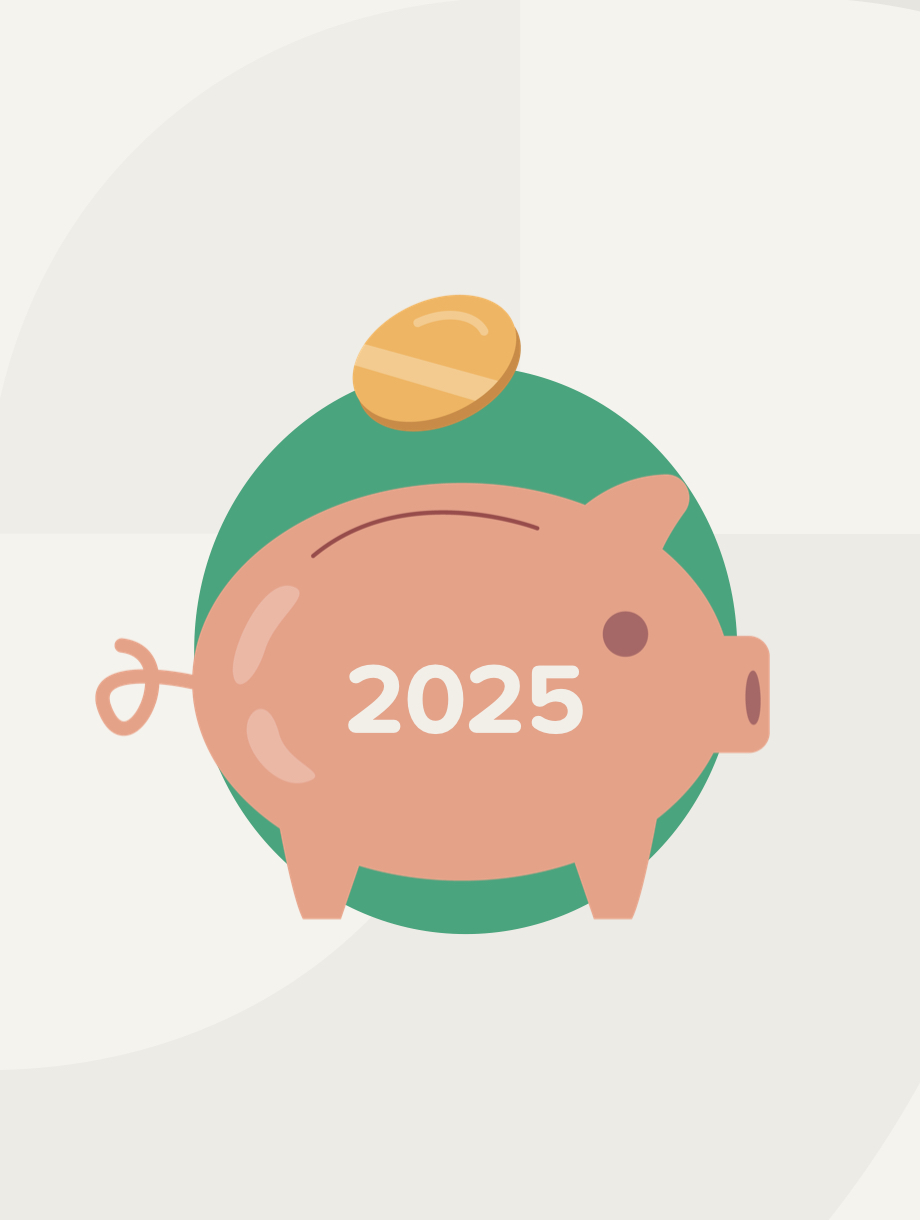
The dawn of a new year brings with it a sense of renewal—a chance to reflect on the past, reset your priorities, and set goals for the future. It’s the perfect time to take control of one of the most pivotal aspects of your life: your finances. This year, why not make a resolution that has the power to transform your life? By mastering essential money principles and putting them into action, you can build a brighter, more secure financial future for yourself and your family.
It doesn’t matter where you are on your financial journey; these are the essential money principles that every consumer should understand to make smarter financial decisions, avoid common pitfalls, and build a secure financial future. By applying these principles, you can Stop Being a Sucker® and improve your overall financial health, gain better control over your spending, save effectively, and work toward your long-term financial goals.
1. Start Early, Invest Consistently
"Compound interest is the eighth wonder of the world. He who understands it, earns it; he who doesn’t, pays it.”
– Albert Einstein
Explanation: The sooner you start saving and investing, the more time your money has to grow through the power of compounding. Compounding allows the earnings on your investments to generate even more earnings over time, creating a snowball effect that accelerates your wealth. Even small, consistent contributions can lead to significant results if given enough time. Starting early not only reduces the pressure to save large amounts later but also lets your investments work harder for you, turning short-term sacrifices into long-term prosperity.
2. Live Below Your Means
"Do not save what is left after spending, but spend what is left after saving.”
– Warren Buffett
Explanation: Prioritize saving and investing over spending. This approach encourages financial discipline and long-term planning, ensuring your future is secure. Living below your means doesn’t mean depriving yourself but rather making thoughtful choices about your expenses. By cutting back on unnecessary luxuries and focusing on what truly matters, you create room to grow your savings, invest wisely, and build a stable financial foundation that can support your goals.
3. Understand the Power of Budgeting
"A budget is telling your money where to go instead of wondering where it went.”
– Dave Ramsey
Explanation: A budget ensures you’re in control of your finances. It’s a roadmap that helps you allocate your money to essential needs, savings, and personal goals effectively. By creating and sticking to a budget, you gain a clear understanding of your spending habits and avoid overspending. This practice not only builds financial stability but also sets the foundation for achieving long-term financial success, whether it’s paying off debt, saving for a big purchase, or planning for retirement.
4. Eliminate High-Interest Debt Quickly
"Debt is like any other trap, easy enough to get into, but hard enough to get out of.”
– Josh Billings
Explanation: High-interest debt, such as credit card balances or payday loans, can severely impact your financial well-being by accumulating costs faster than you can keep up. The longer you carry these debts, the more you end up paying in interest, leaving less room to save or invest for your future. Focus on paying off high-interest debt as quickly as possible—whether by using the avalanche method (tackling the highest interest debt first) or the snowball approach (starting with the smallest balances for quick wins). Once you eliminate this burden, you’ll have more financial freedom to allocate resources toward building a more secure and prosperous future.
5. Diversify Your Investments
"Don’t put all your eggs in one basket.”
– Andrew Carnegie
Explanation: Diversification is a key principle of smart investing. By spreading your investments across different asset classes—such as stocks, bonds, real estate, and mutual funds—you reduce the risk of being overly reliant on a single area. For example, if one sector experiences a downturn, the impact on your overall portfolio is minimized because other investments may perform well. Diversification helps create a more stable and resilient financial plan, protecting you from market volatility and unexpected losses.
6. Build an Emergency Fund
"Prepare for the worst, hope for the best.”
– Bill Mitchell
Explanation: Building an emergency fund is one of the most important steps in achieving financial stability. Having 3-6 months of living expenses saved in an easily accessible account acts as a safety net, protecting you from unexpected financial shocks like job loss, medical emergencies, or unexpected home or car repairs. This cushion gives you peace of mind and prevents you from going into debt when life throws you a curveball. Start small and contribute regularly to grow your fund over time.
7. Learn the Basics of Taxes
"In this world nothing can be said to be certain, except death and taxes.”
– Benjamin Franklin
Explanation: Understanding how taxes work is an essential life skill that can save you money and reduce stress. Familiarize yourself with tax brackets to know how much of your income is taxed at different levels, and learn about deductions and credits to legally minimize your tax liability. Deductions lower your taxable income, while credits directly reduce the amount of tax you owe—both can make a significant difference in your finances. By grasping these basics, you can plan smarter and keep more of your hard-earned money.
8. Invest in Yourself
"The best investment you can make is in yourself.”
– Warren Buffett
Explanation: Expanding your skills, knowledge, and education pays the highest returns. Whether it’s through taking courses, reading books, attending workshops, or pursuing hobbies that challenge you, investing in yourself helps you grow both personally and professionally. The more you learn and develop, the more valuable you become, opening up greater opportunities and enabling you to achieve long-term success. Remember, self-growth is a lifelong journey that builds confidence and resilience.
9. Avoid Lifestyle Inflation
"Too many people spend money they earned to buy things they don’t want, to impress people they don’t like.”
– Will Rogers
Explanation: Lifestyle inflation happens when your spending increases alongside your income, leaving you no better off financially despite earning more. It's tempting to upgrade your car, move to a bigger house, or splurge on luxuries as your salary grows, but doing so can delay your financial goals. Instead, focus on saving and investing the extra income to build wealth faster and create long-term financial security. By resisting lifestyle inflation, you can prioritize what truly matters and avoid unnecessary financial stress.
10. Know Your Financial Literacy Level
“An investment in knowledge pays the best interest.”
– Benjamin Franklin
Explanation: Understanding your financial literacy level is a crucial step toward building a stronger financial future. Tools like the Financial Literacy Quiz (TakeTheFLQ.com) can help you assess your knowledge of essential financial concepts like budgeting, saving, investing, and managing debt. By identifying areas where your knowledge may be lacking, you can take proactive steps to learn more, improve your skills, and make smarter, more informed financial decisions. Whether you're planning for retirement, paying off loans, or just trying to save more effectively, a solid grasp of financial literacy is key to achieving your goals.
11. Understand the Value of a Financial Education
"Financial fitness is not a pipe dream or a state of mind. It’s a reality if you are willing to pursue it and embrace it.”
– Will Robinson
Explanation: Most schools fail to teach practical money management skills like budgeting, investing, or understanding credit. This leaves many people unprepared to handle their personal finances effectively. By committing to self-education—through books, online courses, or financial advisors—you can gain the knowledge needed to make smart financial decisions. A strong financial education empowers you to take control of your money, avoid debt, and build a secure, prosperous future for yourself and your family. The more you learn, the more equipped you’ll be to achieve your goals.
12. Plan for Retirement Early
"The question isn’t at what age I want to retire, it’s at what income.”
– George Foreman
Explanation: Retirement planning isn’t just about deciding when to stop working; it’s about achieving financial independence and maintaining the lifestyle you want. Starting early is key, as it allows you to take full advantage of compound interest, turning small contributions into significant savings over time. Utilize employer-sponsored retirement plans, such as 401(k)s, and consider additional investment options like IRAs to maximize your savings. The earlier you begin, the more flexibility you’ll have in choosing when and how to retire comfortably without financial stress.
Now Is The Time
This year, Stop Being a Sucker® and commit to turning your financial dreams into achievable goals. Envision the life you want, and take proactive steps to make it a reality. With focus, discipline, and the actionable insights provided here, you can begin to shape a future filled with confidence, stability, and prosperity.
The time to act is now. The steps you take today can ripple through every aspect of your life, giving you the freedom to live on your terms. Welcome this New Year with a determined heart, an open mind, and a clear plan to unlock your financial potential. It’s not just a resolution—it’s the beginning of your financial transformation.
The Hidden Dangers of Buy Now, Pay Later

The Christmas holiday season, filled with joy and festivities, is also one of the most financially stressful times of the year. From buying gifts to splurging on decorations or hosting dinners, the spirit of giving can often lead to overspending. It’s no wonder that the holiday season sees a spike in the use of Buy Now, Pay Later (BNPL) services.
These services, with their promise of “interest-free” installment payments, feel like a convenient solution to stretch holiday budgets. After all, who wouldn’t want to take care of expenses now and stagger the costs into next year? However, the reality is far less merry. BNPL can create hidden debt and financial strain well after the lights and tinsel are packed away. For many consumers, the joy of the season can transform into overwhelming stress as payments pile up, all because of purchases made in the name of spreading holiday cheer.
Before you hit “Buy Now, Pay Later” this holiday season, it’s crucial to understand the financial risks involved—and more importantly, how to manage them effectively.
Why the Holiday Season Fuels BNPL Usage
The Christmas shopping season is a perfect storm for BNPL. Retailers go all-in with discounts, promotions, and holiday-themed sales, making it hard to resist stocking up on gifts for family and friends. Add in the pressure to create a picture-perfect holiday—complete with lavish meals, matching family pajamas, and elaborate decorations—and it’s easy to see why wallets take a hit.
Enter BNPL, positioned as the “savior” of strained budgets. BNPL services are marketed as a smart financial choice, allowing you to grab all the must-haves without feeling the immediate financial pinch. With payments split into manageable installments (often spaced over a few months), the allure of “affordable” shopping can compel even the most budget-conscious spender to go beyond their limits.
Retailers, too, are eager to push BNPL options during this period. Studies reveal that consumers are more likely to increase their order value when offered the option of installment payments, benefiting businesses while leaving customers with more debt.
Social media also plays a role. Influencers and advertisements showcase “perfect” holidays, subtly pressuring viewers to keep up appearances. When BNPL is just a click away, it becomes easy to make impulse purchases while assuring yourself the costs can be handled “later.”
Hidden Debt Under the Holiday Tree
While BNPL might feel like a quick fix for holiday expenses, it’s often a double-edged sword. The illusion of affordability—splitting expensive items into smaller payments—can tempt consumers to spend more than they had planned.
Picture this scenario: You’re scrolling through an online store and see the perfect gift priced at $200. Seeing the BNPL option—“Pay only $50 today!”—you decide to go for it. The problem is that this psychological trick often leads to more purchases. The thought process becomes, “If this costs just $50 today, I can afford to add more to the cart!” Before you know it, you’ve done the same for five or six gifts. By the end of your shopping spree, you’ve committed to hundreds of dollars of future payments that, in the moment, felt manageable.
But come January, reality begins to hit. Those BNPL installment payments start rolling in—on top of regular bills and any credit card debt accrued over the holidays. Many consumers find themselves juggling multiple repayment plans for gifts and holiday purchases that they’ve already forgotten about.
Since BNPL transactions are typically not reported to credit bureaus, this “hidden” debt won’t immediately impact your credit score. However, it’s dangerous because it fosters a false sense of financial health. Consumers might think, “I’m doing fine; my credit score is intact,” even as they struggle to keep up with numerous short-term payments.
Missed payments can result in hefty late fees, and if you’ve relied on BNPL across multiple platforms, the cumulative financial strain can quickly spiral out of control.
The Emotional Side of Holiday Spending and BNPL
The holidays come with emotional undertones that can drive spending habits. Guilt about not giving “enough” to loved ones, comparisons with friends or family, and wanting to make the season magical for children—all these feelings make holiday shoppers vulnerable to overspending.
BNPL adds fuel to this fire. When you don’t feel the immediate financial impact of a purchase, it’s easier to justify going over budget. The emotional attachment to making loved ones happy can temporarily mask the financial consequences of these decisions.
For example, consider Rachel, a mom of two who used BNPL to ensure her children had the latest toys and gadgets under the tree. While she felt immensely satisfied on Christmas morning, she spent the next three months juggling repayments on top of regular expenses like rent and groceries. For Rachel, the initial joy of giving turned into months of stress and regret.
BNPL services for holiday shopping can sometimes act as a financial enabler for those trying to meet the unattainable standards of the “perfect holiday.” Recognizing this emotional trap is key to making better financial choices.
Tips for Financially Smart Holiday Shopping
When used wisely, BNPL can be a helpful tool. But the key word here is wisely. If you’re considering using these services this holiday season, here are some tips to ensure you don’t fall into debt traps:
- Create a Realistic Budget
Before shopping, set a holiday spending budget and stick to it. This includes gifts, food, decorations, and travel. If a purchase doesn’t fit within your budget without relying on BNPL, consider if it’s truly necessary. - Prioritize Needs Over Wants
It’s easy to get caught up in the spirit of the season and overspend on non-essentials. Carefully assess your shopping list and prioritize meaningful, thoughtful gifts rather than extravagant ones. - Limit BNPL Usage
If you do use BNPL, limit it to a couple of essential items, not multiple purchases. Keep track of installment payment schedules to avoid creating unmanageable debt. - Plan for January
Remember that “later” always comes. Consider whether you’ll realistically be able to make the payments in the weeks and months after the holidays, especially as other bills pile up. - Avoid Impulse Shopping
The convenience of BNPL can encourage impulse buys. Give yourself a 24-hour cooling-off period for any major purchase. During that time, evaluate if it’s really something you need—or if it’s just holiday hype. - Communicate with Loved Ones
Holiday gifting doesn’t have to break the bank. Sometimes, an honest conversation about setting limits or agreeing on less expensive gifts can alleviate financial and emotional stress. - Don’t Forget Financial Literacy
Knowledge is power. Make an effort to educate yourself and your family about effective budgeting, debt management, and the pitfalls of BNPL. Teach younger family members that the holidays are about experiences and connections—not material goods.
A Joyful Holiday Without the Financial Hangover
The holiday season should be a time of joy, not anxiety. While BNPL might seem like a convenient way to spread cheer, it’s essential to stay mindful of its risks. The combination of holiday spending pressure and the temptation of deferred payments can lead to financial strain that lingers long after the snow has melted.
By staying intentional with your purchases, setting a clear budget, and educating yourself on the potential pitfalls of BNPL, you can ensure a festive season that doesn’t come with an unwelcome dose of regret in the new year.
The holidays are fleeting, but the financial decisions you make during this time can leave a lasting impact. Give yourself the best gift of all this season—control over your finances and peace of mind for the months to come. Remember, it’s the thought, not the price tag, that makes a gift truly valuable.
Save, Splurge, or Invest?

Managing Holiday Bonuses Wisely
The end of the year brings not just the excitement of the holiday season but also a potential financial windfall in the form of a holiday bonus. For many, this bonus feels like a well-deserved reward for a year of hard work and dedication. But when that extra income hits your bank account, the big question arises—what should you do with it? Save it, splurge on something fun, or invest for the future? Each option has its merit, and the best choice depends on your personal financial goals and circumstances.
Before you make a decision, take some time to assess your priorities and develop a plan. Here’s a step-by-step guide on how to manage your holiday bonus wisely so it brings not just immediate happiness but also long-term benefits.
Step 1: Assess Your Financial Situation
The first step in making informed decisions about your holiday bonus is taking stock of your current financial health. Before you decide whether to save, splurge, or invest, ask yourself these questions:
- Do I have any high-interest debt (credit cards, personal loans) to pay off?
- Am I financially prepared for emergencies? Do I have 3–6 months’ worth of living expenses saved?
- Are there upcoming expenses I need to budget for, like holiday gifts, travel, or bills?
- Do I have any short- or long-term financial goals, like buying a home, funding a big vacation, or retiring early?
Understanding where you stand financially will help you set clear priorities for your bonus. For example, if you’re carrying high-interest debt or have little in emergency savings, tackling those areas might take precedence over treating yourself or investing.
Save, Splurge, or Invest? The Pros and Cons
Now that you’ve evaluated your financial needs, it’s time to weigh your options. Each path—saving, splurging, and investing—has its own benefits and potential drawbacks. Here’s a breakdown to help you decide:
1. Save Your Bonus
Saving your holiday bonus might not sound exciting, but it’s a responsible move that can provide peace of mind and financial security. If your emergency fund isn’t fully funded, or you’re saving for a specific goal, this could be the best path.
Pros:
- Bolsters financial security and builds a safety net for unexpected expenses.
- Helps you work toward specific savings goals, such as a down payment for a home, a dream vacation, or future education costs.
- Requires no market risk—your money is safe in a high-yield savings account.
Cons:
- The returns on savings are relatively low compared to investments.
- It can feel less satisfying in the short-term, especially if you’re eager to treat yourself after a tough year.
Tips for Savers:
- Open a high-yield savings account to make your money work harder while staying accessible.
- Automate your savings by transferring your bonus (or part of it) into your savings account the moment it lands in your paycheck.
- Divide your savings across different goals. For example, allocate 70% to your emergency fund and 30% to a short-term goal like a vacation fund.
2. Splurge on Yourself (Responsibly)
The holiday bonus is often seen as a treat for your hard work—and for good reason! Whether it’s upgrading your tech, taking a relaxing vacation, or simply indulging in a fancy dinner, spending some of your bonus on something that brings joy can be a great way to honor your efforts.
Pros:
- Brings immediate gratification and can boost morale.
- Helps you celebrate your achievements and reward yourself after a productive year.
- Shared experiences or thoughtful splurges can enhance relationships and mental well-being.
Cons:
- Spending the entire bonus might leave you no funds to tackle long-term goals or emergencies.
- Impulsive splurges could lead to buyer’s remorse.
Tips for Splurgers:
- Set a cap for “fun money” and stick to it—allocate, say, 20–30% of the bonus for splurging.
- Spend on experiences rather than material things, as studies show experiences create longer-lasting happiness.
- Make larger purchases mindfully; take 24 hours to think about whether it’s something you’ll continue to value over time.
3. Invest for the Future
Using your holiday bonus to invest creates an opportunity to grow your money and work toward financial independence. Whether you’re saving for retirement, preparing for your kids’ education, or simply seeking to build wealth, investing is a smart long-term move.
Pros:
- Offers potential for higher returns compared to saving.
- Helps you work toward long-term financial goals like retirement or wealth-building.
- Benefits from the power of compound interest over time.
Cons:
- Investments carry risk, and there’s no guarantee of returns.
- The money isn’t as easily accessible as savings, especially if you’re investing in retirement accounts or other long-term vehicles.
Tips for Investors:
- Start with your financial goals. If retirement planning is your objective, consider contributing to a tax-advantaged account.
- If your goals are short-term, explore low-risk investments like bonds or index funds.
- Diversify your portfolio to reduce risk. Avoid putting all of your bonus into a single stock or investment.
- If you’re new to investing, seek advice from a financial professional for guidance on getting started.
Step 2: Create a Balanced Financial Plan
Instead of choosing just one path, why not aim for balance? Managing your holiday bonus doesn’t have to be an “either-or” decision. By dividing your bonus into portions for saving, splurging, and investing, you can enjoy immediate rewards while also keeping your long-term financial strategy on track.
Here’s how to create a balanced plan:
- Set Your Allocations: Decide how much of your bonus to allocate to each goal based on your financial circumstances. For instance:
- 50% for savings (e.g., emergency fund or big expenses).
- 30% for investing (e.g., retirement account).
- 20% for splurging (on yourself or holiday gifts).
- Create Specific Goals for Each Bucket: Clarify how you’ll use the money in each category. For example, invest in an index fund, spend on a family holiday dinner, and save for a rainy day.
- Automate When Possible: Set up automatic transfers so you’re resistant to the temptation of spending the entire bonus impulsively.
- Revisit Your Budget: If your bonus changes your financial situation significantly, update your budget to reflect new priorities or goals.
Step 3: Avoid Common Holiday Bonus Mistakes
While a holiday bonus can be exciting, it comes with pitfalls if not managed wisely. Here are some traps to avoid:
- Spending It All at Once: It’s tempting to treat a holiday bonus as “found money” and splurge on big-ticket items you don’t actually need.
- Ignoring Financial Priorities: If you’re dealing with high-interest debt or don’t have an emergency fund, focusing your bonus solely on fun could cause financial strain later.
- Taking Unnecessary Investment Risks: While investing is wise, avoid get-rich-quick schemes or placing too much money into volatile assets.
- Failing to Plan for Taxes: If your bonus is substantial or part of a taxable income category, set aside funds for potential tax obligations come tax season.
Celebrate Today While Planning for Tomorrow
Your holiday bonus is an opportunity to celebrate your achievements and prepare for the future. By finding the right balance between saving, splurging, and investing, you can maximize the impact of this extra income while staying true to your financial goals.
Whether you decide to stash it in a high-yield savings account, splurge on an unforgettable experience, or grow your wealth through investments, the key is intentionality. With a little planning, your holiday bonus can be more than just a year-end perk—it can be a financial stepping stone that enhances your life for years to come. Happy holidays and happy planning!
Avoiding Financial Stress During and After the Holidays

The holiday season is supposed to be a time of joy, connection, and celebration. But for many, it also brings financial stress. The pressure to spend on gifts, travel, and hosting family gatherings can make it feel like your wallet has taken a bigger hit than your New Year’s confetti cannon. And without careful planning, many of us face the dreaded January debt hangover.
The good news? It doesn’t have to be this way. By managing your holiday expenses wisely and focusing on financial health, you can enjoy the season without the added stress—and even set yourself up for a smooth start to the new year. Let's explore practical ways you can avoid financial stress during and after the holidays.
The Importance of Financial Planning During the Holidays
The holidays come around every year, yet they still seem to catch us off guard when it comes to costs. From last-minute gift purchases to impromptu holiday outings, the expenses can pile on quickly. Without a plan, you could end up borrowing from your future self—often in the form of credit card debt—to pay for the season’s festivities.
Financial stress doesn’t just impact your bank account. It can lead to anxiety, sleepless nights, and even strain relationships. By taking the time to plan and prepare, you can avoid financial worries and focus on what truly matters—spending quality time with loved ones and enjoying the season to its fullest.
Strategies to Manage Holiday Expenses
1. Set a Budget and Stick to It
A solid budget is your best defense against overspending. Start by listing all potential holiday expenses, from gifts and decorations to travel and meals. Once you have an estimated total, compare it to what you can realistically afford without relying on credit or dipping into savings reserved for emergencies.
If your estimated expenses exceed your budget, adjust accordingly. Prioritize what’s most important, such as meaningful gifts or travel to see family, and consider scaling back in other areas.
2. Get Creative With Celebrations
Celebrating on a budget doesn’t mean sacrificing joy or togetherness. Instead, look for cost-effective ways to make the season special:
- Plan a Potluck: Instead of footing the entire bill for a holiday dinner, ask guests to bring a dish. This not only reduces costs but also adds variety to the meal.
- DIY Decorations and Gifts: Homemade items can be more thoughtful and memorable than store-bought ones. Turn this into a family activity to make it even more fun.
- Take Advantage of Free Festivities: Many communities offer free or low-cost holiday events like tree lightings, caroling, or seasonal markets.
3. Shop Smart
- Set a Spending Limit for Gifts: If your family is large, suggest a Secret Santa exchange to reduce the number of gifts you need to buy.
- Take Advantage of Sales: Plan your gift shopping around Black Friday, Cyber Monday, or other seasonal discounts.
- Compare Prices: Use apps or browser extensions to check for the best deals before making a purchase.
4. Plan Ahead for Next Year
Yes, it seems strange to think about next Christmas while still wrapping up this one. But starting a holiday savings fund early can make a world of difference. By setting aside a little money each month starting in January, you'll have a nice cushion by the time next December rolls around.
Tips to Prevent Post-Holiday Financial Stress
Managing your finances doesn’t stop at the end of the year. It’s important to reassess your financial situation and take steps to recover from holiday expenses while setting yourself up for long-term success.
1. Review Your Spending Habits
Once the holidays are over, take some time to reflect on how much you spent compared to your budget. Identify any areas where you may have overspent and think about how you can improve next year. This review can be eye-opening and help you make better financial decisions moving forward.
2. Pay Off Holiday Debt Quickly
If you used credit cards to cover holiday purchases, make a plan to pay off the balance as soon as possible. Focus on high-interest debts first to minimize the amount of interest paid over time. Consider allocating part of any year-end bonus or tax refund toward your payments to speed up the process.
3. Set Financial Goals for the New Year
The new year is the perfect time to take a fresh look at your finances. Use this opportunity to set both short-term and long-term financial goals. Whether it’s building an emergency fund, saving for a vacation, or starting an investment account, having clear goals can keep you motivated and focused.
4. Build a Cushion
Unexpected expenses are inevitable, but they don’t have to derail your financial health. Start an emergency savings fund if you don’t already have one. Even setting aside $20 a week can add up over time and provide peace of mind when surprises happen.
5. Automate Your Savings
Make saving a habit by automating it. Set up automatic transfers to a savings account or use apps that round up your purchases to save spare change. By saving consistently, you’ll feel more secure and prepared for future financial demands.
Real-Life Examples of Financial Success
Here’s a little inspiration to show you that avoiding holiday financial stress is absolutely achievable:
Take Alex, for instance. Three years ago, Alex used to max out credit cards during the holidays, only to spend months paying off the debt. Last year, Alex decided to plan ahead. By setting a budget of $500 for gifts and sticking to it, they managed their spending carefully. Alex also encouraged their family to agree on a $20 cap for Secret Santa gifts, which made the holiday gift exchange more meaningful—and affordable. When January came, Alex had no debt lingering and felt more in control than ever before.
The Benefits of Staying Financially Healthy
Proactively managing your finances during the holidays offers more than just a balanced budget. It reduces stress, prevents unnecessary debt, and allows you to be more present with friends and loved ones.
Entering the new year with solid financial footing sets you up for success. Instead of playing catch-up and paying off holiday bills, you can focus on your goals and start the year feeling empowered.
Remember What Matters Most
At its core, the holiday season isn’t about how much you spend—it’s about connections, gratitude, and creating fulfilling experiences. Spending time with loved ones, sharing laughter, and making memories are what make this time of year special.
By focusing on intentional spending and maintaining financial health, you’ll not only enjoy the holidays more fully but also enter the new year with a sense of peace and purpose. And that, truly, is priceless.
This year, give yourself the gift of financial freedom. With a little planning and creativity, you can celebrate the season in style—without the worry.
Deals or No Deals

Shopping Deals Versus Your Long-Term Financial Health
Black Friday and Cyber Monday. Together, they create a shopping frenzy that tempts even the most disciplined among us. The thrill of snagging deals on everything from electronics to household essentials is hard to resist. But while these back-to-back sale events promise substantial discounts, they also present a crossroads for your financial future. Is filling your cart with short-term satisfactions worth sidetracking your long-term financial success?
Before you give in to the allure of massive savings, it’s worth exploring how using that money for saving and investing instead could yield far greater rewards. By prioritizing your financial goals over temporary thrills, you can create a solid foundation for financial security and freedom.
Breaking Down Black Friday vs. Cyber Monday
Black Friday and Cyber Monday have grown synonymous with holiday shopping. While Black Friday has traditionally dominated the in-store shopping scene with its infamous midnight doorbusters, Cyber Monday focuses exclusively on e-commerce. Today, with overlapping sales and increasingly digital deals, shoppers can access “doorbusters” at the click of a button on either day.
Here's how they differ and overlap:
- Focus of Deals: Black Friday often features large discounts on big-ticket items like TVs or refrigerators, while Cyber Monday has broader deals on computers, tech accessories, and memberships.
- Psychological Triggers: Both events use aggressive tactics like limited-time offers, scarcity cues like “Only 1 left in stock,” and inflated discounts to manufacture urgency.
- Endless Marketing: “Black Friday Week” and “Cyber Month” blur the boundaries, tempting you to spend beyond the original two days.
While the buzz can feel overwhelming, the real question is whether these "deals" align with your long-term goals or are merely distractions.
The Cost of Short-Term Satisfaction
There’s a hidden cost to impulse spending, even on seemingly great deals. Those $50 saved on a new gadget or $100 off on a fashion splurge seem rewarding in the moment, but what’s the tradeoff? Could that same $150 be better allocated toward something more impactful, like building financial security or making an investment? Often, the best "deal" is using your money in ways that move you closer to your long-term objectives.
Opportunity Cost and Impulse Spending
Every dollar spent is a dollar unavailable for other opportunities. Purchasing an unnecessary item might bring excitement now, but what if spending that money undermines your ability to meet financial goals like buying a home, paying off debt, or securing early retirement? While the shiny, discounted gadget satisfies a momentary want, a wiser choice could be redirecting that cash toward savings or investments.
Saving and Investing for the Future
Instead of succumbing to the hype of Black Friday and Cyber Monday, think of how skipping unnecessary purchases could set you up for financial success. Every dollar you choose to save or invest today can grow exponentially over time. Here's how you can make your money work for you:
1. Compound Interest and Investment Growth
Imagine taking the $200 you were planning to spend on an impulse purchase and investing it instead. For example:
- Invest just one time $200 in a fund earning an average annual return of 8%.
- After 10 years, that $200 grows to $432.
- Extend that to 20 years, and your $200 blossoms into $932, thanks to the magic of compound interest.
This may not seem like much, but multiply this by the money you’d otherwise spend mindlessly over the years, and you have a significant nest egg forming simply by forgoing momentary spending.
2. Bolster Long-Term Goals
Saving during these major sales events doesn’t mean depriving yourself—it means shifting focus toward meaningful financial milestones:
- Emergency Fund: If you don’t already have one, the money you save by skipping Black Friday and Cyber Monday can boost your financial safety net, protecting you from unexpected expenses.
- Paying Down Debt: High-interest debt eats away at wealth. Instead of snagging deals, allocate that cash toward debt repayment, saving on unnecessary interest over time.
- Retirement Savings: Add to your registered accounts, where tax advantages and investment growth can improve your retirement future.
3. Opportunities Beyond Spending
Instead of indulging in fleeting satisfaction, consider allocating funds toward:
- Education or skill-building, where the return on investment is personal and professional growth.
- Real estate contributions, such as bolstering your savings for a down payment on a home.
- Investments vehicles that deliver steady returns over time.
Even small, consistent efforts contribute to a larger financial picture, far outweighing the gratification of short-term spending.
Practical Tips for Balancing Spending, Saving, and Investing
Black Friday and Cyber Monday don’t have to be obstacles to your financial goals. Instead of avoiding them altogether, you can approach these events with balance and intention:
1. Stick to a Thoughtful Budget
Decide in advance how much you’re willing to spend and plan for it. If you’ve been waiting to upgrade an essential item, make sure that expense fits your financial priorities and doesn’t exceed what you’ve budgeted.
2. Divide Your Money Wisely
Allocate your income into categories. Talk with a financial professional to see what fits your needs, but here's a general example:
- 50% Needs (Essentials): Rent, bills, groceries, and necessities.
- 20% Financial Goals: Savings, investments, or debt repayment.
- 30% Discretionary Spending: Includes shopping and entertainment.
This method ensures that your Black Friday or Cyber Monday deals come from nonessential funds, which keeps your financial goals intact.
3. Think in Percentages, Not Just Dollars
Every transaction represents a potential percentage of your income being used. If an item feels trivial compared to your potential savings rate or investment growth, reconsider whether it’s worth the expense.
4. Celebrate Financial Discipline
Restraint during these shopping phenomena often feels like saying “no” to fun. But remember this—every dollar you preserve is a step closer to the financial freedom your future self will thank you for. Celebrate the clarity and discipline you’ve cultivated, knowing it’s helping you achieve long-term success.
Final Thoughts
Black Friday and Cyber Monday are designed to make you spend. But the real question isn’t how much you’re saving on these deals—it’s what you’re sacrificing in the process. Redirecting that money to save and invest instead can set you up for far greater rewards over time. By prioritizing emergency funds, long-term investments, and debt repayment, you’re not just skipping unnecessary purchases—you’re building a brighter, more secure future.
The thrill of these sales events will pass, but the financial stability you cultivate by resisting short-term temptations will last a lifetime. Balance your present wants with your long-term needs, and remember that the best deal isn’t always about percentages off—it’s about the value you create for your financial goals.
Understanding the Emotional and Psychological Aspects of Long-Term Care

The journey into long-term care is not just a physical and financial transition but a deeply emotional and psychological one for both the individuals receiving care and their families. Understanding the emotional landscape can help families provide better support and ensure the well-being of their loved ones during this significant life change.
The Emotional Impact on Individuals Receiving Care
Transitioning to long-term care can be emotionally challenging. Many individuals experience feelings of loss, as moving into a care facility often involves leaving a familiar home and lifestyle. The sense of independence and autonomy can diminish, leading to emotions such as sadness, anxiety, and even depression. Adapting to a new environment with unfamiliar faces and routines can also be daunting, exacerbating these feelings.
Maintaining mental health is crucial during this transition. Encouraging open communication about fears and expectations can help ease the adjustment. Facilities that offer robust social and recreational programs can also foster a sense of community and belonging, alleviating feelings of isolation.
The Psychological Impact on Families
Families, too, face emotional hurdles when a loved one requires long-term care. Many experience guilt, questioning whether they have made the right decision or if they have done enough to care for their loved one at home. This guilt can be compounded by the physical distance from their loved one, limiting daily interactions and involvement in their care.
Caregiver stress is another significant issue. For those who have been providing care at home, the transition can bring relief from physical duties but may also lead to an identity crisis, as caregiving becomes a central role in their lives. The stress of balancing other responsibilities, such as work and family, with visits and involvement in their loved one's care, can be overwhelming.
Strategies for Maintaining Mental Health and Well-being
Encourage Open Dialogue: Communication is key. Encourage both the individual and family members to express their feelings and concerns. This dialogue can help address fears and misconceptions, fostering a supportive environment.
Stay Involved: Families should remain actively involved in their loved one's care, participating in care planning meetings and visiting regularly. This involvement not only reassures the individual but also helps families feel connected and informed.
Utilize Support Networks: Support groups and counseling can provide valuable resources for both individuals and families. Sharing experiences with others in similar situations can offer comfort and practical advice.
Prioritize Self-Care: Families, particularly those transitioning from caregiving roles, should prioritize their own mental and physical health. Taking time for self-care and seeking professional help if needed can prevent burnout and ensure they are able to provide ongoing support.
Embrace Technology: For families who cannot visit regularly due to distance, technology can bridge the gap. Video calls and regular phone conversations can maintain a sense of closeness and involvement.
Advice for Families Supporting Loved Ones
Acknowledge the Transition: Recognize that moving to long-term care is a significant life change. Validate your loved one's feelings and offer reassurance and understanding.
Create Familiarity: Help personalize their new living space with familiar items from home. Photos, favorite books, and personal mementos can make the environment feel more like home.
Encourage Social Engagement: Encourage participation in social activities offered by the facility. Engagement with peers can enhance well-being and help establish new friendships.
Plan Visits Thoughtfully: Regular visits can be comforting, but it's important to balance visits with allowing the individual to settle into their new routine and form new relationships.
Start Planning Now
November has been Long-Term Care Awareness Month, an important time to reflect on and address the challenges associated with long-term care. This month has been a reminder to not only focus on practical aspects, such as financial and logistical planning, but also to consider the emotional and psychological dimensions.
Raising awareness about long-term care involves understanding that everyone’s experience is unique. Whether it’s navigating these changes as a family or seeking professional guidance for emotional support, taking proactive steps can ease the transition into long-term care.
Navigating the emotional and psychological aspects of long-term care requires empathy, planning, and resilience. By fostering open communication, building support systems, and taking care of one’s emotional health, both individuals and their families can face this phase of life with dignity and a sense of control.
This November, take time to acknowledge the challenges and opportunities of long-term care. Whether you’re planning for yourself or supporting a loved one, remember that both the practical and emotional aspects matter equally. By addressing these in tandem, you can create a more positive and manageable long-term care experience.
Navigating the Financial Aspects of Long-Term Care

The financial implications of long-term care can be significant, affecting both individuals and their families. As life expectancy increases, the likelihood of needing some form of long-term care also rises, making it crucial to understand and plan for these potential costs. This guide explores the financial aspects of long-term care, including the costs associated with different types of care, the role of insurance, strategies for funding, and the importance of financial planning to safeguard retirement savings.
Understanding the Costs of Long-Term Care
Long-term care costs can vary widely depending on the type and level of care required:
- In-Home Care: Home health aides or personal care assistants can cost between $20 to $30 per hour, or more, depending on location and services provided. For those needing full-time assistance, these costs can add up quickly.
- Assisted Living Facilities: The average monthly cost for assisted living is around $4,500, but this can vary based on location and amenities. Some facilities may charge additional fees for specialized services or higher levels of care.
- Nursing Homes: These offer the most comprehensive care, with annual costs for a private room often exceeding $100,000. Semi-private rooms tend to be slightly less expensive, but still represent a significant financial commitment.
- Adult Day Care Centers: Typically more affordable, these programs cost an average of $75 per day, providing a budget-friendly option for those who only need daytime care.
The Role of Insurance in Funding Long-Term Care
Insurance can be a critical component in planning for long-term care costs:
Traditional Long-Term Care Insurance
Traditional long-term care insurance (LTCI) is designed specifically to cover the costs associated with long-term care services, either at home or in a facility. These policies typically pay out when the policyholder is unable to perform a certain number of activities of daily living (ADLs) such as bathing, dressing, or eating. A standard policy may cover costs up to a monthly benefit amount, with the overall benefit determined by the length of the benefit period.
Hybrid Life Insurance Policies
Hybrid life insurance products combine the features of life insurance with long-term care benefits. These policies can be an attractive alternative, offering more flexibility and benefits:
- Dual Benefits: Hybrid policies provide financial support for long-term care needs while also ensuring a death benefit if the LTC benefits are not fully utilized. This offers peace of mind that your beneficiaries will still receive a payout.
- Consistent Premiums: Unlike traditional LTCI, hybrid policies often have fixed premiums that do not increase over time, making it easier to budget for future payments without the fear of rising costs.
- Cash Value: Many hybrid policies build cash value, which you can access for other needs, adding an additional layer of financial security.
- Flexible Payment Options: Policyholders can choose to pay premiums either as a lump sum or over time, catering to different financial situations and preferences.
- Family Caregiver Payments: Some hybrid policies allow for a cash payout that can be used to reimburse family members who provide care, offering a unique advantage over traditional reimbursement models.
Insurance offers viable solutions to help manage these costs effectively. Both traditional long-term care insurance and hybrid life insurance policies have their merits and drawbacks, and the choice between them should be based on individual needs, financial situations, and long-term goals. By understanding these options, individuals can make informed decisions that protect their financial well-being and ensure quality care in the future.
Government Programs: Medicaid and Medicare
Understanding government programs can also aid in planning:
- Medicaid: A state and federally funded program that provides health coverage for low-income individuals, including long-term care services. Eligibility is based on income and asset limits, often requiring individuals to spend down assets to qualify.
- Medicare: Primarily covers short-term care following a hospital stay and does not cover long-term custodial care, making it an unreliable option for long-term care planning.
Strategies for Funding Long-Term Care
Planning and saving for long-term care involves several strategies:
- Start Early: The earlier you start planning, the better. Time allows for more options and the ability to purchase long-term care insurance at lower rates.
- Create a Dedicated Savings Account: Establish a savings account specifically for long-term care needs, separate from other retirement funds, to ensure resources are available when needed.
- Invest in Long-Term Care Insurance: Evaluate the cost and benefits of long-term care insurance or hybrid policies, considering them as part of your overall financial planning.
- Consider Home Equity: For homeowners, reverse mortgages or selling the family home can provide funds for long-term care expenses. However, these options should be considered carefully, as they can impact inheritance and financial security.
- Explore State and Community Programs: Some states offer programs or assistance for those needing long-term care, which can supplement personal savings and insurance.
The Impact on Retirement Savings
Long-term care costs can significantly impact retirement savings, potentially depleting resources intended for other retirement needs. Planning for these expenses is essential to maintain financial stability and quality of life. Here are some tips:
- Budget Wisely: Include potential long-term care costs when creating your retirement budget. Adjust your savings goals to account for these expenses.
- Diversify Investments: A balanced investment portfolio can help grow savings and provide a buffer against long-term care costs.
- Consult Financial Professional: Professional guidance can help tailor strategies to individual needs, ensuring that resources are allocated effectively.
Conclusion
Financial planning for long-term care is a crucial aspect of preparing for the future. By understanding the costs, exploring insurance options, and implementing strategic saving and investment practices, individuals can better manage the financial challenges associated with long-term care. This proactive approach not only protects retirement savings but also provides peace of mind, knowing that quality care will be accessible when needed.
Exploring Different Types of Long-Term Care Services

Making the Right Choice
Navigating the world of long-term care can be daunting, especially as the need for these services is often accompanied by emotional and financial stress. With a variety of options available, understanding the nuances of each can help individuals and families make informed decisions. This article delves into the different types of long-term care services—namely in-home care, assisted living, nursing homes, and adult day care centers—highlighting their benefits, drawbacks, and offering guidance on selecting the most suitable option based on personal needs and circumstances.
In-Home Care: Comfort and Convenience
In-home care allows individuals to receive assistance with daily activities within the comfort of their own homes. This type of care can range from basic help with chores and personal hygiene to more skilled medical care, depending on the individual's needs.
Benefits: In-home care provides a high level of comfort and familiarity, which can be particularly beneficial for those who wish to remain in a familiar environment. It also allows for more personalized care, as caregivers can tailor their services to the specific needs of the individual.
Drawbacks: The cost of in-home care can add up, especially if skilled nursing services are required. Additionally, maintaining safety and accessibility in the home may require modifications, which can be costly.
Real-Life Example: Consider Sarah, an 80-year-old living with arthritis. Rather than moving to an assisted living facility, Sarah and her family opted for in-home care, as her condition allowed for mobility with some assistance. This choice enabled Sarah to stay in her home, surrounded by familiar comforts, while receiving necessary support.
Assisted Living: A Balanced Approach
Assisted living facilities offer a middle-ground solution for those who require some assistance but do not need the intensive medical care provided by nursing homes. These facilities provide housing, meals, and help with daily activities, fostering a community environment where residents can maintain a level of independence.
Benefits: Assisted living offers a social environment with activities and socialization opportunities, which can enhance the quality of life. The facilities also provide a structured setting with 24-hour support, balancing independence with needed assistance.
Drawbacks: Costs can be high, and the level of medical care is limited compared to nursing homes. Additionally, individuals may feel a loss of privacy or autonomy when transitioning from their homes.
Real-Life Example: John, a 75-year-old widower experiencing early signs of dementia, found an assisted living community that provided the supervision and social interaction he needed. This environment helped delay the progression of his condition while offering peace of mind to his children.
Nursing Homes: Comprehensive Care
Nursing homes are designed for individuals requiring extensive medical care and assistance with most daily activities. These facilities offer round-the-clock nursing care and medical supervision, making them suitable for those with severe health conditions or disabilities.
Benefits: Nursing homes provide constant medical care and supervision, essential for those with complex health needs. This type of care can alleviate the burden on family caregivers, ensuring that residents receive professional attention.
Drawbacks: The institutional setting may feel impersonal, and residents may experience a loss of independence. Nursing homes can also be the most expensive long-term care option.
Real-Life Example: Marge, an 82-year-old with advanced Alzheimer's disease requiring specialized care, transitioned to a nursing home. Although her family initially struggled with the decision, they recognized the necessity of the comprehensive care provided, which they couldn’t manage at home.
Adult Day Care Centers: Flexible Support
Adult day care centers offer daytime care and supervision, providing relief for family caregivers. These centers often provide social activities, meals, and sometimes health services during weekdays.
Benefits: Adult day care centers offer a safe and engaging environment for older adults, promoting social interaction and mental stimulation. They provide caregivers with the flexibility to work or rest, knowing their loved ones are cared for during the day.
Drawbacks: This option is limited to daytime hours and may not suffice for individuals requiring full-time care. Additionally, transportation to and from the center can pose a challenge.
Real-Life Example: Tom, a caregiver for his mother Jane, who has Parkinson’s disease, enrolled her in an adult day care program. This arrangement allowed Tom to continue working while ensuring Jane received care and social interaction throughout the day.
Choosing the Right Long-Term Care Option
Selecting the appropriate long-term care service involves assessing individual needs, preferences, and financial resources. Here are some guiding steps:
- Evaluate Care Needs: Consider both current and future health requirements. Consult healthcare professionals to understand potential care trajectories.
- Consider Lifestyle Preferences: Determine whether maintaining independence and staying at home is a priority or if a community living setting is more appealing.
- Assess Financial Situation: Long-term care can be costly. Review savings, insurance coverage, and any available government assistance to understand what is feasible.
- Visit Potential Facilities: If possible, visit assisted living or nursing home facilities to get a sense of the environment and quality of care offered.
- Consult with Family: Discuss options with family members or trusted advisors to gain different perspectives and support in decision-making.
Conclusion
Navigating long-term care options can be complex, but understanding the characteristics and benefits of each type of care can help individuals and families make informed decisions. By evaluating personal needs and circumstances, and considering both emotional and financial factors, the right long-term care solution can be found, ensuring quality of life and peace of mind for all involved.
The Importance of Planning for Long-Term Care

A Comprehensive Guide
As we age, planning for the future becomes increasingly important, particularly when it comes to long-term care. Many people mistakenly believe they won’t need long-term care or think that Medicare will cover the costs, often leading to financial and emotional stress for families when the need arises. This article aims to shed light on the importance of planning for long-term care, exploring the potential costs, types of care available, benefits of early planning, and how insurance can play a crucial role in this process.
Understanding Long-Term Care and Its Necessity
Long-term care encompasses a range of services designed to meet the personal and health needs of individuals who are unable to perform basic activities of daily living (ADLs) like bathing, dressing, or eating. According to statistics, 70% of people turning 65 today will need some form of long-term care services in their remaining years. Moreover, 20% will require care for more than five years, highlighting the unpredictability of health in later years.
Potential Costs of Long-Term Care
The cost of long-term care can be substantial, and these expenses can quickly deplete savings if not planned for adequately. On average, a private room in a nursing home can cost upwards of $100,000 per year, and even in-home care can amount to tens of thousands annually depending on the level of care required. These costs are not typically covered by Medicare, leaving many families to rely on personal savings or Medicaid, which has strict eligibility requirements.
Types of Long-Term Care
- In-Home Care: This includes personal care, homemaker services, and sometimes skilled nursing care provided in the comfort of one's home.
- Assisted Living Facilities: These communities offer housing, meals, and assistance with ADLs, providing a balance between independence and support.
- Nursing Homes: Provide a higher level of care for individuals who need medical attention and assistance with most activities of daily living.
- Adult Day Care Centers: Offer care and supervision during daytime hours, allowing family caregivers a break while ensuring their loved ones are well cared for.
Benefits of Early Planning
Planning for long-term care well before it’s needed can provide peace of mind and ensure that individuals receive the type of care they prefer. Early planning allows for a more thorough exploration of available options, financial preparation, and the opportunity to make informed decisions without the pressure of an immediate need.
Tips for Selecting the Right Care Options
- Assess Needs and Preferences: Consider both current and potential future health needs, as well as personal preferences regarding where and how care is received.
- Research Facilities and Providers: Visit care facilities, speak with staff, and review ratings and reviews to find a good fit.
- Consider Location: Proximity to family and friends can play a crucial role in choosing a care option, as frequent visits and support can enhance the quality of life.
- Evaluate Financial Resources: Understand what personal savings, insurance, and government programs can cover, and plan accordingly.
Emotional and Financial Impacts on Families
The need for long-term care can be emotionally challenging for families. The responsibility of caregiving often falls on family members, leading to stress and burnout. Financially, the costs can be a significant burden if not planned for, potentially impacting the financial well-being of both the individual needing care and their family members.
Role of Insurance in Mitigating Costs
Long-term care insurance can be a valuable tool in managing the costs associated with long-term care. Policies vary widely, so it’s important to understand the specifics of what is covered, including the types of care, benefit amounts, and any waiting periods. Purchasing a policy well in advance of needing care can result in lower premiums and ensure coverage when it's needed most.
Conclusion
Planning for long-term care is an essential part of financial and retirement planning. By understanding the potential costs, exploring care options, and considering insurance, individuals can better prepare for the future, ensuring that they receive the care they need without placing undue stress on their families. Taking the time to plan today can provide peace of mind and financial security in the years to come.
From Survivor to Thriver!

Escaping an abusive relationship is a courageous and significant step. The journey toward financial independence and stability is the next chapter—a path toward reclaiming your life.
Assessing Your Financial Situation
1. Take Inventory
- Income and Expenses: Create a detailed list of your current income sources and monthly expenses.
- Debts and Obligations: Identify any debts, including those incurred by your abuser in your name.
2. Set Financial Goals
- Short-Term Goals: Focus on immediate needs like housing, food, and transportation.
- Long-Term Goals: Consider education, career advancement, and rebuilding savings.
Rebuilding Credit
A damaged credit score can hinder your ability to secure housing, loans, or employment. Here's how to start rebuilding:
- Review Your Credit Reports: Dispute any fraudulent charges or accounts resulting from the abuse.
- Pay Bills on Time: Establish a consistent payment history.
- Use Credit Wisely: Consider a secured credit card to begin rebuilding credit.
Protecting Yourself and Your Financial and Digital Assets
- Replace Account Numbers. For accounts solely in your name, request that your bank, credit card companies, and investment firms change the account numbers, PIN numbers, usernames, and passwords.
- Use PIN numbers. Request that utility, phone, and internet providers at your new residence use a PIN number that is not tied to your social security number, date of birth, or mother’s maiden name.
- Freeze Your Credit. Put a freeze or fraud alert on your credit report at all three credit reporting companies (Equifax, Experian, and TransUnion) to prevent your abuser from opening new accounts under your name or attempting to find your new address by impersonating you.
- Change All Passwords. Change passwords for all of your electronic devices, email, and social media accounts.
Enhancing Your Income
1. Employment Opportunities
- Update Your Skills: Take advantage of job training programs or educational opportunities.
- Seek Career Counseling: Organizations often offer services to help you re-enter the workforce.
2. Financial Assistance
- Government Programs: Explore programs that provide financial aid, housing assistance, or food security.
- Grants and Scholarships: Look for educational grants specifically for domestic violence survivors.
Legal and Financial Protections
- Innocent Spouse Relief: You may qualify for tax relief if your abuser misreported taxes on a joint return.1
- Penalty-Free Retirement Withdrawals: Recent legislation allows penalty-free withdrawals from retirement accounts for domestic abuse survivors.2
- Consult Professionals: Seek advice from financial advisors and legal professionals experienced in domestic violence cases.
Building a Support Network
Surround yourself with people who support your journey:
- Support Groups: Connect with others who have shared similar experiences.
- Counseling Services: Professional counseling can aid in healing from trauma.
Sarah's Journey Forward
After leaving her abusive relationship, Sarah focused on rebuilding her life. She lived with family temporarily to reduce expenses, established her real estate business, and meticulously managed her finances. By setting clear goals and seeking support, she not only regained her financial independence but also built a successful career.
Empowerment Through Education
Knowledge is power. By educating yourself about personal finance, you equip yourself with the tools needed to make informed decisions and secure your future.
Rebuilding takes time, but every step forward is a victory. Remember, you are not alone, and resources are available to support you on this journey.
Final Thoughts
Breaking free from financial abuse is challenging, but with determination and support, it's possible to take control of your finances and build a brighter future. Let's continue to raise awareness, support survivors, and work toward a world where financial abuse is no longer a hidden epidemic.
If you or someone you know is experiencing domestic violence, help is available. Contact the National Domestic Violence Hotline at 1-800-799-7233 (SAFE) or visit DomesticShelters.org to find resources in your area.
Your Financial Escape Plan

Taking Back Control
Leaving an abusive relationship is a complex and challenging process, especially when financial resources are limited. A well-crafted financial escape plan can be a lifeline, providing the means to break free and start anew.
Why is a financial escape plan essential?
Abusers use financial control to keep victims dependent and trapped. By preparing a financial escape plan, you empower yourself to overcome the financial barriers that make leaving seem impossible.
Steps to Create Your Financial Escape Plan
1. Take Pictures of Important Documents and Assets
- Identification: Collect copies of your driver's license and passport and copies of your and your children’s birth certificates and Social Security cards.
- Financial Records: Secure copies of bank statements, credit reports, pay stubs, tax returns, and any retirement and investment account statements.
- Legal Documents: Gather your marriage certificate, property deeds, car titles, insurance cards and policies, and any legal agreements.
- Significant Assets: Take photos of homes, cars, boats, jewelry, artwork, and other collectibles.
2. Secure Access to Money and Credit
- Open a Personal Bank Account and Credit Card: Choose a bank different from your abuser's, and opt for online statements sent to a secure email, P.O. box, or friend’s address.
- Save Emergency Funds: Start setting aside small amounts of cash in a safe place. Even small sums add up over time.
3. Protect Your Credit
- Check Your Credit Report: Obtain your credit report from all three major bureaus to identify any unauthorized accounts or debts.
- Consider a Credit Freeze: This can prevent new accounts from being opened in your name without your consent.
4. Enhance Your Earning Potential
- Update Your Resume: Prepare to seek employment or increase your income.
- Pursue Education or Training: Look into programs that can improve your job prospects.
5. Build a Support Network
- Confide in Trusted Individuals: Share your situation with friends, family, or professionals who can offer support.
- Reach Out to Organizations: Contact local shelters or domestic violence hotlines for assistance and resources.
6. Plan the Logistics
- Safe Housing: Identify a safe place to go, whether it's with a trusted individual or a shelter.
- Transportation: Ensure you have reliable means to leave when the time comes.
- Legal Assistance: Consult with a lawyer to understand your rights and options.
Sarah's Escape Plan
When Sarah decided to leave her abusive partner, she meticulously planned her escape. She gathered essential documents, secretly saved money, and reached out to family and a local women's organization for support. Her careful preparation was instrumental in successfully breaking free and starting a new life.
Remember: Safety First
Your safety is paramount. If you're in immediate danger, prioritize getting to a safe location. Consider seeking guidance from professionals who can help you navigate this process safely.
To find resources in your area, go to https://www.domesticshelters.org or call the National Domestic Violence Hotline at 1-800-799-7233 (SAFE).
Our final post will focus on rebuilding your financial life after escaping abuse, offering guidance on how to regain independence and stability.
Protecting Your Legacy

National Estate Planning Awareness Week
Creating wealth to support the lifestyle you want for yourself and your family is important. But what happens after you die? Isn’t it also important to create a legacy to pass on your wealth to those you love and care for? This process involves careful planning and strategic decision-making to make sure that your hard-earned assets continue to benefit your family for generations to come.
Estate planning is the final frontier in this journey—what we call the 7th Money Milestone. It's the last critical step in helping to ensure that everything you've worked for secures your family’s future, providing peace of mind and stability even when you're no longer there to provide guidance.
National Estate Planning Awareness Week serves as a powerful reminder of the importance of taking this final step, solidifying the legacy you leave behind. It's an opportunity to review your plans, consult with professionals, and make sure your wishes are clearly documented and understood. Taking action now safeguards your family's future and honors the hard work and dedication that built your wealth.
Why Estate Planning is Essential for Everyone
Estate planning is not just for the wealthy. Whether you have a modest home or significant financial assets, creating an estate plan is vital to avoid unnecessary legal complications, family disputes, expenses and delays. It’s about making sure that your wishes are respected and your loved ones are taken care of according to your intentions. Supreme Court Justice Louis Brandeis once said, “The most important political office is that of the private citizen.” In estate planning, this rings true—taking control of your estate is your right and responsibility.
Without a plan, the state—not you—determines how your assets will be divided. This can lead to unintended consequences and costly, prolonged legal battles for your family. Imagine the stress and financial burden placed on your loved ones as they navigate through the complexities of probate courts and legal proceedings, potentially causing rifts in family relationships. Estate planning can safeguard your wealth, however large or small, so it reaches the hands you intend it to, providing peace of mind and clarity for both you and your family. Additionally, an estate plan can express your healthcare preferences and guardianship arrangements, offering a comprehensive approach to managing your personal affairs.
Who Needs an Estate Plan? (Spoiler: You Do)
Do you have a bank account, a home, or children? If so, then you need an estate plan. Life’s unpredictability demands that we prepare for the unforeseen, and an estate plan helps guarantee that your wishes will be honored even if you’re not present to provide direction.
An estate plan covers several crucial areas:
- Guardianship of your children – Who will raise them if you can’t? Specifying a guardian ensures that your children will be cared for by someone you trust, providing stability and continuity in their lives should anything happen to you or your partner.
- Healthcare decisions – Who will make decisions on your behalf if you’re incapacitated? With an advanced directive or healthcare proxy, you designate the person you trust to make medical decisions for you, reflecting your preferences and values when you cannot communicate them yourself.
- Asset distribution – How will your wealth, property, and possessions be distributed? If your children are minors, who will manage the financial aspects of their care? An estate plan allows you to specify how your assets should be managed and distributed, minimizing potential conflicts and confusion among your heirs and helping to ensure that your legacy is passed on in accordance with your wishes.
An estate plan provides peace of mind, knowing that no matter what happens, your affairs will be managed according to your intentions.
The Consequences of Failing to Plan
Without a plan in place, state law will take the reins and decide for you, regardless of your personal wishes or the unique dynamics of your family. Imagine the care of your children being left to a relative who may not share your values and aspirations for their future. Imagine the wealth and assets you worked so hard to accumulate ending up with a financially irresponsible adult child or an estranged relative.
The failure to put a plan in place may result in unnecessary taxes, unintended beneficiaries, or worse, tension and strife among your loved ones. Probate can be a lengthy and expensive process, sometimes taking years to settle estates. During this time, families are left to shoulder both emotional and financial burdens, causing unnecessary stress during an already difficult period.
Probate Nightmare: I worked with a family to probate the estate of their beloved husband and father. He died suddenly in a freak car accident on their way to the grocery store on a Saturday afternoon. He had no Will for his wife and 2 young daughters. His only asset, other than the totaled car, was an investment account with around $35,000. The family desperately needed this money but the court could not distribute it until more than 2 years after his death. And, since he did not have a Will, the account was distributed equally among his wife and children. Since his daughters were minors, the court ordered that a guardian ad litem be appointed to monitor their share of the funds. The probate process and guardian ad litem fees ate away at the meager sum he left behind. If he had put a simple Will in place, or named his wife as the beneficiary, the funds would have been immediately distributed to his wife.
How to Take Action During National Estate Planning Awareness Week
National Estate Planning Awareness Week is a great opportunity to move forward in securing your financial future by addressing the 7th Money Milestone. Here's a guide to starting or enhancing your estate plan:
- Assess Your Assets: Evaluate all your assets. This includes tangible items like real estate, vehicles, and family heirlooms and intangibles such as investment portfolios, retirement accounts, life insurance policies, and digital assets.
- Choose Key Individuals: Select the right individuals for crucial roles. Consider who you trust to act as your executor, responsible for managing and distributing your estate according to your wishes. If you have children, designate guardians who will provide care and guidance until they are adults. Additionally, appoint decision-makers for healthcare and financial matters who are capable of making informed choices on your behalf if you become incapacitated.
- Consult an Estate Planning Attorney: Online services can help provide a basic plan if you’re on a tight budget. If you need a more complicated plan and your budget allows, an experienced estate planning attorney can help you tailor your estate plan to fit your unique circumstances, especially if you have a blended family or a special needs child.
What Should Be in Your Estate Plan?
A complete estate plan includes the following components:
- Last Will and Testament: This vital document specifies how you want your assets to be distributed upon your passing. It allows you to designate beneficiaries for your possessions, from valuables to sentimental items. Additionally, it provides a mechanism to appoint guardians for your minor children, ensuring they are cared for by someone you trust.
- Power of Attorney: This legal instrument designates a trusted person to manage your financial affairs if you become unable to do so while you are living. This can include paying bills, managing investments, paying taxes, and handling other financial transactions.
- Advance Healthcare Directive: Also known as a living will, this document outlines your preferences for medical treatment if you are unable to communicate your decisions. It can include instructions on life-sustaining treatments, organ donation, and other important healthcare decisions.
- Revocable Living Trust: This flexible tool helps you manage your assets during your lifetime and beyond, allowing you to avoid the costly and lengthy probate process. A trust is especially important if you want to name beneficiaries who are minors, have special needs or live outside of the U.S. or if you own a business or real estate in multiple states. A living trust can be altered or revoked as long as you are alive and mentally competent, providing ongoing control over your financial legacy.
These essential tools give you control over your legacy and protect your family from potential disputes, legal hurdles, and unnecessary delays and expenses. By clearly outlining your wishes and appointing trusted individuals to act on your behalf, you can ensure a smoother transition and lessen the emotional and financial burden on your loved ones.
The Final Milestone: Secure Your Legacy
At WealthWave, we emphasize the importance of achieving the 7 Money Milestones—from helping to protect your income and financial security to building and preserving wealth. However, this journey remains incomplete without addressing the critical final milestone: estate planning. This is the stage where your years of hard work, careful protection, and financial independence truly come full circle.
By engaging in thoughtful estate planning, you ensure that your loved ones have the time and space they need to grieve, without being encumbered by complex financial or legal challenges. This final milestone allows you to provide for future generations while safeguarding the principles and priorities that define your life.
Call to Action: Take Control of Your Family’s Future Today
National Estate Planning Awareness Week isn’t just a reminder—it’s a call to take action for a more secure tomorrow. This is your opportunity to reflect on the importance of protecting what you’ve worked so hard to build throughout your life. By planning, you help provide a safety net for your loved ones.
If you haven’t completed all of the 7 Money Milestones yet, now is the perfect time to do so. These milestones serve as a comprehensive guide to financial security and can help you navigate through the complexities of estate planning.
Get started today. Reach out to your dedicated WealthWave financial professional, who can offer personalized guidance tailored to your unique financial situation. Additionally, consult with an experienced estate planning attorney to create a robust plan that focuses on the orderly transfer of assets and the designation of trusted friends or family members to care for your minor children and to carry out your wishes.
Kim Scouller, Attorney and Certified Financial Educator®
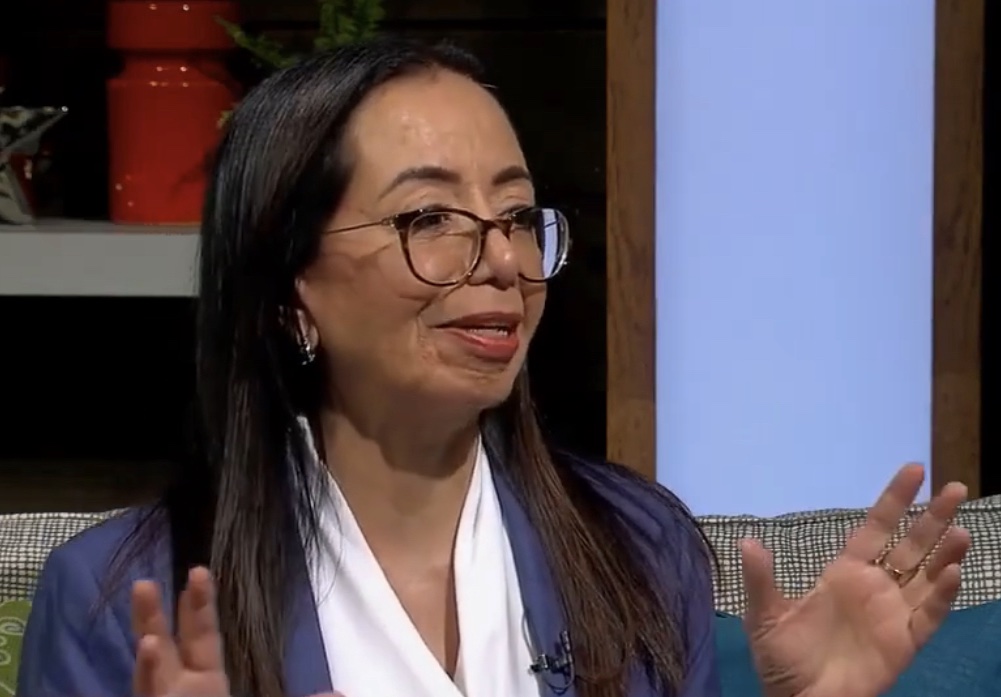
Kim Scouller stands as a prominent legal voice in financial education, with more than 30 years as an attorney and financial professional. She is the co-author of "HowMoneyWorks for Women: Take Control or Lose It," alongside CPA Sharon Lechter of the “Rich Dad Poor Dad” series. Her vision to democratize financial literacy is becoming a reality with TheMoneyBooks series. In this article, we continue exploring the significance of estate planning, emphasizing its impact on your assets and your loved ones.
Crucially, estate planning is not reserved for the wealthy or the elderly. It's vital for everyone, regardless of age or income. This includes young families needing to designate guardianship and single individuals wishing to allocate their assets thoughtfully.
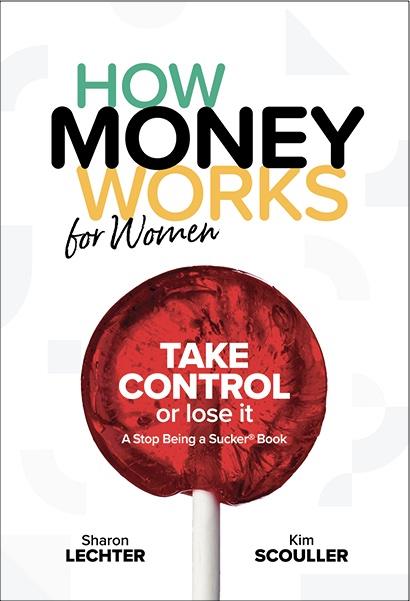
National Estate Planning Awareness Week serves as a reminder to take action and secure your family's future through thoughtful estate planning. Don't wait until it's too late—initiate the conversation with a WealthWave professional or consult an estate planning attorney today. Your legacy and your loved ones deserve it. As Kim wisely notes, "Estate planning isn't about fear; it's about freedom." Take this step and complete your 7 Money Milestones by securing your estate plan today.
Unmasking Financial Abuse—Red Flags You Need to Know

While financial abuse often remains hidden,
recognizing the signs is crucial in breaking free from an abusive relationship. Financial abuse is a powerful tool used by abusers to control and manipulate, leaving victims feeling trapped and powerless.
What does financial abuse look like?
1. Financial Control
- Restricted Access: Your partner denies you access to bank accounts, credit cards, or financial information.
- Allowance Limitations: You are given a strict allowance and must account for every penny spent.
- Withholding Necessities: Threatening to withhold money for essential needs like food, medication, or housing.
- Excessive Oversight: Demanding detailed accounts of your spending and criticizing your financial decisions.
- Financial Shaming: Making you feel guilty or incompetent regarding financial matters.
- Isolation: Cutting off access to friends, family, or support networks who might offer financial assistance.
2. Employment and Education Sabotage
- Interference with Work: Your partner forces you to miss work, harasses you at your workplace, or prevents you from seeking employment.
- Preventing Employment: Not allowing you to work or sabotaging job opportunities.
- Education Obstruction: Discouraging or preventing you from pursuing educational opportunities
3. Economic Exploitation
- Unauthorized Credit: Opening credit accounts or taking loans in your name without your knowledge.
- Nonconsensual Withdrawals: Draining your bank accounts without your knowledge or consent.
- Damaging Your Credit Score: Racking up debt under your name, leading to a ruined credit history.
Why is recognizing these red flags important?
Understanding these signs empowers you to take action. Financial abuse is not just about money—it's about power and control. Recognizing the abuse is the first step toward breaking free and reclaiming your independence.
Sarah's Story
Sarah, a successful real estate agent, experienced financial abuse firsthand. What started as her partner "taking care of the finances" gradually escalated into complete financial control. She was denied access to accounts, her spending was scrutinized, and her financial decisions were constantly criticized. It wasn't until she recognized these red flags that she could begin to formulate a plan to escape.
What can you do?
- Stay Informed: Keep track of all financial accounts and transactions. Ensure you have access to financial information.
- Build a Support Network: Reach out to trusted friends, family members, or professionals who can offer guidance and assistance.
- Document Everything: Keep records of abusive incidents and financial transactions. This documentation can be crucial if legal action becomes necessary.
- Seek Professional Help: Organizations and professionals specialize in helping victims of financial abuse. Don't hesitate to reach out.
- Stay Strong and Don’t Be Embarrassed: You are not alone. It’s not your fault. Asking for help is an act of bravery. You are not a victim. You are a survivor!
In our next post, we'll provide practical steps on creating a financial escape plan to help you break free from abuse.
National Disability Employment Awareness Month

Empowerment Through Financial Education
October is National Disability Employment Awareness Month (NDEAM), a time to celebrate the contributions of workers with disabilities and to advocate for a more inclusive workforce. This year’s theme, “Access to Good Jobs for All,” emphasizes the importance of providing quality job opportunities to everyone, including individuals with disabilities. Beyond employment opportunities, access to financial education is essential for people to make the most of these opportunities, ensuring they are equipped with the knowledge needed to achieve stability and independence.
The Role of Financial Education in Employment Access
Financial literacy is critical for anyone entering or advancing in the workforce. For individuals with disabilities, it serves as a foundational tool that can open doors to better job opportunities and provide a pathway to personal and professional success. Here’s how financial education helps support meaningful employment:
1. Understanding Employment Benefits
With the right financial knowledge, individuals can navigate complex employment benefits packages, understand how income might affect government assistance, and maximize healthcare and retirement benefits. Financial education enables individuals to fully understand these packages, make informed choices, and maintain the benefits that support their quality of life.
2. Making Informed Career Decisions
Choosing the right job goes beyond salary—it’s about total compensation, including health insurance, paid leave, and retirement options. By building a strong financial foundation, individuals are better equipped to assess job offers holistically, ensuring that they choose positions that align with both their immediate needs and long-term goals.
3. Building Financial Resilience
Managing income effectively is essential to financial resilience. Budgeting skills help individuals plan for the future, including saving for emergencies, managing debt, and preparing for unexpected expenses. This resilience reduces financial stress and enables employees to focus on building their careers without being overwhelmed by financial instability.
4. Planning for Long-Term Security
Financial education empowers individuals to take control of their financial future. By learning about savings and investment options, people can plan for retirement or long-term care. Knowledge of these options encourages self-sufficiency and ensures that individuals can maintain their quality of life, even after they transition out of the workforce.
5. Entrepreneurship Opportunities
Financial literacy also creates pathways to entrepreneurship for those interested in pursuing self-employment. Understanding budgeting, taxes, and funding options can make it easier to start a small business or freelance career. For many individuals with disabilities, entrepreneurship can offer the flexibility they need, and financial education is key to making it sustainable.
How Financial Education Complements Access to Good Jobs
Good jobs provide the foundation for independence, but financial education provides the roadmap to long-term success. Together, they form a powerful combination that supports individuals in reaching their fullest potential. Here’s how financial literacy aligns with the 2024 theme of “Access to Good Jobs for All”:
- Encourages Financial Freedom: Financially literate employees are more likely to manage their resources effectively, avoid debt, and build wealth, which ultimately contributes to greater freedom and choice in their lives.
- Fosters Confidence in Financial Decisions: Financial literacy gives people the tools to make informed decisions, boosting confidence both in and out of the workplace.
- Empowers Career Growth: When individuals understand how to manage their finances, they can focus on skill development and career advancement, knowing they have a plan for financial security.
Advocating for Accessible Financial Education
Financial education is crucial for everyone, but it’s particularly important for individuals with disabilities who may encounter additional financial challenges. Advocates, organizations, and employers can play a vital role by supporting accessible financial education programs, ensuring these programs accommodate diverse needs and abilities.
A Call to Action
As we celebrate National Disability Employment Awareness Month, let’s commit to making financial literacy as accessible as employment opportunities. This October, let’s advocate for initiatives that combine “Access to Good Jobs for All” with the essential tool of financial education. Together, we can create a more inclusive and empowered society where everyone has the opportunity to thrive professionally and financially.
Breaking the Chains of Financial Abuse—Why This Issue Demands Our Attention

October is Domestic Violence Awareness Month,
a time to shine a light on an often hidden and insidious form of abuse: financial abuse. While physical abuse tends to grab headlines, financial abuse lurks in the shadows, silently trapping victims in dangerous relationships.
Financial abuse is a deliberate tactic used by abusers to gain control and power over their victims. It's estimated that 99% of domestic violence cases also involve financial abuse.1 This abuse takes many forms—restricting access to bank accounts, sabotaging employment or education opportunities, accumulating debt in the victim's name, and ruining credit scores. It's a calculated strategy to keep victims financially dependent and unable to escape.
Why is this so important?
- A Public Health Crisis: Domestic violence is our nation's number one public health issue, according to the CDC.2 It's a pervasive problem that affects millions of women across the country.
- Staggering Statistics: One in four women will experience domestic violence in her lifetime.3 This isn't just a statistic—it's our mothers, sisters, daughters, friends, and colleagues.
- Financial Barriers to Escape: Many women stay in abusive relationships because they lack the financial means to leave. 74% of survivors report staying longer due to economic concerns.4 The fear of homelessness, hunger, or losing custody of their children is a powerful deterrent exploited by abusers.
The consequences of financial abuse are profound and long-lasting. Victims may suffer from increased stress, anxiety, and depression as they grapple with the loss of financial independence. The lack of access to resources hinders their ability to secure safe housing, find employment, or pursue education—trapping them in a cycle of abuse.
Children are deeply affected too. Growing up in households where financial abuse is present can lead to psychological trauma and perpetuate a cycle of poverty and abuse that spans generations.
Why is this so important?
By raising awareness about financial abuse, we empower victims to recognize the signs and seek help. Education is crucial—not just for potential victims, but for all of us. We need to talk about this issue openly, support those affected, and advocate for change.
What can we do?
- Spread the Word: Share information about financial abuse with friends, family, and colleagues. The more people who understand the issue, the better equipped we are to combat it.
- Support Victims: Listen without judgment, offer assistance, and connect them with resources.
- Advocate for Change: Support policies and organizations that work to prevent domestic violence and assist survivors.
What can we do?
By shining a light on financial abuse, we can break the chains that bind victims to their abusers and help them reclaim their lives.
Stay tuned for our next post, where we'll discuss the red flags of financial abuse and how to recognize them.
1 Forbes - Financial Abuse is Domestic Violence, Patricia Fersch (July 21, 2022)
2 Pennsylvania Coalition Against Domestic Violence - Financial Abuse (2022)
3 Arizona Coalition to End Sexual and Domestic Violence - 31 Facts for Domestic Violence Awareness Month (October 2021)
4 Allstate Foundation - Financial Abuse Facts (2022)
Why Both Parents Need Life Insurance

Life Insurance Isn’t Just for the Breadwinner
When we think about life insurance, we often focus on the primary wage earner—the person whose income supports the family. But what about the non-breadwinner? Whether they’re a stay-at-home parent, a part-time worker, or someone caring for the household, their role is just as critical to the family’s well-being. While they may not bring in a traditional paycheck, their contributions hold significant financial value.
This Life Insurance Awareness Month, let’s explore why it’s essential for both breadwinners and non-breadwinners to have life insurance coverage.
1. The Financial Value of a Stay-at-Home Parent
A stay-at-home parent does much more than take care of the kids—they’re often the ones responsible for cooking, cleaning, running errands, and managing the household. These are jobs that would cost a lot if the family had to pay for outside help.
In fact, if a stay-at-home parent were to pass away unexpectedly, the family would need to hire help to replace these services. According to the 2023 Salary.com’s annual report, the financial value of a stay-at-home parent’s work is equivalent to over $190,000 a year. Without life insurance, the family might struggle to afford childcare, housekeeping, and other essential services.
Life insurance for the non-breadwinner ensures the family can afford these services in the event of their passing, allowing the breadwinner to continue working and maintain the household.
2. Covering Final Expenses
The loss of any family member comes with emotional and financial stress. Funeral costs alone can range from $7,000 to $12,000, and there may be additional medical bills or other final expenses. Even if the non-breadwinner isn’t generating income, life insurance can help cover these costs, relieving the family of the financial burden during an already difficult time.
Without life insurance, these expenses may have to come out of savings or retirement funds, potentially derailing the family’s long-term financial plans.
3. Supporting the Breadwinner’s Ability to Work
The non-breadwinner often provides critical support that allows the breadwinner to focus on their career. Whether it’s managing household duties, caring for children, or handling the day-to-day needs of the family, their contributions allow the breadwinner to go to work without distraction.
If the non-breadwinner were to pass away, the breadwinner would likely need to adjust their work schedule or even reduce their hours to manage the household or arrange for childcare. This could result in a significant loss of income. Having life insurance in place for the non-breadwinner helps cover the costs of these adjustments, ensuring the breadwinner can continue working and providing for the family without major disruptions.
4. Securing Your Children’s Future
For families with children, both parents—regardless of their income-earning role—play a vital role in providing a stable future. If a non-breadwinner passes away, the remaining spouse may need to take time off work to handle the emotional impact and adjust to new responsibilities. This could impact the family’s ability to save for the future, including important expenses like college tuition.
Life insurance can act as a financial cushion, giving the breadwinner the flexibility to take time off work, adjust to new responsibilities, and maintain the family's long-term goals without sacrificing their children's future.
5. Life Insurance Isn't Just About Income Replacement
It’s easy to think of life insurance as something only the main income earner needs, but life insurance serves more than just income replacement. It provides financial stability during life’s most uncertain moments. The loss of any family member affects the entire household, emotionally and financially. Life insurance for both the breadwinner and non-breadwinner helps protect against the unexpected, ensuring that the family can adjust without financial strain.
6. Peace of Mind for the Whole Family
Life insurance is about ensuring your family’s well-being, no matter who you are or what role you play. While the breadwinner may generate income, the non-breadwinner contributes in countless other ways that support the household. Having life insurance for both partners ensures that no matter what happens, the family has the resources they need to continue without severe financial hardship.
Final Thoughts
The contributions of the non-breadwinner are just as vital to the family’s financial health as those of the breadwinner. From childcare and household management to providing emotional support, their role is invaluable. That’s why life insurance for both partners is crucial—it’s about protecting the family as a whole, ensuring that everyone is covered, no matter what.
As Life Insurance Awareness Month comes to a close, take time to review your family’s insurance needs. If the non-breadwinner in your family doesn’t have life insurance, consider the value they bring to the household and the financial impact of their absence. Securing coverage for both partners is the best way to protect your family’s future.
Life Insurance Isn’t as Expensive as You Think
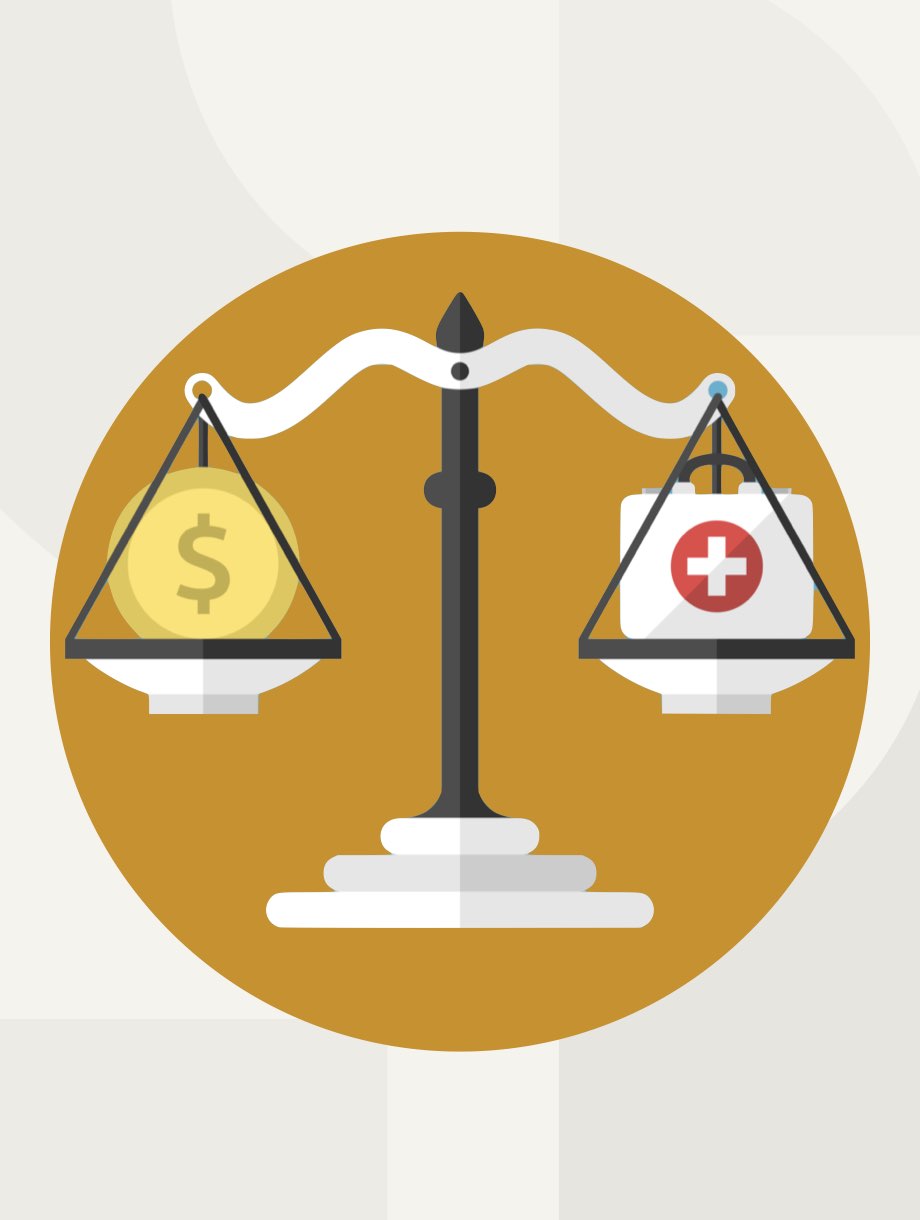
Debunking the Cost Myth
It’s Life Insurance Awareness Month, and there’s no better time to clear up one of the biggest misconceptions about life insurance: its cost. According to the 2024 Insurance Barometer Study, 72% of Americans believe life insurance costs far more than it actually does—some even overestimate it by three times!
Let’s break down this myth and show you how affordable life insurance can really be.
The Cost Myth
When people think of life insurance, many assume it’s too expensive. They imagine high monthly premiums that would be hard to fit into their budget. But the truth is, life insurance is much more affordable than most people realize.
For example, a healthy 30-year-old can often get a $250,000 term life insurance policy for as little as $200 a year. That’s just about $16 a month—less than most people spend on streaming services or coffee!
Why Do People Overestimate?
There are a few reasons why people overestimate the cost of life insurance:
- Lack of Knowledge: Many people simply don’t know what life insurance costs or what their options are.
- Fear of Complexity: With so many different types of life insurance—term, whole life, universal—it’s easy to feel overwhelmed, leading to assumptions that it must be expensive.
- Waiting Until It’s “Necessary”: Some believe they’ll only need life insurance later in life, which can lead to the assumption that it’s a significant financial burden.
But here’s the good news: life insurance can be very affordable, especially if you start early and choose the right type of policy.
Affordable Coverage Is Within Reach
The key to getting affordable life insurance is planning early. The younger and healthier you are, the lower your premiums will be. Waiting too long can increase your costs, so it’s important to consider your options sooner rather than later.
There are different types of life insurance policies to fit every budget:
- Term Life Insurance: This is often the most affordable option, providing coverage for a specific period (e.g., 10, 20, or 30 years). Term policies are great for families who need protection during their highest earning years or while they’re paying off large debts like mortgages.
- Permanent Life Insurance: While more expensive than term, permanent life insurance offers lifelong coverage and can build cash value over time. It’s a long-term investment in your family’s financial security.
Take Action This Life Insurance Awareness Month
If you’ve been putting off life insurance because of cost concerns, now is the time to take a closer look. This Life Insurance Awareness Month, get the facts and find out how affordable it can be to protect your family’s future.
Here’s how you can get started:
- Get a Quote: Reach out to a financial professional and get a personalized quote. You’ll likely be surprised by how affordable it is.
- Explore Your Options: Learn about the different types of life insurance policies and find the one that fits your needs and budget.
- Act Early: The younger you are when you apply, the lower your premiums will be. Don’t wait—take advantage of the affordability while you can!
Final Thoughts
Life insurance doesn’t have to break the bank. This Life Insurance Awareness Month, let’s debunk the myth that life insurance is too expensive. With the right information and planning, you can secure affordable coverage that gives your family peace of mind.
Take a moment to explore your options and make sure you’re protecting what matters most—because life insurance is more than just a policy, it’s a promise.
Why Life Insurance from Work Falls Short

Many people think they’re covered and protected, simply because they have life insurance through their employer. While employer-provided life insurance is a great benefit, it often falls short of providing the full financial protection your family may need. As we dive deeper into Life Insurance Awareness Month, it’s important to understand why relying solely on work-provided life insurance might not be enough.
What Is Work-Provided Life Insurance?
Employer-provided life insurance, also known as group life insurance, is a type of coverage offered to employees as part of their benefits package. Typically, it’s either free or low-cost, and coverage is automatic—meaning there’s no need for a medical exam. For many employees, this is the only life insurance they have. In fact, according to the 2024 BEAT Study: Benefits and Employee Attitude Tracker, almost 6 in 10 workers (58%) with children under 18 count on their workplace life insurance coverage to protect their loved ones.
But here’s the catch: while workplace life insurance is a great starting point, it’s rarely enough. Let’s explore why relying only on work-provided life insurance can leave families vulnerable.
1. Limited Coverage Amount
One of the biggest drawbacks of employer-provided life insurance is that it often provides only a small amount of coverage—typically just 1 to 2 times your annual salary. While this may sound like a decent amount, it’s rarely enough to cover all of your family’s financial needs. Consider the costs your family might face in your absence:
- Mortgage payments
- Day-to-day living expenses
- Children’s education
- Outstanding debts like car loans or credit cards
Financial experts recommend having life insurance coverage that equals at least 10 times your annual salary to ensure your family can maintain their current standard of living. Unfortunately, relying solely on work-provided life insurance could leave a significant gap.
2. You Can Lose Coverage When You Leave Your Job
Employer-provided life insurance is tied to your job. That means if you change jobs, are laid off, or retire, your coverage usually ends. This can be especially risky if you leave your job at a time when it becomes more expensive or difficult to get private coverage, such as after a health issue.
Unlike individual policies, which stay with you no matter where you work, employer-provided policies typically don’t follow you. If you’re between jobs, you and your family could be left without any life insurance at all.
3. Limited Flexibility and Customization
With work-provided life insurance, you typically don’t get to choose the specifics of your policy. The amount of coverage, policy length, and other key factors are determined by your employer. This lack of flexibility may not meet your family’s unique financial needs.
An individual policy allows you to customize your coverage to fit your situation, ensuring that you have enough coverage for things like a mortgage, children’s future education, and final expenses.
4. Group Policies May Not Provide Enough for Long-Term Needs
While employer-provided life insurance may provide some immediate coverage, it’s often not enough for long-term financial security. Your family may need years—or even decades—of financial support, and a payout from a small group policy may only last a few months or cover a fraction of necessary expenses.
With an individual policy, you can plan for both immediate and long-term financial needs, ensuring that your loved ones are fully protected.
5. Limited or No Coverage for Spouses and Children
Work-provided life insurance typically covers the employee but may not provide enough coverage—or any coverage at all—for spouses and children. If your family relies on dual incomes or has other financial dependents, it’s important to ensure they’re also protected.
What You Can Do
While work-provided life insurance is a great benefit, it’s essential to consider it as just one piece of your overall financial plan. Here’s how you can make sure your family is fully protected:
- Assess Your Coverage Needs: Calculate your family’s financial needs, including income replacement, debt coverage, and future expenses like college tuition or retirement.
- Supplement with Individual Coverage: Consider purchasing an individual life insurance policy to complement your employer-provided coverage. This ensures that no matter what happens with your job, you’ll have reliable, long-term coverage.
- Explore Your Options: Connect with a financial professional to get quotes for life insurance coverage that fits your budget and provides the right level of protection for your family.
Final Thoughts
Relying solely on work-provided life insurance can leave gaps in your family’s financial safety net. While almost 6 in 10 workers with children rely on workplace life insurance to protect their families, this coverage is often not enough. Take the time this Life Insurance Awareness Month to assess your needs and consider adding an individual life insurance policy for full protection. Your family’s future depends on it.
Could Your Family Face Financial Hardship

Nearly Half of U.S. Consumers Are at Risk
Imagine losing the primary wage earner in your household. It’s a tough situation to think about, but for nearly half of U.S. consumers, this scenario would lead to financial hardship within six months. According to the 2024 Insurance Barometer Study, 44% of U.S. consumers report they would face significant financial difficulty within half a year if their primary income provider passed away unexpectedly.
As we recognize Life Insurance Awareness Month, it’s the perfect time to talk about how life insurance can help protect families from these unexpected hardships.
What Happens If the Main Earner Is Lost?
The loss of a primary income provider doesn’t just cause emotional pain—it creates serious financial struggles. Think about all the expenses that need to be covered:
- Rent or mortgage payments
- Utilities and groceries
- Childcare or education costs
- Outstanding debts like loans or credit cards
Without the main earner’s income, many families would face financial stress in just a few months—or even weeks. 44% of consumers say they would struggle to make ends meet within six months if their primary income source were gone.
How Life Insurance Helps
Life insurance is a financial safety net. It can provide support when families need it the most by:
- Replacing lost income, allowing families to continue paying bills and covering expenses.
- Covering debts like mortgages, car loans, or credit cards, so loved ones aren’t left with financial burdens.
- Paying for final expenses, including funeral costs or medical bills, so savings aren’t depleted.
How Much Life Insurance Do You Need?
Not sure how much life insurance is enough? Here are simple steps to figure it out:
- Income Replacement: A good rule is to have life insurance that covers 10 times your annual salary. This helps your family cover living costs for the years ahead.
- Debt Coverage: Add up your debts, including mortgage, loans, and credit cards. Your life insurance should cover these amounts so your family doesn’t inherit the financial stress.
- Future Expenses: Consider big future costs like your children’s education, extracurriculars, or even weddings. Make sure your policy can help with these milestones.
- Final Expenses: Funerals and medical bills can add up quickly. Factor in enough life insurance to cover these costs.
- Find the Right Balance: Make sure your policy provides enough coverage without stretching your budget. It’s about finding the right balance between affordability and protection.
Take Action This Life Insurance Awareness Month
Life Insurance Awareness Month is the perfect time to assess your coverage. If you don’t have life insurance—or need more—now is a great time to explore your options.
Steps to Get Started:
- Talk to a Professional: If you’re unsure about what kind of policy you need, a life insurance professional can help guide you through the process.
- Assess Your Needs: Think about your family’s financial needs—income replacement, debts, and future expenses.
- Get a Quote: Find out how much coverage you can afford and get a quote.
Final Thoughts
Losing a loved one is hard, but life insurance can ease the financial burden for those left behind. Nearly half of U.S. families could face financial hardship within six months if their main income provider passes away. Don’t let your family be one of them.
Take steps today to ensure they’re protected.
Bridging the Life Insurance Gap

Why 42% of Americans Are Underinsured
September is Life Insurance Awareness Month, and it’s the perfect time to talk about an important issue: the life insurance gap. According to the 2024 Insurance Barometer Study, 42% of Americans—that’s over 102 million adults—know they need more life insurance. This leaves many families unprotected and financially vulnerable. So, why is this gap so large, and what can we do about it?
Why So Many Are Underinsured
There are a few key reasons why so many Americans lack enough life insurance:
1. Lack of Awareness: Many people, especially younger generations, don’t think life insurance applies to them until later in life. However, life insurance can be a crucial part of any financial plan, no matter your age.
2. Overestimating the Cost: Did you know that 72% of Americans overestimate how much life insurance costs—sometimes by three times or more? Many people think it’s too expensive, when in reality, a healthy 30-year-old could get a $250,000 policy for as little as $200 a year.
3. Procrastination: Life insurance is often something people think they’ll get around to later. Whether it’s due to busy schedules or the belief that there’s plenty of time, putting it off can lead to missed opportunities for affordable coverage, or any coverage.
4. Employer Coverage Isn’t Enough: Many people rely on life insurance provided by their employer, but this is often just a fraction of the coverage they actually need. Most employer plans only cover one or two times the employee’s salary, which is almost never enough for long-term protection.
Why It Matters
The life insurance gap isn’t just a statistic—it represents real financial risks. Without proper coverage, families may struggle to:
- Pay for daily living expenses
- Cover debts like mortgages or loans
- Fund important future needs, like college tuition
A life insurance policy can ease these financial burdens, ensuring that loved ones are protected when they need it most.
How to Bridge the Gap
Here are a few ways we can close the life insurance gap and make sure families are protected:
1. Raise Awareness: Life insurance isn’t just for certain people—it’s for everyone. This Life Insurance Awareness Month, take the time to learn about your options and the value of having the right coverage.
2. Debunk the Cost Myth: Share the fact that Life insurance is more affordable than many people realize. Knowing the true cost could encourage more people to take action.
3. Start Early: The younger and healthier you are, the more affordable life insurance will be. Don’t wait until it’s too late—now is the best time to secure your financial future.
4. Personalize Your Plan: Everyone’s financial situation is different, so work with a financial professional to figure out the right type and amount of coverage for your needs. Whether it’s term or permanent life insurance, having the right plan is key to closing the gap.
Action Steps
This Life Insurance Awareness Month, let’s focus on bridging the 42% life insurance need-gap. Life insurance isn’t just a policy—it’s peace of mind, knowing that your family is protected. Take the time to learn more, bust the myths about cost, and ensure you have the coverage you need to secure your loved ones’ future.
Now’s the time to act—don’t wait to protect what matters most.
Financial Compatibility

The Hidden Key to a Healthy Relationship
When we think about what makes a relationship work, we often focus on shared interests, values, or life goals. But there's another important factor that can play a big role in the success of a relationship: financial compatibility. Even though it might not be the first thing you think about when you start dating someone, being financially compatible can make a huge difference in the long run.
What is Financial Compatibility?
Financial compatibility doesn't mean you and your partner need to earn the same amount of money or have identical spending habits. Instead, it's about how comfortable and aligned you are with each other's approach to money. This includes how you handle budgeting, saving, spending, and making financial decisions together.
Financial compatibility is a positive sign that you and your partner are on the same page, which is crucial for a long-term relationship. In today's world, where traditional gender roles are evolving, it's important for both partners to be involved in financial decisions. Gone are the days when one person, usually the man, handled all the finances. Now, couples are encouraged to make important financial choices together, ensuring both partners feel informed and comfortable.
How Your Upbringing Affects Financial Habits
The way we handle money often comes from how we were raised. For example, some people grew up in families where money was openly discussed, while others may have been taught to avoid talking about it. These early experiences can lead to different financial habits, which can show up in relationships.
Having different financial approaches can lead to problems like anxiety and frustration. If one partner likes to spend while the other prefers to save, it can cause tension. This is especially true if one person naturally takes the lead on finances, whether out of interest or a desire to control the situation.
Money, Gender, and Social Expectations
Financial compatibility also ties into gender roles and societal expectations. In some cultures, men are expected to be the main earners, which can be tricky if both partners are contributing equally or if the woman earns more. There may also be cultural pressures, like the expectation to send money to family members, which can create stress if not openly discussed and agreed upon.
It's important for couples to talk about these expectations and make sure they both feel comfortable with their financial roles. This means challenging old stereotypes and working together as a team when it comes to money decisions.
How to Build Financial Compatibility
Creating financial compatibility starts with open and honest communication. Here are some steps to help ensure you and your partner are financially compatible:
- Talk About Your Financial Background: Share how money was handled in your family growing up and how that affects your views on finances today.
- Be Honest About Your Finances: Discuss your savings, debts, spending habits, and any financial obligations you might have.
- Set Common Financial Goals: Work together to set both short-term and long-term financial goals, whether it's saving for a house, planning for retirement, or budgeting for a vacation.
- Decide on Financial Roles: Agree on how you'll manage your finances. Will you have joint accounts, separate accounts, or a mix of both?
- Address Potential Red Flags: Be upfront about any financial behaviors that could cause problems, like compulsive spending or significant debt. If your financial habits are too different, it might be time to reconsider the relationship.
Conclusion
Financial compatibility is more than just managing money—it's an important part of a healthy relationship. By talking openly about finances and aligning your financial goals and habits, you can prevent money from becoming a source of conflict. Instead, it can help build a strong, supportive partnership that stands the test of time.
Remember, it's never too early—or too late—to start talking about financial compatibility with your partner.
Meet the Sucker Cycle
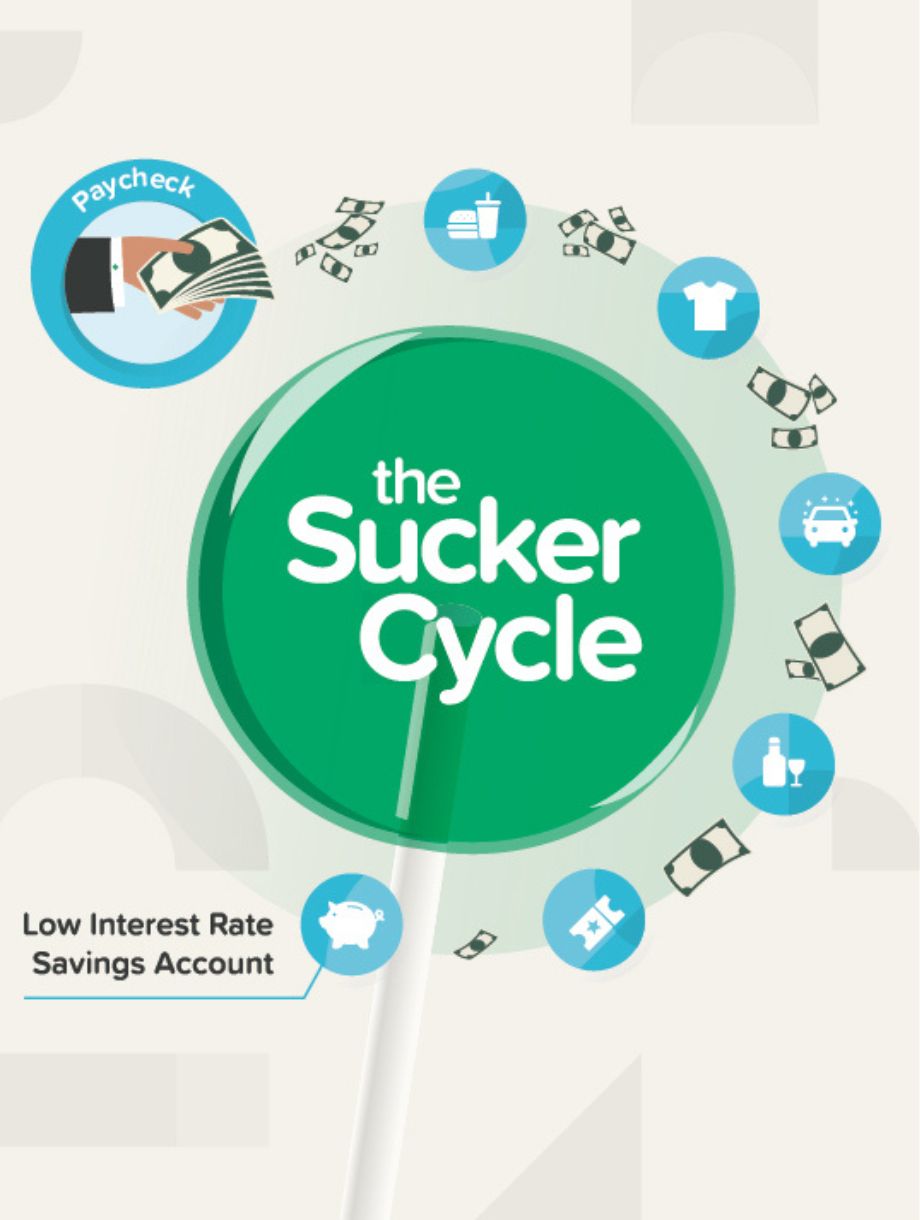
The Trap That's Holding You Back from Financial Freedom
Meet the Sucker Cycle. It’s the trap of foolish spending and low-interest saving that goes on and on—month after month, year after year—slowly draining your potential to be wealthy, free, and in control. Every couple of weeks, the cycle repeats—too much eating out, unnecessary online purchases, yet another streaming subscription. Most people know how to earn money and spend it—but that’s where it ends. The cycle keeps you stuck, making it hard to build savings, invest in your future, or achieve financial peace. But it doesn’t have to be this way. It’s time to break the Sucker Cycle.
What is the Sucker Cycle?
The Sucker Cycle is a vicious pattern of poor financial habits that keeps you trapped in a cycle of spending and debt, preventing you from reaching your financial goals. It’s easy to fall into, and once you’re in, it can feel almost impossible to escape. Here’s how it works:
The Steps of the Sucker Cycle
- Foolish Spending: Without a clear financial plan, it’s easy to spend money on things you don’t really need. Whether it’s daily coffee runs, eating out frequently, or splurging on the latest gadgets, these small expenses add up, leaving little for savings or investments.
- Low-Interest Saving: Even if you manage to save a little, it’s often in low-interest accounts that don’t help your money grow. The result? Your savings barely keep up with inflation, and your financial security remains out of reach.
- Relying on Debt: As your expenses outpace your income, turning to credit cards or loans becomes the go-to solution. But debt comes with interest, and before you know it, you’re paying more in interest than on the principal, digging yourself deeper into the hole.
- Mounting Debt and Interest: The more debt you accumulate, the more interest you have to pay. This can quickly snowball, making it harder and harder to make a dent in your debt. The stress builds, and financial freedom seems farther away than ever.
- No Real Savings or Investments: With most of your income going toward debt repayment and daily expenses, there’s little left for saving or investing. This lack of financial security leaves you vulnerable to emergencies and missing out on opportunities to grow your wealth.
- The Cycle Repeats: Without intervention, the Sucker Cycle continues, trapping you in a loop of financial frustration. Each pay period brings more of the same—spending on wants instead of needs, adding to your debt, and failing to save for the future.
Breaking the Sucker Cycle
It’s time to stop the Sucker Cycle in its tracks. Here’s how you can do it:
- Educate Yourself: Knowledge is power. Start by learning the basics of personal finance—budgeting, saving, investing, and managing debt. Plenty of free resources are available online, including blogs, courses, and ebooks that can guide you.
- Create a Budget: A budget is your blueprint for financial success. Track your income and expenses, and make sure you’re spending less than you earn. Focus on essential needs, cut unnecessary expenses, and prioritize saving.
- Build an Emergency Fund: Start by setting aside money for an emergency fund. Aim to save three to six months’ worth of living expenses. This fund will give you a financial cushion and prevent you from falling back into debt when unexpected expenses arise.
- Pay Off High-Interest Debt: Focus on paying off high-interest debts first. Use strategies like the snowball method (paying off the smallest debts first) or the avalanche method (paying off the highest interest debts first) to stay motivated and make progress.
- Start Investing: Once your emergency fund is established and your high-interest debts are paid off, start investing. Even small, regular investments can grow over time, helping you build wealth and secure your financial future.
- Plan for the Future: Set clear, long-term financial goals. Whether it’s buying a home, funding your children’s education, or preparing for retirement, having a plan will keep you focused and motivated to stay out of the Sucker Cycle.
- Work with a Financial Professional: Sometimes, getting out of the Sucker Cycle requires a little extra help. A financial professional can provide personalized advice, help you create a realistic financial plan, and guide you toward smarter financial decisions. They can also introduce you to investment opportunities and strategies that you might not have considered on your own. Working with a professional can kick-start and accelerate your exit from the Sucker Cycle, putting you on the fast track to financial freedom.
Final Thoughts
The Sucker Cycle might seem like an inevitable part of life, but you have the power to break free. By educating yourself, creating a budget, working with a financial professional, and making smarter financial choices, you can escape the cycle of debt and start building a future that’s financially secure and stress-free. It’s time to take control of your finances and stop the Sucker Cycle for good. Your journey to financial freedom starts now!
Understanding Recessions

What They Are, Signs to Watch For, and How to Prepare
The word recession is something we hear about a lot in the news, but what does it really mean? How can you tell if one is coming, and what can you do to get ready for it? Let's break it down in simple terms.
What Is a Recession?
A recession is when the economy slows down for several months or more. During this time, businesses might make less money, people could lose their jobs, and overall spending decreases. This slowdown can have a ripple effect, impacting nearly everyone.
Here’s what typically happens during a recession:
- The Economy Shrinks (GDP Declines): The total value of goods and services produced in the country, known as Gross Domestic Product (GDP), goes down.
- More People Lose Jobs: As companies struggle, they might lay off workers, leading to higher unemployment rates.
- People Spend Less: With less money coming in, people tend to cut back on spending, which can make the economy slow down even more.
- Businesses Close: Smaller businesses, in particular, might not survive a recession because of reduced demand and tougher credit conditions.
Signs That a Recession Might Be Coming
It’s hard to predict exactly when a recession will hit, but here are some signs that could indicate one is on the way:
- Interest Rates Get Weird (Inverted Yield Curve): Normally, long-term interest rates are higher than short-term rates. But when this flips, it can signal that investors are worried about the future of the economy.
- More People File for Unemployment: A sudden increase in unemployment claims can be an early sign that companies are starting to lay off workers.
- People Feel Less Confident (Declining Consumer Confidence): When people start feeling unsure about the economy, they tend to spend less, which can slow things down even more.
- Factories Slow Down (Slowing Manufacturing): If factories start producing less, it might be because businesses are expecting a drop in demand.
- Stock Market Gets Bumpy (Volatility): Big drops in the stock market can sometimes reflect fears of an economic downturn.
- Businesses Stop Spending (Decreased Investment): If companies start holding back on spending for new projects or equipment, it might be a sign that they’re worried about the future.
How to Prepare for a Recession
Even though you can't stop a recession, you can take steps to protect yourself:
- Save for Emergencies: Try to save enough money to cover 3-6 months of living expenses. This can help you stay afloat if you lose your job or face other financial challenges.
- Have More Than One Source of Income: If possible, find additional ways to earn money, like a side job or freelance work, to reduce your dependence on a single paycheck.
- Pay Down Debt: The less debt you have, especially high-interest debt like credit cards, the better off you'll be if your income decreases.
- Adjust Your Spending: Look at your budget and find areas where you can cut back. Focus on covering essential expenses and eliminating unnecessary costs.
- Invest Smartly: It might be tempting to pull your money out of the stock market during tough times, but staying invested with a well-diversified portfolio is often a better strategy. However, everyone is different, so consider talking to a financial professional about the best approach for your situation.
- Improve Your Skills: Strengthening your skills or gaining new ones can make you more competitive in the job market, which can be especially important during a recession.
- Stay Informed: Keep an eye on what's happening in the economy. The more you know, the better decisions you can make to protect yourself and your finances.
Staying Alert
Recessions are a natural part of the economic cycle, but they can be tough to go through. By understanding what they are, keeping an eye out for warning signs, and taking steps to prepare, you can better navigate these challenging times. Being proactive can help you stay secure and confident, even when the economy takes a downturn.
Winning Gold in Personal Finance

Lessons from the Summer Olympics
As we tune in to the thrilling events of the Olympics, it's impossible not to feel inspired by the athletes competing at the pinnacle of their sports. Their dedication, discipline, and strategies can teach us a great deal about achieving success—not just in athletics, but also in our financial lives. Here are some key takeaways that can help you win gold in your personal finances.
Set Clear Goals
Every Olympic athlete has a clear goal, whether it's winning a medal, setting a personal best, or simply finishing the race. Similarly, you should set clear and specific financial goals.
- Short-term goals: Save for a vacation, build an emergency fund, or pay off a small debt.
- Medium-term goals: Buy a home, save for your child's education, or purchase a new car.
- Long-term goals: Plan for retirement, build wealth, or create a financial legacy.
Write down your goals, assign timelines, and outline the steps needed to achieve them. Clear goals provide direction and motivation.
Create a Training Plan
Olympians follow rigorous training plans designed to optimize their performance. Your financial training plan should be equally disciplined.
- Budgeting: Track your income and expenses to understand your financial habits. Create a budget that aligns with your goals.
- Saving: Aim to save a portion of your income regularly. Automate your savings to ensure consistency.
- Investing: Learn about different investment options and start investing early. Diversify your portfolio to spread risk and increase potential returns.
- Debt Management: Develop a strategy to pay off high-interest debts first. Consider consolidating debts to lower interest rates and simplify payments.
Consistency and discipline in following your financial plan are key to success.
Seek Expert Coaching
Olympians have a team of coaches, nutritionists, and psychologists to help them reach peak performance. In personal finance, seeking expert advice can be invaluable.
- Financial Professional: They can help you develop a comprehensive financial plan and guide your investment choices.
- Tax Consultants: Experts who can assist with tax planning and strategies to minimize liabilities.
- Estate Planners: They can help you plan for your legacy, ensuring your assets are distributed according to your wishes.
Leveraging the expertise of professionals can help you navigate complex financial decisions and stay on track with your goals.
Stay Focused and Adaptable
The journey to the Olympics is full of challenges and setbacks. Athletes must stay focused on their goals and be adaptable to changing circumstances. In personal finance, staying focused on your goals is equally important, but life is unpredictable, and your financial plan may need adjustments along the way.
- Emergency Fund: Ensure you have a safety net to cover unexpected expenses without derailing your financial goals.
- Regular Review: Periodically review your financial plan and make adjustments as needed, such as rebalancing your investment portfolio or adjusting your savings rate.
- Continuous Learning: Stay informed about changes in the financial landscape. Read books, attend seminars, and follow trusted financial news sources.
Adaptability and resilience are crucial traits for both athletes and individuals striving for financial success.
Celebrate Your Wins
Athletes celebrate their victories, no matter how small, as each win brings them closer to their ultimate goal. Similarly, it's important to acknowledge and celebrate your financial milestones. Whether it's paying off a debt, reaching a savings target, or making a successful investment, take time to recognize your achievements.
Celebrating these wins can boost your motivation and reinforce positive financial behaviors. Share your successes with friends and family, or reward yourself with a treat that fits within your budget.
Conclusion
As we watch the Paris Olympics unfold, let's draw inspiration from the athletes' dedication, discipline, and strategic planning. By applying these principles to our personal finances, we can set ourselves up for success and achieve our financial goals. With the right mindset and approach, you too can win gold in personal finance. Let's make 2024 not just the year of the Summer Olympics, but also the year you take control of your financial future and achieve your dreams.
Financial Literacy at a Young Age

Understanding money is crucial for a successful life.
Yet, many schools don't teach financial literacy, which is vital for managing personal finances and building wealth. Learning about money from a young age can have a significant impact on a person's future. Here are some takeaways from a recent CNBC article on how children from wealthy families learn about money.
Learning from the Best
At Institut auf dem Rosenberg, a top boarding school in Switzerland, students aged 12-18 learn about wealth creation, philanthropy, family businesses, and succession management. They manage hypothetical $1 million portfolios and discuss investments with a mock family office board. This practical approach helps students understand various investments, risks, and the power of compounding interest.
Bridging the Gap in Financial Education
In the U.S., more states are now requiring high school students to take personal finance courses. Research shows that taking a financial education class can benefit students by about $100,000 over their lifetime. This comes from avoiding high-interest debt and getting better borrowing rates for big expenses like loans and mortgages.
Engaging Young Minds
Students are often most interested in investing and building wealth. By focusing on these topics, teachers can keep students engaged and excited about learning. Financial education should cover not just investing but also budgeting, banking, paying for college, taxes, credit management, and the psychology of money. As Yanely Espinal, Next Gen’s director of educational outreach, points out, "Hook them where they are most interested." By focusing on the aspects of finance that resonate most with students, educators can create a more engaging and effective learning experience.
Long-Term Benefits
Studies show that students who learn about finance are better at managing money as adults. They are more likely to get lower-cost loans for college, avoid high-interest debt, and have better credit scores. Financially literate adults can manage monthly expenses better, make timely loan payments, save more, and plan for retirement. For instance, a study by the Brookings Institution in 2018 found that teenage financial literacy is positively correlated with asset accumulation and net worth by age 25.
Moreover, adults with greater financial literacy are more likely to manage monthly expenses effectively, make timely loan payments, avoid excessive debt, and save and plan for retirement. This underscores the lifelong benefits of starting financial education early.
Conclusion
Teaching financial literacy from a young age is essential. It provides kids with the tools they need to manage money wisely and build wealth. By making financial education a priority, we can help future generations achieve financial stability and success. Let's give our children the knowledge they need to succeed in life by including financial literacy in their education. As Bernhard Gademann of Institut auf dem Rosenberg aptly puts it, "Not being able to provide students with this information and training is really stealing an opportunity for them being successful." Let’s ensure our children are equipped with the financial knowledge to thrive.
Turning Impossible to Possible

A Path to Retirement
Retirement might seem like a far-off dream, especially if you feel behind in saving. But don't worry—retirement is not only possible, but it can also be enjoyable. By changing how you think about retirement and taking small, consistent steps, you can make what seems impossible a reality.
Lack of Savings Doesn’t Have to Stop Your Retirement
Retirement planning is more than just numbers. It's also about being creative and flexible. For example, many people who started saving late due to various life circumstances still manage to retire comfortably. They often find part-time jobs that offer travel perks or other benefits, turning a challenge into an opportunity.
Think About Retirement with Hope and Creativity
The first step to making retirement possible is to stop worrying and start thinking creatively. Imagine your ideal retirement—what would you do? Where would you go? Consider part-time work that fits your interests and offers benefits like health insurance.
Many individuals, who may dislike their current stressful jobs, decide to work part-time in roles that align with their passions, such as seasonal work or gig jobs. This balance helps them maintain their health and happiness.
Surround Yourself with Positive People
Planning for retirement can be overwhelming, but having a supportive network helps. Find people who see possibilities and encourage you. A good financial professional can offer fresh perspectives and creative solutions.
People with significant financial challenges often set specific goals and find part-time jobs with perks. Their supportive network and positive mindset help them overcome financial obstacles and prepare for retirement.
Take One Step at a Time
There's no perfect way to plan for retirement. Instead of making drastic changes or risky investments, focus on developing a consistent saving habit. Start with small, manageable steps to build momentum over time.
Many find that their financial situation improves by focusing on small steps rather than trying to fix everything at once. This approach, like the saying “A journey of a thousand miles begins with a single step,” emphasizes the importance of steady progress.
Conclusion: Retirement is Possible
If you feel behind in your savings, remember that retirement is not an impossible dream. Think about retirement with hope and creativity, develop a consistent saving habit, and surround yourself with supportive people. Modern retirement planning requires creativity, the right mindset, and small, consistent actions.
Look ahead, get creative, and plan for a retirement that includes part-time work you enjoy. With these steps, and the guidance of a financial professional, you can turn the seemingly impossible into a rewarding and achievable retirement.
The Hidden Pitfall of "Spaving"

How "Saving" While Spending Can Lead to Overspending
In today's fast-paced, consumer-driven world, we’re constantly bombarded with deals, discounts, and promotions. From flash sales to loyalty rewards, the allure of saving money while shopping is ever-present. This phenomenon, often referred to as "spaving" (a blend of 'spending' and 'saving'), can seem like a smart financial strategy. However, beneath the surface lies a paradox that can lead to overspending and financial strain. In this article, we’ll explore what spaving is, why it’s so enticing, and how it can ultimately lead to overspending.
What is Spaving?
Spaving is the act of spending money with the intent of saving money, usually by taking advantage of sales, discounts, or promotions. It’s the mindset that buying something on sale is a good deal, regardless of whether you need it or not. Retailers and marketers have mastered the art of spaving, encouraging consumers to believe that they’re making smart financial decisions by spending money to save money.
The Psychology Behind Spaving
Spaving taps into several psychological principles that make it incredibly appealing:
- Scarcity and Urgency: Limited-time offers create a sense of urgency, making us feel like we might miss out on a great deal.
- Fear of Missing Out (FOMO): We don’t want to miss an opportunity to save, even if it means spending money we hadn’t planned to spend.
- Perceived Value: When we see a significant discount, we perceive the item as more valuable, convincing ourselves that we’re getting a great deal.
- Reward and Gratification: Finding a good deal gives us a sense of accomplishment and instant gratification, reinforcing the behavior.
How Spaving Leads to Overspending
While the concept of saving money while shopping seems beneficial, it can easily lead to overspending. Here’s how:
- Buying Unnecessary Items: The most obvious pitfall of spaving is purchasing items you don’t need simply because they’re on sale. This leads to clutter and wasteful spending.
- Spending More Than Intended: Discounts can encourage you to spend more than you originally planned. For instance, buying a $200 jacket for $150 feels like saving $50, but if you didn’t need the jacket in the first place, you’ve just spent $150 unnecessarily.
- Accumulating Small Expenses: Small, frequent purchases can add up quickly. A few dollars saved here and there can lead to significant expenditures over time, often on items that aren’t essential.
- Psychological Traps: The feeling of getting a good deal can become addictive, leading to habitual spaving. This can create a cycle of spending where the focus is on the perceived savings rather than the actual need or value of the purchase.
Strategies to Avoid Overspending Through Spaving
To harness the benefits of discounts without falling into the trap of overspending, consider these strategies:
- Set a Budget: Determine how much you can afford to spend on non-essential items each month and stick to it.
- Make a List: Before shopping, create a list of items you need and resist the temptation to buy things that aren’t on the list, even if they’re on sale.
- Evaluate Needs vs. Wants: Ask yourself if you truly need the item or if it’s simply an impulse buy driven by the discount.
- Delay Gratification: Give yourself a cooling-off period before making a purchase. This can help you determine if the item is truly necessary.
- Track Your Spending: Keep a record of your purchases to see how much you’re spending on “deals” and assess if they’re impacting your overall financial health.
Takeaway
Spaving, while seemingly a smart way to save money, can easily lead to overspending if not approached with caution. By understanding the psychology behind spaving and implementing mindful shopping strategies, you can avoid the pitfalls of overspending and make more informed financial decisions. Remember, the best way to save money is not by spending it, but by making thoughtful, intentional choices that align with your financial goals.
The Hidden Cost of Summer Fun

"Funflation" Can Derail Your Long-Term Financial Goals
As the warm rays of summer sun beckon us outdoors, it's easy to get caught up in the allure of vacations, outings, and leisure activities. This is especially true for those still longing to catch up from missed opportunities due to the pandemic. While summer is a time for relaxation and enjoyment, it's also a season that can significantly impact your finances if you're not careful. The term “funflation”, coined by economist aptly describes the inflation of expenses that often accompanies our pursuit of summer fun. Here's how funflation can harm your long-term financial goals and some tips on how to avoid falling into this trap.
The Allure of Summer Fun
Summer offers numerous opportunities for enjoyment, from beach vacations and road trips to outdoor festivals and barbecues, sporting events and movies to theaters and concerts. These activities, while enjoyable, often come with a hefty price tag. It's easy to justify spending more during the summer months because we associate this time with relaxation and reward. However, these expenditures can quickly add up, leading to a financial strain that extends far beyond the summer season.
The Impact on Long-Term Financial Goals
- Depleting Emergency Savings: Many people dip into their emergency savings to fund their summer activities. This practice can leave you vulnerable in the event of unexpected expenses or emergencies. Without adequate savings, you may find yourself relying on credit cards or loans, which can lead to debt accumulation.
- Neglecting Retirement Contributions: Summer spending can lead to reduced contributions to retirement accounts. Skipping or lowering your contributions, even for a short period, can have a significant impact on the growth of your retirement fund due to the power of compound interest.
- Increased Credit Card Debt: It's common to put summer expenses on credit cards with the intention of paying them off later. However, this can lead to accumulating interest charges and increasing debt levels. High credit card balances can also negatively affect your credit score, impacting your ability to secure loans or favorable interest rates in the future.
- Delayed Financial Milestones: Whether it's saving for a home, paying off student loans, or building an investment portfolio, funflation can delay these important financial milestones. The money spent on summer activities could have been used to achieve these long-term goals more quickly.
Tips to Avoid Funflation
- Create a Summer Budget: Plan your summer activities within a predetermined budget. Allocate funds for entertainment, travel, and other expenses while ensuring you don't exceed your limits. Stick to your budget to avoid overspending.
- Prioritize Free or Low-Cost Activities: Look for activities that don't break the bank. Enjoy local parks, community events, and free attractions. Often, these experiences can be just as enjoyable and memorable as more expensive alternatives.
- Set Financial Goals: Keep your long-term financial goals in mind. Set specific targets for your savings, retirement contributions, and debt repayment. Having clear goals will help you resist the temptation to overspend.
- Use Cash or Debit: To avoid accumulating debt, consider using cash or a debit card for your summer expenses. This approach ensures that you're only spending money you already have, reducing the risk of going into debt.
- Plan in Advance: Plan your summer activities well in advance to take advantage of early bird discounts and deals. Booking flights, accommodations, and event tickets ahead of time can save you a significant amount of money.
- Automate Savings and Investments: Set up automatic transfers to your savings and investment accounts. By automating these contributions, you'll ensure that you're consistently working towards your long-term financial goals, even during the summer.
Go Enjoy Summer
Summer is a time for making memories and enjoying life, but it's important to strike a balance between fun and financial responsibility. If you feel like you need help, connect with a financial professional who can give you some guidance. By being mindful of funflation and taking proactive steps to manage your expenses, you can enjoy the season without jeopardizing your long-term financial goals. Remember, the key to financial success is making informed decisions and maintaining a disciplined approach to spending, no matter the season.
The New Retirement Reality

How Smarter Early Financial Decisions Can Save Your Future Self
Retirement used to be a simple affair: work hard for a few decades, then kick back and relax. But in today's world, that classic picture of retirement is getting a modern makeover. According to a study by Allianz Life Insurance Company of North America, nearly half of Americans now see retirement as a gradual process rather than a single event. Let's dive into what this means and how making better financial choices early on can keep your future self smiling.
Retirement: A Slow Fade-Out
Gone are the days when retirement was marked by a big party and a gold watch. Nowadays, 47% of Americans think of it more like a dimmer switch than an on-off button. Instead of stopping work cold turkey, people are slowly winding down their careers. This new approach requires a different kind of financial planning.
"In the past, retirement started abruptly on your last day of work, but that idea is changing," says Kelly LaVigne, VP of Consumer Insights at Allianz Life. Many are now planning to reduce their working hours gradually, which means they need to rethink when and how they start using their retirement savings.
The "Work a Little Longer" Strategy
Here's a reality check: 68% of people think they'll need to work longer to save enough for retirement, and 61% expect to work at least part-time during their golden years. That's right, more of us are seeing ourselves as future part-time baristas or consultants, not just full-time beach bums.
Working a bit longer has its perks. It gives you more time to save, lets your retirement funds grow, and delays those Social Security checks, which can be a financial boon. Plus, sticking with your employer's health plan for a while longer can save you from the high costs of private insurance.
Planning Early: Your Future Self Will Thank You
So, what if that’s not the future you want? What if instead of retirement later, you wanted to retire earlier? Is that even possible anymore? How do we set ourselves up for an early or more carefree retirement? It all starts with smart financial moves early in life. Here are some tips to get you started:
- Start Saving Sooner: Even small contributions to a retirement account can snowball over time thanks to compound interest. The earlier you start, the better.
- Diversify Your Investments: Don't put all your eggs in one basket. A mix of investment vehicles can protect your nest egg from market ups and downs.
- Get Professional Help: A financial professional can help you craft a plan tailored to your goals and needs, and keep you on track.
- Plan for Health Costs: Healthcare can be a big expense in retirement. Look into long-term care insurance and other ways to manage these costs.
- Starting a Business: Starting a business can potentially boosts your income and also grows your capital value over time.
- Stay Flexible: Life happens, and plans change. Regularly review and adjust your retirement strategy to keep it aligned with your current situation and future goals.
The Silver Lining
Most people find that staying active and engaged later in life keeps them healthier and happier, be it while continuing to work in your later years, or enjoying new hobbies and activities during early retirement. With a solid financial plan, you'll have the peace of mind that comes from knowing you're ready for whatever retirement brings.
In the end, the key to a happy retirement is starting early and planning smart. Your future self will thank you for it, and you might just find that the journey to retirement is as rewarding as the destination. So, here’s to making savvy financial decisions today for a brighter, more relaxed tomorrow!
Real Wealth

Living A Life of True Abundance
In a world where financial success is often equated with true wealth, it's essential to step back and redefine what being truly wealthy means. Real wealth transcends the balance in your bank account; it encompasses the richness of your life experiences, your mindset, your relationships, and your well-being.
Before you ask, we are not suggesting that money is unimportant. In fact, it’s essential for covering your basic needs such as food, shelter, and healthcare. Additionally, money allows you to enjoy those little luxuries and comforts that enhance your quality of life. Whether it's indulging in a hobby, traveling to new places, or simply enjoying a nice meal out, financial resources play a critical role in providing these opportunities. Therefore, learning how money works is vital for you and your family.
However, it's important to recognize that money can only do so much. Once you have enough to meet your fundamental needs and enjoy a comfortable lifestyle, you must turn your attention to aspects of life that money cannot buy.
The joy found in simple moments, the peace that comes from a balanced life, the strength of a supportive community, and the fulfillment derived from personal growth and self-acceptance. These elements contribute significantly to your happiness and fulfillment, far beyond what any amount of money can achieve. True wealth is about living a life aligned with your values and finding contentment in the journey, not just the destination.
Doing Work That Adds Value to the World
"Work is love made visible." – Kahlil Gibran
True wealth starts with doing work that adds value to the world. When you find purpose and passion in what you do, the sense of fulfillment far outweighs the monetary gains. This type of work fuels your soul and ignites your spirit, driving you to wake up each day with enthusiasm and a sense of mission. It's about making a positive impact and leaving a legacy that outlives you.
Beyond the immediate satisfaction, engaging in meaningful work can lead to lasting relationships and a deeper understanding of your own values and beliefs. It allows you to connect with like-minded individuals who share your vision and goals, fostering a community of support and collaboration. The joy of seeing the tangible results of your efforts, knowing that you have contributed to something greater than yourself, is an incredibly rewarding experience. This holistic approach to work and life ensures a well-rounded sense of achievement that endures well beyond any financial success.
A Positive Mindset & Kind Self-Talk
“Whether you think you can or you think you can’t, you’re right.” – Henry Ford
A positive mindset is a cornerstone of real wealth. Cultivating kind self-talk and believing in your abilities can transform your life. When you embrace optimism and self-compassion, you open doors to new possibilities and resilience. This inner wealth is invaluable, creating a foundation for everything else in your life.
By adopting a positive outlook, you equip yourself to handle life's challenges with grace and determination. Positive thinking isn't just about ignoring difficulties; it's about facing them with a mindset that seeks solutions and growth. Over time, this approach can lead to greater personal and professional achievements, stronger relationships, and a deeper sense of fulfillment. In essence, nurturing a positive mindset enriches every aspect of your life, making it the bedrock of true, lasting wealth.
The Ability to Move Your Body
"Take care of your body. It's the only place you have to live." – Jim Rohn
Health is wealth, and the ability to move your body freely is a gift that should never be taken for granted. Physical activity not only boosts your physical health by improving cardiovascular fitness, strengthening muscles, and increasing flexibility, but it also enhances your mental and emotional well-being. Regular exercise can reduce stress, improve mood, and increase overall happiness. It's about celebrating what your body can do—running, jumping, dancing, or simply walking—not just how it looks. Embrace the joy of movement and the positive impact it has on your life.
Spending Time with Those You Care About
“The most important thing in the world is family and love.” – John Wooden
Spending time with loved ones is a crucial component of real wealth. The moments shared with family and friends create memories that enrich your life in profound ways. These moments, whether it's a family dinner, a weekend getaway, or simply a heartfelt conversation, weave a tapestry of experiences that you carry with you always. These relationships provide unwavering support, immense joy, and an irreplaceable sense of belonging, which are truly priceless compared to any material possession. It's these connections that remind us of what truly matters and anchor us through life's ups and downs.
Not Feeling Like You Need to Say Yes
“The art of leadership is saying no, not yes. It is very easy to say yes.” – Tony Blair
Part of real wealth is having the freedom to say no without guilt. It's about setting boundaries and prioritizing your well-being over pleasing others, which is crucial in maintaining a healthy balance in life. This empowers you to focus on what truly matters and aligns with your values, ensuring that your time and energy are spent on pursuits that bring you joy and fulfillment. By doing so, you create a life that is not only prosperous but also deeply satisfying and meaningful.
Set Your Own Priorities
“Decide what you want, decide what you are willing to exchange for it. Establish your priorities and go to work.” – H.L. Hunt
Real wealth involves setting your own priorities and living according to them. It's about aligning your daily actions with your long-term goals and values, ensuring that every step you take is purposeful and meaningful. This self-directed approach to life ensures that you are steering your own ship, rather than being at the mercy of others' expectations. By doing so, you cultivate a sense of fulfillment and personal satisfaction, knowing that your efforts are directed towards what truly matters to you. This way, you not only achieve financial stability but also attain a richer, more balanced life.
Not Spending Time with Those Who Drain You
“You are the average of the five people you spend the most time with.” – Jim Rohn
Protecting your energy by avoiding those who drain you is a form of real wealth. It's important to recognize the impact that negative individuals can have on your well-being and take steps to distance yourself from them. Instead, surround yourself with positive, uplifting individuals who inspire and support you. This conscious choice not only boosts your mood but also fosters a nurturing environment where you can grow. By doing so, you help maintain your mental and emotional health, enabling you to thrive in all areas of your life and achieve your goals with a clearer mind and a happier heart.
Being Content with What You Already Have
“He is richest who is content with the least, for content is the wealth of nature.” – Socrates
Contentment is a profound aspect of real wealth. Appreciating what you already have fosters gratitude and happiness. It's about finding joy in the present moment and recognizing the abundance in your life. True contentment stems from an inner sense of fulfillment, rather than external possessions or achievements. By focusing on the positive aspects of our lives and expressing gratitude for even the smallest blessings, we cultivate a sense of peace and well-being that money cannot buy. This mindset shift allows us to savor life's simple pleasures and live more richly, regardless of our material circumstances.
Living a Life That Feels Good to YOU
“Your time is limited, so don’t waste it living someone else’s life.” – Steve Jobs
Ultimately, real wealth is living a life that feels good to you. It's about authenticity and pursuing what brings you happiness and fulfillment. When you live true to yourself, you create a life of meaning and joy. This means embracing your passions, following your dreams, and not being swayed by societal expectations or materialistic pursuits that don't resonate with your core values.
In redefining real wealth, we uncover a life of purpose, health, love, and contentment. It's about enriching our inner lives and cultivating relationships and experiences that bring true joy. This might include spending quality time with loved ones, engaging in activities that bring peace and satisfaction, and maintaining a healthy balance between work and personal life.
Remember, wealth isn't just what you have in terms of possessions or financial assets, but how you live each day, the experiences you cherish, and the legacy you leave behind. Embrace this holistic view of wealth, and you'll find that your life is already abundant beyond measure. True wealth is measured in moments of joy, deep connections, and a sense of inner peace.
"True wealth is not of the pocket, but of the heart." Live fully, love deeply, and let your wealth shine from within. Cherish the moments that bring you joy, nurture relationships that matter, and find contentment in the simple pleasures of life. Remember, the most valuable treasures are those that enrich our souls.
Basics of Annuities

Understanding Your Options During Annuity Awareness Month
June marks Annuity Awareness Month, a time dedicated to educating individuals about the benefits and features of annuities. As financial tools designed to provide a steady income stream, annuities can play a crucial role in providing a more relaxing and enjoyable retirement. Let’s explore the basics of annuities, including what they are, how they work, and the different types available.
What is an Annuity?
An annuity is a financial product offered by insurance companies that provides a series of payments made at regular intervals, typically used as a tool for retirement planning. Individuals can invest a lump sum or a series of payments into an annuity, which then grows tax-deferred until withdrawals begin. The primary purpose of an annuity is to offer a reliable income stream, often for the lifetime of the annuitant.
How Do Annuities Work?
Annuities operate through two main phases: the accumulation phase and the distribution phase.
- Accumulation Phase: During this phase, the annuity owner makes payments (either as a lump sum or periodic contributions) into the annuity. These contributions grow on a tax-deferred basis, meaning the earnings are not taxed until they are withdrawn.
- Distribution Phase: Once the annuitant decides to start receiving payments, the distribution phase begins. Payments can be received as a lump sum, over a specified period, or as a lifetime income stream.
Types of Annuities
There are several types of annuities, each with unique features and benefits. Here are the most common types:
- Fixed Annuities: These provide a guaranteed interest rate and a predictable income stream. Fixed annuities are ideal for conservative investors looking for stability and guaranteed returns.
- Variable Annuities: These allow the annuitant to invest in a range of securities, such as mutual funds. The income received depends on the performance of these investments. Variable annuities offer the potential for higher returns but come with higher risk.
- Indexed Annuities: These are a hybrid of fixed and variable annuities. Returns are based on the performance of a specific market index (e.g., S&P 500). While there is potential for higher returns compared to fixed annuities, there is also a minimum guaranteed interest rate to provide some level of protection against market downturns.
Deferred vs. Immediate Annuities
Annuities can start making payments either immediately or be deferred until a future date. The primary decision for buyers is whether they prefer to receive regular income now or later.
Each payout timeline has its own set of trade-offs and benefits.
Immediate Annuities
These annuities are designed to start paying out almost immediately after a lump sum is invested. They are particularly suitable for individuals who are either at or near retirement and require an immediate income stream. Here's how they work:
- How They Work: After a lump sum payment is made to the insurance company, the annuitant begins receiving payments within a short period, usually within a year. The payments can be structured to last for a specific number of years or for the lifetime of the annuitant.
- Benefits: Immediate annuities provide a quick and reliable source of income, making them ideal for retirees who need to supplement their income immediately. They offer simplicity and a straightforward way to ensure a steady cash flow.
- Considerations: Once the lump sum is invested, it is typically locked in, meaning the principal amount is no longer accessible. Additionally, the payout amount is fixed and may not keep up with inflation.
Deferred Annuities
These annuities, on the other hand, are designed to begin payments at a future date, allowing the investment to grow over time. They are commonly used by individuals who are planning for retirement and do not need immediate income.
- How They Work: During the accumulation phase, the annuitant makes contributions to the annuity, which grow on a tax-deferred basis. When the annuitant decides to start receiving payments, the distribution phase begins. This can occur many years after the initial investment, providing the potential for significant growth.
- Benefits: Deferred annuities offer the advantage of tax-deferred growth, which can lead to a larger payout in the future. They provide flexibility in choosing when to start receiving income, allowing individuals to tailor their retirement planning to their specific needs.
- Considerations: Deferred annuities come with various fees and charges, and accessing the funds before the payout phase can result in significant penalties. Additionally, the growth of the investment is subject to market risks, particularly with variable and indexed annuities.
Benefits of Annuities
- Guaranteed Income: Annuities provide a steady and predictable income stream, which can be especially valuable in retirement.
- Tax Deferral: Earnings grow on a tax-deferred basis, meaning you do not pay taxes until you withdraw funds.
- Flexibility: Various types of annuities offer flexibility to meet different financial goals and risk tolerances.
- Longevity Risk Protection: Annuities can provide income for life, helping to mitigate the risk of outliving your savings.
Considerations Before Purchasing an Annuity
While annuities offer many benefits, it’s important to consider the following before purchasing:
- Fees and Charges: Annuities often come with various fees, including administrative fees, mortality and expense risk charges, and investment management fees.
- Surrender Charges: Withdrawing funds early may incur surrender charges, which can be substantial.
- Liquidity: Annuities are generally less liquid than other investments, meaning it can be harder to access your funds without penalties.
- Inflation Risk: Fixed annuities may not keep up with inflation, potentially reducing purchasing power over time.
Conclusion
Annuities can be a valuable component of a well-rounded retirement plan, offering the security of a guaranteed income stream and the benefits of tax-deferred growth. However, it’s essential to understand the various types, benefits, and potential drawbacks before making a decision. Working with a financial professional can help determine if an annuity is the right choice for your financial goals and retirement planning needs. As we observe Annuity Awareness Month, take the time to explore how annuities might fit into your overall financial strategy and provide peace of mind for your future.
Summer Fun vs. Long-Term Success

The Financial Reality of the YOLO Generation
It’s no secret that the younger generation loves to travel and enjoy life, but there’s a downside to this passion for adventure. Recent trends show that Millennials and Gen Z might spend too much on short-term fun and not enough on long-term financial health. Let’s dive into what’s happening and how we can fix it.
The Current Spending Scene
The Bank of America Summer Travel Survey 2024 highlights a significant trend: over 70% of young people plan to travel more and spend more money this summer. While this sounds like a blast, it raises a red flag about their financial habits.
The Instant Gratification Trap
Young people today are all about instant gratification. The survey shows they’re planning longer vacations and spending more money. This desire for immediate enjoyment can overshadow the need to save and invest for the future, leading to potential financial problems.
Lifestyle Inflation
As young adults earn more, they often increase their spending to match their higher income, a phenomenon known as lifestyle inflation. The survey indicates that despite lower travel-related inflation, young people still spend a significant portion of their income on travel. If this trend continues, it could hinder their ability to save and invest.
Missing Out on Financial Basics
Financial literacy remains a significant issue. Many young adults don’t fully grasp budgeting, saving, and investing. The focus on immediate wants, like travel, often precedes crucial financial planning, potentially leading to debt and missed wealth-building opportunities.
Turning Things Around: Financial Education and Smart Habits
To help young people get their finances on track, it’s crucial to emphasize financial education and wise spending habits. Here are some tips:
- Promote Financial Literacy: Young adults need to learn basic financial skills like budgeting, saving, and investing, which are critical to understanding how money works.
- Encourage Budgeting and Saving: Young adults should create budgets that prioritize essential expenses and savings before spending on extras.
- Highlight Investing: Educate young people about the power of investing early to build wealth over time.
- Focus on Long-Term Goals: Shift the mindset from immediate gratification to long-term financial planning.
While it’s great to see young people enjoying life and exploring the world, it's important to balance fun with smart financial planning. The current travel spending trends show a need for better financial habits. By prioritizing financial literacy and disciplined spending, Millennials and Gen Z can set themselves up for a secure and prosperous future.
Inflation Taking a Toll on Retirees
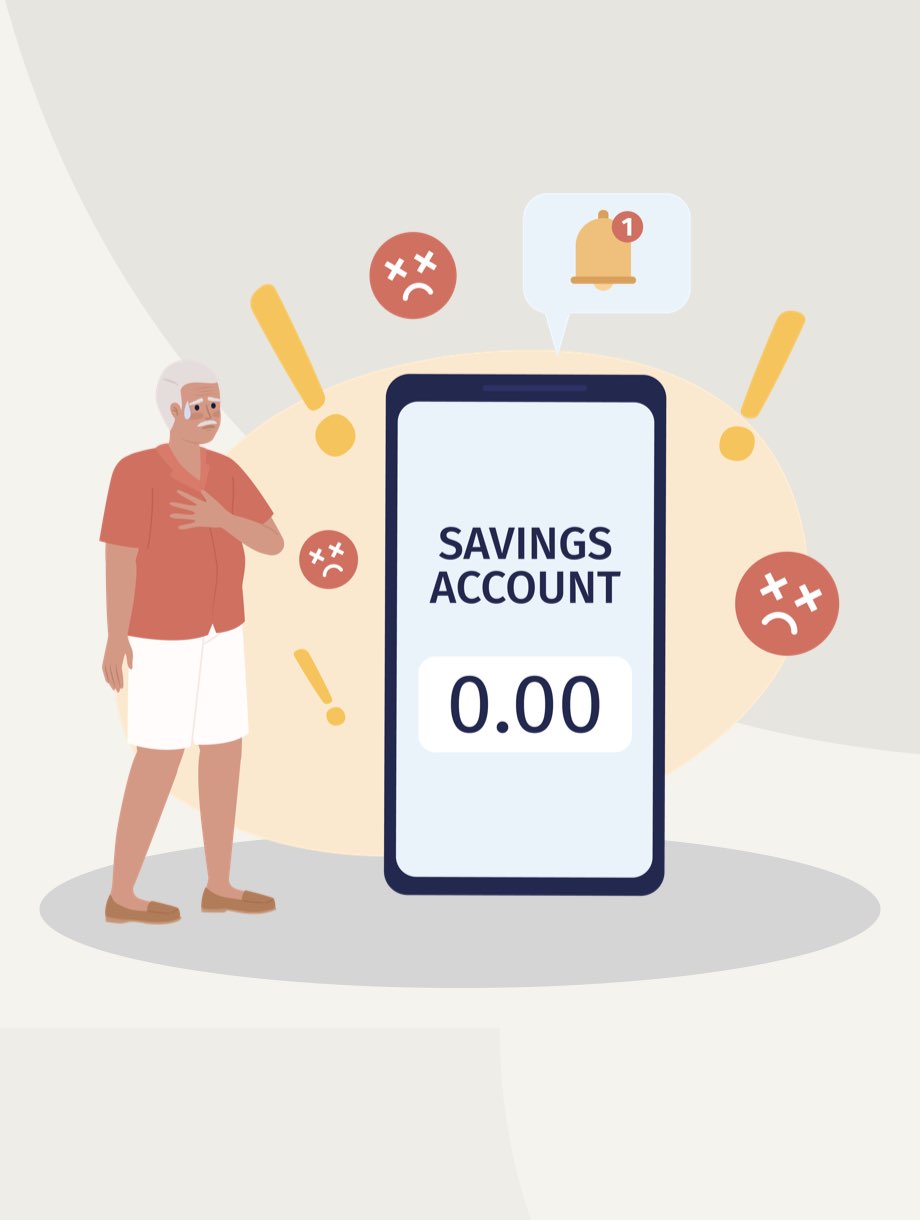
As inflation rises, its impact on retirees is becoming increasingly apparent. According to Schroders' 2024 US Retirement Survey, many retired Americans face financial challenges due to the decreasing value of their savings. Here are some key findings:
Financial Situations in Retirement
- Living the Dream: 4% of retirees reported being in an ideal financial situation.
- Comfortable: 44% described their financial situation as comfortable.
- Not Great, But Not Bad: 34% felt their financial situation was neither particularly good nor bad.
- Struggling: 15% admitted they were struggling financially.
- Living the Nightmare: 4% described their financial situation as a nightmare.
Other Key Findings
- Insufficient Savings: Less than half (44%) of retirees believe they have saved enough, while 32% are certain they haven't, and 24% are unsure.
- Top Concerns:
- Inflation: 89% are concerned about inflation reducing the value of their assets.
- Healthcare Costs: 85% worry about higher-than-expected healthcare expenses.
- Market Downturns: 76% fear a significant market downturn could deplete their assets.
- Income Generation: 69% are uncertain about how to generate income or draw down assets.
- Longevity Risk: 68% are concerned about outliving their savings.
- Financial Stress: One in three retirees worries that financial stress is affecting their health, and 26% lose sleep over their financial situation.
- Unplanned Expenses: Nearly half (47%) report higher-than-expected expenses in retirement, with healthcare costs consuming 14% of their monthly income on average.
- Uncertainty: 58% of retirees do not know how long their savings will last, and 63% wish they had done more planning before retiring.
This diversity in experiences underscores the varied impact of financial planning and the importance of tailored solutions to meet individual needs in retirement.
Solutions to Address These Challenges
Financial Planning and Education
- Don't Wait: Whatever stage you are at with your retirement, it's never too late to make necessary changes and correct your course.
- Seek Professional Advice: Consult with a financial professional to create comprehensive retirement plans considering inflation, healthcare costs, and market volatility.
- Education Programs: Participate in educational programs focused on retirement planning, financial literacy, and investment strategies to help you make informed decisions.
Diversification of Income Sources
- Multiple Income Streams: Diversify income sources, such as considering part-time work, annuities, and rental income to supplement retirement savings.
- Proper Portfolio Mix: A diversified portfolio with the appropriate amount of different asset classes can help counter the effects of inflation and the subsequent volatility it induces.
Healthcare Planning
- Health Savings Accounts (HSAs): Maximize contributions to HSAs to cover future healthcare expenses tax-free.
- Medicare Supplement Plans: Consider purchasing supplemental Medicare insurance to cover additional healthcare costs not included in standard Medicare plans.
- Long-Term Care Considerations: Proper planning can help mitigate the financial impact of long-term care, one of the most significant and unpredictable expenses retirees may face. Understand the different types of care and what types of LTC insurance are available.
Stress Management and Health
- Mental Health Support: Access mental health resources and support groups to manage stress and anxiety related to financial concerns.
- Healthy Lifestyle: Maintain a healthy lifestyle through regular exercise, a balanced diet, and routine medical check-ups to reduce healthcare costs.
Review and Adjust Plans Regularly
- Periodic Reviews: Regularly review and adjust retirement plans to account for changes in market conditions, inflation, and personal circumstances.
- Contingency Plans: Develop contingency plans for unexpected expenses or market downturns to ensure financial stability.
By addressing these challenges proactively and implementing strategic solutions, retirees can better manage the impact of inflation and other financial stressors, ensuring a more secure and comfortable retirement.
Freeing Up Money

A Smart Move for Your Financial Future
Embarking on the path to financial literacy marks the initial phase of your journey toward achieving financial independence. This crucial first step lays the groundwork, but the true transformation in your financial health begins when you actively start reallocating funds you're currently using for immediate needs and wants, toward saving for your future. Engaging with a financial professional from WealthWave can be a game-changer, empowering you to make informed, strategic decisions that will solidify your path to financial security.
To kickstart this process, let’s delve into some effective strategies to maximize your hard-earned money. A great starting point is to familiarize yourself with the 7 Money Milestones, as detailed in the TheMoneyBooks series. These milestones provide a structured approach to managing your finances, helping you to identify areas where you can cut back on spending and increase your savings. By applying these principles, you'll begin to see a transformation in how you view and manage your money, leading to a more secure and prosperous financial future. Let's embark on this exciting journey together, exploring practical ways to unlock the full potential of your financial resources.
Start with Term Life Insurance
One of the initial steps in financial planning is to thoroughly shop for your term life insurance if you own some. It's crucial to ensure that the policy you choose is modern, up-to-date, and fully equipped with the features and benefits for which you qualify and that meet your specific needs and desires. Additionally, the policy should be offered at a competitive, low price.
Diligently shopping for term life insurance is not just a task; it's an opportunity that can potentially save you a significant amount of money every year. By securing the right policy, not only do you provide a safety net for your loved ones in case of any unforeseen events, but you also manage to free up substantial funds that can be redirected toward your future savings or other financial goals. This strategic approach toward selecting term life insurance is essential for anyone looking to optimize their financial security and ensure their peace of mind.
Adjust Your W-4 Allowances
An additional, often overlooked strategy to increase your available cash is by fine-tuning your W-4 allowances. A lot of individuals eagerly anticipate their tax refund annually, without realizing that this essentially equates to providing the government with a loan of their money, without earning any interest on it. By meticulously adjusting your W-4 form to more accurately represent your rightful tax deductions, you can effectively reduce or completely eliminate your tax refund.
This adjustment ensures that you retain a larger portion of your earnings in each paycheck throughout the year, rather than waiting for a lump sum refund. With the extra money available in your paycheck, you have the immediate flexibility to channel these funds into savings or to explore various investing opportunities, thereby making your money work harder for you right away. This proactive approach not only improves your financial health but also empowers you to take control of your finances with strategic planning.
Identify Obvious Savings Opportunities
Beyond the basic expenses of insurance and taxes, numerous opportunities exist to liberate extra funds in your budget. Consider looking into the following strategies:
- Cutting Unnecessary Subscriptions: Take a closer look at your monthly expenditures on subscriptions. Many of us accumulate subscriptions for services we seldom use. Conduct a thorough review and eliminate those that you find are not essential to your daily life. This can lead to significant savings over time.
- Reducing Utility Bills: There are several straightforward changes you can make to significantly reduce your utility bills. This includes adopting energy-efficient appliances which consume less electricity, being mindful of water usage by fixing leaks and using water-saving fixtures, and ensuring lights and electronics are turned off when not in use. These small adjustments can accumulate into substantial savings.
- Refinancing Debt: In an environment where interest rates fluctuate, there may be opportunities to refinance your mortgage, student loans, or other forms of debt. Refinancing can potentially secure you lower interest rates, which means lower monthly payments and less money paid over the life of the loan. It's worth researching and consulting with financial professionals to find the best options available.
- Eating Out Less: The convenience of dining out or ordering food can quickly add up. By preparing meals at home, you not only gain the opportunity to eat healthier but also save a considerable amount of money. Home cooking allows for bulk purchasing and meal prepping, which are both cost-effective strategies.
- Smart Shopping: Becoming a savvy shopper can significantly cut your spending. Utilizing coupons, taking advantage of sales, and buying in bulk for items that you use regularly can lead to noticeable savings. Also, consider the value of products before purchasing to ensure you're making smart, economical choices.
By examining these areas and implementing changes, you can free up money in your budget that can be used for savings, investments, or other financial goals.
The Intelligence Test
This exercise transcends the bounds of a mere financial task, evolving into a true test of intelligence. The legendary theoretical physicist, Albert Einstein, once eloquently stated, "The definition of insanity is doing the same thing over and over again and expecting different results." This powerful statement underscores the futility of repetitive actions without change or adaptation, especially in the context of financial management. It requires no intellectual effort to simply leave your money stagnant, allowing it to lose its potential value and growth opportunities.
In contrast, it demands a considerable amount of wisdom, foresight, and strategic thinking to reallocate your funds effectively and make them work to your advantage. Warren Buffett, one of the most successful investors of all time, famously advised, "Do not save what is left after spending, but spend what is left after saving." This profound advice highlights the importance of prioritizing saving and investing over immediate gratification by managing expenditures.
By adopting this forward-thinking mindset, you not only prioritize saving and investing but also lay the foundation for a more secure and prosperous financial future. This approach encourages a proactive stance toward financial management, where active engagement and thoughtful decision-making lead to sustained growth and stability.
Call to Action
Now is the crucial time to seize control of your financial destiny. The journey begins with educating yourself about finances and becoming financially literate, a fundamental step toward empowerment. However, knowledge alone isn't sufficient. It's essential to take a proactive stance by partnering with a financial expert from WealthWave, who can guide you in unlocking the true potential of your hard-earned money.
Begin by assessing your term life insurance to ensure it aligns with your current needs, adjust your W-4 allowances to optimize tax benefits, and meticulously search for other easily overlooked savings opportunities. It's crucial to understand that being adept at managing your finances today lays the foundation for a secure and prosperous future. Don't delay in taking decisive action to maximize your financial potential.
Reflecting on the wisdom of Benjamin Franklin, "An investment in knowledge pays the best interest," it becomes clear that by applying the financial insights and strategies you learn, you can create a thriving future for yourself and your loved ones. The path to financial freedom is within your grasp. Embrace the journey, invest in your financial education, and start making informed decisions today. The sooner you begin, the sooner you'll experience the profound benefits of financial independence and security. Don't hesitate—embark on your path toward financial freedom and witness the transformation in your financial well-being.
Blueprint for Prosperity

Crafting Your Personal Budget
Imagine two friends, Alex and Jordan, who are in similar financial situations, both earning the same salary from their respective jobs. Despite their similar incomes, their approach to managing their money is vastly different. Alex finds himself living paycheck to paycheck, frequently stressed about his financial situation and often running out of money before the month ends. This constant financial pressure leaves him unable to enjoy his earnings or save for the future.
On the other hand, Jordan seems to lead a more relaxed financial life. He's not only managing to cover his monthly expenses comfortably but is also saving for a dream vacation. The key to Jordan's financial peace of mind? He adheres to a well-structured budget. This budget allows him to allocate his earnings in a way that covers his essential expenses, while also setting aside money for savings and leisure activities. As a result, Jordan experiences less financial stress and has the freedom to plan for future enjoyments, such as his dream vacation, something Alex struggles to imagine for himself.
“A budget is telling your money where to go instead of wondering where it went.”
- John Maxwell
The Importance of Budgeting
Budgeting transcends mere expense tracking; it's a proactive approach to mastering your financial future. A budget is designed to be your roadmap to financial empowerment. By carefully following the steps outlined here, you will learn how to craft a budget that resonates with your lifestyle and financial goals. This isn't about restrictive living; it's about making informed choices that enable you to live more like Jordan, who thrives by making his money work for him, rather than like Alex, who is perpetually trying to catch up with his finances. Through this guide, you'll discover the keys to unlocking a future where your financial dreams are not just possibilities but realities.
Creating Your Budget: A Step-by-Step Guide
- Understand Your Income: Begin by meticulously calculating your monthly take-home pay. This includes all your earnings after taxes and deductions. Knowing your exact income is the foundation for effective budgeting.
- Track Your Spending: Make it a habit to record every single expense, no matter how small. This detailed tracking will illuminate areas where you might be overspending, allowing you to make informed decisions about where to cut back.
- Set Realistic Goals: Establish clear, achievable financial objectives. Whether you're saving for a comfortable retirement, a dream vacation, or an emergency fund, having specific goals provides direction and motivation to stick to your budget.
- Plan for Expenses: Organize your spending into distinct categories such as housing (rent or mortgage), groceries, entertainment, and utilities. This categorization not only simplifies tracking but also helps in allocating funds appropriately, ensuring coverage for all essential needs.
- Adjust as Necessary: Understand that a budget is not immutable. As your life circumstances evolve—be it a career change, a move, or unexpected expenses—so too should your budget. Regularly reviewing and adjusting your budget ensures it remains relevant and effective in meeting your financial goals.
Incorporating Technology: YNAB
In the fast-paced, digital world of today, budgeting apps such as YNAB (You Need a Budget) have emerged as great tools. YNAB's foundational philosophy is centered around the innovative concept of giving every dollar a specific role, which entails planning for unforeseen events and striving to escape the often stressful paycheck-to-paycheck lifestyle.
By adopting these tools, you can greatly simplify the complexities of budgeting. This, in turn, makes navigating the financial landscape much easier, thereby helping users to more effectively reach their financial objectives, whether that's saving for retirement, preparing for emergencies, or funding a dream vacation. Utilizing such apps can provide a clearer path towards financial stability and success.
Real-Life Success Story: Emily's Journey
Emily's journey is a powerful tale of financial liberation. Once burdened by a growing mountain of debt and a lifestyle that far exceeded her means, Emily found herself at a crossroads. Faced with the daunting task of turning her financial situation around, she made a decisive choice to take control of her finances. By adopting a meticulous approach to budgeting and embracing the principles of YNAB (You Need A Budget), Emily embarked on a disciplined path toward financial freedom.
She meticulously tracked every expense, cut unnecessary spending, and focused on paying off her debts one step at a time. Her dedication and commitment paid off remarkably. Within the span of just one year, Emily not only cleared her debt completely but also succeeded in building a robust emergency fund, safeguarding her future against unforeseen expenses. Emily's story is more than just an account of debt elimination; it is a testament to the transformative power of a well-executed budget and the enduring impact of financial discipline.
Following Expert Guidance
“Budgeting has only one rule: Don’t go over budget.”
- Leslie Tayne
This simple yet powerful piece of advice captures the very essence of effective financial management. It emphasizes the importance of strict adherence to your budget, regardless of the circumstances or temptations you might face. By sticking to your budget, you ensure that your financial goals and plans remain on track, laying a solid foundation for financial stability and success. Seek out expert advice and guidance, whether from a financial professional, budgeting apps, or books like this one, to further enhance your budgeting skills.
The Ripple Effect of Budgeting
Budgeting is a powerful tool that not only significantly improves your financial health but also elevates your overall life satisfaction to new heights. By giving you a clear understanding of your financial inflows and outflows, budgeting effectively reduces financial stress, which is a common source of worry for many.
Furthermore, it plays a crucial role in mending and improving relationships strained by financial disputes, fostering a more harmonious home environment. Most importantly, budgeting acts as a bridge to your dreams, enabling you to set and achieve realistic financial goals that bring you closer to realizing your aspirations, whether it's buying a new home, traveling the world, or securing a comfortable retirement.
Your Financial Freedom Awaits
Remember, the essence of budgeting is not about putting unnecessary constraints on your lifestyle; rather, it's about seizing control and making well-informed decisions that set the stage for achieving financial independence. The key is to start with small, manageable steps, and remain consistent in your efforts. Over time, these small steps will lead to significant changes in your financial landscape, allowing you to witness a transformation that can secure your future.
To embark on this journey, the first actionable step is to gain a solid understanding of your current financial situation. This involves closely examining your income and expenses to identify where your money is going each month. Following this, you can move forward with establishing a budget that suits your needs and goals. This doesn't have to be a complex process; a simple spreadsheet or utilizing a budgeting app like YNAB (You Need A Budget) can be incredibly effective tools. What's most important is that you take that initial step.
Let the stories of people like Jordan and Emily, along with countless others who have successfully navigated their way to financial freedom, serve as your inspiration. These stories underscore that, regardless of your starting point, the journey to financial well-being is possible with determination and the right approach.
Your journey toward financial freedom officially begins with this very first step. It's imperative not to postpone taking action in anticipation of a "perfect" moment. The reality is, the perfect time is now. By deciding to take control of your finances today, you're setting yourself up for a future filled with more security, peace of mind, and gratitude from your future self. Start now, and let each step forward be a building block toward your goal of financial independence.
Knowledge is Only the First Step

Information on personal finance is abundant everywhere you look. From detailed guides on budgeting and investing to advice on debt management and retirement planning, the resources available to enhance financial literacy are virtually limitless. Yet, despite the widespread availability of this valuable information, many individuals struggle to achieve financial stability. This paradox underscores a fundamental truth: financial literacy is crucial, but it is only effective when coupled with a plan and action.
The Importance of Financial Literacy
Financial literacy refers to the understanding of various financial areas including managing personal finance, money and investing. It empowers individuals to make informed decisions about their money, from everyday choices about spending and saving to long-term decisions about investment and retirement. The advantages of financial literacy are clear: it enables better budget management, reduces financial stress, and increases the likelihood of achieving financial stability.
Knowledge Alone Is Not Enough
While gaining financial knowledge is a critical step towards financial empowerment, it is not sufficient by itself. Knowledge must be transformed into action. Without application, the most sophisticated financial strategies and principles remain theoretical and fail to impact an individual's financial health.
The Gap Between Knowledge and Action
Several factors contribute to the gap between acquiring financial knowledge and implementing it:
- Procrastination: Many people put off financial planning and investment due to fear, uncertainty, or the belief that it can always be handled later.
- Overwhelm: The vast array of financial instruments and strategies can be daunting, causing paralysis rather than action.
- Lack of Specific Goals: Without specific financial goals, it is challenging to apply general knowledge in a meaningful way.
- Behavioral Barriers: Emotional spending, lack of discipline, and other behavioral factors often impede the practical application of financial knowledge.
Bridging the Gap: Turning Knowledge into Action
The key to bridging the gap between knowledge and action in financial literacy lies in targeted, manageable steps:
- Start with a Plan: Begin by outlining clear, achievable financial goals. Whether it's saving for a down payment, investing in companies, or paying off debt, specific goals provide a tangible target to work towards.
- Implement Budgeting: Use budgeting tools to keep track of spending and manage finances efficiently. A budget creates a framework for decision-making and helps enforce discipline.
- Automate Finances: Automating savings and investments can help overcome procrastination and ensure consistent financial growth.
- Seek Accountability: Sharing goals with a partner or financial professional can increase accountability and encourage adherence to financial plans.
- Educate Continuously: Stay updated with financial news and continue educating yourself about financial products and strategies. Ongoing education helps refine strategies and adapt to changing financial landscapes.
Working with a Financial Professional: An Easy First Step
For many, figuring where to start can be overwhelming, especially when it comes to applying the knowledge they’ve gained. In such cases, consulting a financial professional can be an excellent first step towards turning knowledge into action. Working with an expert offers several benefits and can significantly simplify the process of financial management.
Benefits of Consulting a Financial Professional
- Personalized Advice: Financial professionals can provide tailored advice based on your unique financial situation, goals, and risk tolerance. This personalized approach helps in crafting strategies that are more likely to succeed because they are designed specifically for you.
- Complexity Simplified: They are adept at breaking down complex financial concepts and products into understandable terms. This can be particularly helpful for those who find the world of finance daunting or are new to financial planning.
- Accountability: Regular meetings with a financial professional ensure that you stay on track with your financial goals. They serve as a constant reminder of your financial commitments and help maintain your focus on long-term objectives.
- Access to Resources: Financial professionals often have access to tools and resources that may not be readily available to the general public. This can include advanced market research, financial planning software, and wider range of investment vehicles.
- Emotional Detachment: One of the biggest challenges in financial decision-making is emotional bias. Financial professionals offer an objective perspective, making it easier to make decisions based on sound financial reasoning rather than emotions like fear or greed.
Getting Started
Financial literacy is a powerful tool, but its true value is realized only when translated into action. By bridging the gap between knowledge and practical application, individuals can not only enhance their own financial wellbeing but also contribute to the overall economic health of society. As the adage goes, "A journey of a thousand miles begins with a single step." In financial literacy, that step is moving from knowledge to action.
The Importance of Long-Term Care Insurance

A Necessity in Today’s Ageing Society
As we move deeper into the 21st century, two significant trends are reshaping the healthcare landscape: rising medical costs and increasing life expectancy. These changes are creating a growing need for long-term care insurance, a type of coverage many may overlook, but which can prove invaluable in ensuring financial stability and quality care in our later years.
Rising Medical Costs: A Growing Concern
The cost of healthcare has been on an upward trajectory for several decades. Factors such as advancements in medical technology, prescription drug prices, and administrative expenses contribute to this rise. More specifically, as the treatments become more sophisticated and comprehensive, their costs rise accordingly, impacting how much care one can afford out of pocket.
These costs can be daunting for individuals, especially seniors, who may require prolonged medical care or assistance with daily activities. Long-term care (LTC) insurance helps mitigate these expenses, covering services that regular health insurance policies typically do not, such as in-home care, nursing facility care, or assisted living.
Extended Life Expectancy: A Double-Edged Sword
Thanks to better healthcare services, nutrition, and living conditions, people are living longer than ever before. While this is a positive development, it also brings with it the challenge of ensuring that these additional years are lived with dignity and independence. As life expectancy increases, so does the potential need for prolonged periods of medical and personal care.
Statistically, about 70% of individuals over 65 will require some form of long-term care during their lifetime. This care is not just medical; it often includes help with daily activities such as bathing, dressing, and eating—tasks that are essential for maintaining a decent quality of life.
The Role of Long-Term Care Insurance
Long-term care insurance offers several benefits:
- Financial Security: LTC insurance helps protect your savings and assets from the high costs of care, which can quickly deplete one’s life savings.
- Flexibility of Care: It provides more choices for the type of care received and the location of that care. This could mean receiving care at home, which many prefer and often less disruptive than moving to a facility.
- Relief for Family Members: Family members often bear the burden of care. LTC insurance can alleviate this pressure by providing professional care, allowing family relationships to maintain more of their traditional dynamic.
Considerations Before Purchasing LTC Insurance
While the benefits are clear, deciding to purchase LTC insurance requires careful consideration:
- Cost vs. Benefit: Premiums can be high, especially if you start purchasing late in life. It’s advisable to consider buying LTC insurance in your mid-50s to early 60s.
- Inflation Protection: As the cost of care continues to rise, it’s crucial that your LTC policy includes inflation protection to ensure that the benefits you receive keep pace with rising costs.
- Policy Details: Understand what triggers your benefits, the types of care covered, and any exclusions or limits. Each policy is different, so comprehending the fine print is essential.
Working with a Financial Professional
Choosing the right long-term care insurance requires navigating a complex landscape of options and considerations. This is where a financial professional can be invaluable. They can help you:
- Assess your Needs: They can provide personalized insights based on your health status, financial resources, and family history.
- Understand Policy Options: They can help decipher the terms and conditions of various policies, ensuring you understand what is covered and what is not.
- Evaluate Costs and Benefits: They can assist in determining the cost-effectiveness of a policy, taking into account your age, the likelihood of needing care, and the potential future costs of care.
- Stay Updated: Insurance products and regulations change frequently. Working with a professional ensures that your policy remains in line with current laws and best practices.
The Bottom Line
Long-term care insurance isn't just an insurance product; it's an integral part of financial strategy, specifically your retirement planning. As medical costs continue to climb and life expectancy stretches, having an LTC policy can be the key to maintaining your health, independence, and financial security in your golden years. Whether you are approaching retirement or are helping a loved one plan for the future, consider long-term care insurance as a vital investment in a secure and dignified later life, and consider engaging a financial professional to navigate this crucial decision.
The Rising Cost of a Comfortable Retirement

Americans Adjust Expectations in the Face of Economic Realities
In recent years, the estimated financial cushion needed for a comfortable retirement, colloquially known as the "magic number," has surged significantly among American adults. This figure has climbed to an all-time high, indicating profound shifts in economic perceptions and retirement planning. According to the 2024 Planning & Progress Study by Northwestern Mutual, U.S. adults now believe they will need $1.46 million to retire comfortably. This represents a sharp 15% increase from the $1.27 million reported just last year, and an even more staggering 53% rise from the $951,000 figure anticipated back in 2020.
This ballooning of the retirement threshold is notably outpacing current inflation rates, which fluctuate between 2% and 3%. The discrepancy highlights a growing concern among future retirees about the adequacy of their savings in the face of rising living expenses, healthcare costs, and potential economic turbulence.
The data from a survey conducted by The Harris Poll among over 4,500 U.S. adults illuminates several key trends that underline these concerns. Not only have expectations for necessary retirement funds increased, but a significant disparity exists between these expectations and current savings. The average U.S. adult currently has $88,400 saved for retirement, which is a decline from previous years and more than $10,000 below the five-year peak of $98,800 seen in 2021.
Moreover, different generations have varied expectations concerning their retirement needs. Gen Z and Millennials estimate they will need over $1.6 million to retire comfortably—significantly higher than the average. High-net-worth individuals anticipate needing nearly $4 million, reflecting perhaps both a broader awareness of future economic challenges and a more lifestyle-driven understanding of what a 'comfortable retirement' entails.
These shifting perceptions are also seen in the age demographics of retirement planning. The study shows that while the average American begins saving for retirement at age 31, Gen Z members are starting almost a decade earlier at 22. This could suggest a heightened awareness among younger Americans about the importance of early financial planning.
As concerns about financial security in retirement grow, many Americans remain unprepared for potential long-term economic downturns, healthcare costs, and the sufficiency of social security. Alarmingly, more than a third of Gen Xers and Baby Boomers have not taken any steps to address the possibility of outliving their savings, despite understanding the risks.
This study highlights a critical reality: Americans are adjusting their financial strategies and expectations to ensure a stable and comfortable retirement as the cost of living continues to rise and economic uncertainties persist. The increased "magic number" is not just a reflection of inflation but a deeper, more comprehensive reaction to the anticipated needs of the future. Whether this trend leads to a more secure retirement for many or exposes gaps in our economic preparedness remains an essential topic for policymakers, financial advisors, and the individuals planning their retirements.
The Role of Financial Literacy in Achieving Retirement Goals
Financial literacy emerges as a critical tool for effectively navigating these rising retirement costs. Understanding basic financial concepts such as compound interest, investment risk, and the benefits of diversified portfolios can significantly influence one’s ability to accumulate the necessary funds for a comfortable retirement. Financial literacy not only helps in making informed decisions but also empowers individuals to plan strategically and avoid common pitfalls such as high debt levels and inadequate savings rates.
Steps to Enhance Retirement Savings
Given the complexities of modern financial landscapes, here are actionable steps that individuals can take to better prepare for retirement:
- Start Early: The power of compound interest means that money saved today grows exponentially over time. Starting early can significantly reduce the burden of saving larger amounts later in life.
- Maximize Retirement Contributions: Take full advantage of tax-advantaged retirement accounts. Ensure to contribute at least enough to capture any employer match, which is essentially free money.
- Educate Yourself About Finances: Regularly invest time in understanding financial products and current market trends. Resources like our TheMoneyBooks series, financial blogs, and educational seminars can be invaluable.
- Create a Financial Plan: Develop a comprehensive plan that includes savings goals, growth strategies, and risk management. Consider consulting with a financial professional to tailor a plan to your personal needs and financial situation.
- Monitor and Adjust Investments: As you approach retirement, it’s crucial to adjust your investments to ensure it aligns with your risk tolerance and retirement timeline. This might mean shifting from aggressive investments to more conservative ones as you near retirement.
- Plan for Healthcare Costs: Medical expenses can be a significant burden in retirement. Consider investing in a Health Savings Account (HSA), looking into Long-Term Care plans, and researching Medicare options to ensure you are adequately covered.
- Prepare for Longevity: With life expectancies increasing, planning for a longer retirement is crucial. Ensure your savings plan takes into account the possibility of living 20 or 30 years
Navigating Towards a Secure Retirement
The rising "magic number" for retirement underscores a crucial reality: the financial landscape for future retirees is becoming increasingly challenging. With costs that outpace inflation and growing economic uncertainties, understanding and preparing for these financial needs is more important than ever. Financial literacy not only provides the tools needed to navigate this complexity but also empowers individuals to make decisions that secure their long-term financial well-being.
As Americans adjust their expectations and strategies in response to these financial pressures, the importance of proactive planning cannot be overstated. By adopting a disciplined approach to saving, investing wisely, and staying informed about financial health, individuals can not only meet but potentially exceed their retirement goals. This preparation will ensure a more comfortable retirement and provide greater financial security in a world of ever-changing economic dynamics.
The Perils of Overspending

Financial Literacy Month is a prime opportunity for everyone to recalibrate their approach to managing personal finances. In an era of easy access to credit and relentless advertising, overspending has become a common pitfall with far-reaching consequences. Let’s explore the ramifications of overspending and the vital role financial literacy plays in empowering individuals with the knowledge to make informed financial decisions.
The Reality of Overspending
Overspending is a common problem that occurs when one's spending surpasses one's income. This results in a reliance on credit and the buildup of debt, creating a cycle that is simple to enter but challenging to break free from.
To draw a parallel, imagine overspending as akin to consuming calories. If you consistently intake more calories than you burn, the surplus will eventually lead to weight gain. In the realm of finances, this "surplus" materializes as debt, which can escalate rapidly if left unattended. Just as excess calories can impact one's physical health, unchecked debt can significantly affect one's financial well-being, highlighting the importance of managing expenses wisely and living within one's means.
Consequences of Overspending
Immediate Financial Strain - The most immediate impact of overspending is the depletion of your financial cushion, leading to potential struggles to cover essential expenses. This scenario often results in increased reliance on credit cards, thereby kicking off a cycle of debt that can be challenging to break.
Debt Accumulation - Debt, particularly from high-interest credit cards, can spiral, impacting current and future financial health. It can obstruct the path to financial goals, such as saving for retirement or purchasing a home, by diverting funds that could have been saved or invested toward interest payments.
Credit Score Impact - A healthy credit score is crucial for financial flexibility and obtaining favorable terms on loans and credit. Overspending can lead to missed payments and high credit utilization ratios, significantly damaging your credit score. This, in turn, can lead to higher interest rates on future loans and credit scarcity when you most need it.
Long-Term Financial Health - The long-term consequences of unchecked overspending are severe. They include delayed or compromised retirement plans, an inability to accumulate wealth, and potential financial insecurity during emergencies. The stress of debt can also take a toll on mental health and personal relationships.
The Importance of Financial Literacy
Financial literacy offers the tools and knowledge necessary to navigate the complex world of personal finance. It encompasses understanding how to create and adhere to a budget, use credit responsibly, and set and achieve financial goals.
Budgeting and Planning - A well-structured budget is the foundation of financial health, enabling individuals to track and control their spending, save for the future, and allocate funds toward debt repayment. Understanding your cash flow — what comes in and what goes out — is critical in avoiding overspending.
Wise Use of Credit - Financial literacy includes understanding the cost of credit and how to use it to your advantage. This means knowing when and how to use credit cards, paying off balances in full to avoid interest, and leveraging credit for significant purchases without jeopardizing financial stability.
Setting Financial Goals - Identifying and working toward financial goals is a motivational aspect of financial literacy. Whether building an emergency fund, saving for a down payment on a home, or planning for retirement, having clear objectives helps focus spending and saving behaviors toward achieving those goals.
Embracing Financial Literacy
Financial literacy is the foundation of understanding and effectively managing your finances. It encompasses a range of essential skills and knowledge that empower individuals to make informed decisions about their money. From creating and sticking to a budget to using credit responsibly and setting achievable financial goals, financial literacy equips individuals with the tools needed to navigate the complexities of personal finance confidently.
By developing a strong grasp of financial concepts and practices, individuals can not only make sound financial decisions in their daily lives but also build a secure financial future. This includes learning to save and invest wisely, understanding the implications of different financial choices, and planning for long-term financial stability.
Moreover, financial literacy plays a crucial role in promoting financial well-being and independence. It empowers individuals to take control of their financial situations, avoid common pitfalls such as debt accumulation, and work towards achieving their financial aspirations. Ultimately, cultivating financial literacy is a lifelong journey leading to greater financial security, peace of mind, and the ability to confidently navigate the ever-changing financial landscape.
Financial Literacy vs. Financial Capacity

Empowering Choices in April's Financial Literacy Month
April marks Financial Literacy Month, a time dedicated to raising awareness about financial education and empowering individuals to make informed financial decisions. While financial literacy is a term many of us are familiar with, the concept of financial capacity may not be as widely recognized. Yet, understanding the distinction between financial literacy and financial capacity is crucial for navigating the complexities of today's financial landscape.
What is Financial Literacy?
Financial literacy refers to the set of skills and knowledge that allows an individual to make informed and effective decisions with all of their financial resources. It encompasses understanding key financial concepts such as budgeting, saving, investing, and managing debt. Financial literacy is the foundation upon which individuals can build a secure financial future, navigate the complexities of financial products, and avoid common pitfalls like high-interest debt.
What is Financial Capacity?
Financial capacity, on the other hand, goes a step further. It not only involves having financial knowledge but also the ability to apply that knowledge in everyday life. Financial capacity includes the skills, tools, and resources necessary to make financial decisions effectively. This concept focuses on the practical application of financial literacy, taking into account an individual's unique financial situation, goals, and challenges.
The Interplay Between Financial Literacy and Financial Capacity
Imagine financial literacy as the theoretical knowledge you gain from reading a book on how to ride a bike, while financial capacity is the actual ability to get on the bike, balance, pedal, and navigate through traffic. You need the theory (literacy) to understand the mechanics and the practice (capacity) to actually ride the bike.
The Role of Financial Literacy Month
Financial Literacy Month serves as a crucial reminder of the importance of both understanding financial concepts and applying them to make sound financial decisions. It's an opportunity for individuals, communities, and organizations to engage in activities that promote financial education, from workshops and seminars to online resources and tools.
Building Financial Capacity
Building financial capacity requires taking proactive steps beyond acquiring knowledge. This includes:
- Setting Clear Financial Goals: Understand what you want to achieve, whether it's saving for retirement, buying a home, or funding education.
- Accessing Resources and Tools: Utilize budgeting apps, meet with financial professionals, and enrol in educational courses to manage your finances more effectively.
- Practicing Financial Decision-Making: Apply your knowledge by making real-life financial decisions, starting with smaller choices and gradually tackling more complex ones.
The Impact of Financial Literacy and Capacity
Enhancing both financial literacy and capacity can have a profound impact on individuals and communities. It leads to better financial well-being, reduces stress related to financial issues, and promotes a culture of informed financial decision-making. On a larger scale, it contributes to the overall economic stability and growth by fostering a financially educated population.
As we observe Financial Literacy Month, let's embrace both the acquisition of financial knowledge and the cultivation of financial capacity. By understanding the difference and importance of these concepts, individuals can navigate their financial journeys with confidence and resilience. Remember, financial literacy opens the door to knowledge, but it's through financial capacity that we can walk through it and take control of our financial destinies.
Empowering Older Women Through Grey Divorce: Insights and Solutions

The phenomenon of grey divorce, defined as divorce among adults aged 50 and older, has increasingly entered the public consciousness. As outlined in a detailed study published in the Journals of Gerontology: Social Sciences by Susan L. Brown, Ph.D., and I-Fen Lin, Ph.D., from Bowling Green State University, this demographic trend has been rising over the past five decades in the United States. Their research, "The Graying of Divorce: A Half Century of Change," not only charts this rise but also sheds light on the unique challenges and transitions faced by older adults, particularly women, navigating the complexities of divorce later in life.
The Growing Trend of Grey Divorce
Historically, the rate of grey divorce was modest but began to double from 1990 to 2010. Although there has been a slight decrease since then, the overall rate remains significantly elevated compared to earlier decades. Notably, while the rate among middle-aged adults has stagnated, it continues to climb among those aged 65 and older. This shift indicates a demographic change in those experiencing divorce, highlighting the importance of addressing the specific needs of this older population.
The Impact on Older Women
Older women facing grey divorce encounter distinctive challenges. Financial disparities, longer life expectancies, and potential employment gaps make the financial impact of divorce particularly pronounced for women. Socially, the task of rebuilding networks post-divorce can be daunting. At the same time, emotionally, the end of a long-term marriage brings its own set of grief and adjustment challenges.
Empowering Solutions for Navigating Grey Divorce
As the landscape of family dynamics shifts with the rising trend of grey divorce, it becomes crucial to address the specific challenges faced by older women embarking on this transition. The journey through a divorce later in life can be fraught with emotional upheavals, financial uncertainties, and social adjustments. However, within this transformative period lies an opportunity for growth, empowerment, and the rediscovery of individual resilience. Recognizing the unique hurdles older women face, below is a list of empowering solutions to navigate the intricacies of grey divorce.
Financial Independence and Security
- Financial Literacy Workshops: Tailored to the needs of older women, these workshops focus on managing finances independently, retirement planning, and understanding social security benefits.
- One-on-One Financial Planning: Consulting with financial professional specializing in divorce can clarify the implications of divorce settlements and retirement accounts.
Legal Support and Resources
- Accessible Legal Clinics: Legal clinics and pro bono services ensure women are well-informed about their rights and options, guiding them through the legal complexities of divorce proceedings.
Emotional Wellness and Support Networks
- Support Groups: Peer support groups offer a platform for sharing experiences and strategies, fostering community and mutual support.
- Counseling Services: Professional counseling can address the emotional aspects of divorce, offering personalized coping strategies.
Rebuilding Social Connections
- Community Engagement: Participation in community events, classes, or clubs can help rebuild social networks and foster new interests.
- Learning Opportunities: Pursuing new skills or hobbies can lead to personal growth and opportunities for social interaction.
Health and Wellness
- Wellness Programs: Programs focusing on nutrition, exercise, and mental health support the overall well-being of older women navigating divorce.
- Healthcare Navigation: Understanding post-divorce healthcare options is crucial, especially for those transitioning from a spouse’s insurance plan.
Secure and Comfortable Living
- Housing Guidance: Advice on downsizing, renting, or finding new housing can help women find secure and comfortable living arrangements post-divorce.
- Financial Aid for Housing: Financial assistance programs can ensure access to safe and affordable housing options.
Moving Forward
The increasing prevalence of grey divorce calls for a concerted effort to support older adults, particularly women, as they navigate this life transition. The research by Brown and Lin provides a critical foundation for understanding these needs and developing adequate support mechanisms. By focusing on areas such as financial planning, legal support, emotional well-being, and social connectivity, older women can emerge from the experience of grey divorce empowered and prepared to embrace a new chapter in their lives.
The Recipe for Longevity

Better Health and More Wealth
Two indispensable ingredients stand out in the pursuit of a long and fulfilling life: better health and more wealth. Renowned gerontologist Dr. Ken Dychtwald, through his extensive research and insightful books, illuminates the significance of these factors in shaping our longevity journey.
By prioritizing our physical and mental well-being, adopting healthy lifestyle habits, and investing in our financial security, we can optimize our chances of leading a vibrant and prosperous life well into our golden years. Dr. Dychtwald's work illuminates the interconnectedness of health and wealth, offering valuable guidance and empowering individuals to make informed choices that positively impact their long-term well-being. Together, these essential elements create a solid foundation for a life of longevity, purpose, and fulfillment.
Dr. Dychtwald, a leading authority on aging, emphasizes the pivotal role of health in longevity. In his book "Age Wave," he articulates, "Health is not an optional luxury. Without it, we cease to be fully functional participants in life." Through this lens, he underscores the importance of proactive health management as a cornerstone of longevity. From maintaining a balanced diet to regular exercise and proactive healthcare practices, prioritizing health becomes a non-negotiable aspect of extending one's lifespan.
Moreover, Dr. Dychtwald emphasizes the correlation between financial well-being and longevity. In his book "The Power Years," he delves into the intertwined nature of wealth and longevity, stating, "Financial security provides a sense of stability and peace of mind that directly impacts our physical and emotional well-being." He advocates for prudent financial planning, emphasizing the significance of saving, investing wisely, and creating a robust financial framework to sustain oneself through life's journey.
Dr. Dychtwald recommends exploring educational resources like the TheMoneyBooks series to achieve these twin pillars of longevity. These books offer practical insights into financial literacy, empowering individuals to make informed financial decisions. By understanding concepts such as budgeting, investing, and wealth accumulation, readers can lay a solid foundation for their financial future.
Furthermore, Dr. Dychtwald stresses the importance of seeking guidance from financial professionals. Collaborating with a trusted advisor can provide personalized strategies tailored to individual financial goals and circumstances. This proactive approach not only enhances financial literacy but also cultivates a sense of confidence and security regarding one's financial trajectory.
The keys to a long and prosperous life lie in nurturing better health and cultivating more wealth. Drawing from Dr. Dychtwald's wisdom, these two elements are intertwined and essential for realizing our longevity potential. By embracing proactive health practices, educating ourselves on financial literacy, and seeking guidance from professionals, we can pave the way for a vibrant and fulfilling journey through the years ahead.
For those eager to embark on a transformative journey toward longevity and overall well-being, I strongly recommend immersing yourself in the thought-provoking and illuminating books Dr. Dychtwald wrote. With his extensive expertise in the field, his insightful writings will expand your knowledge and serve as a guiding light, inspiring you to take meaningful action toward a healthier, more fulfilling life. By delving into his wisdom, you will gain invaluable insights and practical strategies that can transform your perspective and empower you to make positive changes for long-term well-being and personal growth.
In addition to immersing yourself in the invaluable wisdom shared in Dr. Dychtwald's books, I highly encourage you to delve into the captivating TheMoneyBooks series. These empowering resources will equip you with the essential financial knowledge and skills needed to navigate the complexities of money management confidently, make informed decisions, and embark on a journey toward sustainable wealth creation.
Whether you are just starting your financial journey or seeking to enhance your existing knowledge, this series offers a comprehensive guide that covers a wide range of topics, from budgeting and investing to retirement planning and estate management. Embrace the opportunity to expand your financial literacy and empower yourself with the tools to secure a prosperous future.
To maximize your journey toward holistic success, consider partnering with a trusted and knowledgeable financial professional. Together, you can craft a personalized roadmap tailored to your unique circumstances and aspirations. This collaborative approach will ensure you are on the right track toward a healthier, wealthier, and more fulfilling life.
By investing in both your physical and financial well-being today, you are making a profound commitment to your future self. Take this valuable opportunity to create lasting positive change and establish a rock-solid foundation for a prosperous and purposeful future. Your future self will undoubtedly express gratitude for your proactive and transformative step towards a life brimming with abundance, fulfillment, and overall wellness. Seize the chance to cultivate a holistic approach to health and wealth that will shape your journey toward a genuinely extraordinary existence.
Equal Pay Day 2024

A Milestone and a Spotlight
Equal Pay Day symbolizes the ongoing struggle for gender wage equality. This significant day sheds light on the additional days women must work into the new year to reach parity with their male counterparts' earnings from the previous year. In 2024, women did not catch up to men’s income from 2023 until March 12th, more than two months after the end of the year.1
Despite progress made since the Equal Pay Act was established in 1963 during President Kennedy's administration, the journey to closing the gender pay gap remains fraught with challenges and slow progress. Addressing systemic barriers and advocating for fair wages for all individuals, regardless of gender, remains a crucial focus in our ongoing pursuit of equality in the workplace.
The landscape in 1963 witnessed a groundbreaking moment with the Equal Pay Act, a pivotal step toward eliminating wage discrimination based on gender. At that time, women earned a mere 60 cents for every dollar a man made. Moving forward to 1990, thirty years later, the gap only slightly narrowed to 70 cents.2 Fast forward another three decades to today, and women now earn 82 cents for every $1 men earn. While this progress is commendable, it reveals the gradual and uneven trajectory toward equality.3
The disparities are even worse for women of color, who confront the compounded challenges of gender and racial pay gaps. Black women earn 58 cents, Latinas earn 54 cents, and Native American women earn 60 cents for every $1 white, non-Hispanic men earn. Consequently, Equal Pay Day for these groups falls much later in the year (July 9 for Black women, October 3 for Latinas, and November 21 for Native women), casting a long shadow over their economic contributions and rights.1
Projections indicate that the gender pay gap may persist until 2059, a further 35 years into the future.4 This sluggish rate of change is unacceptable. It demands a renewed dedication to policies and strategies addressing the core issues of wage inequality. The gender pay gap transcends being merely a women's issue; it is a societal matter impacting the financial welfare of families and communities.
Advocating for pay transparency, robust enforcement of equal pay regulations, and bolstering support for women in underrepresented high-paying professions are crucial steps to expedite progress. Additionally, combatting the "motherhood penalty" and strong support for work-life balance is paramount to prevent women from sacrificing career growth for family obligations.
Equal Pay Day serves as both a milestone recognizing advancements women have achieved and a spotlight on the work that lies ahead. It beckons policymakers, employers, and individuals to redouble their efforts in attaining genuine wage parity. Let this Equal Pay Day not only be a commemoration of the past but a catalyst for a future where pay fairness is not just an aspiration but a concrete reality. The journey is long, but the goal remains clear: a future where pay is based on skill and ability, not gender or race.
Kim Scouller
1. AAUW, “March 12 is Equal Pay Day 2024,” (2024). https://www.aauw.org/resources/article/equal-pay-day-calendar/
2. Investopedia, “Gender and Income Inequality: History and Statistics,” GregDaugherty (Mar 1, 2023). https://www.investopedia.com/history-gender-wage-gap-america-5074898
3. Pew Research Center, “The Enduring Grip of the GenderPay Gap,” Rokesh Kochhar (Mar 1, 2023). https://www.pewresearch.org/social-trends/2023/03/01/the-enduring-grip-of-the-gender-pay-gap/#:~:text=The%20gender%20pay%20gap%20–%20the%20difference%20between,when%20they%20earned%2080%20cents%20to%20the%20dollar.
4. Forbes, “Gender Pay Gap Statistics in 2024,” KatherineHaan (Feb 27, 2023). https://www.forbes.com/advisor/business/gender-pay-gap-statistics/
Navigating Credit Invisibility

Empowering Women to Build Their Own Credit Identity
In the intricate dance of personal finance, credit invisibility remains a significant barrier for many. Still, it disproportionately affects women, especially those who have historically relied on their spouse's credit history. This reliance can leave women vulnerable and financially invisible when they face life changes such as divorce or widowhood. Understanding credit invisibility, its implications, and pathways to credit visibility is crucial in empowering women to establish and maintain financial independence.
The Reality of Credit Invisibility Among Women
Credit invisibility occurs when an individual lacks a credit report or has insufficient history to generate a credit score. This situation is particularly common among women who may have deferred financial management to their spouses, including using credit. As a result, despite potentially managing household finances or making regular payments, their financial reliability remains undocumented in the eyes of credit bureaus.
The Implications for Women
For women emerging from the shadow of a spouse's credit history, the implications of credit invisibility can be far-reaching. It can limit access to financial products necessary for independence, such as personal loans, mortgages, and business financing. This invisibility can also affect renting apartments, securing jobs that require credit checks, and obtaining competitive rates for insurance and utilities.
Pathways to Visibility for Women
Empowering women to build their own credit identity is vital for financial autonomy. Here are targeted example strategies that could help women transition from credit invisibility to visibility:
Secured Credit Cards: A practical first step, secured credit cards require a deposit that typically serves as the credit limit. This tool is invaluable for women looking to build credit independently, offering a way to demonstrate financial responsibility.
Credit Builder Loans: These loans are designed to help individuals build credit. The borrowed amount is held in an account. At the same time, payments are made, ideally suited for women aiming to establish a credit score without the risk of accruing unmanageable debt.
Authorized User Status: Becoming an authorized user on a trusted person's credit card can help women benefit from another's credit history. It's crucial to ensure that the primary account holder's credit behavior will positively impact your credit score.
Report Alternative Payments: Reporting rent and utility payments to credit bureaus can help establish a credit history. Services that facilitate this reporting can be particularly beneficial for women who have managed household expenses without receiving credit recognition.
Retail and Gas Credit Cards: While these cards often come with higher interest rates, they are generally more accessible. They can be a stepping stone for women to build their credit, provided balances are managed wisely.
Financial Education and Support: Seeking out financial education resources and support networks can empower women with the knowledge to navigate credit building and financial planning effectively.
Empowering Women Financially
For women facing credit invisibility due to relying on a spouse's credit history, the journey to establishing their credit identity is empowering and essential. By leveraging tools designed to build credit and adopting responsible financial habits, women can overcome the challenges of credit invisibility. This journey not only enhances their ability to access financial products but also secures their financial independence and resilience. As women take charge of their credit identities, they pave the way for a future where financial empowerment is within reach for all.
Teaching Children How Money Works

A Guide for Parents
One of the many responsibilities for parents is preparing our children for the real world, and a significant part of that preparation involves understanding money and finances. Teaching children how money works from a young age can set them up for success later in life. Here are some simple ideas for introducing financial concepts to your children in an engaging and age-appropriate way.
Start with the Basics: What is Money?
Begin by explaining what money is, the different forms it can come in (coins, bills, digital), and its purpose. Use real money as a visual aid; let them hold, count, and sort coins and bills to familiarize themselves with different values.
Activities:
Coin Identification: Teach them to identify and value different coins.
Play Store: Set up a mini-marketplace at home where they can "buy" and "sell" items.
Earning and Saving
Once they understand what money is, introduce the concept of earning money through chores or tasks. This not only teaches them the value of work but also the importance of saving.
Activities:
Chore Chart: Create a chore chart with associated earnings. It helps them understand work-reward dynamics.
Piggy Bank Savings: Encourage them to save their earnings in a piggy bank for something they want to buy.
Budgeting
Teaching kids to budget is about planning how to spend their money wisely. You can start this lesson even with young children using simple terms and examples.
Activities:
Envelope System: Use envelopes to allocate money for different purposes (e.g., savings, spending, charity). It visualizes budgeting concepts.
Goal Setting: Help them set financial goals, like saving for a toy, and plan their savings accordingly.
The Concept of Credit
While credit might seem a complex topic for kids, it’s crucial in today’s digital age. Explain credit as borrowing money that needs to be returned, usually with extra (interest).
Activities:
Loan for a Toy: Offer to "lend" them money for a toy they want, with a simple "interest" concept, like doing extra chores.
Smart Spending
Teach them that spending money wisely means thinking carefully about what you're buying and whether you need it.
Activities:
Wants vs. Needs: Discuss the difference between wants and needs, and have them categorize items in a magazine or flyer.
Comparison Shopping: Show them how to compare prices and the value of items in stores or online.
Generosity and Giving
Understanding money also involves learning about generosity and giving to those in need.
Activities:
Charitable Giving: Encourage them to allocate a portion of their savings to donate to a charity of their choice.
Volunteering: Involve them in volunteer activities that don’t involve money but time and effort, teaching them other ways to give back.
Use Resources Wisely
Many tools and resources are available to make learning about money fun and engaging, including apps, games, and books tailored to children.
Activities:
Financial Literacy Apps: Utilize child-friendly apps designed to teach money management through games.
Books on Money: Read books that introduce financial concepts in story formats suitable for children, like our How Money Works series!
Be a Financial Role Model
Children learn a lot by observation. Let them see you budgeting, shopping wisely, and saving. Discuss your financial decisions with them at an appropriate level to involve them in the process.
Teaching your children about money management is a gift that will benefit them throughout their lives. By starting early and using engaging, practical activities, you can help them develop a healthy relationship with money. Remember, it's not just about giving them financial knowledge but also instilling values around money that will guide their decisions in the future.
Social Security's Financial Saga

Unraveling Myths and Facing Stark Truths
"Social Security teeters on a precarious edge," proclaimed the 2023 annual report of the Social Security Board of Trustees. The surplus in the trust funds that disburse retirement, disability, and other Social Security benefits could be depleted by 2034. This stark warning serves as a wake-up call, urging Congress to take immediate action to strengthen and secure the program's future. The report not only presents a dry financial forecast but also highlights the significance of addressing this issue head-on.
Despite the urgency and the availability of viable, pragmatic solutions, our collective inertia has hindered progress. As the clock ticks, the need for political bravery to confront this daunting challenge becomes more pronounced. It’s imperative that we prioritize and invest in the long-term sustainability of Social Security, ensuring the financial well-being of current and future generations. We need to seize this opportunity to enact meaningful reforms and safeguard this vital social safety net.
A Glimpse into the Challenge
The unvarnished truth? Securing a comfortable retirement will cost more than ever before. As advances in healthcare continue to increase our life expectancy, the need for adequate retirement savings becomes even more crucial. Additionally, the rising costs of healthcare place an added burden on retirees. Furthermore, with the aging workforce, there is a growing strain on the Social Security system, making it imperative to strengthen its foundations. In this evolving landscape, it is vital to promote robust workplace retirement plans as well, ensuring that individuals have multiple avenues to secure their financial future.
Pessimism often clouds our view, given the long-standing deficit projections of Social Security. However, it is important to recognize that these forecasts have been remarkably consistent over time, highlighting a stark reality that cannot be ignored. The ongoing crisis is not merely a result of analytical inaccuracy, but rather a consequence of the glaring absence of decisive and corrective action. It is imperative that we delve deeper into the intricacies of this issue, understanding the underlying factors that contribute to the persistent challenges faced by Social Security. By doing so, we can pave the way for effective and sustainable solutions that address the root causes and ensure a brighter future for this crucial social program.
A Historical Interlude: The 1983 Game-Changer
Reflecting on the past can be an enlightening journey. Let's delve into the historical significance of the 1983 legislative revamp of Social Security funding, a relic from the era of Atari consoles. This remarkable legislative mastery, grounded in economic and demographic foresight, has not only sustained the system for four decades but has also played a pivotal role in ensuring the well-being of countless individuals. As we applaud this foresight, we must acknowledge the passage of time and pivot our focus to today's actuarial realities, embracing the need for updated projections and strategies to ensure a secure future for all.
A Political Tightrope: The Unthinkable Prospect of Benefit Cuts
Imagine a future where Social Security, the lifeline for retirees, slashes benefits by a staggering 20-25%. The mere thought of such a drastic reduction seems unthinkable, right? This looming threat not only rattles the financial stability of retirees but also creates unease among politicians, who are well aware that alienating the influential demographic of seniors is a political misstep they simply cannot afford to make. As we reflect on the strategic moves made by politicians in the past, such as George W. Bush's 2004 Medicare expansion, we are reminded of the political truism that harming seniors is deemed completely off-limits in the realm of policymaking.
Inevitably, Congress will take action to address the critical importance of Social Security. This vital program serves as a lifeline for millions of individuals, providing essential support and financial security. However, any delay or hesitation in addressing the issues at hand only serves to increase the cost of finding a solution. In the event of a last-minute rescue, it may become necessary to tap into federal funds, a rare and potentially controversial fiscal maneuver that highlights the urgency of the situation.
The Taxation Quandary: Who Bears the Burden?
This dilemma isn't just about numbers; it's about fairness. Resorting to general funds for Social Security might shift the financial burden disproportionately onto higher-income taxpayers, without commensurate benefit increases. This could potentially destabilize the program's long-standing principle: a direct correlation between one's payroll contributions and benefits. Such a shift in financial responsibility could have far-reaching implications, not only impacting the financial well-being of higher-income individuals but also potentially undermining public trust in the Social Security system. It is crucial to carefully consider the potential consequences and explore alternative solutions that preserve the integrity and fairness of the program.
The Time Factor: An Urgent Call for Action
As with any retirement plan, taking early action reaps significant rewards. For Congress, the decision to delay Social Security reform only serves to escalate both the financial cost and the complexity of the issue. Therefore, it becomes imperative to take immediate action, not just as a gesture towards our valued seniors, but as a testament to our commitment to fiscal prudence and responsible governance. By addressing this matter promptly, we can ensure a secure and sustainable future for all.
The saga of Social Security's finances is more than just a policy debate; it serves as a poignant reflection of our societal values and the importance of forward-thinking. As we find ourselves at this critical crossroads, the choices we make today will resonate and reverberate through generations to come, significantly shaping the very fabric and resilience of our social safety net.
It’s imperative that we approach these decisions with careful consideration and a deep understanding of the long-lasting impact they will have on the well-being and security of individuals and families across our nation.
What We Can Do As Individuals
In light of the challenges confronting Social Security, personal financial planning emerges as a critical endeavor. Herein, we outline strategic measures individuals can undertake to secure their financial future:
1. Commence Savings Early - Leveraging the compound interest effect by initiating savings at an early stage can significantly augment one's retirement fund.
2. Diversify Income Sources - Reliance solely on Social Security is precarious. Cultivating multiple income streams, such as investments, rental income, or part-time entrepreneurship, can enhance financial stability in retirement.
3. Optimize Retirement Contributions - Maximizing contributions to employer-sponsored retirement plans and personal retirement accounts is pivotal. For individuals nearing retirement, leveraging catch-up contributions can be especially beneficial.
4. Prudent Investment - Adopting a strategic approach to investing, aligned with one's risk tolerance and retirement objectives, is crucial. Seeking the counsel of a financial advisor can optimize investment decisions.
5. Healthcare Cost Planning - Anticipating healthcare expenses in retirement is essential. Contributions to Health Savings Accounts (HSAs), where applicable, offer tax advantages and can alleviate future healthcare costs.
6. Develop a Holistic Financial Plan - A comprehensive financial strategy should encompass budgeting, an emergency fund, insurance coverage, and estate planning, with periodic reviews to adapt to changing circumstances.
7. Stay Informed - Maintaining awareness of legislative changes affecting Social Security and retirement policies enables informed decision-making and timely adjustments to one's financial plan.
8. Seek Professional Guidance - Engaging a financial professional can provide personalized advice, facilitating the development of a robust retirement strategy that considers all potential income sources, including Social Security.
9. Financial Literacy - Empowerment through financial education is fundamental. A solid understanding of financial principles can significantly impact one’s ability to make informed decisions.
10. Longevity Planning - With increasing life expectancies, planning for an extended retirement period is imperative. Ensuring adequate savings to support a potentially 30-year retirement phase is essential.
The discourse surrounding Social Security’s financial health is emblematic of broader societal values and the collective commitment to future generations' welfare. Personal financial planning stands as a safety net against the uncertainties of Social Security, underscoring the importance of proactive measures in securing a financially stable retirement. The essence of navigating this landscape lies in preparation, diversification, and ongoing education, ensuring resilience against the ebbs and flows of public policy and economic shifts.
Celebrating Love and Finance

A Guide for Couples this Valentine's Day
Valentine's Day, the day of love and romance, is a special time for couples to exchange heartfelt gestures and expressions of affection. However, beyond the traditional symbols of roses and chocolates, it presents a unique opportunity for partners to delve into a lesser-discussed aspect of their relationship: their financial compatibility and planning for the future.
This year, let's take a closer look at how couples can not only celebrate their love but also cultivate financial savvy, ensuring a strong and prosperous journey together.
1. Budget-Friendly Celebrations
Valentine's Day is truly about the sentiment, not the expenditure. Instead of extravagant gifts, couples can find joy in cooking a special meal together, recreating their first date at home, or enjoying a cozy movie night. These shared experiences often hold more value and create lasting memories than any costly gift could.
2. Financial Compatibility
Understanding and respecting each other's financial perspectives is crucial in a relationship. Regular conversations about budgeting and spending habits can help align financial goals and avoid misunderstandings, paving the way for a harmonious financial future together.
3. Experiences Over Material Gifts
The value of shared experiences, like a cooking class or a hike, far exceeds that of material gifts. These activities not only create lasting memories but also strengthen the bond between partners, enriching the relationship in a more meaningful way.
4. Joint Financial Goals
Setting shared financial goals, such as saving for a vacation or a home, is a journey that brings couples closer. It involves teamwork and building a shared vision, making the process incredibly rewarding and a testament to the strength of the relationship.
5. Money and Communication
Open and honest communication about finances is key. Regular discussions about money, including understanding each other's financial concerns, build trust and prevent money matters from turning into relationship issues.
6. The Role of Financial Planning in Relationship Health
Proactive financial planning can significantly reduce stress in a relationship. Having a clear financial plan and budget helps couples avoid surprises and feel more secure about their shared future.
7. Learning Together
Approaching financial education as a joint venture can be both enjoyable and beneficial. Engaging in financial workshops, webinars, or reading books on personal finance together can enhance financial skills and mutual understanding.
8. Celebrating Financial Milestones
Achievements like paying off debt or reaching savings goals are milestones worth celebrating. These moments are as significant as traditional romantic milestones, symbolizing the hard work, commitment, and mutual support in the relationship.
9. Respecting Different Spending Habits
It's normal for partners to have different spending habits. Finding a balance that works for both involves setting a joint budget for common expenses while allowing for personal discretionary spending, thus maintaining financial harmony.
10. Investing in the Future
Investing in the future is about more than just finances; it's about investing time and effort into the relationship. Regular discussions and planning for the future can be a profound way of celebrating and strengthening the bond, reminding couples that their commitment extends beyond the present.
This Valentine's Day, as couples come together to celebrate their love, it is also an opportune moment to reflect on their shared journey towards financial wisdom and security. By acknowledging the importance of sound financial decisions and planning, they not only deepen their affectionate bond but also lay a solid foundation for their partnership to flourish in the years to come.
Through open and honest communication, unwavering mutual support, and mindful financial practices that prioritize both short-term goals and long-term aspirations, we can effectively navigate life's inevitable challenges with unwavering confidence and grace. By doing so, we ensure a prosperous and fulfilling future together, built on a foundation of shared values, aspirations, and a deep understanding of one another's dreams and ambitions.
So, on this Valentine's Day, let’s not only celebrate and embrace the boundless love that unites us but also empower ourselves with the invaluable tools, resources, and knowledge necessary to build a resilient and thriving financial future. With these empowering insights, we can forge ahead, hand in hand, confidently embracing the journey ahead as we continue to grow, adapt, and create a life that is both harmonious and prosperous in every sense of the word.
Unlocking The 7 Money Milestones Before Age 40

A Guide to Thriving, Not Just Surviving!
Hey, future young millionaires in the making! As we sprint towards the big 4-0, one key question might be burning in your mind: "How do I set up a killer financial game plan by the time I hit 40?"
Don't sweat it! We've got the secret sauce for you – The 7 Money Milestones® you must achieve and why they're crucial. Plus, some gems from financial educators Lauren Fairey and Christa Mathews can ensure you're not just playing but winning the money game!
The '80 Percent' Retirement Rule
Imagine lounging by the beach, sipping on a piña colada in your golden years. Sounds like a dream, right? You must know the '80 percent' rule to make that a reality. Christa Mathews explains,
“In retirement, you'd ideally want to live on 80% of your current income. So, start planning with that goal in mind.”
Navigating retirement requires foresight, precision, and an in-depth understanding of your financial health. At the heart of this preparation lies a fundamental principle: knowing your numbers. It's not just about how much you save; it's about understanding how those savings translate to your future lifestyle.
Quick math: If you're earning $100,000 now, aim to have enough long-term savings to spend $80,000+ yearly in retirement. Sounds like a lot? Remember, with the magic of compounding and intelligent investing, this dream figure can be within your grasp!
Retirement Income Calculator:
Your gateway to a secure future, a calculator like this, is designed to provide a comprehensive projection of the monthly income you can expect during your golden years. Based on both your current nest egg and anticipated retirement contributions, it can offer a clear picture of your financial horizon. If your aspirations for retirement seem beyond reach with your current trajectory, a financial calculator can serve as an invaluable guide, highlighting areas for potential adjustment.
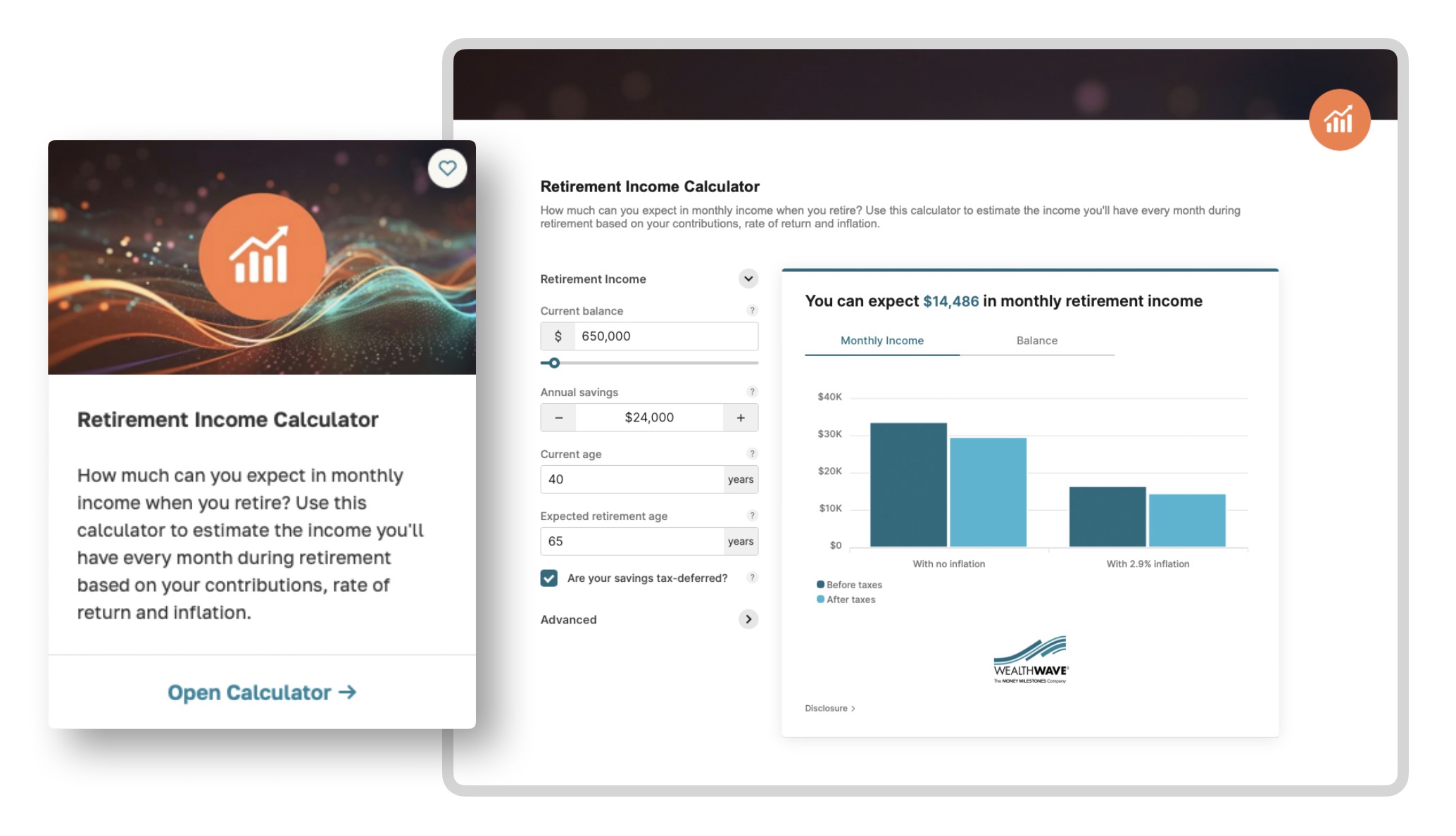
Should you envision a retirement commencing at 65, this tool becomes essential. Input your present savings, forecasted returns, and monthly contributions, and gain clarity on whether you're genuinely on the path to the retirement you desire. Because, in retirement planning, knowledge isn't just power – it's peace of mind.
Navigating the intricate maze of personal finance can often feel daunting. From managing daily expenses to planning for a future filled with dreams and uncertainties, creating an adaptable and robust roadmap is challenging. A clear path can not only alleviate the overwhelm but can turn financial planning from a chore into an exciting journey of empowerment.
The best-selling TheMoneyBooks series has crystallized this path into seven pivotal money milestones. These milestones are more than just steps; they're transformative shifts that ensure individuals and families survive and thrive in their financial landscapes. As we delve into each milestone, envision them as guiding beacons, illuminating your path to financial mastery and independence.
1. Get a Financial Education
In an age where financial uncertainty looms, arming yourself with knowledge is the first line of defense. Financial education hasn't been a priority in most schools. By diving into one of our TheMoneyBooks, you're giving yourself an invaluable gift: the comprehensive financial education you missed. It serves as a compass, helping navigate the complexities of the monetary world. As the adage goes, knowledge is power – and with these books, you're taking the first vital step to control and optimize your financial destiny.
2. Secure Proper Protection
Life is unpredictable, filled with both exhilarating highs and unforeseen challenges. Securing proper protection through life insurance isn't just a checkbox task; it's a testament to your foresight and care for your loved ones. It ensures that they remain financially shielded against life's curveballs. By investing in life insurance, you're sending a clear message: come what may, the financial well-being of my loved ones is non-negotiable.
3. Create an Emergency Fund
An emergency fund isn't merely a financial buffer; it's the anchor that keeps your financial ship steady during turbulent times. Whether unforeseen medical expenses, sudden job loss, or unexpected repairs, this fund ensures that life's hiccups don't derail your financial journey.
It allows you to face challenges head-on without compromising your long-term financial vision. Your fixed expenses (think mortgage, utilities, groceries) aren't going to pay themselves. Lauren Fairey says,
“Having three months of cash reserve is non-negotiable. It's your safety net against life's curveballs.”
And why three months? Turns out, that's the average time a 40-something needs to score a new gig. As you age, this buffer needs to increase, so by 50, target a six-month reserve.
Your emergency fund is sacred, but life's also for a living! By 40, aim to set aside a cool $5,000 (or more!) for those 'treat yourself' moments. As Lauren says,
“Think of this as the adult version of your childhood piggy bank, but instead of candies, you're splurging on that Parisian getaway or a sleek kitchen makeover.”
4. Apply Debt Management
Debts can be like shackles, holding you back from achieving your financial dreams. However, with strategic debt management, these chains can be broken. It's about understanding, strategizing, and methodically eliminating debt, freeing up resources to fuel your dreams. By managing your debts effectively, you're paving a smoother, more straightforward path to financial prosperity.
5. Increase Cash Flow
Financial growth is not just about saving; it's about expanding your income streams. Actively seeking opportunities to increase your cash flow transforms your financial landscape, opening doors to new investments, opportunities, and financial milestones. With more cash flowing in, you're better positioned to make decisions that align with your present needs and future aspirations.
6. Build Your Wealth
Saving is the beginning; wealth building is the masterstroke. This milestone is all about making your money work for you. Through savvy investing, intelligent financial decisions, and leveraging opportunities, you're not just accumulating wealth but ensuring it can grow, multiply, and create a legacy. It's about transitioning from being a passive saver to an active wealth builder.
7. Protect Your Wealth
Building wealth is commendable, but ensuring it's protected and seamlessly passed on is where true financial mastery lies. Estate planning is the guardian of your financial legacy. It ensures that your hard-earned assets are distributed according to your wishes, safeguarding your loved ones and preserving your financial vision even if you're not around.
These seven milestones offer a holistic blueprint for any individual or family seeking a robust financial future. With these as your guiding principles, the road to financial mastery becomes clear, achievable, and truly empowering. Christa challenges us,
“Planning for your financial future is not about restriction, but about empowering yourself to live fully today and tomorrow!”
So, gear up, take charge, and let's make the journey to 40 and beyond a financially fabulous one!
Setting the Stage for Future Success
Now that we've unlocked the crucial seven money milestones, it's not just about setting these goals but actively working towards them with enthusiasm and determination. Achieving these milestones doesn't happen overnight. It's a marathon, not a sprint, so prepare for a journey full of learning, adapting, and growing. Lauren wisely explains,
“Financial freedom isn't just about accumulating wealth. It's about creating opportunities, having peace of mind, and affording the lifestyle you've always envisioned for yourself and your family.”
Every dollar saved and invested is a step closer to building a financial fortress that allows you to live boldly and confidently.
Furthermore, remember that these milestones aren't set in stone. Life is dynamic, with its fair share of twists and turns. Periodically review and adjust your financial plan to align with your evolving lifestyle, goals, and dreams. As your income grows and your responsibilities change, your approach to money should also mature and develop.
“Your financial plan should be a living, breathing entity that grows and evolves with you. It should be your compass, guiding you through the financial wilderness towards a destination of financial stability and independence,”
advises Christa. Let these milestones be your North Star, illuminating the path towards a stable, secure, and enjoyable life in retirement.
Call to Action
Eager to champion your finances? The ideal time is now! Seize the moment and strategically position yourself for a cascade of financial success. Whether you're a blank canvas just beginning your financial journey or you've already painted a few strokes, let those seven milestones illuminate your pathway. And remember, when you're young, time isn't just on your side — it's your greatest asset. Leverage it!
Don't leave your golden years to chance. Utilize a retirement income calculator to ensure your financial strategy aligns seamlessly with your future aspirations. You can gauge whether you're on track to meet or exceed your retirement dreams by inputting your savings details and anticipated contributions. Planning today brings peace of mind for tomorrow; let the calculator guide you toward a fulfilling retirement.
Engage with financial educators like Lauren and Christa, immerse yourself in financial websites like howmoneyworks.com, and join communities of like-minded individuals navigating their financial journeys. With determination, discipline, and the proper knowledge, the vision of your financially secure future is not just a dream but an achievable reality.
Remember, knowledge is your superpower in personal finance, and action is your ally… especially if you're under 40. So, empower yourself, embrace the challenge, and let's secure a future that's not just financially sound but downright thrilling!
Redefining Wealth

It's Not Just About the Money
In an era characterized by financial aspirations, a new understanding of wealth emerges from America's heartland. Schwab’s seventh annual Modern Wealth Survey, which meticulously dissected the thoughts of Americans about money and affluence, showcased an intriguing twist to the common narrative of wealth.
While many might conjure images of sprawling mansions and hefty bank statements when thinking of affluence, a significant portion of Americans have a more profound, heartfelt interpretation. For them, the genuine essence of wealth isn't measured solely in dollars and cents.
Surveyed individuals were posed with the challenge of quantifying the monetary value equated with being "wealthy" in America. The collective consensus settled around an average of $2.2 million. Yet, a remarkable observation was that nearly half of the surveyed Americans, who self-proclaimed they felt wealthy, had an average net worth of $560,000. This is merely a fraction of the average amount. So, what gives?
Diving deeper, it becomes clear that for many, non-financial assets like health, family, and emotional well-being carry more weight in defining wealth than the zeros in one's bank account. Over 62% of respondents believe that nurturing healthy relationships defines wealth more accurately than amassing large sums of money. An even more heartwarming statistic reveals that seven in 10 Americans believe wealth is fundamentally about being free from financial stress rather than hoarding more money.
Expressing their sentiments about wealth, Americans, especially the older generation, prioritize well-being and experiences over monetary accumulation. For them, the richness of life isn't encapsulated by materialistic pursuits but rather by meaningful experiences, relationships, and peace of mind.
Yet, even in this redefined landscape of wealth, the survey found that planning for financial goals remains an afterthought for many. Only about one-third of Americans have actively charted their financial journey. The reasons range from perceived insufficiency of funds to complexity or sheer lack of time.
In this interconnected age, while strong familial ties are the cornerstone of perceived wealth, the world of social media offers a double-edged sword. It's a space where comparisons can easily sow seeds of doubt and insecurity, reshaping perceptions of personal wealth. The ability to live a life on par with peers is a significant determinant of feeling affluent for almost half the surveyed individuals. Social media amplifies this comparison, influencing lifestyle choices, financial decisions, and investment strategies, especially among younger Americans.
To navigate these complex feelings and decisions about wealth, a new wave of financial educators is rising to provide tools and content to address financial queries and empower individuals to make informed choices.
As America strides forward, the nation's heartbeat echoes a new mantra: Wealth isn't just about money; it's about life's riches that money can't buy. Whether it's the warmth of family gatherings, the joy of memorable experiences, or the peace of a stress-free life, the real treasures lie in the intangibles.
"Wealth consists not in having great possessions, but in having few wants.”
- Epictetus
"True wealth is not of the pocket, but of the heart and of the mind.”
- Kevin Gates
“Wealth is the ability to fully experience life.”
- Henry David Thoreau
"The real measure of your wealth is how much you'd be worth if you lost all your money.”
- Anonymous
"Wealth is not about having a lot of money; it's about having a lot of options.”
- Chris Rock
Loud Budgeting

Loud budgeting, a relatively new trend in personal finance, has gained significant popularity through various social media platforms. It involves a movement where individuals openly and publicly share their budgeting experiences, financial goals, and spending habits.
This transparent approach stands in contrast to the traditional method of keeping one's financial matters private. By embracing loud budgeting, individuals not only gain insights and inspiration from others but also foster a sense of accountability and motivation in their financial journeys.
This trend encourages a supportive community where people can learn from each other's successes and setbacks, ultimately leading to improved financial well-being and a more mindful approach to money management. So, whether you're looking to save for a dream vacation, pay off debt, or simply gain a better understanding of your financial habits, loud budgeting can provide the guidance and support you need to achieve your goals.
Here are some key aspects of how loud budgeting works:
1. Public Sharing of Financial Goals and Budgets: Individuals post their financial goals, budgets, and even detailed expense tracking online. This can be done through various social media platforms like Instagram, Twitter, or personal blogs. The idea is to be as transparent as possible about one's financial situation.
2. Accountability and Community Support: By sharing their financial journey publicly, people seek accountability and support from their online community. Followers might offer encouragement, share tips, or even hold the individual accountable for their financial decisions.
3. Educational Aspect: Many who participate in loud budgeting also aim to educate others. They share financial tips, tricks, and sometimes even mistakes they've made, turning their personal finance journey into learning opportunities for others.
4. Real-time Updates: Unlike traditional methods where budgeting is a private and sometimes infrequent activity, loud budgeting often involves regular, even real-time, updates about spending, savings, and financial challenges.
5. Use of Digital Tools and Apps: Participants often use budgeting apps, spreadsheets, or other digital tools to track their finances, which they then share screenshots or summaries of on social media.
6. Inclusivity and Diversity: Loud budgeting has opened the door to diverse voices in the field of personal finance. People from various socio-economic backgrounds share their unique perspectives and challenges, making financial discussions more inclusive.
Examples of Loud Budgeting:
1. Instagram Stories: An individual might use Instagram Stories to share their weekly or monthly budget, including breakdowns of expenses, savings, and financial goals.
2. Twitter Threads: Someone could create a thread documenting their journey toward a specific financial goal, such as paying off debt or saving for a house, including the ups and downs along the way.
3. YouTube Vlogs: Personal finance vloggers might create detailed videos explaining their budgeting techniques, showing how they allocate funds each month, and discussing how they adjust their spending habits.
4. TikTok Challenges: Short-form videos on TikTok where users participate in savings challenges, showcasing their progress and encouraging others to join.
5. Blogging: Detailed blog posts that include monthly financial reports, reflections on spending habits, and lessons learned about personal finance.
Loud budgeting has become a rapidly growing movement in personal finance. With the advent of social media, people now have the power to create a more open and supportive financial culture like never before. This shift in mindset not only encourages accountability and responsible spending, but also fosters a deep sense of solidarity as people from all walks of life come together to share their experiences, offer valuable tips, and overcome common challenges in managing their finances.
Through collaboration, people can forge a resilient, economically empowered community that uplifts and fosters mutual support on the journey toward financial success. Together, we can make financial well-being a tangible reality for everyone!
Kim Scouller
Navigating the Complexities of Social Security in 2024

The Information You Need
As we step into 2024, understanding the intricacies of Social Security becomes increasingly essential, especially for those nearing retirement. This vital program, often the cornerstone of retirement planning, demands strategic decision-making to maximize its benefits.
According to a study by the Social Security Administration, approximately 61% of retired individuals rely on Social Security for at least half of their retirement income. This underscores the significance of this program for many retirees in the United States, serving as a primary source of income during their golden years.
But how does Social Security actually work? And what factors determine the amount of benefits that an individual receives?
As mentioned, Social Security provides retirement income for millions of Americans. But it also serves as a safety net for people with disabilities and for surviving spouses and children. The program is funded through payroll taxes, which are withheld from workers' paychecks throughout their careers.
Bernie Sanders emphasized the value of Social Security, calling it “the most important and valuable social program in the history of the United States.”
Early Application: A Strategic Move
Initiating your Social Security retirement benefits requires a proactive approach. You are eligible to apply up to four months before your intended start date. However, timing is crucial. While you can commence receiving benefits as early as 62, each year you delay (up until 70) significantly increases your monthly payout.
Critical Considerations: When to Start Your Benefits
The decision of when to start receiving Social Security should not be taken lightly. If you opt to receive benefits at 62, you'll face a reduction compared to waiting until the full retirement age (FRA) of 67. Patience pays off; delaying benefits past your FRA can increase your monthly amount until you turn 70.
Payment Schedule: Understanding the Lag
Social Security operates on a delayed payment system. Benefits for any given month are paid in the following month. For instance, September's benefits will be disbursed in October. Your birthday significantly influences your payment schedule:
- 1st-10th of the month: Benefits arrive on the second Wednesday of the following month.
- 11th-20th of the month: Expect your benefits on the third Wednesday of the following month.
- 21st-31st of the month: Benefits are paid on the fourth Wednesday of the following month.
Application Process: A Step-by-Step Guide
Applying for Social Security is a straightforward process, primarily conducted online at ssa.gov. The website offers various applications, encompassing retirement, spousal, disability (SSDI), and Medicare benefits. Alternatively, you can call 800-772-1213 or visit a local office. To expedite the process and reduce wait times, scheduling an appointment is recommended.
Required Documentation: Preparing for Your Application
A successful application necessitates a comprehensive collection of personal and professional information, including:
- Personal details: Birth information, Social Security number, citizenship status, and proofs of birth and U.S. citizenship/work authorization.
- Spouse and children's information: Names, Social Security numbers, birthdates, marriage/divorce/death details.
- Previous Social Security applications, bank account details for benefit deposit, and intended start date for benefits.
- Employment information: Employer details, earnings, W-2 forms or self-employment tax returns, Social Security statement or earnings record, and special work or benefits history.
Which Claiming Age is the Best?
In-depth research conducted by United Income, a prominent online investment management firm, has shed light on the critical question: When is the best age to claim Social Security benefits for maximum lifetime income? This question, crucial for future retirees, intertwines factors like health, marital status, and financial needs, making the decision complex and uncertain.
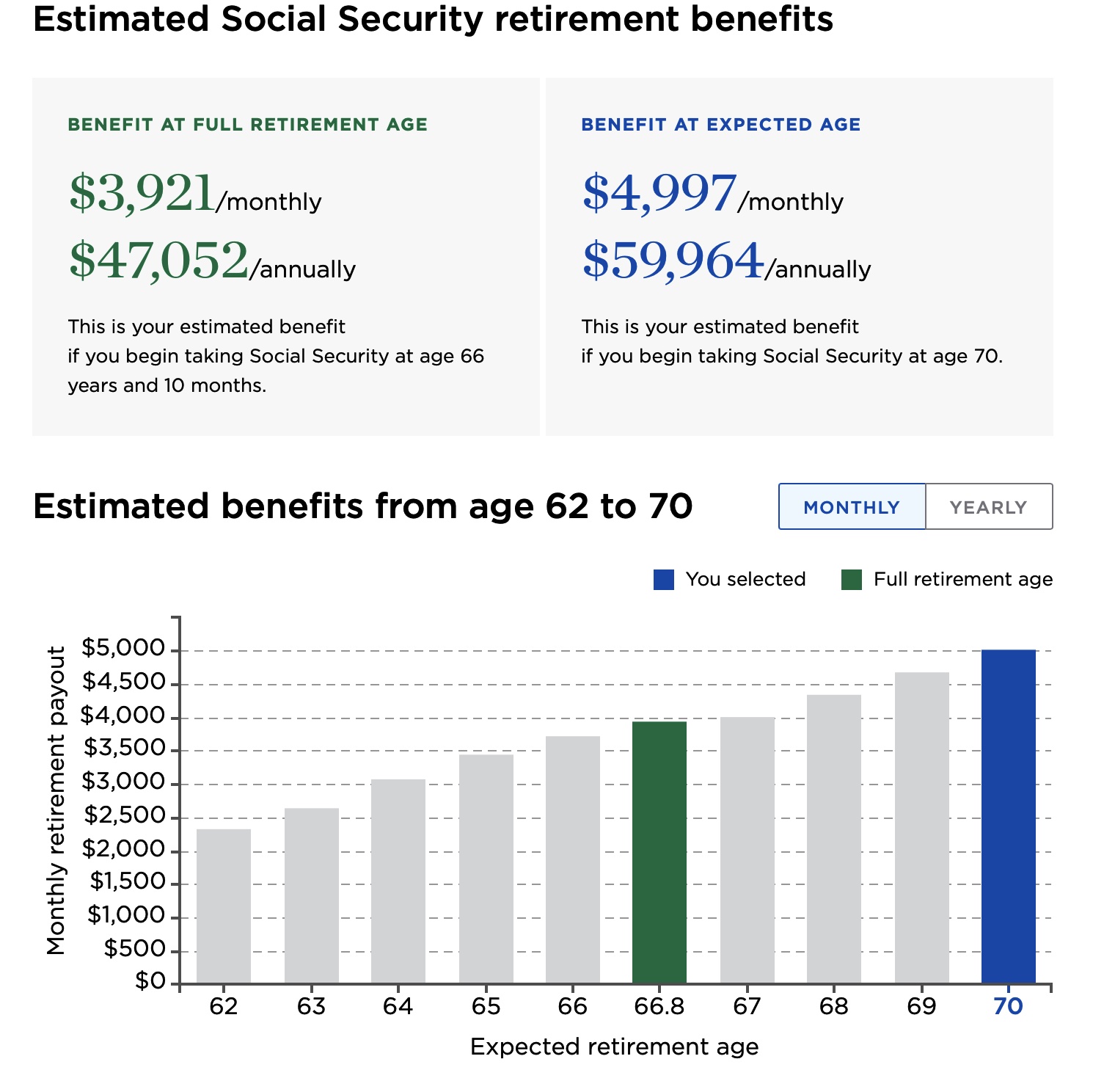
United Income's groundbreaking study, titled "The Retirement Solution Hiding in Plain Sight," delved into the Social Security claim records of 20,000 retired workers. These records, sourced from the University of Michigan's Health and Retirement Study, date back to 2019. The findings reveal a striking contrast between the common practice of early claims and the actual age that yields the highest lifetime benefits.
The analysis uncovered that only a mere 8% of those who claimed their Social Security benefits between the ages of 62 and 64 made the optimal decision in terms of maximizing lifetime income. On the other hand, a substantial 57% of retirees would have benefited most by waiting until the age of 70 to claim their benefits. While claiming at age 66 does offer a better outcome than claiming at 62, it's still surpassed by the benefits accrued from waiting until ages 67 through 70.
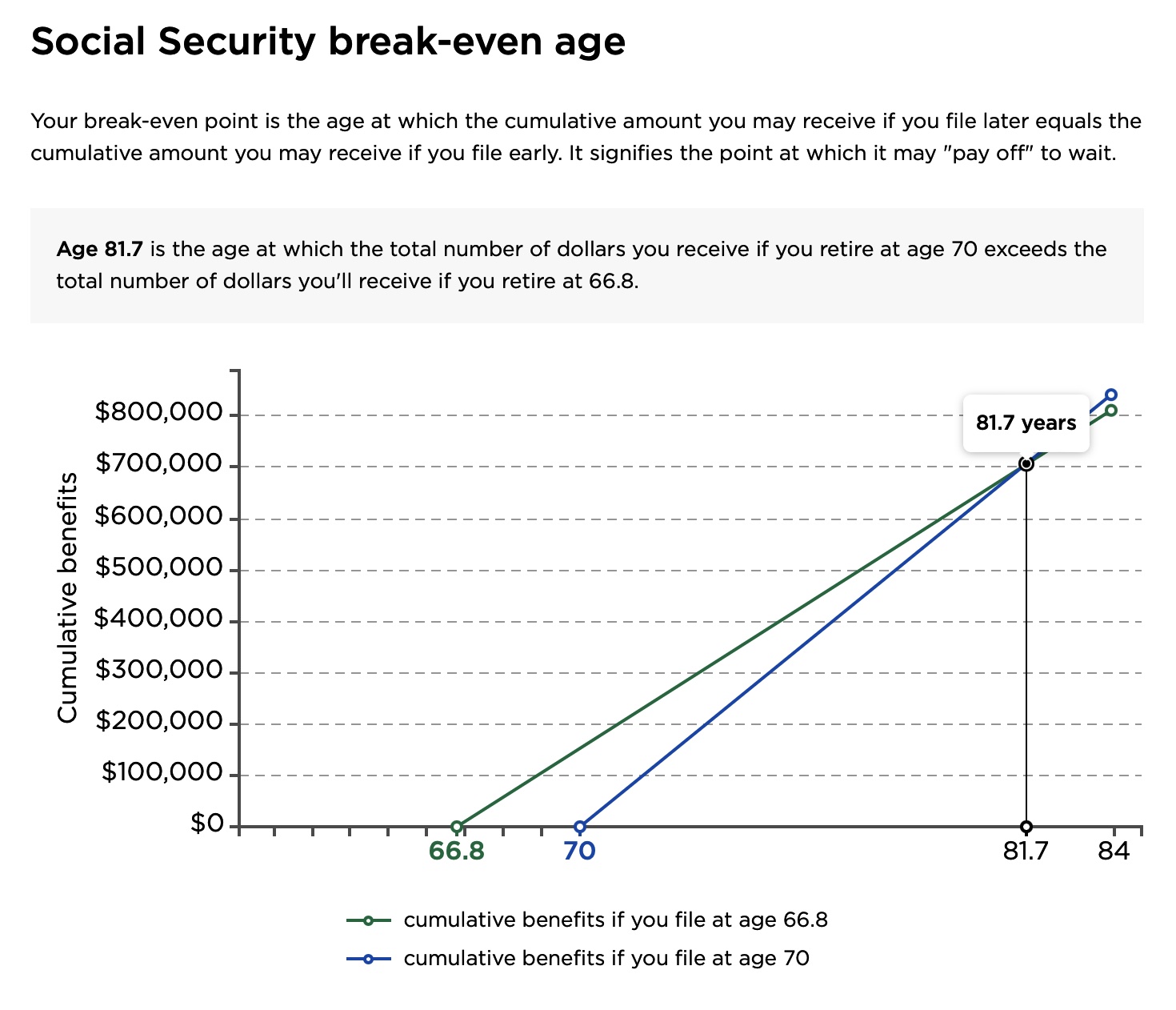
It's important to note, however, that this study does not dismiss the validity of early claims in certain scenarios. Individuals facing chronic health issues potentially reducing their life expectancy may find that claiming benefits early could result in higher overall income. Nevertheless, the overarching message from United Income's comprehensive research is clear: For the majority of future retirees, patience can be a strategic asset in maximizing their lifetime Social Security benefits.
2024 Social Security Updates: What to Expect
Social Security is a dynamic program continually evolving to serve its beneficiaries better. Key changes for 2024 include:
- Cost-of-Living Adjustment (COLA): Beneficiaries will receive a 3.2% COLA, enhancing monthly payouts to counter inflation.
- Varied Full Retirement Ages: Individuals born in 1957 and 1958 will experience different FRAs, impacting when full benefits can be accessed.
- Increased Maximum Benefits: The maximum benefit for high-income earners retiring in 2024 has risen, reflecting recent inflation trends.
- Higher Payroll Taxes for Top Earners: The wage base for Social Security payroll taxes has increased, affecting high-earning employees and self-employed individuals.
Empower Your Retirement: Staying Informed
Maximizing your Social Security benefits requires staying informed and making strategic decisions. Regularly monitoring your Social Security status and understanding annual changes are crucial steps in ensuring you receive the full financial support the program aims to provide. As 2024 unfolds, let this be your guide to navigating Social Security with confidence and clarity.
The Rule of 72

Unlock the Power of Compounding
In the world of personal finance, understanding the power of compound interest is crucial for making informed decisions. One valuable tool for grasping its implications is the Rule of 72, which offers a brilliantly simple way to estimate the time it takes for an investment to double. But did you know that this rule is equally insightful when considering the impact of borrowing?
Let's dive deeper into how the Rule of 72 can work both for you and against you, using real-world data as of December 2023. By exploring concrete examples and scenarios, we can gain a clearer understanding of the potential long-term effects on your financial goals. So buckle up as we delve into the details and uncover the fascinating dynamics of this mental math shortcut, The Rule of 72!
How the Rule of 72 Works
The Rule of 72, a simple and useful formula, provides an estimate of the time required for an investment to double. By dividing the number 72 by the annual rate of return or interest rate, you can obtain an approximate number of years it will take for your investment to double its initial value.
This rule is commonly employed by consumers as a quick assessment tool to evaluate the potential growth of their investments and make informed decisions about their financial goals.
By understanding the Rule of 72, you can better strategize and plan your investment portfolios, considering factors such as risk tolerance, time horizon, and desired returns.
When You Save: A Slow Climb
The national average Annual Percentage Yield (APY) for savings accounts currently stands at 0.57%1 as of December 2023. This means that for every $1,000 you save, you could expect to earn approximately $5.70 in interest over the course of a year.
Using the Rule of 72, which states that you can estimate the number of years it takes for your money to double by dividing 72 by the interest rate, we can see that it would take around 126 years for your savings to double at this rate.

This calculation unveils a stark reality: at the current rate of growth, it would take a staggering 126 years for your savings to double. This emphasizes the slow and sluggish nature of money's growth in traditional savings accounts, further underscoring the urgent need for more effective investment strategies.
The Impact of Low-Interest Rates
Now, let's contrast these figures with the reality of many traditional banks. Despite the national average for savings account APY being 0.57%, a significant number of bigger banks are offering meager interest rates as low as 0.01%.5
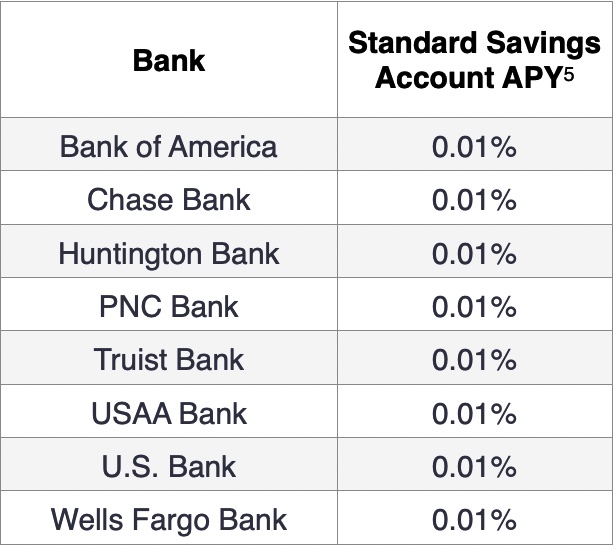
Applying the Rule of 72, this would theoretically require an astonishing 7,200 years for the amount to double. It's a sobering reminder of the importance of carefully considering where and how you decide to save and invest your money.
82% Overlook The Opportunity for Growing Wealth
As you can see, it’s not uncommon for bigger banks to offer lower savings account rates, as they have less need to attract new customers for deposit accounts. To truly outpace inflation and achieve substantial wealth accumulation over time, it’s crucial to explore alternative investment avenues that offer higher returns and greater financial opportunities.5
When it comes to saving money, many Americans are missing out on a fantastic opportunity to grow their savings with minimal risk. High-yield savings accounts can offer attractive interest rates, currently exceeding 5%, which is almost 10x higher than the national average for traditional savings accounts. Shockingly, a recent CNBC Select and Dynata Banking Behaviors Survey3 revealed that a staggering 82% of the population does not take advantage of these accounts.
The significance of this is clear - countless Americans are unknowingly forfeiting the chance to earn free money. Consider this: according to the Federal Reserve4, the average American family holds approximately $8,000 across various bank accounts, including checking and savings. If this amount were to earn the current average 0.57% APY in a traditional savings account, the total interest earned in a year would be a meager $46. Of course, this is far superior to the meager $0.80 you would have earned from one of the banks offering a negligible 0.01% APY. Conversely, if the same amount were deposited into a high-yield savings account earning 5.0% APY, the interest earned would exceed $400 for the same timeframe.
It is evident that by neglecting high-yield savings accounts, Americans can miss out on a significant opportunity to maximize their savings and make their money work harder for them.5
When You Borrow: A Fast Descent
The national average Annual Percentage Rate (APR) for new credit cards currently stands at a staggering 24.56%2 as of December 2023. This means that for every $1,000 balance you keep, you can expect to pay approximately $246 in interest over the course of a year.
Taking into account factors such as interest charges and fees, the APR provides a comprehensive understanding of the financial implications associated with credit card usage. By gaining a deeper insight into this significant metric, you can make more informed decisions when it comes to managing your finances and choosing the most suitable credit card options.

In less than three years, the amount you owe could double, compounding the urgency and illustrating the alarming speed at which debt can grow. This serves as a critical reminder of the perils of high-interest debt, emphasizing the importance of managing credit responsibly and taking proactive steps to mitigate its impact on financial well-being.
By adopting sound financial practices, such as budgeting, saving, and making timely payments, Americans can safeguard themselves against the detrimental effects of mounting debt and pave the way for a more secure and stable future.5
A Tale of Two Candies: Dum-Dums and Smarties
Banks often go the extra mile to offer small tokens of appreciation to their customers, such as delicious candies. Interestingly, one common choice that catches the eye is Dum-Dums lollipops. At first glance, it might seem like a simple and innocent gesture, but if we delve deeper, we can uncover a subtle metaphor that reflects the financial choices we encounter in our lives.

What's intriguing is that Dum-Dums are manufactured by the same company, Spangler, that produces another popular candy, Smarties. This stark contrast between the two candies serves as a powerful symbol, representing the decisions we make when it comes to our finances.
On the one hand, Dum-Dums represent the allure of financial complacency, where we may be tempted to make unwise choices without considering the long-term implications. On the other hand, Smarties embody the essence of smart and informed financial decisions, highlighting the importance of making choices that align with our goals and aspirations.
By offering these seemingly insignificant candies, banks remind us of the profound impact our financial decisions can have on our lives. It encourages us to reflect on the choices we make and strive to be more conscious and intentional in our financial journey.
For Savers: Seek Better Returns
Given the historically dismal returns on traditional savings accounts, it's crucial for consumers to explore other investment avenues that have the potential to generate higher returns over the long term.5 One such avenue to consider is low-cost index funds, which are designed to track the performance of a specific market index and offer diversification benefits.5
Additionally, investing in individual stocks or bonds can provide opportunities for higher returns, although they may come with higher risks.5 By diversifying your investment portfolio across different asset classes, you can increase your chances of achieving your financial goals and building long-term wealth.5
For Borrowers: Manage and Reduce Debt
If you carry high-interest debt, especially on credit cards, it is crucial to prioritize paying it off as soon as possible. One effective strategy to consider is debt consolidation, which involves combining multiple debts into a single loan with a lower interest rate.5
Another option is transferring balances to lower-rate cards, which can help reduce the overall interest charges and make it easier to pay off the debt faster. By taking these proactive steps, you can regain financial control and save money in the long run.5
Educate and Empower Yourself
Knowledge is a powerful asset that can greatly impact your financial decisions. By familiarizing yourself with tools like the Rule of 72, you gain a deeper understanding of how money works and can make smarter choices. It's important to seek financial education and advice to further enhance your financial literacy.
Remember, whether you choose the path of the Dum-Dums (those who lack financial knowledge) or the Smarties (those who make informed decisions), the choice is ultimately yours to shape your financial future.
The Rule of 72 is more than just a mathematical shortcut; it's a powerful tool that provides valuable insights into your financial decisions. By comprehending the dynamics of how money can either work for you or against you, you gain the ability to take control of your financial future.
With this knowledge, you can make informed choices that pave the way for prosperity and ultimately lead to lasting financial freedom. So, embrace the Rule of 72 as a guiding lens, empowering you to navigate the intricacies of personal finance with confidence and success.
- Average Savings Account Rate 12/13/2023: https://www.bankrate.com/banking/savings/average-savings-interest-rates/
- Average New Credit Card Rate 12/13/2023: https://www.lendingtree.com/credit-cards/average-credit-card-interest-rate-in-america/
- CNBC Savings Article https://www.cnbc.com/select/americans-not-using-high-yield-savings-accounts/
- Federal Reserve Survey of Consumer Finances: https://www.federalreserve.gov/econres/scfindex.htm
- The information provided is for educational and informational purposes only and should not be construed as financial advice. The discussion about the impact of low savings account interest rates and the opportunities for growing wealth through alternative investment avenues, including high-yield savings accounts, and high credit cards rates, reflects general market trends and data available 12/13/2023. Individual financial situations and goals may vary, and it's crucial to consult with a qualified financial professional before making any savings, investment or credit decisions. The examples and data cited, including interest rates and survey results, are illustrative and may not represent current market conditions. Readers should conduct their own research and consider their financial circumstances and risk tolerance before investing.
Financial Empowerment for Women

Insights from Kim Scouller
Attorney and Certified Financial Educator Kim Scouller, celebrated for her new book How Money Works for Women, was recently interviewed on the global health and wellness show Bloom on NBC Tampa. Hosted by Gayle Guyardo, the episode provided a platform for Kim, a stalwart Women’s Financial Advocate, to shed light on the inspirations behind her literary piece.
During her engaging chat with Gayle, Kim imparted valuable financial wisdom tailored to women. Here's a glimpse of the financial empowerment she advocated:
Break the Silence on Money
Traditionally, discussions about money have remained muted amongst women. To foster change, it's essential that women, more than anyone, discuss financial matters with family, friends, and fellow women. Let's shift money talk from a hush-hush topic to an open conversation.
Grasp Your Financial Reality
Understanding one’s financial situation is paramount. Every woman must be aware of her cash flow, assets, insurance, and debts. Acquiring a holistic view of your finances helps in recognizing areas of strengths and opportunities for improvement. It's all about being proactive and being in the driver’s seat of your financial journey.
Chart Your Financial Journey
Carve out your own savings and spending plans aligned with your financial aspirations. To amplify your financial health, introspect: How can I augment my income? How do I transcend the paycheck-to-paycheck life? What's my strategy to curtail unwanted debt? Do my savings suffice for retirement? What's my investment capacity right now?
Dive into Fundamental Financial Concepts
Many might be oblivious to financial terminologies such as Compound Interest, The Time Value of Money, or The Rule of 72. Yet, these are foundational concepts that can magnify your financial growth. Hence, it's vital for women to familiarize themselves with the mechanics of money.
Forge Alliances with Financial Experts
Engaging with a financial expert isn't a luxury limited to the affluent. It’s a necessity for all. Seek a trustworthy financial professional who can offer insights specific to your financial scenario. Such collaborations can pave the way for a robust financial future tailored to your individual needs.
Kim's appearance on NBC Tampa and Bloom not only highlighted the essence of her book but also reiterated the importance of financial literacy amongst women. As women move forward, let her insights be a beacon for them to achieve financial autonomy and security.
The Power of Financial Education

In today's rapidly changing and complex economic landscape, the importance of financial education cannot be overstated.
Only 23 States offer courses in high school that could start the process. Financial literacy, the understanding of basic financial concepts and the ability to make informed decisions about money, is a fundamental skill that can pave the way to success and prosperity. From managing personal finances to making investment decisions, a solid foundation in financial education is crucial for individuals to navigate the intricate world of money effectively.
The Financial Literacy Gap
One of the pressing challenges facing many people is the financial literacy gap. A significant portion of the population lacks the knowledge and skills required to make sound financial decisions. This gap can lead to dire consequences, including high levels of debt, poor retirement planning, and limited access to wealth-building opportunities. Without a proper understanding of financial principles, individuals may fall victim to predatory lending, make uninformed investment choices, and struggle with long-term financial stability.
Empowering Decision-Making
Financial education empowers individuals to take control of their financial destinies. By providing the knowledge needed to manage budgets, create savings plans, and understand the implications of different types of debt, people can make informed decisions that align with their long-term goals. This level of empowerment reduces financial stress, enhances financial well-being, and opens doors to opportunities that might otherwise be out of reach.
The Benefits of Early Education
Introducing financial education at an early age is particularly impactful. When children and young adults learn about the importance of saving, investing, and budgeting from an early stage, they develop healthy financial habits that can last a lifetime. Understanding the value of money, the power of compounding, and the risks and rewards of different financial choices gives young people a head start in building a secure financial future.
Navigating the Complex World of Investments
Investing is a cornerstone of building wealth, but it can be daunting for those without a solid financial education. Understanding the basics of stocks, bonds, mutual funds, and other investment vehicles is crucial to making informed choices that align with individual risk tolerance and financial goals. Without this knowledge, individuals might be susceptible to fraudulent schemes or might miss out on opportunities for growth.
Adapting to Changing Times
The financial landscape is continually evolving, with new technologies, investment options and economic trends emerging regularly. Without a foundation in financial education, individuals can struggle to keep up with these changes and make well-informed decisions. Financial education not only imparts timeless principles but can also teach individuals how to adapt and thrive in a rapidly changing financial environment.
Bridging the Gap with Financial Education
Families, companies, educational institutions, and communities can all play vital roles in bridging the financial literacy gap. Integrating financial education into daily life at home or work and school curricula growing up can foster a culture of open conversations about money and collectively elevate financial literacy rates.
Individuals themselves also have a role to play. Taking the initiative to seek out financial education resources, reading books like HowMoneyWorks: Stop Being a Sucker and HowMoneyWorks for Women: Take Control or Lose It, attending classes, and working with a financial professional can all contribute to one's personal growth in financial literacy.
In a world where financial decisions have a profound impact on our lives, the need for financial education cannot be overstated. Empowering individuals with the knowledge and skills to make informed decisions about money is a crucial step toward financial success. Whether it's managing personal finances, making informed savings choices, or planning for retirement, a solid foundation in financial education can provide the tools necessary to navigate the complex world of finance with confidence. By investing in your financial education today, you can secure your financial future and pave the way for a life of prosperity and success.
Understanding the Time Value of Money

A Fundamental Financial Concept
When it comes to financial literacy, few principles are as essential and foundational as the time value of money (TVM). It's a concept that serves as the bedrock for many financial decisions, from investments to loans and savings. But what is the time value of money, and why is it so crucial?
What is the Time Value of Money?
At its core, the time value of money posits that the purchasing power of a unit of currency can vary over time. In other words, a dollar today doesn't have the same value as a dollar tomorrow. This principle implies that money's worth is intrinsically tied to time.
Why Does Money Have Time Value?
There are several reasons why money changes value over time:
Opportunity Cost: Money has potential earning capacity. If you have $100 today, you could invest it and earn interest, making your $100 worth more tomorrow. Conversely, if you receive $100 a year from now, you've lost a year's worth of potential earnings on that money.
Inflation: Over time, most economies experience inflation, which means that goods and services gradually increase in cost. As a result, the purchasing power of money decreases. A candy bar that costs $1 today might cost $1.10 next year due to inflation.
Risk and Uncertainty: The future is always uncertain. There's a risk that you might not receive money in the future due to various reasons, such as a borrower defaulting on a loan. Hence, money today is considered more valuable than the promise of the same amount in the future.
Consumption Preferences: Many people prefer immediate gratification over delayed rewards. This preference means that they might value having money today to spend immediately rather than waiting.
Applications of the Time Value of Money
Understanding TVM is crucial for various financial applications:
Investment Decisions: When considering an investment, you'll want to know the future value of your money based on the returns you expect to earn.
Loan Calculations: Lenders charge interest to compensate for the opportunity cost of lending money. TVM helps in determining appropriate interest rates.
Retirement Planning: When planning for retirement, it's vital to consider how much money you'll need in the future, accounting for inflation and expected returns on investments.
Valuation of Businesses: In business valuation, future revenues and costs are discounted back to their present values to provide an accurate valuation.
Key TVM Concepts
Present Value (PV): This refers to today's value of money. It answers the question, "What is the value of future money in today's terms?"
Future Value (FV): This refers to what money today will be worth in the future after earning interest or returns.
Discount Rate: This rate is used to discount future money back to its present value. It represents the interest rate or return rate and can be thought of as the opportunity cost of money.
Delving Deeper Into the Time Value of Money: Its Implications and Real-World Examples
While the foundational understanding of the time value of money (TVM) rests on the idea that the worth of a currency unit varies over time, the implications of this principle permeate vast areas of finance and economics. Let’s delve deeper into the nuances of TVM and examine how it plays a role in everyday life and sophisticated financial scenarios.
Compounding: The Eighth Wonder of the World
Albert Einstein famously said, “Compound interest is the eighth wonder of the world. He who understands it, earns it; he who doesn't, pays it.” Compounding refers to the process by which an investment grows not only based on the principal (the initial amount) but also on the accumulated interest from prior periods.
Example: If you invest $1,000 at an annual interest rate of 5%, you'll have $1,050 after one year. If you keep it invested, you won't just earn 5% on the original $1,000 during the second year; you'll earn it on the full $1,050, leading to even more significant growth.
Discounting: The Reverse of Compounding
Just as compounding allows us to determine the future value of present money, discounting enables us to figure out the present value of future money. This is particularly valuable in scenarios like valuing cash flows expected from an investment in the future.
Real-World Scenarios: TVM in Action
Mortgages and Car Loans: When banks determine monthly payments, they consider the TVM. This is why interest payments are higher at the beginning of a loan term.
Annuities and Pensions: Monthly retirement benefits are calculated based on TVM, ensuring that the sum set aside today will cover future retirement needs.
Lease Agreements: Companies that lease equipment or property will use TVM to determine lease payments, ensuring the lessee pays for both the use of the asset and the lost potential interest.
Project Valuation: Companies use TVM to decide whether to pursue projects. They'll discount future cash flows to determine if they present a positive net present value.
Factors Affecting TVM
Interest Rate Fluctuations: As central banks adjust rates in response to economic conditions, the TVM shifts. For example, in a high-interest environment, the future value of money invested today becomes more significant.
Economic Policies: Governmental fiscal policies can influence inflation and, in turn, the purchasing power of money, affecting its time value.
Global Events: Events like pandemics or geopolitical tensions can lead to economic uncertainties, affecting interest rates and inflation expectations.
Tools for TVM Calculations
In today's digital age, various tools can help individuals and professionals with TVM calculations:
Online Financial Calculators: Online financial calculators stand out as a prime example of modern financial technology tools that cater to both seasoned professionals and financial novices. Designed with user-centric principles, these calculators simplify complex financial computations, enabling users to effortlessly evaluate investment returns, project retirement savings, and assess debt repayment strategies, among other tasks.
Moreover, the integration of real-time data ensures that the calculations are always based on the most current market conditions. Coupled with an intuitive interface and robust data visualization tools, these online calculators not only demystify the numerical aspects of finance but also empower individuals to make informed decisions that align with their financial goals.
Spreadsheet Software: For those who love do-it-yourself, platforms such as Microsoft Excel, Apple Numbers, and Google Sheets have transformed the realm of financial calculations with their built-in functions tailored for computing present and future values, factoring in diverse variables.
These versatile spreadsheet tools are more than just digital canvases for data entry; they enable users to create dynamic financial models, run simulations, and visualize trends. With just a few keystrokes, you can swiftly analyze investment scenarios, compare loan offers, or chart retirement savings trajectories.
Mobile Apps: Numerous finance and investment apps offer the capability to perform TVM calculations on-the-go, significantly aiding in swift and informed decision-making. Many finance professionals lean into the digital age by using the HP 12C Platinum app on their smartphones. The app, a digital replica of the iconic HP 12C calculator, brings the familiarity of classic financial calculations to the palm of your hand.
Final Thoughts
The time value of money is a prism through which myriad financial decisions should be viewed. Its principles are immutable, yet the factors influencing it are dynamic. As we navigate our financial journeys, understanding the interplay of money, time and potential opportunities ensures we remain informed, proactive and prepared for the future.
The time value of money is a fundamental financial concept that underscores many personal and business financial decisions. Whether you're saving for a significant purchase, planning for retirement, or considering an investment opportunity, understanding how money's value changes over time can lead to better, more informed decisions.
Remember: A dollar today isn't just a dollar—it represents potential growth, opportunities, and future security.
Unveiling the Silent Partner in Your Financial Journey

Exploring the Unseen Impact of Inflation on Your Finances
In the world of personal finance, where numerous factors play a crucial role in shaping your financial future, one often overlooked companion stands out: inflation. Inflation, an economic phenomenon characterized by the gradual increase in the prices of goods and services over time, wields a significant influence over the economic landscape.
It can erode the purchasing power of money, affecting everything from the cost of living to investment returns.
Understanding the implications of inflation is paramount for making informed financial decisions and safeguarding your financial well-being in the long run.
Four Decades of Inflation
Over the past 40+ years, inflation rates in the U.S. have exhibited a downward trend with moderate fluctuations. In the early 1980s, the country experienced high inflation, with rates soaring over 13%. This was partly due to the Federal Reserve's effort to quell the rapid inflation of the 1970s. The remainder of the decade witnessed a steady decline, with inflation averaging around 4% by the late 1980s.
Moving into the 1990s, inflation rates remained relatively stable, hovering around 2-3%. This period of low inflation, coupled with economic expansion, is often referred to as the “Great Moderation.”
The turn of the millennium brought with it the dot-com bubble burst and the 2008 financial crisis, causing temporary spikes in inflation. However, the overall trend remained stable, with inflation rates predominantly in the 1-3% range.
In the 2010s, despite the economic recovery, inflation remained low, even dipping below 1% at times.
As we move through the decade of the 2020s, it’s worth noting that inflation rates have witnessed significant volatility due to the far-reaching economic repercussions triggered by the unprecedented COVID-19 pandemic. The global health crisis has upended economies worldwide, leading to fluctuations in inflation rates as governments and central banks grapple with the challenges of stabilizing their respective economies and supporting businesses and individuals during these uncertain times.
The Impact of Inflation on Your Finances
While low and stable inflation is generally beneficial for economic growth, it can have a significant impact on your personal finances. One of the most significant effects of inflation is its erosion of purchasing power over time. In simpler terms, the same amount of money will buy you less in the future due to rising prices.
For example, let's say you have $10,000 in a savings account earning 2% interest. If the inflation rate is also at 2%, your money will essentially stay the same in purchasing power. However, if inflation increases to 4%, your savings will only be worth around $9,500 in today's dollars after one year.
This is why it is crucial to consider inflation when making financial decisions, such as investment choices and budgeting for the future. It's like a quiet breeze that is constantly present, subtly impacting the economy and affecting the purchasing power of individuals. Understanding the dynamics of inflation and its implications is crucial for making informed financial decisions and planning for the future.
How Inflation Works: A Tale of Two Coffees
Let's illustrate the concept of inflation with a simple story. Imagine, ten years ago, you could walk into your favorite coffee shop and purchase a steaming cup of your beloved coffee for just $2. Fast forward to today, and that same cup of coffee now costs $3.50. This increase in price is a direct result of inflation, which refers to the general rise in prices over time.
Essentially, what inflation means is that the purchasing power of your money decreases as time goes on. In other words, the dollar in your pocket today won't be able to buy you as much as it could a few years down the line. This is why it's important to understand inflation and its impact on our daily lives. By staying informed and making wise financial decisions, we can navigate the ever-changing economic landscape and make the most of our hard-earned money.
Inflation and Your Finances: A Balancing Act
Inflation impacts every aspect of your finances, from savings to investments to debts. If you're saving money, inflation acts as a silent thief, eroding the future value of your savings. For instance, if you stash $10,000 in a box today, it might only have the buying power of $7,000 or less in 10 years, depending on the rate of inflation.
However, it's not all gloomy. Inflation can actually work in favor of those who have long-term fixed-rate debts, such as a mortgage. Here's why: When you lock in a mortgage at a fixed rate, the amount you pay remains constant.
As inflation rises, the real value of what you pay back decreases. This means that over time, you effectively end up paying back less in real terms than what you initially borrowed. So, while inflation may seem like a negative force, it can actually benefit those who have fixed-rate debts in the long run by reducing the real burden of repayment.
The Investment Balancing Act
The key to combating inflation lies in making wise investments. Historically, stocks have proven to be an excellent investment option, offering returns that have consistently outpaced inflation. Additionally, real estate investments can serve as a valuable hedge against inflation.
As property values and rents tend to rise in tandem with inflation, investing in real estate can help preserve the purchasing power of your assets over time. By diversifying your investment portfolio and considering these options, you can effectively protect your wealth from the erosive effects of inflation.
A Cautionary Tale
Consider the story of Emily, who saved $20,000 in her bank account over 20 years ago. She felt secure, believing her nest egg would suffice for her retirement. However, she didn't account for inflation. Now, her $20,000 has the same purchasing power as around $12,000 had two decades ago. Emily's story teaches us the importance of accounting for inflation in our long-term financial planning.
“Inflation is when you pay fifteen dollars for the ten-dollar haircut you used to get for five dollars when you had hair.”
– Sam Ewing
Embracing the Silent Partner
Inflation, the persistent rise in prices over time, is an inescapable and crucial aspect of our financial lives. It has the potential to work against us, eroding the purchasing power of our money. However, by comprehending and planning for inflation, we can mitigate its impact and safeguard the value of our hard-earned money.
Developing financial literacy entails not only acquiring the knowledge of how to generate income but also understanding the strategies to preserve its value in the face of inflationary pressures. By taking proactive steps to account for inflation, we can navigate the ever-changing financial landscape with confidence and resilience.
A Call to Action
Educate yourself about inflation, the gradual increase in prices over time. It's important to understand its impact on your savings and investments. By adjusting your strategies to outpace inflation, you can ensure the growth of your financial portfolio. Embrace inflation as a silent partner, one that challenges you to be proactive, creative, and strategic in your financial journey.
Stay informed about economic trends, explore diverse investment options, and make well-informed decisions to navigate the ever-changing financial landscape. Remember, by staying ahead of inflation, you can protect your purchasing power and achieve long-term financial success.
Thriving in an Inflationary World
While inflation, the gradual increase in prices over time, is an unavoidable companion in our financial journey, it doesn't have to be a formidable foe. By understanding the factors that drive inflation, such as changes in the money supply, demand-pull, and cost-push factors, we can gain a deeper insight into its impacts on our economy.
“Plan for inflation: it's not just a challenge, but an opportunity to grow smarter, stronger, and more resilient in your financial journey. Remember, the best time to plant a tree was 20 years ago. The second best time is now. Start planning, start investing, start defeating the silent partner that is inflation.”
- Tom Mathews
Implementing effective strategies, such as diversifying our investments, hedging against inflation, and adjusting our spending habits, can help us navigate the challenges posed by inflation. By doing so, we not only turn this silent partner into a catalyst for smarter financial planning but also pave the way towards a more secure and resilient financial future.
With careful consideration of investment options, diversification, and staying informed about economic trends, we can navigate the impact of inflation and ensure that our hard-earned money retains its value and grows over time. Remember, being proactive in managing inflation is a key component of long-term financial success.
The best way to compare inflation rates is to use the end-of-year consumer price index (CPI), which creates an image of a specific point in time.
The table below compares the inflation rate (December end-of-year) with the fed funds rate, the phase of the business cycle, and the significant events influencing inflation.
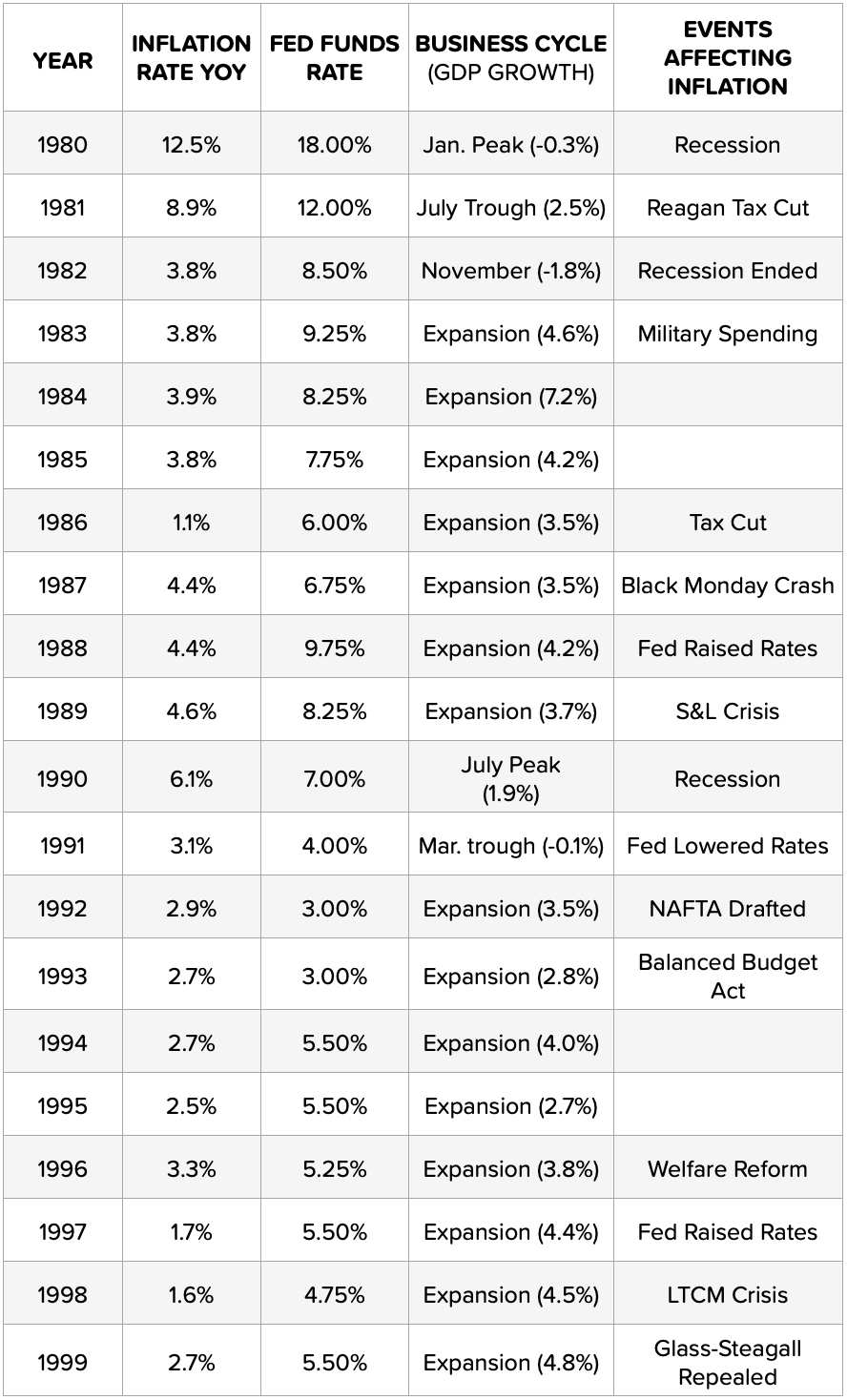
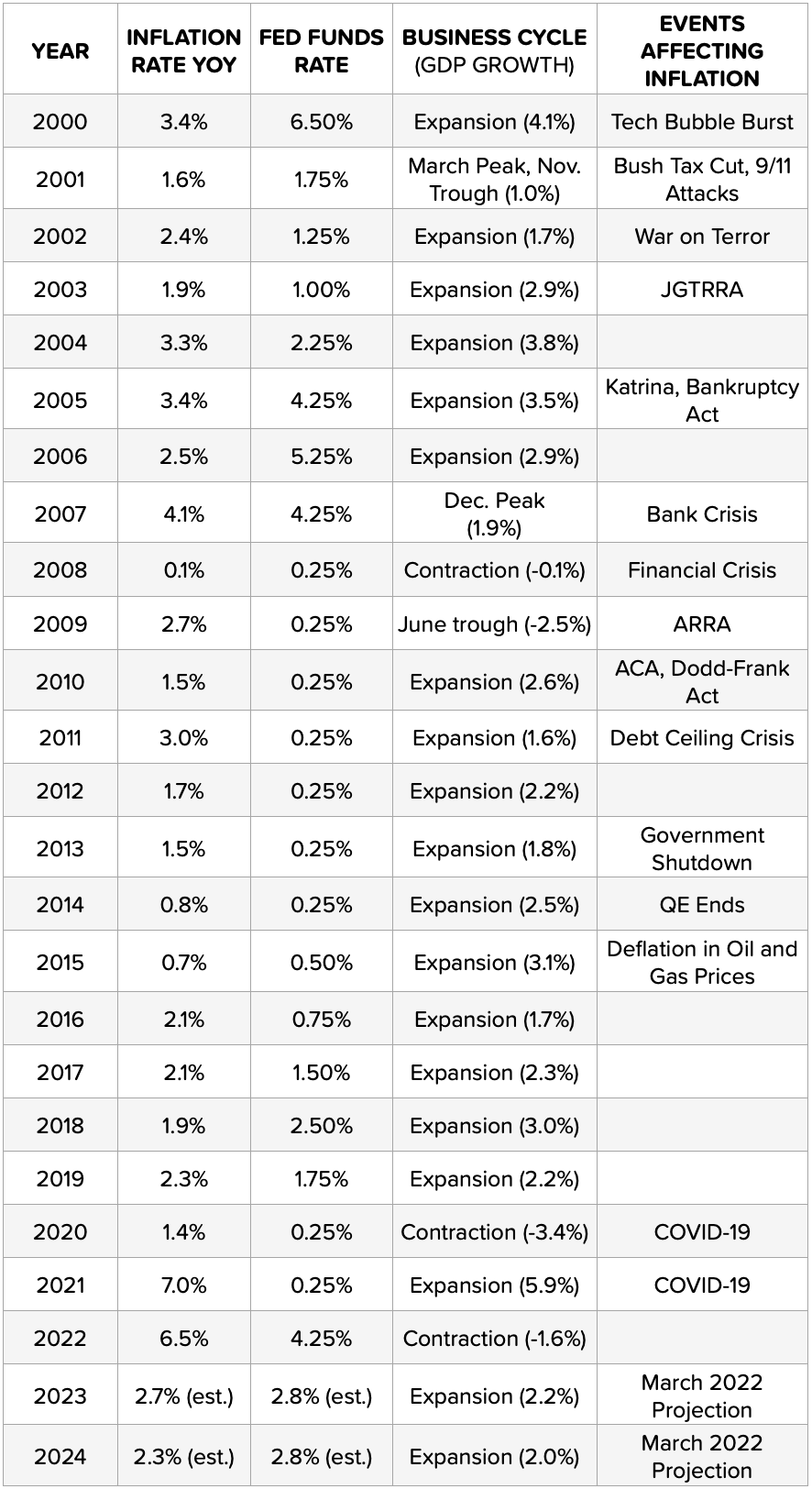
Turning Inflation from Foe to Ally
Inflation is not just an economic concept, but a living, breathing aspect of our financial realities. It's an uninvited guest at every financial decision we make, but understanding and planning for it transforms this potential adversary into a powerful ally.
We cannot control the winds of economic change, but we can adjust our sails. It's time to embrace the challenge. Educate yourself about inflation and its effects. Review and adjust your savings and investment strategies to not just withstand, but also outpace inflation. Seek advice from financial experts, leverage tools and resources available to you, and stay informed about economic trends.
Your call to action is clear: Start today. Reevaluate your financial plans with an eye on inflation. Invest in knowledge, in assets that historically beat inflation, and in strategies that can secure your financial future. Remember, the best time to take control of your financial journey was yesterday; the next best time is now.
Together, we can turn the silent challenge of inflation into an opportunity for growth, security, and financial success. Let's take this journey not as passive observers, but as active, informed participants shaping everyone’s financial destinies.
Unlocking the Mysteries of the Rule of 72

Ever wished you had a magic wand to foresee the future? Well, guess what?
In the world of finance, we have something pretty close: The Rule of 72! It’s almost like a crystal ball that offers glimpses into your money's future, and it’s simple enough for anyone to use.
The Rule of 72: A Quick Overview
The Rule of 72 is a fascinating and incredibly handy tool. At its core, it gives us insight into how long it'll take for an investment to double in value. It's the magic number that, when divided by the annual interest rate, spills the beans on your money's future doubling time. For instance, at a 6% annual return, your money would double in roughly 12 years (72 ÷ 6 = 12).
Three Exciting Ways to Play with the Rule of 72
Doubling Down on Your Investments:
Let’s say you have $1,000, and you’re curious about how long it will take to turn it into $2,000 at a certain interest rate. With the Rule of 72, you can whip out your calculator and, in seconds, determine the magic number of years. Whether you're saving for a dream vacation or a cool gadget, this tool offers a quick peek into your investment's future.
Quadrupling Fun:
But why stop at doubling? Let's kick it up a notch! The Rule of 72 doesn’t just tell you when your investment will double. You can use it to estimate when your money will quadruple! If you discover your money doubles in 8 years, give it another 8 and bam! You're looking at a quadrupled amount!
Racing Against Time:
Here's a fun game to play: If you have a particular period in which you wish to double your money, the Rule of 72 can tell you the annual rate of return you’d need. Dreaming of doubling that cash in 6 years? You'd need an interest rate of about 12% (72 ÷ 6 = 12).
The Rule of 72 offers a blend of simplicity, excitement, and practicality, making financial forecasting not just accessible, but, dare we say, fun!
It demystifies the complex world of investments, turning it into a playground where you’re armed with a powerful tool to envision your monetary future. So, go on and explore this financial magic; the power of 72 awaits!
Charting a Tax-Smart Retirement Journey

Embarking on the golden years of retirement, it’s imperative to illuminate the often-shadowed realm of taxes, a crucial player that, without meticulous planning, can significantly erode the value of your hard-earned retirement funds.
Envision a robust $1 million portfolio nestled in a 401(k) plan or a traditional IRA; this seemingly formidable nest egg might dwindle to a mere $800,000 or even less post-taxes. Similarly, investments harbored in standard, taxable accounts are not immune to the tax bite on the income they yield.
However, fear not, for there are strategic maneuvers available to navigate this fiscal maze. One potent strategy is to amplify your savings and investment efforts during your employment years, thereby accruing additional funds designed specifically to offset your tax liabilities. Alternatively, adopting a tax-savvy approach to your investment and account selections can significantly minimize your tax burden, leaving more of your funds intact and available for your enjoyment and use during retirement.
Let’s delve into the treasure trove of retirement income sources that are mercifully exempt from taxes:
Roth Withdrawals
Roth accounts are your steadfast allies in the quest for tax-free retirement income. Both IRA and 401(k) plans can don the Roth mantle, offering no tax deductions on contributions but granting the boon of tax-free withdrawals post the age of 59 ½. With Roth, you graciously pay your taxes at the contribution stage, thereby freeing your future withdrawals from the tax chains. While income ceilings exist for Roth contributions, fear not, for the conversion of traditional plans to Roth is always an option, albeit with applicable taxes on the conversion amount.
Inheritances
While relying solely on inheritances for retirement is a precarious strategy, many fortunate individuals do receive these tax-free financial windfalls, which can seamlessly supplement existing retirement savings.
Municipal Bond Income
Investing in municipal bonds, those issued by states and localities to fund essential public projects, offers a dual benefit: contributing to the common good and enjoying tax relief at the federal level on the interest earned. Residents of high-tax states may find these bonds particularly appealing, as they often come with state tax exemptions as well.
HSA Withdrawals
Health Savings Accounts (HSAs) are the financial Swiss Army knives of retirement planning, blending the best features of traditional and Roth IRAs. With tax deductions on contributions and tax-free growth within the account, HSAs are a potent tool, especially when funds are used for qualifying healthcare expenses.
Some Social Security Payments
While not universally tax-free, many Social Security payments do enjoy this status. However, it’s crucial to be aware that income levels can influence the taxation of these benefits, with higher earners potentially facing taxes on a portion of their Social Security income.
Life Insurance Proceeds
Life insurance payouts, often substantial, can provide a significant boost to retirement funds. Like inheritances, these proceeds are typically tax-free to the recipient, especially when received as a lump sum.
Embarking on retirement is a monumental life transition, laden with both excitement and challenges. Taxes, while potentially daunting, can be effectively managed with strategic planning and savvy decision-making. By harnessing the power of tax-exempt income sources and adopting a proactive approach to tax planning, you can safeguard your retirement funds, ensuring a financially secure and enjoyable retirement. The golden years are yours to relish, unencumbered by undue financial stress. With wisdom and foresight, navigate towards a retirement where your funds work for you, not against you, in the grand tapestry of your life’s next exhilarating chapter.
As you stand on the brink of retirement, the horizon is painted with endless possibilities, each day offering a canvas for you to paint with the vibrant colors of life’s joys and pleasures. However, the specter of taxes can cast a shadow over this bright panorama, subtly eroding the financial foundation upon which your dreams are built. It is here, in the meticulous crafting of a tax-wise retirement strategy, that you can truly set the stage for a retirement that is as financially secure as it is delightful and fulfilling.
Harness the power of tax-exempt income sources, those silent warriors that work tirelessly behind the scenes to protect your wealth from the relentless grasp of taxes. With instruments like Roth accounts, inheritances, municipal bonds, HSAs, certain Social Security payments, and life insurance proceeds in your arsenal, you have at your disposal a suite of tools designed to maximize your income while minimizing your tax liability. Each of these vehicles offers unique benefits, and when strategically integrated into your broader financial plan, they collectively serve as a bulwark against unnecessary wealth erosion due to taxes.
But remember, the journey to a tax-efficient retirement doesn’t happen by accident. It is the result of deliberate planning, informed decision-making, and a deep understanding of the tax landscape and its implications for your retirement income. Engage with financial advisors, immerse yourself in financial education, and stay abreast of the ever-changing tax laws and regulations. Knowledge, after all, is your ally, illuminating the path to a retirement where financial stress is minimized, and the joy of living is maximized.
So, as you step forth into the golden tapestry of retirement, do so with confidence and the assurance that comes from being prepared. Let the knowledge of tax-free income sources be the wind beneath your wings, propelling you forward into a retirement that is not just endured, but truly lived. With foresight, planning, and a commitment to financial wisdom, your retirement can indeed be a golden era marked by financial stability, peace of mind, and the freedom to pursue your heart’s deepest desires and joys. The canvas of retirement is yours to paint; make it a masterpiece of financial prudence and joyful living.
Closing the Gaps in Financial Literacy

Closing the Gaps in Financial Literacy
Financial literacy is a crucial skill set in today's world. It enables individuals to manage their income, control debt, make wise spending decisions, and plan for the future. However, national surveys highlight a concerning disparity in financial literacy rates among different racial and ethnic groups in the United States. This gap not only poses challenges to individual financial well-being but also plays a significant role in perpetuating the broader racial wealth gap.
The Data Paints a Bleak Picture
A 2021 study by the Financial Industry Regulatory Authority (FINRA) revealed a disheartening trend: financial literacy among American adults is declining. When respondents were tested with five basic financial questions, the average score was only 2.6 out of five, down from 3 out of five in 2008. The decline was particularly pronounced among adults under the age of 40, indicating a growing generational gap in financial knowledge.
Furthermore, lower financial literacy was linked to increased financial stress during the COVID-19 pandemic, underlining the real-world consequences of this knowledge gap.
Disparities Across Racial and Ethnic Groups
When examining financial literacy through a racial lens, disparities become evident. Asian-American and White individuals tend to score higher on financial literacy tests compared to Hispanic and Black individuals. In a 2018 FINRA report, Asian and White Americans scored an average of 3.2 out of six questions assessing basic financial literacy, while Hispanic Americans scored 2.6, and Black Americans scored 2.3—both below the national average.
These disparities are not limited to adults; they manifest early in life. Data from the PISA Financial Literacy Results in 2018 showed that White and Asian 15-year-olds have significantly higher financial literacy rates compared to their Black and Hispanic peers of the same age.
Economic Well-Being and Financial Fragility
Racial disparities in financial literacy are intertwined with economic well-being. While the percentage of unbanked Americans has decreased, certain racial groups, such as American Indian and Alaska Native, Black, and Hispanic households, are more likely to rely on alternative financial services like bill payment services and check cashing. This reliance often stems from financial insecurity and limited access to basic banking services.
Native American communities face particular challenges, marked by higher levels of financial fragility and distress. Their financial literacy rates are similar to those of Black and Hispanic populations, which lag behind White and Asian Americans.
Root Causes of the Gap
The racial financial literacy gap is not solely attributable to insufficient parental guidance or individual decisions. Recent studies suggest that socioeconomic and political barriers are significant factors. Minority groups are often directed toward predatory financial services from an early age, depriving them of access to essential financial education.
The gender gap in financial skills, partly attributed to differences in financial experience and education between men and women, may parallel the racial gap. Structural barriers, such as limited access to wealth, higher unemployment rates, and lower-quality education, can restrict minority individuals' financial development.
Historical injustices, which have left some racial groups with high poverty and unemployment rates, further exacerbate the issue, creating a cycle of limited opportunities and knowledge.
The Impact of Financial Literacy
Financial literacy directly influences financial well-being. The U.S. Financial Literacy and Education Commission emphasizes that financial literacy is foundational for full participation in the market, unlocking economic opportunities at the individual and national levels. With the increasing complexity of financial services like credit cards, mortgages, and student loans, financial literacy is paramount to navigating these intricacies successfully. Individuals without financial knowledge risk falling behind and becoming vulnerable to fraud.
Moreover, high financial literacy scores are instrumental in retirement planning, a key component of household wealth. This gap in financial literacy also contributes to the racial wealth gap, which measures wealth disparities among different racial groups in the U.S.
Closing the Gap
Efforts to narrow the racial gap in financial literacy are essential. The U.S. Financial Literacy and Education Commission's 2021 proposal outlines key changes, including clear guidelines for financial educators, increased access to one-on-one financial counseling, and consistent measurement of results. Tailoring financial literacy education to the specific needs of communities is highlighted as a crucial approach.
One-on-one counseling programs have proven effective in addressing financial literacy gaps, according to federal reviews. Government-funded initiatives, such as digital literacy programs, are targeted at communities in need, like Native American communities, to promote financial education.
Financial Literacy: A Necessity for All
Financial literacy is indispensable for individuals of all backgrounds. In today's complex financial landscape, everyone is expected to understand and make informed decisions about credit cards, loans, investments, and retirement planning. Those lacking financial savvy are more susceptible to scams and fraudulent schemes.
Acquiring financial literacy begins with assessing one's knowledge and identifying areas for improvement. Resources like the National Financial Capability Study and FINRA's quiz can help individuals gauge their financial literacy levels. Followed by targeted education and accessible online resources, anyone can take steps toward making smarter financial decisions.
Addressing the racial gap in financial literacy is not only a matter of individual well-being but also a critical step toward reducing broader economic disparities. We can work toward a more financially literate and equitable society for all through targeted education, equitable access to financial resources, and concerted efforts.
Planting the Seeds for a Secure Retirement: Why Now is the Perfect Time

“The best time to plant a tree was 20 years ago. The second best time is now.”
This ancient proverb not only offers wisdom about the value of time but also resonates profoundly when it comes to saving for retirement. Like a tree that grows over years, providing shade and fruit, your retirement savings need time to mature to offer you a comfortable and secured life in your golden years. Let's delve into understanding the essence of this saying in the context of retirement planning.
The Power of Compound Interest
Imagine if you had planted a tree 20 years ago. Today, it would likely be robust, tall, and bearing fruit. Similarly, when you start saving early for retirement, your savings grow exponentially due to the magic of compound interest. The interest you earn on your savings gets reinvested, leading to interest on interest, causing your savings to grow at an accelerated rate. The longer your money has to compound, the more you'll have when you retire.
The Recommended Savings Rate
Financial professionals often suggest saving 10-15% of your current income for retirement. This benchmark is based on starting in your early to mid-20s and retiring around 65 with a comfortable nest egg. However, this percentage is not a one-size-fits-all solution. The ideal savings rate varies based on when you start.
The High Cost of Waiting
The proverbial tree planted 20 years ago would be much larger than one planted just a year ago. Similarly, the later you start saving for retirement, the more you'll need to set aside to achieve the same financial goals.
For instance, if you start saving in your 30s instead of your 20s, you might need to save 15-20% of your income instead of the recommended 10-15%. If you delay until your 40s or 50s, that percentage could rise even higher. The reason is simple: less time for compound interest to work its magic.
Let's put this into perspective with an example:
Anna starts saving for retirement at 25, contributing $300 every month (roughly 10% of her income). By the time she's 65, with an average annual return of 8%, she will have accumulated over $1 million.
On the other hand, John, who starts saving the same amount at 45, will have just over $175,000 by age 65, given the same annual return.
The difference is staggering, and it's all because Anna gave her savings 20 more years to grow.
Practical Steps to Start Now
If you haven't started yet, don't be disheartened. Remember, the second best time to plant a tree is now. Here are some actionable steps to kickstart your retirement savings:
1. Assess Your Current Financial Situation: Understand your income, expenses, and any debts. Create a budget that allocates a specific percentage for retirement.
2. Set Clear Retirement Goals: Determine how much you'll need for retirement. Consider factors like living expenses, inflation, medical costs, and any plans for travel or hobbies.
3. Utilize Retirement Accounts: Take advantage of employer-sponsored retirement plans like 401(k)s. If self-employed or if your employer doesn't offer a plan, look into IRAs.
4. Seek Professional Advice: Consider consulting a financial professional. They can provide personalized advice based on your unique situation and goals.
5. Regularly Review and Adjust: As you age, your financial situation and goals might change. Regularly review your retirement plan and make necessary adjustments.
While it's beneficial to start saving for retirement as early as possible, it's never too late to begin. The key is to start now and be consistent. By understanding the importance of time and the power of compound interest, you can plant the seeds today for a secure and comfortable retirement tomorrow.
Empowering Women Financially
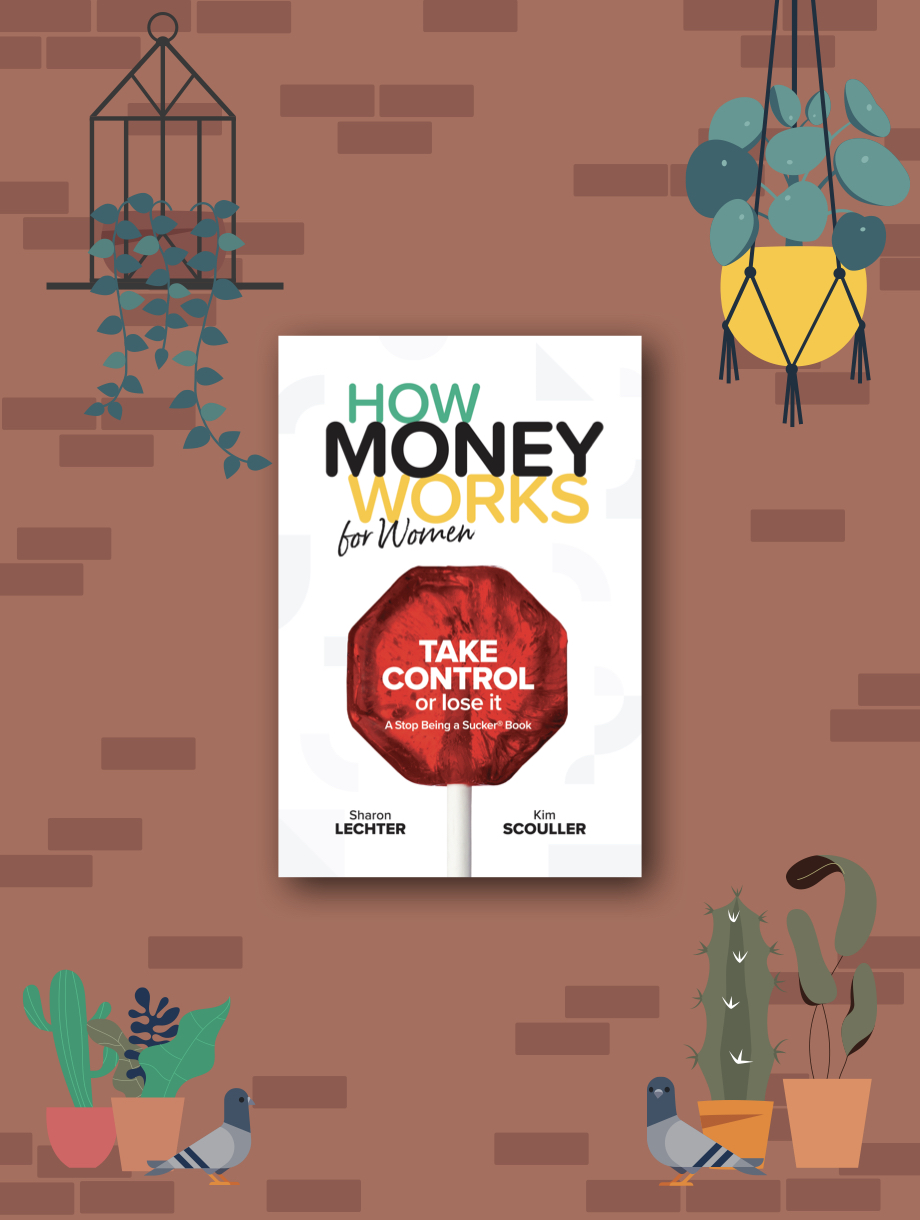
A Journey Beyond Wealth
In our world today which is constantly changing and evolving, the concept of wealth for women is undergoing a considerable transformation. Wealth is no longer solely focused on just financial security, but extends to include a broader spectrum of financial knowledge as well as emphasizes the importance of empowerment and holistic success.
As women leaders, our journey towards financial freedom is paved by more than just how much we earn. It is paved by overcoming obstacles, making well-informed decisions along the way, and gaining wisdom from some good-old-fashioned experience. Embracing this multidimensional journey to wealth allows us to cultivate a legacy of lasting significance while inspiring others to reach their full potential as well.
The Power of Financial Literacy
Possibly the most crucial aspect of empowering women financially is getting a financial education. Learning how to manage money is definitely important, but truly understanding core financial concepts in order to be better decision makers when it comes to money could change the trajectory of our success. Learning these concepts as early as possible in our journey truly enables us to make a difference in our lives and the lives of our family members as well. By equipping ourselves with knowledge, we gain a deeper understanding of key concepts involved in successfully budgeting, investing, saving and retirement planning. Being informed about these main concepts enables us to make smart financial decisions that align with our goals and values. Who wouldn’t want to do that?
Furthermore, financial education serves as a foundation which can be built on as we develop the skills needed to navigate the ever-changing economic landscape and adapt to new opportunities. Everyone can be susceptible to financial exploitation or manipulation, but the statistics are even higher for this happening to women in our ever-changing world. A financial education equips women to stay away from threats like this and be confident while taking control of their finances. By investing in financial education, we invest in the empowerment and independence of women, creating a ripple effect that benefits individuals, families, and communities as a whole.
Breaking Through Barriers
Despite significant progress being made in recent years, there are still pervasive barriers that hinder women from attaining the financial success they work hard for. One of the most prominent and persistent challenges is the gender pay gap, a phenomenon where women continue to earn less than their male counterparts for performing the same job roles. This unjust disparity not only affects women's current earnings but also has long-term implications on their retirement savings and social security benefits, perpetuating a cycle of financial disadvantage. It is crucial that we continue to address and dismantle these barriers, working towards a more equitable and inclusive society for all.
Another barrier is the lack of access to financial resources and support systems, especially for marginalized communities and developing countries. This can be addressed through initiatives that provide financial education, and entrepreneurship opportunities for women in need.
Paying It Forward
Challenges will always exist on our journey towards financial independence and equality, and along our way there will be women who lend us a hand, give us guidance and provide us with support in the way in which we need at the time. It is crucial for us to pay it forward by extending our support to other women who may be facing their own challenges along the way. One of the most impactful ways we can do this is through mentorship programs, where we can share our knowledge and experiences to uplift and empower women who may not have the same opportunities as we do.
Although it may sound simple, another impactful thing we can do is set a positive example and share our success stories. When we do this, we inspire other women to believe in themselves and their own capabilities. Together, we can create a ripple effect of change that will benefit not just ourselves but also future generations of women.
How can you help? Engaging in volunteer work and philanthropic initiatives allows us to create a positive ripple effect in the lives of women, helping them overcome barriers and providing them with the resources they need to thrive. A perk of living in the information era: a Google search will provide you some with organizations that have opportunities where you can help. Together, let's create a community that embraces and supports one another, fostering a better future for ALL women.
Redefining Wealth: Knowledge & Empowerment
The contemporary woman leader, in her pursuit of wealth, recognizes that it extends far beyond monetary measures alone. She perceives wealth as a harmonious blend of knowledge, empowerment, and financial independence. This comprehensive perspective on wealth is absolutely crucial in today's world, where women are shattering glass ceilings and reshaping societal roles across all domains.
The path to wealth, therefore, unfolds along two interconnected avenues: 1) acquiring financial literacy and 2) working with a financial professional to make well-informed decisions with an unwavering confidence. By proactively going down these two avenues, we are poised to unlock a world of possibilities and create a lasting impact.
The Must-Reads for Aspiring Women Leaders
To aid in this transformative journey, books can offer profound insights and invaluable guidance. Books can often help us navigate life's financial challenges with wisdom, cultivate personal growth, and unlock all women’s full potential when it comes to acquiring wealth. Here are five must-read (or must-listen-to) books that will ignite your imagination, challenge your perspective, and inspire you to embrace your own journey of self-discovery and empowerment:
- Think and Grow Rich for Women by Sharon Lechter: This book is not just about growing rich in the financial sense but also rich in experience, knowledge, and wisdom. Sharon reinterprets Napoleon Hill's famous work through the lens of the female leader, providing a roadmap that is both inspiring and practical.
- How Money Works for Women by Sharon Lechter & Kim Scouller: Sharon and Kim present a guide specifically tailored for women, addressing unique challenges and opportunities. It's a book that demystifies financial concepts, making them accessible and understandable.
- Build an Empire by Elena Cardone: This book takes the concept of wealth beyond the individual. Elena inspires women to think big - not just for themselves but for their families, communities, and beyond. It’s about building something lasting and impactful.
- Smart Women Finish Rich by David Bach: David provides a pragmatic approach to achieving financial independence. This book is a comprehensive guide that covers everything from investing to saving and spending wisely.
- Women With Money by Jean Chatzky: Jean offers a fresh perspective on how women can approach money with confidence and clarity. It's about understanding one’s worth and making money choices that resonate with personal values and goals.
"You are where you are today because of choices you've made before today. If you want something different, simply make different choices."
Sharon Lechter
The Path to Empowerment
These books provide incredibly valuable insights and strategies to navigate the complexities of the business world, as well as create your own path to success. They empower you with the knowledge and mindset to thrive in the male-dominated financial industry, challenging societal norms and paving the way for future generations of women leaders.
For the aspiring woman leader, these books are not just a source of financial education but a powerful catalyst for personal growth. They inspire you to think differently about wealth, recognizing it as more than just a number, but as a tool for achieving your dreams and aspirations.
So, I encourage you dive into these empowering books and unlock YOUR full potential. Let them be your personal guiding light as you embark on an incredible journey of both personal and financial growth. On this path, wealth is not solely measured by material possessions, but by the person you become through the transformative process of knowledge and self-discovery. Embrace the company of these literary treasures and let them guide you towards a future filled with endless possibilities and fulfillment.
- Lauren Mathews Fairey
American Savings Trends in 2023
.png)
Cultivating the habit of saving money is a cornerstone of sound financial health,
serving as a vital strategy for achieving significant fiscal objectives while avoiding the pitfalls of debt accumulation. This practice gained significant momentum during the initial phase of the pandemic, as reflected in the notable increase in average savings account balances. However, the current financial landscape presents a more complex scenario.
Despite a substantial rise in interest rates over the past few years, personal savings rates have not mirrored this trend proportionally. This discrepancy highlights a broader issue: numerous factors influence an individual's capacity to save. These factors can range from fluctuating income levels, increased living costs, and unexpected expenses, to more systemic issues like economic instability and wage stagnation.
There are various reasons why people save. Short-term goals include saving money for holidays, purchases, or renovating a house. In the long term, the most crucial reasons for putting money aside in the United States are related to the costs of the education of one's children or ensuring financial stability in retirement. However, the high inflation rates in the United States since 2021 have made it more difficult to save money.
Moreover, there is a growing body of evidence indicating a strong desire among individuals to enhance their savings beyond current levels. This aspiration, however, often clashes with the practical realities of their financial situations. To address this, it's essential to acknowledge the diverse challenges people face in their savings journey and to explore a variety of strategies that can help bridge the gap between their savings goals and their actual savings behavior.
Effective money-saving techniques are not one-size-fits-all; they require a personalized approach that takes into account individual circumstances and financial goals. By understanding and adapting to these varied factors, individuals can develop more realistic and achievable savings plans, positioning themselves for greater financial stability and success in the long term.
Total U.S. personal savings amounted to $802.1 billion as of November, 2023. The personal savings rate (personal savings as a percentage of disposable personal income) was 3.4%.
- From 1971 to 2023, interest rates averaged 5.42%. Interest rates reached an all-time high of 20% in March 1980 and a record low of 0.25% in December 2008.
- Data from the Federal Reserve shows the average American family has $62,410 in transaction accounts.
- Factors like age or education level may impact the amount the typical American actually has saved.
- The average American savings balance may also depend on household size and homeownership status.
A Forbes Advisor survey of savings habits conducted in March 2023 found that two-thirds (66%) of Americans said they were able to save money in the past year. Increased interest rates (50%) and pay increases (35%) were the most common factors helping respondents save.
The uncertain state of the economy motivates many to save, but this is only one way people are attempting to protect themselves. A 2023 report from Northwestern Mutual found that Americans are taking three major steps to address economic uncertainty: Nearly 64% of respondents are cutting costs, 50% are building savings and 41% are delaying large expenses. Each household often utilizes multiple strategies at a time.
Still, Americans face many barriers to saving and are putting away less of their income overall. According to data from the St. Louis Federal Reserve, personal savings only accounts for 4.1% of disposable personal income as of April 2023. That’s well below pandemic highs of 33.8% in April 2020 and 26.3% in March 2021 and lower than the savings rate a decade prior, 6.2% in April 2013.
And while savings interest rates are at a 15-year high, many Americans may find it difficult to take advantage of these competitive rates in the current economic environment.
Transaction account estimates can shed light on the overall banking balances of Americans. In 2022, the national per capita disposable personal income was $55,832 and the personal savings rate was 3.6%. Based on this data, Americans were able to save roughly $2,010 per person last year.
According to data from the Federal Reserve's 2022 Survey of Consumer Finances, the average American family has $62,410 in savings, across savings accounts, checking accounts, money market accounts, call deposit accounts, and prepaid cards.
Note that this number is an average, not a median, which means it can be skewed by households with especially high or low balances. This number does not include investment balances, like money held in a retirement account or other brokerage account, or any equity held in real property, like a house.
When you look a little closer at the data, there are several factors that influence how much an American household actually has saved.
Average Savings Balance by Age
Older Americans tend to have more cash in the bank than younger Americans. The average person between the ages of 45 to 54 has $50,590 more than the average person under age 35. However, average savings account balances start to decline after age 70.
Here's how the average savings balances break down by age group, according to Federal Reserve data:
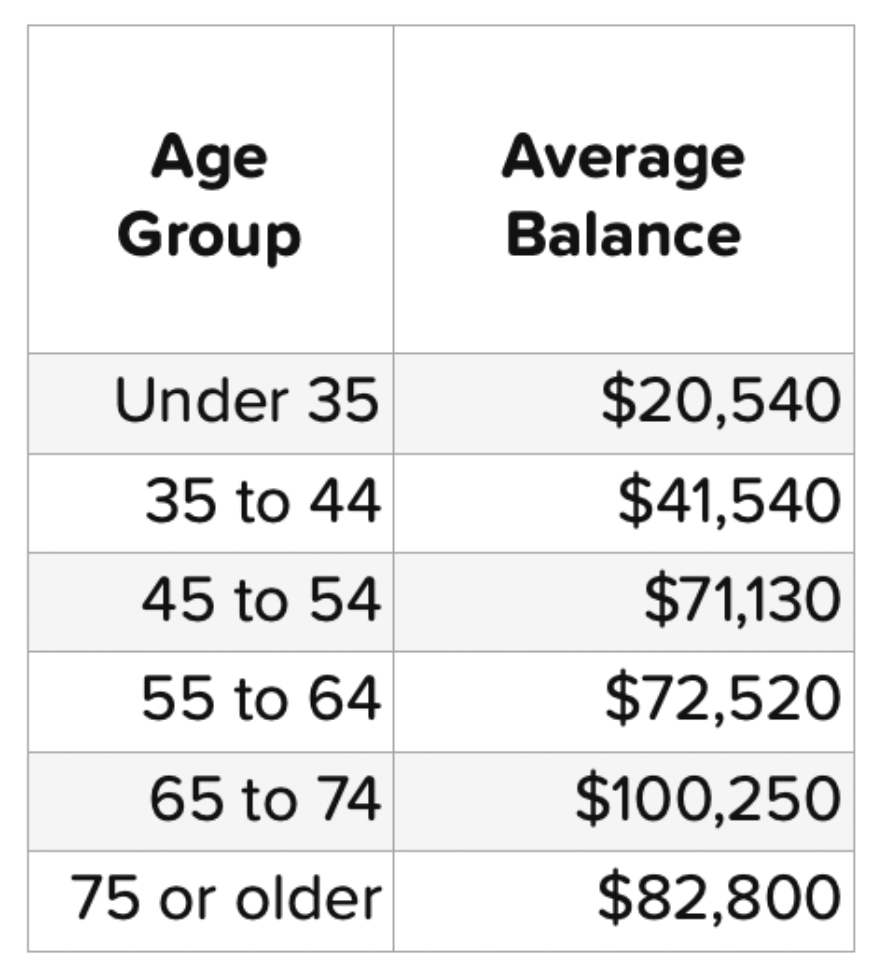
Average savings balance by household size
Kids and marriages tend to dramatically change a family's household savings balance.
On average, single-parent households under the age of 55 tend to have the lowest average savings balances, while couples without children tend to have the highest average savings balances.
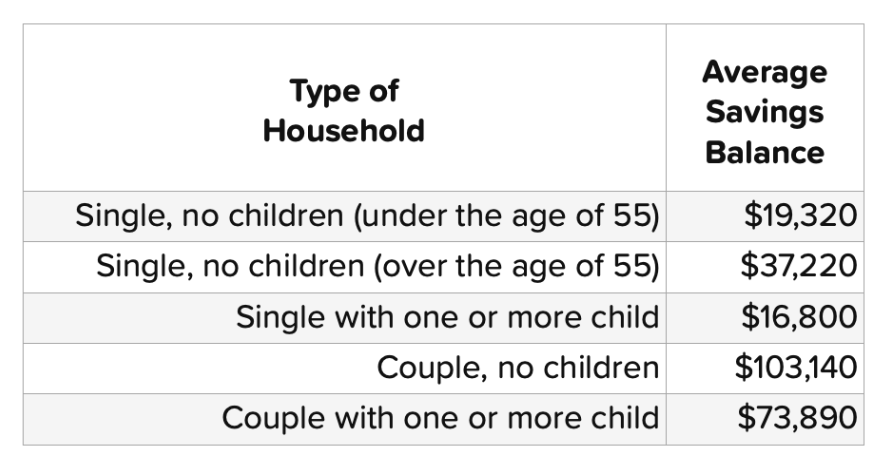
Average Savings Balance by Race
A large racial wealth gap still exists in America, from income to household wealth. According to data from the Federal Reserve, that gap flows into savings balances as well.
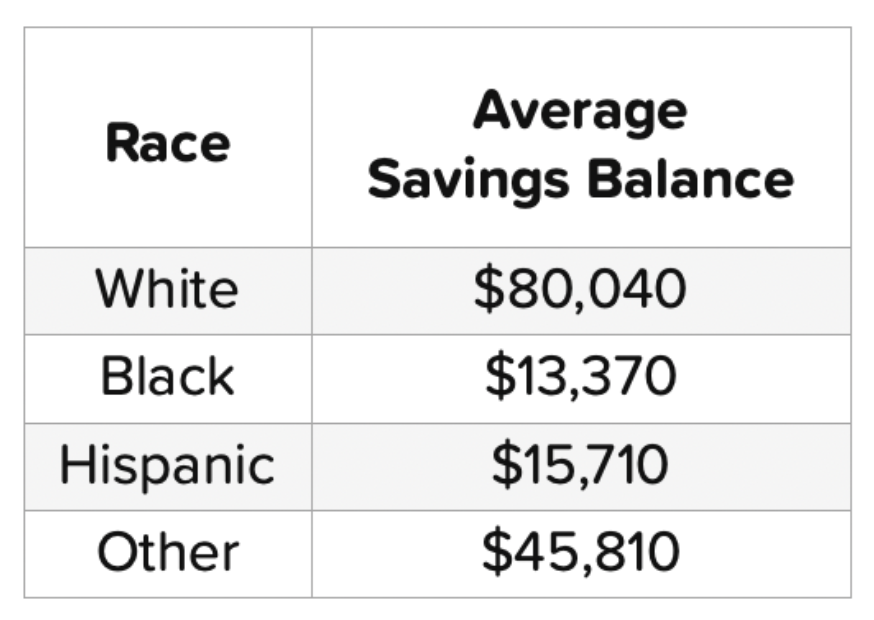
Average Savings Balance by Education Level
As a family's education level increases, so does the average savings balance. People who earned a high school diploma have an average savings balance double that of those who haven't. Similarly, people with a college degree have an average savings balance about five times greater than that of someone who only completed high school.
Here's how education affects savings balance, according to the 2022 Survey of Consumer Finances:
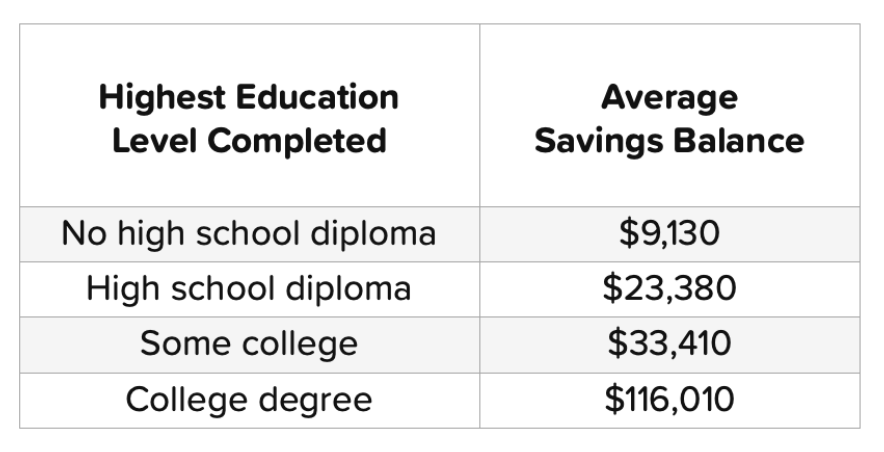
Average Savings Balance by Homeownership
People who own homes tend to save more, on average, than people who own homes have more cash in the bank than those who rent, according to Federal Reserve data.
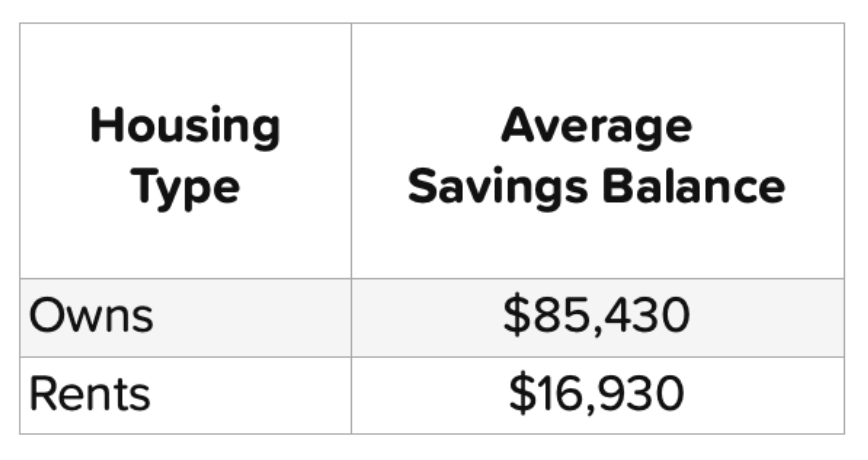
Average American Savings Balances
The average American savings balance can vary greatly depending on your circumstances. Numerous factors, such as age, household size, race, education level, and homeownership status can impact how much you've saved.
Also, keep in mind that the data we've included from the Federal Reserve's 2022 Survey of Consumer Finances doesn't not factor in retirement accounts, and represents an average savings balance of high-income and low-income American families.
While saving for retirement and other goals is important, so is saving for potential emergencies. Emergency savings prevent you from having to take out a loan or use a credit card to cover unexpected expenses.
Unfortunately, not all Americans are financially prepared for an emergency.
According to the Making Ends Meet Survey and Consumer Credit Panel from the Consumer Financial Protection Bureau (CFPB) conducted in 2022, 24% of Americans don’t have any money saved for emergencies. And while 37% reported having at least a month’s worth of income in emergency savings, 39% reported having less than this.
Setting money aside for emergencies can have a significant impact on overall financial well-being, and data suggests an upward trend in emergency preparedness in the U.S. A 2021 report by the Federal Reserve on the economic well-being of U.S. households found that adults who said they could cover a small emergency expense using cash increased to 68% in 2021, up from 50% in 2013.
Average Emergency Savings
How much you should save for emergencies depends on a number of factors, but many Americans are saving $5,000 or less. The Transamerica Institute found the median emergency savings to be $5,000 as of late 2021, with over a third (34%) of Americans reporting saving less.
A few thousand dollars could help in many situations, but it may not be enough if you’re faced with back-to-back emergencies—or one very costly one.
How Much Emergency Savings Should I Have?
As a general rule, experts suggest keeping at least three to six months’ worth of living expenses in an emergency fund. But the ideal amount of emergency savings for you depends on your expenses and financial situation, and certain risk factors may require you to save more. For example, if you have dependents, low job security or a fluctuating income, a larger emergency fund could be helpful.
If you can’t save three to six months’ worth of expenses right away, save what you can now and contribute more when you can afford to. Starting somewhere is better than not starting at all.
Retirement Savings Statistics
As of September 2022, the Investment Company Institute found that 401(k) plans hold a combined $6.3 trillion in assets in across 625,000 plans. This encompasses millions of participants and retirees.
According to further data, while around three-fourths of non-retired adults were found to have some retirement savings, 28% had none. Unfortunately, this percentage was up from 25% in 2021.
401(k) plans aren’t the only place Americans are stashing retirement savings. While 54% of non-retired adults have their retirement savings in defined contribution plans like 401(k) or 403(b) plans, 47% have retirement savings outside of formal retirement accounts.
And just because money is earmarked for retirement doesn’t mean it never gets spent on other things. An economic well-being survey of U.S. households conducted by the Federal Reserve in 2023 found that 8% of non-retired adults tapped their retirement savings to cover an emergency in 2022.
What Is the Average Retirement Savings?
Average savings vary by age. This makes sense not only because savings ideally grow over time rather than shrink, but also because people usually earn less early in their careers than they will later on.
According to data from Empower (formerly the Empower Institute) in 2022, the average 401(k) account balance is $118,781 across all ages. However, the median account balance is much lower—only $32,689 across all ages. The average balance increases with each subsequent age group until the 60 to 65 age group, when many workers retire and begin to make withdrawals from their 401(k)s.
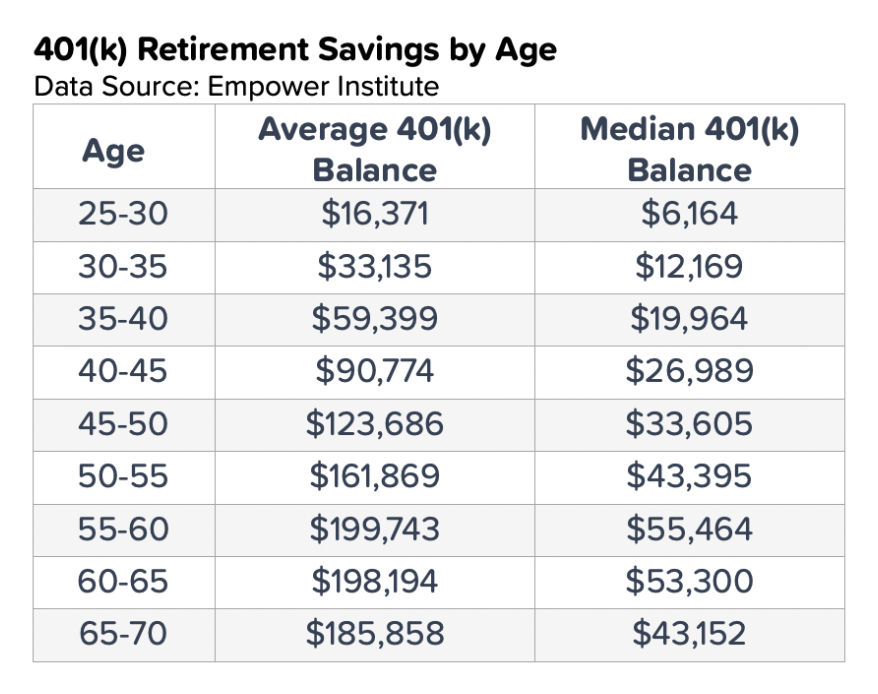
How Much Retirement Savings Should I Have?
The amount of money you need to save for retirement depends primarily on your life expectancy, the age at which you’ll retire and your spending habits.
An analysis by Fidelity Investments provides some general guidelines for defining this. These guidelines suggest you should have one times the amount of your salary saved by age 30, three times by age 40, six times by age 50, eight times by age 60 and 10 times your salary by age 67.
According to Fidelity, these figures assume you save at least 15% of your income annually starting at age 25, invest an average of 50% of your savings in stocks over your life and plan to retire at age 67 without inflating your lifestyle in retirement.
How To Maximize Retirement Savings
The average U.S. retirement savings balance in a 401(k) plan is $118,701, but the median is only $32,689. This means many individuals likely fall short of the targets laid out above. Especially for those not saving enough, it’s important to understand how to maximize retirement savings.
The sooner you start saving for retirement, the more likely you are to retire with enough—or more than enough—cash to cover your expenses. If you’re one of the 28% of non-retired Americans with no retirement savings, start saving today.
Aside from starting as early as you can, here are a few tips for maximizing your retirement savings:
- Contribute enough to your workplace retirement plan for employer matching. If your employer offers a match on retirement contributions, don’t let that free money slip away. Contribute at least as much as you need to receive the full match. For example, if your employer matches up to 5% of your salary, contribute at least 5%.
- Contribute to other tax-deferred accounts. In addition to using your workplace retirement plan, there are other accounts you can open to build retirement savings. Consider a traditional IRA, Roth IRA or health savings account (HSA) for tax-advantaged savings. If you’re maxed out on these accounts, you can always funnel extra savings into a taxable brokerage account.
- Make catch-up contributions if you’re over age 50. When you reach age 50, the IRS allows you to make extra contributions to your retirement accounts, including both 401(k) plans and IRAs, to help bolster your savings. If you started late or fell behind with your retirement savings, you can get back on track by making catch-up contributions up to the annual limits.
A January 2023 survey by Forbes Advisor on financial regrets and successes uncovered interesting data about U.S. consumer savings trends. It found that the most common financial habit Americans planned to adjust in 2023 was tracking spending/creating a budget (43%). Americans also indicated wanting to save more and spend less. The next three most popular responses participants gave were spending below their means (40%), paying down debt (37%) and adding to emergency funds (25%).
This survey also found that 56% of Americans who experienced financial regret in 2022 cited not saving more money as one of their top three misgivings. Meanwhile, 57% of Americans who experienced financial success named increasing their savings as one of their top three triumphs.
Forbes Advisor also conducted a survey in March 2023 to analyze how often Americans save and what methods they use. When it comes to putting the habit of saving into practice, 44% of Americans use recurring transfers to save automatically, 38% allocate a portion of their pay directly into a savings account and 35% manually transfer their funds. Some use a combination of methods to save.
Current Savings Account Rates
Research suggests that interest rate hikes encourage Americans to save. But even though savings account interest rates have been on the rise, they still vary widely from bank to bank. Below is a look at national interest rates as of November, 2023.
The average savings account rate is a benchmark for the overall interest-rate environment, but it’s not a rate you should settle for.
Rather, aim for an annual percentage yield (APY) many times the national average, such as those offered by high-yield savings accounts. It’s easy to find a high-yield savings account that offers a competitive return with a no or low minimum balance requirement.
National Interest Rates
Data Source: The Federal Deposit Insurance Corporation (FDIC)
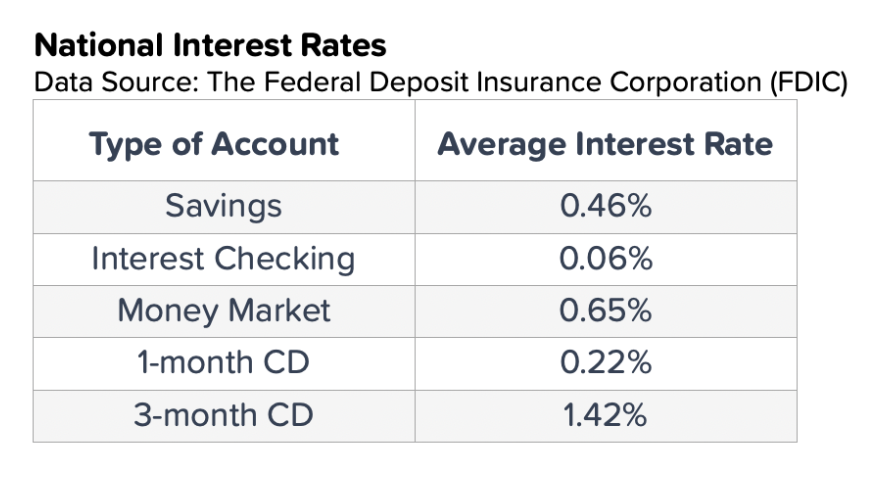
Start Saving Money
With a dramatic drop in Americans’ personal savings rates over the past couple of years as well as clear indications that many want to save more, there’s no doubt that saving is easier said than done.
Saving is important for achieving financial freedom and confidence. This requires little convincing, but it can be difficult to know where to start. Use these tips to cut down costs and boost your savings:
- Pay off high-interest debt first. The less money you need to throw at your debt, the more you can funnel toward your savings goals. Start by paying off your high-interest debt first, including credit card debt and loans, because it is often the costliest. Try to make more than the minimum payments and focus on the debt that costs you the most first.
- Track your spending and create a budget. If you’re not already using a budget, try it now. Start by tracking your spending to see where your money goes each month. Based on this information and your savings goals, create a budget that includes all of your income and expenses. Look for areas where you can redirect spending toward savings and debt payoff.
- Automate savings wherever possible. If you want to save without needing to think about it, automation is key. Automate monthly or weekly transfers from checking to savings and set up automatic contributions into your workplace retirement account. Start with however much you can afford, even if it’s not a lot. Increase contributions as your paycheck and budget allow.
- Plan for large expenses. When you allow large expenses to sneak up on you, they can derail your budget, empty your savings or force you to take on high-interest debt. Instead, do a little planning for significant spending. List large and irregular expenses like car registration costs and vacations and break them down into monthly savings goals. Include these in your budget.
- Take advantage of high-yield savings accounts. When you’re working hard to save money, a competitive interest rate can accelerate the process. To get the most from your savings, put your cash in a high-yield savings account instead of a traditional savings account. High-yield savings account rates beat national averages and tend to offer more flexibility and tools.
Bottom Line
In recent years, particularly throughout 2021 and 2022, there has been a noticeable uptick in the average balances of American savings accounts, a trend that seemed to signal a positive shift in savings behavior. However, this increase in savings account balances doesn't fully capture the broader picture of American financial habits. Despite these initial gains, the overall proportion of income that Americans are saving has diminished, with many individuals finding themselves underprepared for emergency situations.
At the same time, the financial landscape is evolving. Interest rates have climbed to their highest levels in 15 years, offering consumers a more favorable environment for saving money efficiently. This shift presents a valuable opportunity for those aiming to bolster their savings and emergency funds, aligning with the aspirations of many to improve their financial resilience.
However, the journey to effective saving is fraught with challenges and can be influenced by many factors. Key among these are age, geographic location, income levels, and spending habits, all of which play a crucial role in determining your ability to set aside funds for unforeseen expenses, retirement, and other financial objectives.
Despite these challenges, there are strategies and tools available that can greatly assist in the pursuit of financial security. Leveraging tax-advantaged accounts, investing in high-yield savings options, and implementing automatic transfers are just a few of the methods that can facilitate more effective saving. When these tools are utilized, especially from an early age, they can significantly enhance one's ability to meet both short-term needs and long-term financial aspirations.
While the path to saving is complex and varied, understanding the current economic context, recognizing the individual factors that impact saving capabilities, and employing strategic financial tools can collectively empower individuals to make substantial strides towards achieving their financial goals.
The Knowledge Gap

Knowledge separates those who take advantage from those who are taken advantage of.
Why? Because knowledge translates to action.
This is especially true when it comes to money.
Think about it. The Sucker “knows” just a few things about money…
“I need money to buy things.”
“I work to earn money.”
“I will never earn much money.”
Now, consider what the Wealthy know about money…
“I can use money to start a business.”
“I can use money to earn compound interest.”
“I can use money to make my family’s life easier.”
“I can use money to leave my loved ones a legacy.”
The difference is simple.
Because the Sucker knows little about money, they see it only as a necessary evil.
But the Wealthy know money creates opportunity.
It all starts with knowledge. If the Sucker knew how money actually works, they would see it—and manage it—differently.
What do you think you know about money? If you’re not sure, scroll up to the top of my site and head over to the Learn section. There, you’ll find the Change Your Literacy Change Your Life Challenge, a quick quiz that will reveal how much you actually know about money.
When you’ve completed the quiz, let me know how you did. Better yet, what answers surprised you? It may be that you’ve never been taught things like the Power of Compound Interest or Risk Diversification. And that can warp your ability to see money as an opportunity instead of a limitation.
It all starts with your thinking. It all starts with learning how money works.
Exposing the Roots of Your Financial Insecurity

If you feel like your finances are teetering on the edge of disaster, there’s a likely culprit—financial illiteracy.
Do you agree or disagree with these statements?
The statements are adapted from research designed to test relationship security. They aren’t dependent on your income or savings level. Instead, they measure something far more relevant—how you feel about your finances.
And if you’re like many, you agree with most, if not all of those statements. It’s an indication that you feel financially insecure. And there’s a reason for that…
It’s because your finances are in grave danger.
It’s not your fault—nobody taught you how to create financial security. In fact, you may not have learned the basic building blocks of growing wealth, much less how to protect against losses, inflation, or tragedy.
So is it any surprise that your finances feel like a house of cards? And since you’re an intelligent, normal human, you can feel the looming threat of collapse. It weighs on you, makes you anxious.
And it should—your feelings are a blaring alarm announcing that your situation is precarious, and you need to act.
But you can’t respond to danger until you identify what’s wrong. And the greatest enemy of your financial security? Financial illiteracy.
Think about it—would your finances have reached this point if you knew how money worked? Of course not!
If you knew how to actually build wealth and avoid financial blunders, you likely would have chosen a completely different path.
So the antidote to your feelings of financial insecurity is simple—learn how money works. Then, apply your knowledge. You may be surprised by the new sense of security that appears in your life.
Knowledge is Not Power

Your financial education must include both knowledge AND what steps to take. It must teach you wealth building concepts AND wealth building strategies.
If you’re lacking knowledge, it’s impossible to start your journey to financial independence because the money decisions you make without it are likely to do more harm than good.
But knowledge alone is not enough. Knowledge without guidance leads to information overload and analysis paralysis.
It’s what all financial professionals hear: ”You’ve taught me about the Power of Compound Interest. Great! And now I know about the Time Value of Money. Wonderful! But where the heck do I find an account with the interest rate I need to reach my financial goals?”
Tony Robbins said it best. “Knowledge is NOT power. Knowledge is only POTENTIAL power. Action is power.”
So before you create a strategy to start building wealth, learn how money works. Discover the financial illiteracy crisis and its impact on your peace of mind. Learn about the Power of Compound Interest and the Time Value of Money and how those concepts can make your money earn more money. Realize the wealth building potential of starting a business.
Then, get with a licensed and qualified financial professional. Start working through The 7 Money Milestones. They’re time-proven steps that can move you from financial hardship to financial independence. The Milestones are…
• Financial Education
• Proper Protection
• Emergency Fund
• Debt Management
• Cash Flow
• Build Wealth
• Protect Wealth
Why these steps? Because they apply what you’ve learned to simple strategies, like…
• Securing proper financial protection for your family
• Leveraging a side hustle to boost cash flow
• Protecting your wealth with an estate plan
The Milestones take your newfound knowledge and transform it into action. They move you from having the potential to be wealthy to walking the path towards securing your future.
In short, they help unlock your power to create the future you want.
Learn how money works. Follow the Milestones. Take control of your financial future. With this education, you can be on the road to wealth in no time flat.
Is Your Cash Flowing?

How much cash do you have left at the end of the month after you’ve covered the essentials AND treated yourself? (I’m guessing not much.)
Wish your paycheck went a little further? You’re not alone—not by a long shot. Most Americans are living paycheck-to-paycheck and saving little to nothing. So how do you increase your cash flow so you can stop living in the Sucker Cycle and start saving and investing more?
In the book, HowMoneyWorks: Stop Being a Sucker, we attack this challenge head on in Milestone 5 of the 7 Money Milestones.
Here are a few tips to get your cash flowing towards your future…
Redirect your cash flow
There are a million little things that siphon away your paycheck. Credit card debt, monthly subscriptions, and your fast food habit all chip away at your income. This “death by a thousand cuts” is a foolish spending cycle that prevents you—and countless other suckers—from creating an emergency fund, protecting your income, and building wealth for the future.
That’s why it’s so important to make and maintain a budget. It’s like a map of where your cash is going. Once you have that knowledge, you can figure out where you need to dial down your spending and start redirecting your cash. Don’t get too detailed. You don’t need to get overwhelmed by spreadsheets. Try creating a one-page list of expenses, freeing up as much cash as possible. Take your budget to your financial professional and discuss how best to use this available cash.
Open up new income streams
Budgeting and cutting back on spending might not be enough. Life throws plenty of unexpected (and expensive) problems at us that might not have a budgeting solution. You may need to look for new income streams to maintain the lifestyle you want while also saving for the future.
You’d be surprised by how many possibilities there are to create additional income streams—many of which offer the chance to make money from home. Maybe now is the time to discover that your favorite hobby or area of interest is actually a way to earn some cash. That could look like a side hustle or weekend gig, but you might find that your skills and ideas are full-time business opportunities just waiting to happen! Research which of your ideas and skills are in demand, figure out how much time and effort it will take to get started, and decide how much time you’re willing to commit. (It could be easier than you think!)
Increasing your cash flow can open up a whole new world of opportunities. That extra money you have from cutting back on takeout and streaming services could be how you fuel the power of compound interest and finally start saving for retirement. That several hundred dollars you bring in from teaching guitar lessons each month could be how you pay off your credit cards and free up even more cash. There’s no doubt your options can really open up once your cash starts flowing!
Lessons from Las Vegas

Why are so many people so bad with money, even though they know it’s important?
There’s an article from Psychology Today titled “The Psychology of Money.” It was published in 1995, but the central question still rings true—why do people sacrifice so much for money, only to blow it all?
Michael Ventura, the author, asks the question in the context of Las Vegas, where hard earned money goes to die. He paints a vivid picture of brightly lit casinos packed with overweight middle-aged men in casual clothes hunched over blackjack tables and slot machines.
Not one of them looks happy.
They likely don’t talk much with their spouses.
They spend a few minutes each week in conversation with their kids.
All they do is work. Their income and financial resources define their social status.
And yet here they are, gambling it all away and hating every second of it.
And again, it begs the question of WHY? Why the insane urge to unravel everything they’ve worked so hard to create?
Here’s a thought—what they’re doing at the casino isn’t too far off from what the sucker does every day. They throw away money in hopes of a rush, and wait to see how the cards fall.
Think about it—they work and work and work for money, but for what? So they can buy a house, a car, and maybe take a nice vacation. Maybe they think it will make them happy. But what does that really get them? A bigger mortgage, higher monthly payments, and the constant worry about losing their job and being unable to make ends meet. They don’t know how to use their money to build wealth or a stable, happier life. How could they?
They’ve never been taught.
The casinos of Vegas call their patrons suckers. Banks give you a sucker on the way out the door. They both leverage the same Sucker Cycle, the same psychology.
So what’s the lesson from Las Vegas? That everyone’s a sucker? That you’ll never be good with money?
No.
The lesson is that you must learn how money works. You must realize that something better is possible with your money. With your life. That you actually have what it takes to make decisions. To write a story with a better ending than hunching over a slot machine with a blank expression on your face.
Home Price vs. Interest Rate: Which Is More Important?

Millennials, this one’s for you—a low interest rate DOES NOT balance out a high home price.
Millennials face a dilemma—pay greater home prices now but at lower interest, or hope that interest rates increase in the future which historically has lowered home prices.
Some Millennials are choosing to face the housing market head on, while others are waiting things out.
So which camp is “right”? And, if you’re a Millennial, which camp should you join?
The answer: None of the above. The real question is—and has always been—can you actually afford to own a home?
Let’s do the math…
Suppose you live in a fantasy where the housing market is semi-normal somewhere in the world. You have two potential homes in the running—one in the suburbs, the other in the city.
The suburban home costs $300,000 with a 30-year mortgage at a rate of 6%.
The city home costs $500,000 with a 30-year mortgage at a rate of 2%.
One Sucker sees a lower interest rate and ignores the price tag, while another Sucker sees the lower price tag and ignores the higher interest rate. Both think they’re getting an historic deal.
But get this—the monthly payment will be almost identical for either house.
The wealthy realize that high prices and high interest rates have the same result—you pay more for your home, and the bank profits.
Instead, the wealthy ask themselves questions like…
Can I afford my monthly payment?
Have I saved enough for an adequate down payment?
Will I have enough left for furniture and repairs?
Have I factored in the cost of property taxes and HOA fees?
The takeaway? The wealthy don’t lose sight of what matters most—their cash flow. Just because interest rates are lower doesn’t mean you’ll be able to make the monthly payments.
Do your homework.
Use a mortgage calculator.
Research your potential new neighborhood for any HOA fees or other costs you might incur.
Figure out how much you can afford to spend on monthly payments as a part of your overall budget.
Meet with your licensed and qualified financial professional to talk about your overall financial picture and how your new home will fit in with your current situation and your retirement strategy.
It’ll save you heartache—and maybe some money—in the long run.
How Consumers Prefer to Cover Long-Term Care Costs

It’s a fact – consumers prefer long-term care riders to stand-alone long-term care (LTC) insurance.
In 2018, 350,000 Americans bought long-term care insurance.¹
84% chose linked-benefit coverage.
In other words, their LTC insurance was a rider on a life insurance policy or another financial vehicle.
Only 16% chose stand-alone LTC insurance.
If you had to guess why riders won out, what would you say?
- Because LTC riders are often far more affordable than stand-alone insurance?²
- Because LTC riders aren’t subject to steadily increasing premiums?³
- Because stand-alone LTC insurance is growing harder and harder to qualify for?⁴
If you guessed any of the above, you’d be right! They’ve all contributed to the rising popularity of LTC riders.
For many, LTC riders are a no-brainer. If something’s more affordable, easier to qualify for, and less subject to change, wouldn’t you prefer it, too? And considering that 70% of people age 65 and older will need LTC, it’s a form of financial protection everyone should explore.⁵
That’s not to say an LTC rider is the perfect solution for your situation. If you don’t need permanent life insurance, then a stand-alone policy may be the way to go.
That’s why it’s critical to meet with a licensed and qualified financial professional—they can evaluate your situation and what tools and strategies best meet your needs.
Start Building Wealth in a Minute or Less

Automation is the simplest—and perhaps the most powerful—move you can make towards retiring wealthy.
Imagine if you could automate going to the gym. You download an app, tap a few buttons, and then… do nothing. Over the next few weeks, you notice changes. Your legs get firmer. Your biceps bulk up. You walk past mirrors and think “darn, I look GOOD!” Friends ask if you’ve been going to the gym. You smile, because you know the truth—you haven’t been once.
It sounds too good to be true. But when it comes to building wealth, “bulking up” can become a reality.
That’s right—you can automate building wealth. And it only takes a few moments.
Simply Google search how to automate deposits in your wealth building accounts, and follow the steps. It should take you less than a minute once you know how it’s done.
And just like that, you’ve started building wealth. Your money will effortlessly flow from your bank account into your wealth building accounts. It’s that easy.
Here are a few prerequisites before you start automating…
Decide which accounts are best for your situation
This isn’t something to do alone. Meet with your licensed and qualified financial professional, and review your situation and your goals. They’ll be able to recommend accounts and wealth-building vehicles.
Review your budget
What’s the most you can automate towards building wealth without derailing your lifestyle? See how much money you have leftover each month. If the answer is zero, slash your spending and automate whatever you free up.
Know when you get paid
The best time to transfer money from your bank to wealth building is right after payday. Review your pay schedule, then automate transfers to go through a day or two after.
Wealth doesn’t appear overnight. It can take years. But there are simple steps you can start this afternoon to make the process that much easier. It just takes a little knowledge and a few seconds. So get started today!
What Millennials Need to Retire Wealthy

It’s official—Millennials are serious about building wealth.
According to a recent study, Millennials (ages 25 to 40) have an average of $51,300 in personal savings, while their retirement accounts have an average balance of $63,300.¹
That’s far higher than it was just a few years ago. In 2019, they had saved just $23,000 for retirement.² They’ve nearly tripled their wealth in less than 3 years!
It’s no surprise. Few generations have gotten kicked in the pants quite like Millennials. Between recessions, pandemics, frenzied housing markets, and international instability, they’ve learned that wealth isn’t a luxury—it’s an absolute necessity.
But Millennials still have a long way to go before they retire wealthy. Here’s what they need if they’re going to arrive at their long-awaited destination…
Millennials must know—and use—the Rule of 72.
The Rule of 72 is a simple mental math shortcut that estimates when your money will double, given a fixed compounding interest rate. Here’s what it looks like…
72 ÷ interest rate = years to double
It’s simple, it’s powerful, and it might change the course of your financial future.
Let’s say you’re 35 years old with $60,000. That’s a solid start. But how can you turn $60,000 into $1 million by age 67?
Think of it like this—you need to double your money just over 4 times to reach $1 million.
Now, subtract your current age from your retirement age. That’s how long you have left to build wealth.
67 - 35 = 32 years
So you have 32 years to double your money just over 4 times. In other words, your money needs to double every 8 years.
Now it’s time to use the Rule of 72, but with a slight twist—swap the interest rate with the years for each double.
72 ÷ years for each double = interest rate needed
Plug in your numbers, and you get…
72 ÷ 8 years = 9% interest rate
In this scenario, you’d need just over a 9% interest rate to retire as a millionaire.
Armed with that knowledge, you’ll be better able to see through gimmicks like a “high-interest savings account” that offers .06% interest. You’ll also be left with just one question—where can you find an account with 9% interest?
Answer that question with your financial professional, and you’re on the right track for retiring wealthy.
Try the exercise above with your age and personal savings. What was the result? Then, contact a financial educator who can help you fine-tune a strategy to reach your retirement goals.
Can You Budget Your Way to Wealth?

Budgeting is good, budgeting is great. But if you’re building wealth, it will only get you part of the way.
Budgeting is usually the first move for anyone getting their finances in order. It’s basically just tracking your expenses against your income, and then slashing spending.
Consider that 64% of Americans live paycheck-to-paycheck.¹ Low income isn’t to blame—48% of families earning over $100,000 also live paycheck-to-paycheck!² So for many, budgeting is an absolute necessity.
But will budgeting alone put you on the fast-track to wealth? Probably not.
Let’s say you earn $45,000 per year (after taxes), but you spend $45,000 every year. Congratulations! You’re living paycheck-to-paycheck. When you decide to get serious about building wealth, you’ll face a stark reality—you have no money left over to save!
So you start budgeting. You move from your apartment in midtown to a hovel in the suburbs. You stop going out. You cook at home. You walk to work. You swap lightbulbs for candles. You scrap Netflix, Spotify, and cable—and you start whittling random sticks you find in the yard to pass the time.
By the end of the year, you’ve spent only $30,000. Good for you! You have $15,000 to devote towards building wealth.
But what if you’re still short of your savings goals? You’ve cut spending to the core. Unless you’re willing to scavenge for food and live in a tent, cutting your spending further is going to be tough.
You only have one option—boost your income.
What does that look like? It could look like scoring a promotion. Or getting a new job. It could also look like starting a side hustle or becoming a part-time entrepreneur. You actually may be surprised at how many of your talents and hobbies have income-boosting potential!
That’s why for the 7 Money Milestones in the book How Money Works: Stop Being a Sucker, budgeting and boosting income are rolled together into a single Milestone—Milestone 5: Increase Cash Flow. Budgeting will get you started, but to truly supercharge your savings, you’ll need to increase your income stream, or create a multiple income streams.
Think about it like this—Jeff Bezos drove a Honda Accord for decades, but that’s not what made him a billionaire. Rather, he began with frugality and then built an income-generating empire.
So if you’re just beginning to build wealth, start with budgeting. Clean up your spending as much as possible before boosting your paycheck.
If you’re already frugal, good for you! You’ve made a great stride towards building wealth. Now, it’s time to consider boosting your income further.
No One Has Money

No one has money. You may think other people have money, but they don’t.
For each generation, it’s the same.
They don’t get taught how money works from K-12.
High school graduates head off to college. They don’t learn how money works there, either.
College graduates enter the workforce and start earning a paycheck… and spending their paycheck.
Soon, they enter a cycle of foolish spending. Earn a paycheck. Spend a paycheck. Earn a paycheck. Spend a paycheck.
They join the hundreds of millions living paycheck-to-paycheck. Always spending. Barely saving, if at all.
When retirement finally arrives or accidents or illness occur later in life, a terrible realization dawns on them…
They have no money.
According to a recent survey…¹
◼ Gen Z adults have saved an average of $37,000 for retirement
◼ Millennials have saved an average of $63,300 for retirement
◼ Gen-Xers have saved an average of $98,900 for retirement
◼ Baby Boomers have saved an average of $138,900 for retirement
Only Gen Z and Millennials are even close to being on track for retirement. Gen-Xers and Baby Boomers fall short of bare minimum savings by over half.
It’s not for lack of income—many Americans make enough to put their money to work.
Rather, it’s because they lack knowledge. They just don’t understand how money works beyond earning and spending.
The takeaway? If you’re a Gen-Xer or Baby Boomer, the time to start building wealth is now.
But for your income and skills to translate into wealth, you need tools. You need concepts like…
◼ The Power of Compound Interest
◼ The Time Value of Money
◼ Wealth Equivalency
These concepts will help you answer questions like…
◼ What interest rate do I need to close the gap between my savings and my retirement goals?
◼ How much do I need to save each month to retire with $1 million?
◼ Should you save a nest egg or start a business?
If those are answers you need to get, ask me how you can learn. I’d be happy to introduce you to resources that can set you on the right path towards discovering how money works and building wealth.
Protecting Your Emergency Fund From Inflation

Your emergency fund may be rapidly losing value.
Despite your best efforts and planning, you and your family’s first line of financial defense might be eroding day by day. And it’s all because of inflation.
Here’s what’s happening…
Inflation is the steady increase of prices over time. A jug of milk that costs $2.85 one year could cost $3.00 the next. On average, prices have inflated at 3.25% annually since 1914.¹
But in 2021, inflation exploded. The market faced a perfect storm of low interest, pandemic-fueled supply chain problems, and consumers returning to stores. Demand soared while supply shrank.
The result? Consumer prices increased 7% in 2021, the highest rate since 1982.²
That means everything is increasing in price… including the services you need in emergencies.
But here’s the problem—it’s a challenge for your emergency fund to outgrow inflation.
Why? Because above all else, your emergency fund must be both accessible and stable. What good is an emergency fund if you can’t use it in a pinch or if it gets leveled by market fluctuations?
And good luck finding an account that’s accessible, stable, AND pays interest that’s greater than inflation. In today’s climate, it can be difficult to find a “high interest” savings account that pays more than .5%. Read that again. Not 5%. Point 5 percent.
The question then, isn’t if your emergency fund can outgrow inflation. It’s about minimizing the damage.
Here are two ideas that may make the difference between financial success and disaster in the face of emergencies…
Increase your income. It’s simple—the more you earn, the better positioned you are to navigate emergencies. Look for ways to increase your income through side hustles, a new opportunity, or even negotiating higher wages with your current employer.
Just remember—not all sources of income are created equal. The income from your job, for instance, has two critical weaknesses…
- It may dry up if an emergency stops you from working
- Wages haven’t kept pace with inflation for decades
In short, the best sources of income for emergencies work even when you can’t, and empower you to control your own wage.
Some options are…
Turning a hobby or passion into a side-hustle Starting a business that eventually becomes self-sustaining Creating and selling duplicatable items like books, courses, music, etc.
Split your emergency fund. If you have a substantial emergency fund you could split it between two accounts. One half would grow slowly but remain easily accessible and stable. The other half would grow faster but be less accessible and more volatile.
Be warned—this strategy will only work if you have substantial emergency savings. Before you opt for this approach, consult with your financial professional.
Shielding your emergency fund from inflation is possible, but it takes the right strategy. It’s always wise to consult with a licensed and qualified financial professional before committing to a strategy.




